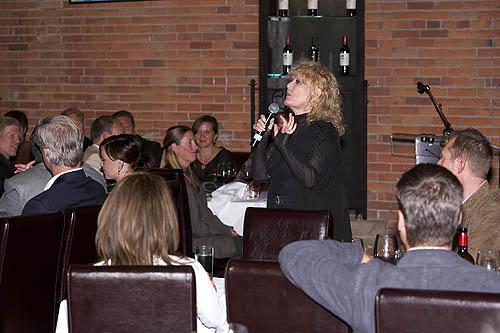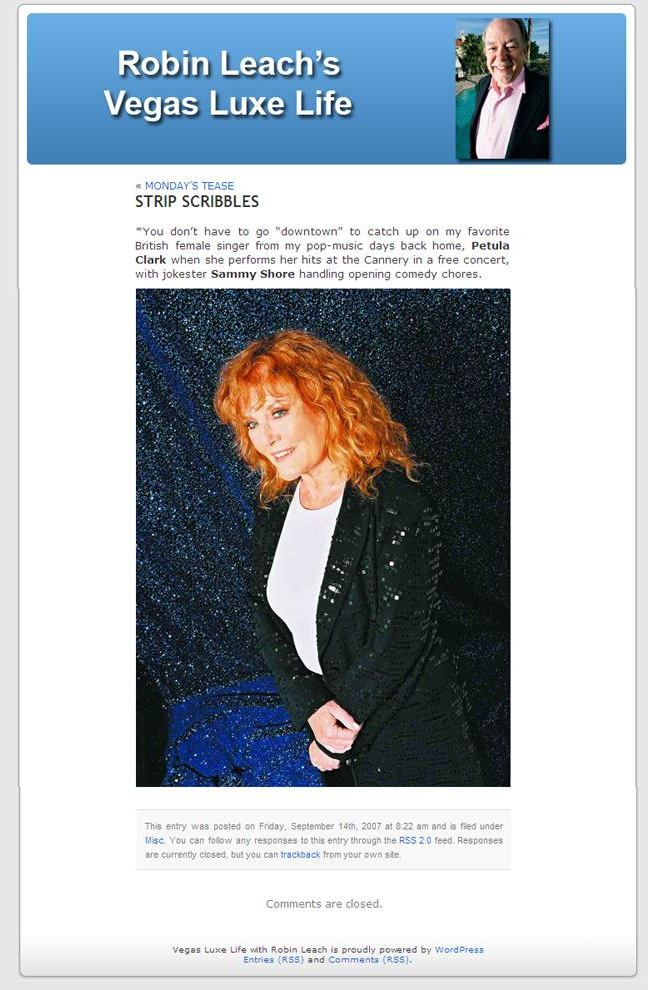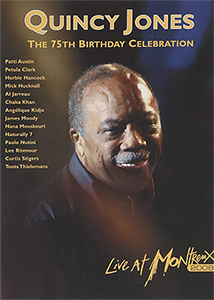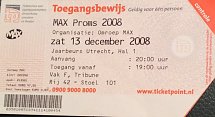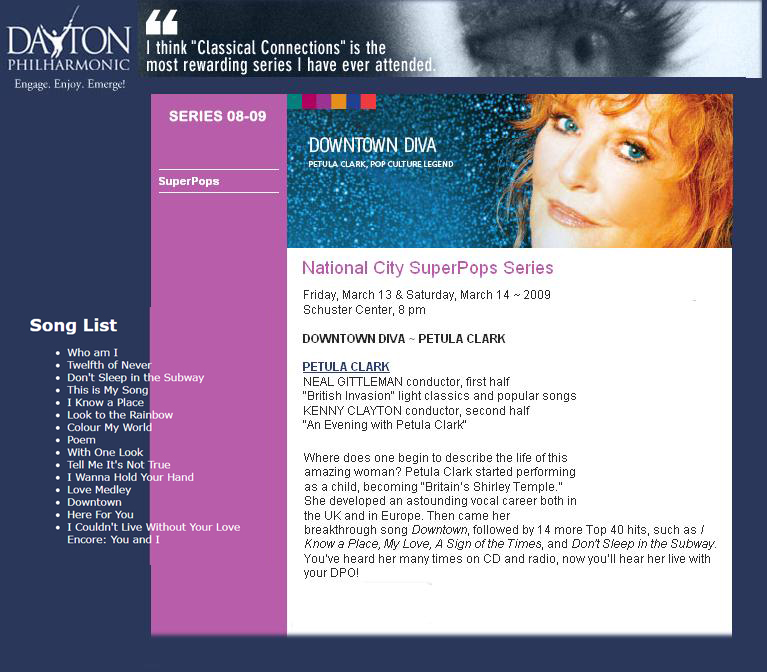LIVE - IN CONCERT
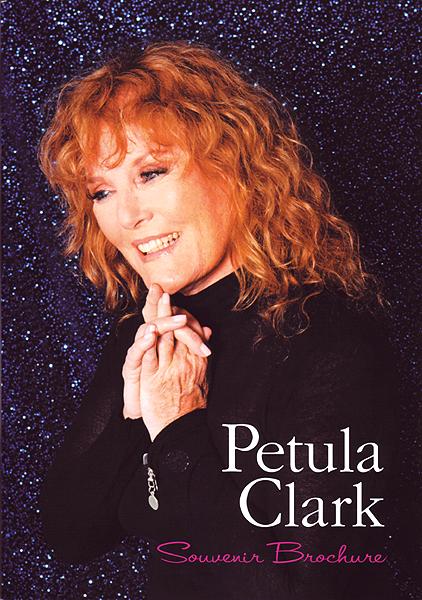
THE MILLENNIUM
2000
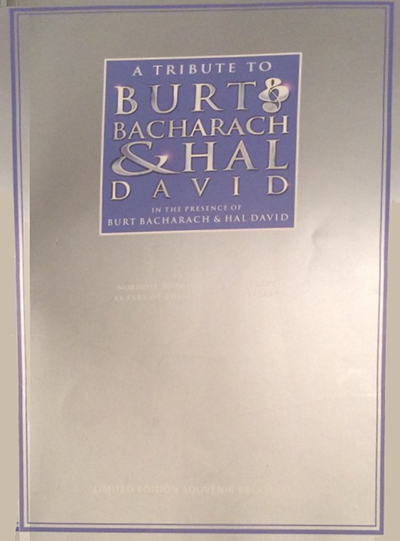
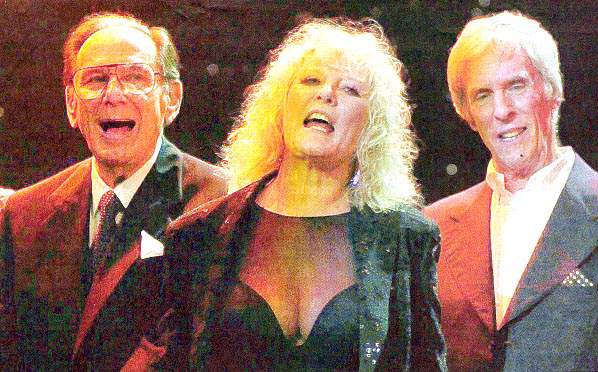
Hal David, Petula Clark, Burt Bacharach singing "What the World Needs Now" (London Evening Standard photo)

Royal Albert Hall Review
3rd July 2000
EVERY ONE A PET SONG
You wouldn't think that a Nordoff-Robbins charity event in honour of the celebrated songwriting duo of Bacharach and David could be cause for mild controversy, but there was an element of that here. On one hand the fans who wanted to singalong to non-stop pop classics; on the other, those who wanted to admire the artistry in studied awe.
In between, were a few aggrieved punters who demanded to know where Bacharach and David actually were. Eventually Burt would appear to play piano for Elvis Costello and Dionne Warwick, while Hal emerged from the wings for bows and speeches.
The first half was dominated by Petula Clark and Sasha Distel, genuine stars both. Pet's status as our most successful female pop star was cemented by the gravitas she applied to A House is Not a Home. Sacha's Gallic charms were self-evident in the gorgeous Raindrops keep fallin' on my head. The second half began with a wobbly Leo Sayer rendition of (There's) Always Something There to Remind Me. It picked up steam once Costello added an element of class to I Just Don't Know What to Do with Myself as Burt tinkled the ivories. Elvis slipped into Dionne and the night exploded with the urban classics Walk on By, Say a Little Prayer, San Jose and Anyone who Had a Heart, a quartet of pop standards that give the genre a good name.
3rd July 2000
EVERY ONE A PET SONG
You wouldn't think that a Nordoff-Robbins charity event in honour of the celebrated songwriting duo of Bacharach and David could be cause for mild controversy, but there was an element of that here. On one hand the fans who wanted to singalong to non-stop pop classics; on the other, those who wanted to admire the artistry in studied awe.
In between, were a few aggrieved punters who demanded to know where Bacharach and David actually were. Eventually Burt would appear to play piano for Elvis Costello and Dionne Warwick, while Hal emerged from the wings for bows and speeches.
The first half was dominated by Petula Clark and Sasha Distel, genuine stars both. Pet's status as our most successful female pop star was cemented by the gravitas she applied to A House is Not a Home. Sacha's Gallic charms were self-evident in the gorgeous Raindrops keep fallin' on my head. The second half began with a wobbly Leo Sayer rendition of (There's) Always Something There to Remind Me. It picked up steam once Costello added an element of class to I Just Don't Know What to Do with Myself as Burt tinkled the ivories. Elvis slipped into Dionne and the night exploded with the urban classics Walk on By, Say a Little Prayer, San Jose and Anyone who Had a Heart, a quartet of pop standards that give the genre a good name.

Albert Hall ~ Bacharach and David Gala Tribute
3 July, 2000
by Paul Sexton
Nordoff-Robbins Music Therapy is rightly revered as a source of inspiration to autistic and otherwise disabled children, but as part of its 25th anniversary on Friday, the charity raised further funds while providing another kind of public service. Tribute concerts often take place to a camouflaged backdrop of commercial motivation, but good causes have rarely sounded as good or been served as elegantly as at this gala celebration of two cornerstones of the popular song, the composer Burt Bacharach and the lyricist Hal David.
Such tribute occasions customarily produce a handful of relevant luminaries and a boot-sale of extras, but with one or two mildly windy hiccups, this one exuded both relevance and dignity. Setting it on a London stage was also entirely apposite, since both writers have acknowledged the important role played by British artists and audiences in broadening their appeal, as their tunes were amplified by Tom Jones, Sandie Shaw, Dusty Springfield and others.
A bill featuring Kenny Lynch, Sacha Distel, Linda Lewis and Edwin Starr might sound as though it belongs at the Palladium or on a where-are-they-now package tour, but each contributed to the momentum of the testimonial, as did Lucie Silvas, Lynden David Hall, Paul Carrack and the remarkably composed newcomer Sumudu Jayatilaka. Petula Clark closed the first half with an initially cautious but ultimately victorious presentation that included "Close To You" and one of David's most handsomely expressive lyrics, "A House Is Not a Home."
After the interval it fell to Bacharach's most recent collaborator, Elvis Costello, to introduce him and use his piano accompaniment for "I Just Don't Know What To Do With Myself." Finally Bacharach and David's keynote interpreter Dionne Warwick emerged, going some way to redeeming a lacklustre performance at Hammersmith two nights earlier, and it was time to say a little prayer for the creators of a catalogue that only grows more mighty as contemporary songwriting values grow more slovenly.
3 July, 2000
by Paul Sexton
Nordoff-Robbins Music Therapy is rightly revered as a source of inspiration to autistic and otherwise disabled children, but as part of its 25th anniversary on Friday, the charity raised further funds while providing another kind of public service. Tribute concerts often take place to a camouflaged backdrop of commercial motivation, but good causes have rarely sounded as good or been served as elegantly as at this gala celebration of two cornerstones of the popular song, the composer Burt Bacharach and the lyricist Hal David.
Such tribute occasions customarily produce a handful of relevant luminaries and a boot-sale of extras, but with one or two mildly windy hiccups, this one exuded both relevance and dignity. Setting it on a London stage was also entirely apposite, since both writers have acknowledged the important role played by British artists and audiences in broadening their appeal, as their tunes were amplified by Tom Jones, Sandie Shaw, Dusty Springfield and others.
A bill featuring Kenny Lynch, Sacha Distel, Linda Lewis and Edwin Starr might sound as though it belongs at the Palladium or on a where-are-they-now package tour, but each contributed to the momentum of the testimonial, as did Lucie Silvas, Lynden David Hall, Paul Carrack and the remarkably composed newcomer Sumudu Jayatilaka. Petula Clark closed the first half with an initially cautious but ultimately victorious presentation that included "Close To You" and one of David's most handsomely expressive lyrics, "A House Is Not a Home."
After the interval it fell to Bacharach's most recent collaborator, Elvis Costello, to introduce him and use his piano accompaniment for "I Just Don't Know What To Do With Myself." Finally Bacharach and David's keynote interpreter Dionne Warwick emerged, going some way to redeeming a lacklustre performance at Hammersmith two nights earlier, and it was time to say a little prayer for the creators of a catalogue that only grows more mighty as contemporary songwriting values grow more slovenly.
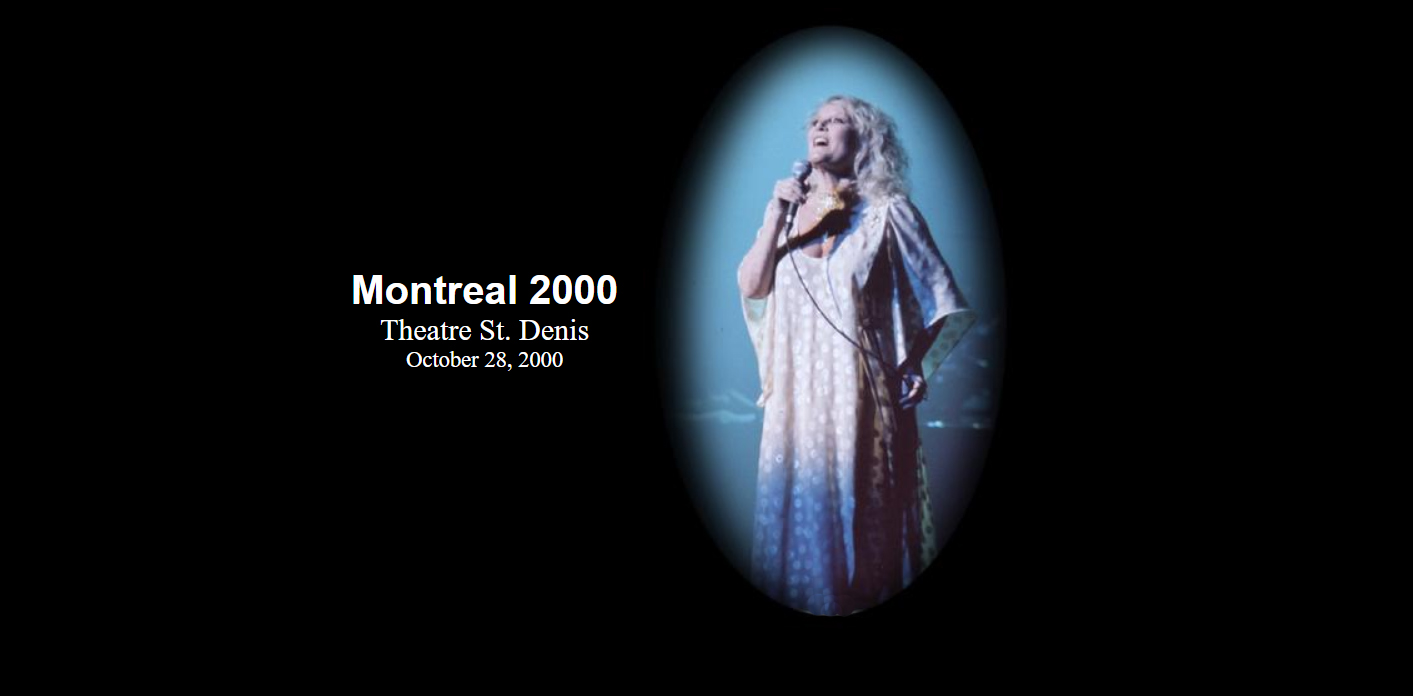
Songs Performed
Part I
Part I
- Here We Are
- Color My World
- I'm Not Afraid
- World War II
- Un Enfant
- Look to the Rainbow / How are Things in Glocca Morra
- You and I
- Que Fais tu la, Petula
- Je Me Sens Bien
- La Gadoue
- Chariot
- Don't Sleep in the Subway
- Celebrate
Part II
- If I Had You
- Just You, Just Me
- Coeur Blessé
- I Never Do Anything Twice
- 60s medley:
Downtown/Sign of the Times I Know a Place/Round Every Corner The Other Man's Grass is Always Greener Kiss Me Goodbye/This is My Song My Love/Downtown - Tell Me It's Not True
- With One Look
- Theatre poem
- Vivre
- Here for You
Encores:
- I Couldn't Live Without Your Love
- Tout le Monde Veut Aller Au Ciel, Mais Personne ne Veut Mourir
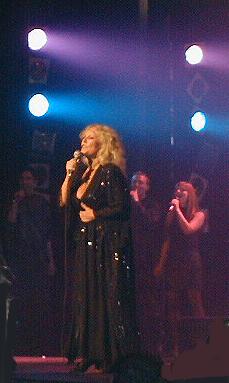



 Above photos © Karl André
Above photos © Karl André
 Sylvain Cormier
Sylvain CormierNovember 4-10, 2000
AN EXQUISITE EVENING
The operation was a risk. Preparing a show in a few weeks, with musicians that you do not know very well without having a chance to try it out, is a big thing. However, last Saturday at Theatre St-Denis, Petula Clark succeeded this tour-de-force in offering the audience a fantastic performance. We all wanted to hear her and this lady was happy to please us all. She told us parts of her life, some of it in English and some of it in French. She sang some thirty songs that she's been performing for almost six decades. She has real class, a voice that never seems to be out of breath and songs that she feels from inside. A few highlights of the show were when she performed: I'm Not Afraid, Don't Sleep in the Subway, Downtown, Tell Me It's not True, and Vivre from Notre Dame de Paris. Scott Price did an excellent job at conducting this first class band. An exquisite evening. A priviledged moment.
~J.-F. Brassard (Translation by Daniel Bédard)

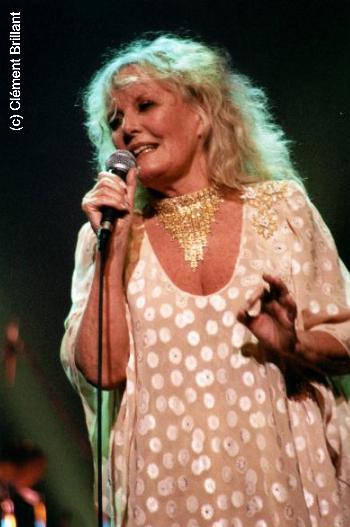
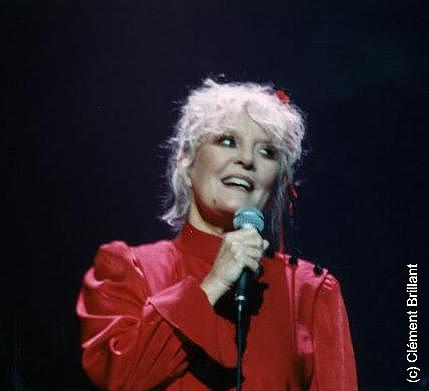 Photos © Clément Brilliant
Photos © Clément Brilliant 
 Sylvain Cormier
Sylvain CormierLe lundi 30 octobre 2000
TOUJOURS PETULA
Charmé? Je l'étais depuis l'entrevue. Fan? Je le suis depuis l'enfance, capable de chanter Don't Sleep In The Subway sur demande. Mais ravi, totalement heureux d'avoir vu et entendu Petula Clark sur scène? Seulement depuis samedi soir au Saint-Denis. Comme tout l'auditoire, qui a constat&egrav; en même temps que moi l'évidence: l'interprète est grandissime, la femme a la soixantaine resplendissante, et l'individu est irrèsistiblement chouette.
Petula? Simplicité, gràce and greatness au rendez-vous. Intelligence, sensibilité et drôlerie itou. And common sense en plus. C'est voulu, les mots en anglais. C'est pour faire comme elle. Faut-il rappeler que Petula Clark fit carrière dans les deux langues officielles de chez nous, l'anglais et le français, qu'elle fut d'abord l'enfant chèrie du Royaume-Uni, puis la darling yêyê de la France, avant de devenir la mondiale Petula de Downtown au milieu des groovy sixties? Elle aurait pu nous fourguer un spectacle à l'américaine, surtout après un quart de siècle d'absence de la scène québêcoise, mais pas du tout: la presque totalité des chansons - même les récentes - étaient fully bilingual dans le texte. Jusqu'aux prèsentations qui bênêficiaient du même me gênêreux traitement, sans qu'on n'ait jamais l'impression de doublage instantanê. She's a natural, quoi.
C'est le mot: Petula Clark est une sacrêe nature. Parfaitement à l'aise sur scène, drôlement dê gourdie et carrê ment indê montable, fû t-ce par une robe mal attachê e qui l'abandonne en cours de pot-pourri: la Galloise fit un p'tit signe à ; l'habilleuse, laquelle arrangea l'affaire devant nous. "One of those funny things about the theater", comme dira la chanteuse dans un poè ;me de son cru sur le monde des planches.
De fait, tout le spectacle êtait prêsentê comme un musical qui aurait eu Petula Clark pour sujet. Difficile d'imaginer plus habile faç on de mettre en contexte plus de soixante ans de carrière (elle chantait pour les troupes "during World War II"): toutes les êtapes de son parcours devenaient autant de tableaux, oò l'êquilibre entre anecdotes et chansons &etait idêal. Sêquence retrouvailles (Here We Are, Colour My World), portion fillette (enregistrement tout crêpitant de Petula à la BBC Overseas Service, mis en perspective par Un enfant, (de Brel), medley cinêma (extraits de Finian's Rainbow et Goodbye Mr. Chips), ê ;pisode yê ;yê ; (Que fais-tu là ;, Petula?, La Gadoue, Chariot, Coeur blessé ;), voyage sixties (Sign Of The Times, I Know A Place, This Is My Song, Downtown), le spectacle n'oubliait à peu près rien d'essentiel, sans négliger le pré ;sent: les échantillons des comédies musicales Blood Brothers et Sunset Boulevard, rêcents ajouts au curriculum, ont au moins autant plu que les tubes.
Même sa version de Vivre (oui, celle de Notre-Dame de Paris) n'aura pas déparé l'ensemble: j'en apprèciais Plamondon. Jusqu'à cet orchestre tout-Quêbecois dont elle connaissait chaque prénom, Petula Clark aura été à l'impossible hauteur de sa légende, se montrant précisèment à dimension humaine: accessible, charnelle et entière. Quite a dame, je dois dire.
 Sylvain Cormier
Sylvain CormierLe lundi 30 octobre 2000
ALWAYS PETULA
Charmed? I was since the interview. A Fan? I am since childhood, and am able to sing "Don't Sleep In The Subway" on request. But delighted , and completely happy to have seen and heard Petula Clark on stage? Only since Saturday night at the Thêātre St-Denis. Like everyone in the audience who noticed at the same time as me the evidence: the performer is tremendous, woman in her sixties is dazzling, and the individual is irresistibly cute.
Petula? Where simplicity, grace and greatness meet. Likewise for intelligence, sensitivity and funniness. And common sense in addition. These English words are wanted . (N.B. In the original French text, words are purposely left in English) It's to do like her. Must one recall that Petula Clark made her career in both of our (in Canada) official languages, English and French, that she was the darling child of the United Kingdom, then the darling yêyê (60's pop star) of France, before becoming the world-renowned Petula of "Downtown" in the middle of the groovy sixties?
She could have unloaded an American style show , especially after a quarter century's absence from the Quêbec stage, but not at all: almost all of the songs-even the recent ones' lyrics were completely bilingual. Up to the introductions which benefited from the same generous treatment without our ever having the impression of a simultaneous translation. She's a natural at that.
That's the word: Petula Clark is a sacred nature. Perfectly at ease on stage, unusually bright, and bluntly can't be taken down, either by a badly tied dress which comes apart in the middle of a medley: the Welsh woman made a small sign to the dresser who adjusted the dress in front of the audience. "One of those funny things about the theater", says the singer in a poem about her belief in the world of the stage.
In fact, the entire show was presented as a musical which would have had Petula Clark as its subject. It's hard to imagine a more skillful way in which to put into context more than sixty years of a career (she sang for the troops "during World War ll.": all the steps of her journey became as much a scene (in a play) , where the balance between stories and songs was ideal.
A "reunion" sequence(Here We Are, Colour My World), little girl segment(a crackling sounding recording of Petula at the BBC Overseas Service, put in perspective by "Un Enfant" written by Brel), a cinema (motion picture )medley (excerpts from Finian's Rainbow and Goodbye Mr. Chips), yêyê sequence (Que fais-tu là, Petula?, La Gadoue, Chariot, Coeur blessé, sixties trip (Sign Of The Times, I Know A Place, This Is My Song, Downtown), almost nothing essential was forgotten in the show, without neglecting the present: the samples from the plays Blood Brothers & Sunset Boulevard, recent additions to the repertoire, pleased as much as the hits.
Even her version of Vivre (yes, the one from Notre-Dame de Paris) would not have spoiled the whole: I appreciated Plamondon.(Quebecois composer who wrote "Vivre"), up to the orchestra-- made up of Quebecoise of whom Petula knew each musician's first name. Petula Clark would have been at the impossible summit of her legend, showing of herself a human side: accessible, passionate and whole. Quite a dame, I must say.
[French translation courtesy of Jean Thivierge]
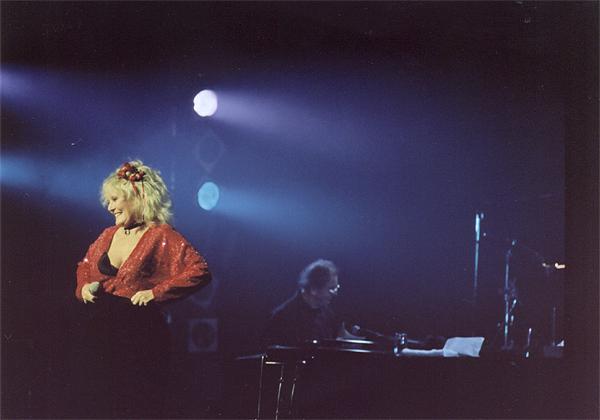
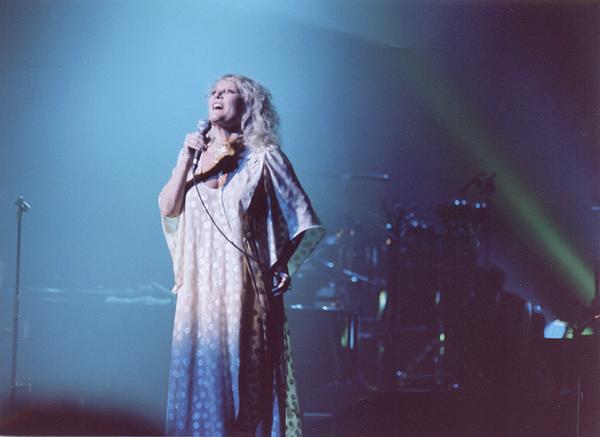

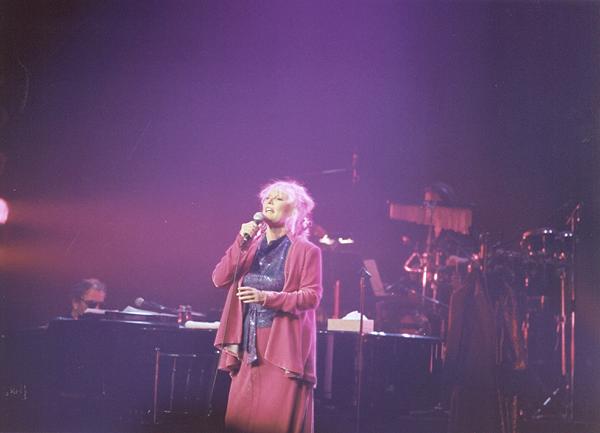
Above photos © Pat Fox
 By Martin Siberok
By Martin Siberok Bilingual Clark wows Montreal Switching between French and English, the singer displayed an easy charm and a strong buoyant voice.
Petula Clark would make a perfect Canadian - the fluently bilingual kind that Pierre Trudeau dreamed this country would produce. Switching effortlessly between French and English, Clark took over Théàtre St. Denis Saturday night. This was the only Canadian date on her North American tour, which picks up in California next month, and she was making the most of being in Montreal.
The last time Clark played this city was in 1976. It was a period of heightened political tension, and the singer's determination to switch between English and French was not well received by some fans and critics. Her return almost a quarter of a century later was much more welcoming, signalling a markedly different social reality in Quebec. Clark is an international star, and the audience proved it can now appreciate a celebrity of her stature without feeling threatened by her easy bilingualism.
The former child star -- who turns 68 on Nov. 15 -- is clearly at home on any stage. Acting the gracious host, Clark guided her fans through a Vegas-style evening dedicated to her 60-year career. From her early days entertaining the Allied troops during the Second World War, to being an "Anglais" star in France, to the pop-filled sixties, to her Hollywood films and Broadway musicals, Clark has always revealed herself as a consummate performer. Over the years, she has sold nearly 70 million records in four languages -- English, French, Italian and German -- and is still the most successful female singer in British chart history.
So it was rewarding to see how well her voice has survived the years. Strong and buoyant, it showed no signs of faltering as Clark tackled a variety of styles -- jazz, pop, British music-hall numbers, French chansons and Broadway tunes. And with most of her songs clocking in at the three-minute mark, Clark was able to cover a lot of territory in a scant two hours.
Her pop days were rolled into a sixties medley, with snippets of I Know A Place, A Sign of the Times and My Love, and culminating in an extended version of Downtown, thanks to additional French verses. The seven-song medley served as a worthy tribute to the singer's fruitful collaboration with songwriter Tony Hatch -- Britain's answer to Burt Bacharach -- whose elegant arrangements were some of the best of that decade.
Throughout her career, Clark has had many admirers, including John Lennon, Michael Jackson and Sheryl Crow, as well as Canadian piano virtuoso Glenn Gould, who said that her work with Hatch was better than the Beatles. Highlights of the evening's well-paced repertoire were a stunning rendition of Don't Sleep in the Subway, with its rich Beach Boy-esque harmonies, a rousing Tell Me It's Not True from the Blood Brothers musical, and I Am Not Afraid, a candid testimonial about being forever in the public eye.
As Clark confessed, "Growing up in front of millions wasn't fun." Despite building a solid career in Britain in the forties as a Shirley Temple equivalent, Clark felt stifled by fans who wouldn't allow her to grow up.
It was only when she moved to France in the late 1950s, and started performing sophisticated French pop songs written by Jacques Brel and Serge Gainsbourg, that she was finally able to shake her image of the eternal adolescent.
For the evening's largely francophone crowd, Clark sang many of her French hits, such as Que fais-tu la Petula? and Chariot, as well as adding French lyrics to several of her English songs. As a treat for her Montreal fans, she covered a stirring Vivre, taken from the Notre-Dame de Paris musical written by local hero Luc Plamondon.
When the show concluded and Clark basked in the limelight, several male fans rushed the stage to offer her bouquets of red roses. It was a fitting gesture for a seasoned performer who proved beyond a doubt that she deserves all the accolades she has received.
The West Island Suburban
By Craig McKeeAn unforgettable night with Petula
Every once in a while a performer comes along who doesn't get the credit she deserves until you see her live.
For me, that performer is Petula Clark.
The full house that was on hand at the St.Denis Theatre on Saturday night was taken on a journey through the life and career of the British superstar --- a career that has lasted more than 50 years.
All but two musicians in her nine-piece band, as well as her four backup singers, were recruited locally, but you wouldn't know they hadn't been together for years. When Petula broke into our consciousness with Downtown in the mid-1960s, she seemed to be made for the time. The songs and her voice seemed quintessentially British. I saw her for the first time when the Ed Sullivan Show taped at Expo 67 in Montreal. And even as an eight-year-old I knew that I loved that music.
When I found out she was coming back to Montreal I was anxious to hear the old hits again. And while I loved hearing them all as much as I could have hoped, I was pleasantly thrilled at how much I loved the more unfamiliar material that she shared with the audience. It really gave me the opportunity to appreciate --- more than I perhaps had before --- just how great a performer Clark is. At 68, she looks great and her voice, if anything, is better than ever. And her stage persona is so down to earth and charmingly vulnerable that you can't help but like her.
Clark moved easily between English and French, both in her descriptions of her career and life and in her songs. She performed a variety of French songs, some from her past as a recording star in France. She sang Un Enfant by Jacques Brel, her early hit Que Fais-tu là Petula?, Je Me Sens Bien, Coeur Blessé as well as crowd favourite Tout le Monde... in her encore.
She also threw in French verses in some of her best known English hits. For those who prefer that part of her repertoire, she didn't leave anything out. She gave us wonderful renditions of Tony Hatch compositions like Downtown, Don't Sleep in the Subway, I Know a Place, I Couldn't Live Without Your Love, Colour My World, Sign of the Times, The Other Man's Grass is Always Greener, and My Love. She also sang the Charlie Chaplin penned This is My Song.
While I went to the concert knowing how much I loved these hits, I came away with a vastly increased respect for Petula's talent as a singer. Her performances of songs from her Broadway career like Sunset Boulevard, Blood Brothers, and from her films Finian's Rainbow and Goodbye Mr. Chips really showed her considerable abilities as a vocalist. In one touching moment, she sang about World War II while a recording of her singing on the BBC at the age of eight played in the background.
All in all, it was a wonderful night that I'll never forget. We can only hope she comes back very soon. Don't miss her if she does.
(Transcribed by Charles-André Ferron)>


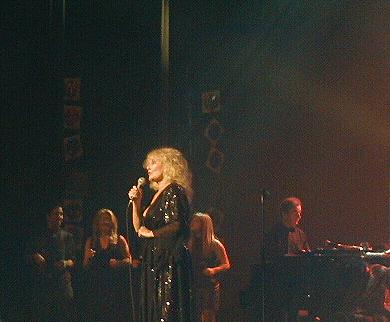

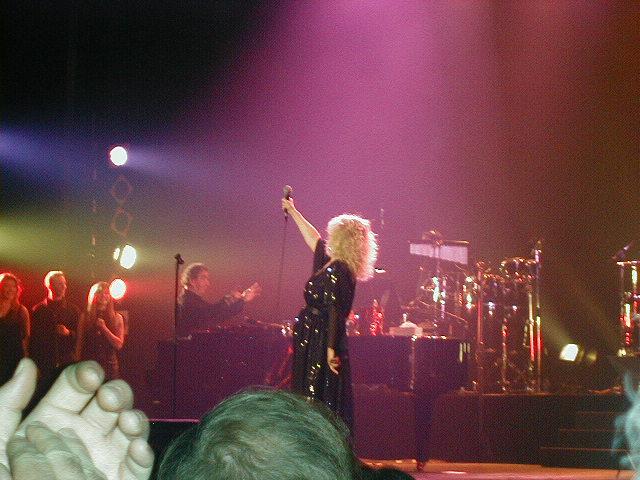
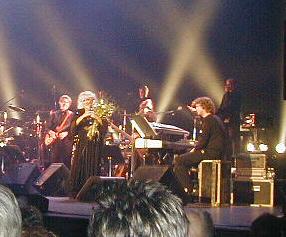

Above photos ©Laurie Parsons Zenobio
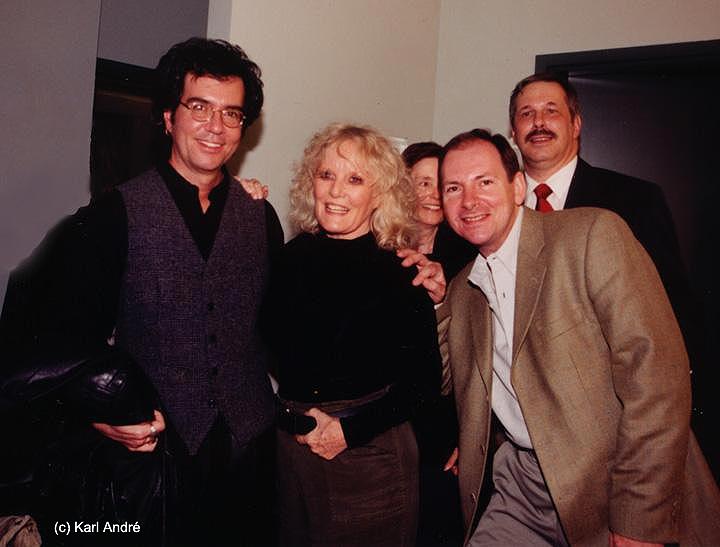
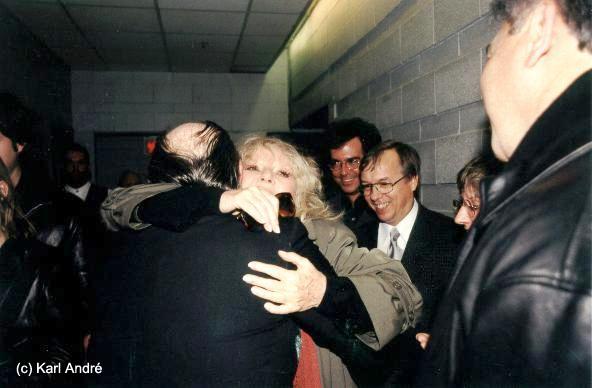
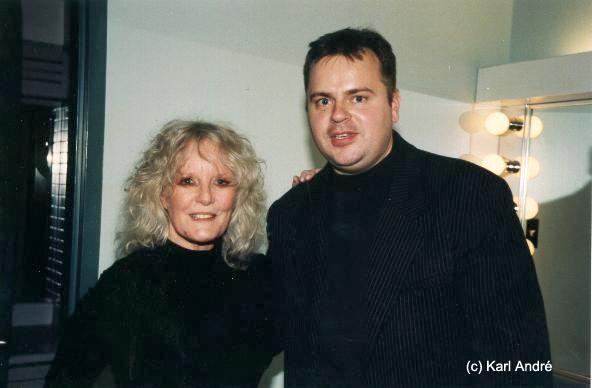
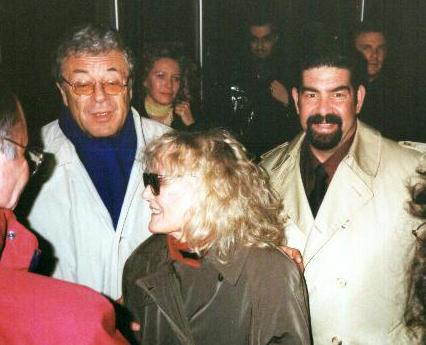
Photo by Jim Noll
All photos ©Karl André, except as noted.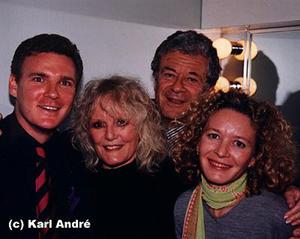
Backstage - Patrick, Petula, Claude & Kate

Backstage - Patrick, Petula, Claude & Kate
San Diego Civic Theatre
San Diego, California, USA
THE MUSIC OF ANDREW LLOYD WEBBER
Starring: PETULA CLARK.
Singers: Jason Burke, Tara Lynn Cotty, Michele Marin, Fabiola Reis, Nick Sattinger, Kristen R. Butcher, Erin Davie, Neil Michaels, Mark Rinzel, Tangena Church, Stephanie Garza, Michael Pesce, Brian Charles Rooney, Christopher Sloan.
San Diego Civic Theatre
San Diego, California, USA
THE MUSIC OF ANDREW LLOYD WEBBER
Starring: PETULA CLARK.
Singers: Jason Burke, Tara Lynn Cotty, Michele Marin, Fabiola Reis, Nick Sattinger, Kristen R. Butcher, Erin Davie, Neil Michaels, Mark Rinzel, Tangena Church, Stephanie Garza, Michael Pesce, Brian Charles Rooney, Christopher Sloan.

 Sign of the times: 'Music of Andrew Lloyd Webber' gets a boost from Petula Clark
Sign of the times: 'Music of Andrew Lloyd Webber' gets a boost from Petula ClarkBy Anne Marie Welsh
Union-Tribune Theater Critic
November 2, 2000
The speaker sounds young, vital, full of humor, like the ageless singer. "One way I'm different" says Petula Clark, "is that most of the girls who played Norma Desmond kept some of those elaborate (Bob Mackay) costumes. That's the last thing I wanted. To show up at some party looking like that self-absorbed, delusional old star."
The British pop star, who turns 68 next month, charmed San Diego audiences last year by lifting the heavy heart of Andrew Lloyd Webber's lugubrious "Sunset Boulevard" with her canny performance as that fading film star, Norma. Clark returns Tuesday as herself in an evening of music by Sir Andrew, backed by the 28-piece Philharmonica Orchestra and a dozen singing, dancing performers.
Clark is in Montreal as we speak, recovering from the excitement of a show she premiered the night before. "I feel as if I'd been kicked by a donkey," she says. "All that excitement and then the big letdown."
As Clark (aka Mrs. Claude Wolff) describes that autobiographical show, tentatively titled "Sign of the Times" and sung half in English, half in French, you soon realize that thinking of her as a chart-topping British pop star from the '60s ("Don't Sleep in the Subway," "Downtown," "My Love") is like saying Baryshnikov is a good ballet dancer. It doesn't cover much of the territory.
The singing Welsh
Born in Surrey in 1932 of an English father and Welsh mother ("all the Welsh are singers"), Clark says, "I'm not nostalgic particularly, though I do go back to my childhood in the new show. I've written a special piece, a kind of half poem and half song, like a tone poem about what it felt like to be a child during the war."
Before her U.S. success, which began with the Grammy-winning "Downtown" in 1964, she says, "I had this career in France for many years. I married a Frenchman (Wolff). So (in Montreal) they love the new show, which is partly in French. Of course, they have an agenda here," she says, referring to Quebec separatists."
She and the Frenchman have three children (Kate, Barbara and Patrick, all grown) and a 4-year old grandchild, Sebastian, who's bilingual. Already he's a singer who "enchants everyone who hears him," Clark says.
Life before and after "Downtown"
"I had a life before the '60s and a life since," she says, without pointing directly to the many movies ("Finian's Rainbow") and stage appearances ("The Sound of Music") interspersed with the recordings that have sold more than 30 million worldwide.
"I never say, 'They don't write 'em like they used to.' I'm enjoying my life and career now more than ever."
Though Glenn Close warned Clark she'd be in a looney bin if she stayed in "Sunset" longer than eight months, Clark has performed the show more often than Close or any of the others (Patti LuPone, Betty Buckley, Elaine Paige) who inhabited the fading fancies of Norma D. "I was ready to be myself again onstage," Clark says, explaining her return to concertizing.
The Lloyd Webber evening has been fashioned by director Arlene Phillips, employing tunes from early pieces, the megahits "Phantom of the Opera," and "Cats" and "Evita," and a more recent of the composer's works, "Whistle Down the Wind." Promotional material calls the show inspirational and unforgettable. And while many critics might find other, less laudatory words for the swelling anthems of the mighty populist Lloyd Webber, it's anybody's guess how his music will sound when Clark gets a hold of it.
Her wit, vulnerability and feminine sweetness, not to mention her unquenchable vitality, transformed "Sunset Boulevard" into something else again. Maybe next week, she'll personalize "Memory" or "Don't Cry for Me, Argentina" in the same way.
Pasadena Civic Auditorium
Pasadena, California, USA
THE MUSIC OF ANDREW LLOYD WEBBER
STARRING: PETULA CLARK.
Singers: Jason Burke, Tara Lynn Cotty, Michele Marin, Fabiola Reis, Nick Sattinger, Kristen R. Butcher, Erin Davie, Neil Michaels, Mark Rinzel, Tangena Church, Stephanie Garza, Michael Pesce, Brian Charles Rooney, Christopher Sloan.
Pasadena Civic Auditorium
Pasadena, California, USA
THE MUSIC OF ANDREW LLOYD WEBBER
STARRING: PETULA CLARK.
Singers: Jason Burke, Tara Lynn Cotty, Michele Marin, Fabiola Reis, Nick Sattinger, Kristen R. Butcher, Erin Davie, Neil Michaels, Mark Rinzel, Tangena Church, Stephanie Garza, Michael Pesce, Brian Charles Rooney, Christopher Sloan.
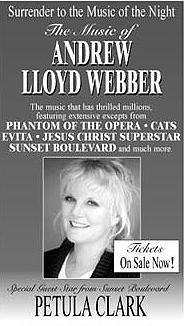
 by Joel Hirschhorn
by Joel HirschhornReuters/Variety, November 16, 2000
"Lloyd Webber's Music Basks in Spotlight"
HOLLYWOOD -- "The Music of Andrew Lloyd Webber" showcases Lloyd Webber's music with simplicity and restraint.
Liberated from the weight of cats, chandeliers and roller skates, the melodies have more power than they ever did in swollen, spectacular settings. Arlene Phillips, director and choreographer, keeps the production simple and straightforward, making musicianship a priority, and she has chosen an ensemble of dynamic singers to interpret the material.
Special guest star Petula Clark enters the stage calmly and stays cool as she launches "I Don't Know How To Love Him." Her rendition is marked by thoughtful pauses and emotional intelligence, breaking the phrase "he's just... one more" in two, for example.
Clark is an unusual artist, much more so than generally recognized. She makes legit singing acceptable to the masses by minimizing vibrato and adding pop licks on "Don't Cry For Me Argentina," a prime example of her ability to bridge the Broadway and commercial music world.
The show kicks off with Mark Rinzel's rousing version of "Jesus Christ Superstar." Christopher Sloan, does "Close Every Door" from "Joseph and the Amazing Technicolor Dreamcoat" and holds the audience spellbound with his strong, searching delivery.
"Starlight Express" is energetically dramatized by Nick Sattinger and Neil Michaels. Michaels then returns like a singing Elmer Gantry with his thunderous gospel rendition of "There's a Light at the End of the Tunnel," another "Starlight Express" number which proves memorable music can come from mediocre shows.
Inevitably, Clark gets to "Memory," the only tune of the evening that feels overly familiar -- it's more fun to watch Sattinger wail out "Mr. Mistoffelees" from "Cats." Toward the show's conclusion, Clark takes over as a star and offers heartfelt performances of "The Perfect Year" and "With One Look."
Brian W. Tidwell, music director and conductor, makes sure that his 28-piece orchestra, the Philharmonica Europa, never overwhelms the singers yet shines through every selection.
Presented by the Pasadena Civic Auditorium Foundation. Directed and choreographed by Arlene Phillips. Lighting, Vivien Leone; musical director, Brian W. Tidwell; sound design, Mark Norfolk.
The Music of Andrew Lloyd Webber (The Pasadena Civic; 3,000 seats; $55 top). Starring: Petula Clark; singers, Jason Burke, Tara Lynn Cotty, Michele Marin, Fabiola Reis, Nick Sattinger, Kristen R. Butcher, Erin Davie, Neil Michaels, Mark Rinzel, Tangena Church, Stephanie Garza, Michael Pesce, Brian Charles Rooney, Christopher Sloan. Opened and reviewed Nov. 14, 2000; closes Nov. 19.
HOLLYWOOD -- "The Music of Andrew Lloyd Webber" showcases Lloyd Webber's music with simplicity and restraint.
Liberated from the weight of cats, chandeliers and roller skates, the melodies have more power than they ever did in swollen, spectacular settings. Arlene Phillips, director and choreographer, keeps the production simple and straightforward, making musicianship a priority, and she has chosen an ensemble of dynamic singers to interpret the material.
Special guest star Petula Clark enters the stage calmly and stays cool as she launches "I Don't Know How To Love Him." Her rendition is marked by thoughtful pauses and emotional intelligence, breaking the phrase "he's just... one more" in two, for example.
Clark is an unusual artist, much more so than generally recognized. She makes legit singing acceptable to the masses by minimizing vibrato and adding pop licks on "Don't Cry For Me Argentina," a prime example of her ability to bridge the Broadway and commercial music world.
The show kicks off with Mark Rinzel's rousing version of "Jesus Christ Superstar." Christopher Sloan, does "Close Every Door" from "Joseph and the Amazing Technicolor Dreamcoat" and holds the audience spellbound with his strong, searching delivery.
"Starlight Express" is energetically dramatized by Nick Sattinger and Neil Michaels. Michaels then returns like a singing Elmer Gantry with his thunderous gospel rendition of "There's a Light at the End of the Tunnel," another "Starlight Express" number which proves memorable music can come from mediocre shows.
Inevitably, Clark gets to "Memory," the only tune of the evening that feels overly familiar -- it's more fun to watch Sattinger wail out "Mr. Mistoffelees" from "Cats." Toward the show's conclusion, Clark takes over as a star and offers heartfelt performances of "The Perfect Year" and "With One Look."
Brian W. Tidwell, music director and conductor, makes sure that his 28-piece orchestra, the Philharmonica Europa, never overwhelms the singers yet shines through every selection.
Presented by the Pasadena Civic Auditorium Foundation. Directed and choreographed by Arlene Phillips. Lighting, Vivien Leone; musical director, Brian W. Tidwell; sound design, Mark Norfolk.
The Music of Andrew Lloyd Webber (The Pasadena Civic; 3,000 seats; $55 top). Starring: Petula Clark; singers, Jason Burke, Tara Lynn Cotty, Michele Marin, Fabiola Reis, Nick Sattinger, Kristen R. Butcher, Erin Davie, Neil Michaels, Mark Rinzel, Tangena Church, Stephanie Garza, Michael Pesce, Brian Charles Rooney, Christopher Sloan. Opened and reviewed Nov. 14, 2000; closes Nov. 19.

November 15, 2000
by DARYL H. MILLER
The Music of Andrew Lloyd Webber
Petula Clark may be what gets people in the door for another listen to "The Music of Andrew Lloyd Webber," but once there, they'll find much more.
This touring concert show--which has passed through the area before with Sarah Brightman and Michael Crawford--comes with no set design to speak of, and a minimum of choreography or other musical staging. Yet, happily, this ends up focusing attention on the music itself, in electric performances by the regular cast of 12 singer-dancers, as well as Clark, recent headliner in a "Sunset Boulevard" tour, who joined the show last week in San Diego and continues, through Sunday, at the Pasadena Civic Auditorium.
Unlike many musical revues, which lift songs out of shows and attempt to present them in new contexts, this more straightforward concert format presents 20 Lloyd Webber songs in blocks of two or three numbers from each musical, often introduced by an overture. Left in their original settings, the songs retain their meaning and power, and as accompanied by the the 28-piece Philharmonia Europa, with a hint of electric guitar among the highfalutin strings and other orchestral instruments, the compositions reveal a strong classical influence that isn't always evident when listeners are distracted by crashing chandeliers or levitating Sunset Boulevard mansions.
The songs are presented pretty much in chronological order, from the more obviously rock-influenced "Joseph and the Amazing Technicolor Dreamcoat" and "Jesus Christ Superstar" of the late '60s/early '70s, through the more operatic "Phantom of the Opera" and "Sunset Boulevard" of the '80s and '90s. This edition also includes the title number from the late-'90s "Whistle Down the Wind," though nothing from Lloyd Webber's newest, "The Beautiful Game."
Clark, whose recording of "Downtown" made such a strong impression in the '60s, takes a daring approach to many of her solos, breaking phrases in unusual places, speaking key words and throwing in little pop trills. What's more, she acts each number with as much commitment as if she were performing in a full production of each show.
Though her first solos came out a bit strangled at Tuesday's opening, her voice warmed throughout the performance, and at the end of the first half, she delivered what was, arguably, her strongest number: "Don't Cry for Me Argentina," from "Evita." The song is Evita's balcony speech to throngs of Argentinians, and Clark freely spoke its most impassioned lines, including a simple, declarative "I love you" that would have made just about anyone take up the crowd's call of "Evi-i-i-ta, Evi-i-i-ta."
Clark's second-half performances of Norma Desmond's songs from "Sunset Boulevard" were filled with all the truth and fragile grace she brought to last year's local performances of the musical, from the calculated flirtatiousness and gaiety of "The Perfect Year" to the breathless wonder of "As If We Never Said Goodbye."
As company members took turns singing the concert's other big solos, they usually proved to be Clark's equals. Mark Rinzel sent a jolt of pure electricity through the auditorium as he growled and screamed through rock-star renditions of the "Jesus Christ Superstar" title song and Jesus' defiant cry to the heavens in "Gethsemane." And, ripping a page from the Michael Crawford songbook, Brian Charles Rooney sang "Phantom's" "Music of the Night" with the sort of whispered bel canto that made Crawford's performance so hypnotizing.
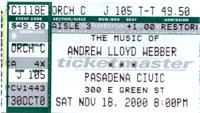
Rock N' Roll Hall of Fame
Cleveland, Ohio USA
HOLIDAY GALA 2000:
HONORING LEGENDARY LADIES OF FILM MUSICALS
Petula was honored along with Jane Russell, Jane Powell, Celeste Holm, Anne Jeffreys, Ann Blyth and Rhonda Fleming. Film clips saluting Petula's work in "Finian's Rainbow" and "Goodbye Mr. Chips" were shown. A concert followed the awards segment and Petula performed 4 songs -- "Downtown", "Don't Sleep in the Subway", "You and I" and dueted with Michael McDonald on "I Couldn't Live Without Your Love".
Rock N' Roll Hall of Fame
Cleveland, Ohio USA
HOLIDAY GALA 2000:
HONORING LEGENDARY LADIES OF FILM MUSICALS
Petula was honored along with Jane Russell, Jane Powell, Celeste Holm, Anne Jeffreys, Ann Blyth and Rhonda Fleming. Film clips saluting Petula's work in "Finian's Rainbow" and "Goodbye Mr. Chips" were shown. A concert followed the awards segment and Petula performed 4 songs -- "Downtown", "Don't Sleep in the Subway", "You and I" and dueted with Michael McDonald on "I Couldn't Live Without Your Love".

Gala to honor musical
sensations from six decades of Hollywood films
Saturday, December 09, 2000
By CLINT O'CONNOR
PLAIN DEALER REPORTER
Saturday, December 09, 2000
By CLINT O'CONNOR
PLAIN DEALER REPORTER
Long before she was sliced and diced in the most famous shower scene in mo tion picture history, Janet Leigh was bopping and stomp ing in Hollywood musicals. Although she was not trained as a dancer, Leigh found herself hoof ing through "Two Tickets to Broad way," "My Sister Eileen," and "Pete Kelly's Blues" among others.
"I wasn't a dancer; I was an actress who could move pretty well," says Leigh, remembered by millions for her bathroom murder in the film "Psycho." "The great thing about those musicals was that we had so much rehearsal time, long before shooting started. You grew very close. You really became like a family. Being an only child, that meant a lot to me."
Leigh and seven other actress-singer-dancers - Jane Russell, Jane Powell, Celeste Holm, Anne Jeffreys, Ann Blyth, Rhonda Fleming and Petula Clark - will be honored tonight at a fund-raiser for Cleveland's Center for Families and Children.
The sold-out event, "Holiday Gala 2000: Honoring Legendary Ladies of Film Musicals," begins at 7 at the Rock and Roll Hall of Fame and Museum, and features performances by Michael McDonald, Gloria Gaynor and other singers.
Leigh, who travels the country for various charities and speaks on behalf of the Library of Congress and American Movie Classics, said "it's kind of nice to be recognized for the musicals for a change, instead of talking about horror."
In addition to musicals and comedies, Leigh has appeared in several heavyweight dramas including Orson Welles' "Touch of Evil," John Frankenheimer's "The Manchurian Candidate," and has starred opposite several A-list actors: Gary Cooper, Errol Flynn, Jimmy Stewart, Paul Newman and her former husband Tony Curtis.
On the phone from her home in Beverly Hills, where she lives with her husband, Robert Brandt, a stockbroker, Leigh says she does not mind being eternally attached to Alfred Hitchcock and the famous shower. "I'm honored. We spend most of our lives trying to create memorable images. To see that film stand the test of time, I'm very flattered."
These days Leigh is working on a novel, her fourth book, and spending time with her daughters, actresses Jamie Lee Curtis and Kelly Curtis, and two grandchildren. And, she says, she is endlessly answering questions about her former colleagues for a flood of TV documentaries. "Between Lifetime, Turner, AMC, the BBC - they've all been here," she says. "It's practically all I do."
Looking back at the best The memorable images of Leigh's fellow honorees reach across six decades of cinema. Jeffreys started her career in 1942, appearing in no fewer than eight films, including "I Married an Angel," the Rodgers and Hart musical that starred Jeanette MacDonald and Nelson Eddy.
Blyth hit the screen in 1944, in four films, including "Babes on Swing Street," and "Bowery to Broadway." Rhonda Fleming evolved from playing bit parts to a major role in 1949, co-starring with Bing Crosby in the musical "A Connecticut Yankee in King Arthur's Court." Fleming's striking hair was integrated into her movie titles, such as "Those Redheads From Seattle," and "The Redhead and the Cowboy." She didn't play the cowboy. The other honorees:
Russell won fame in 1943 in "The Outlaw," remembered for being sexy, scandalous and directed by one of the true odd geniuses of the century, Howard Hughes. Russell went on to star with Bob Hope in the comedy-western "The Paleface," and in the rollicking musical "Gentlemen Prefer Blondes," with Marilyn Monroe.
Holm's resume reads like a banquet of break-through films. From "Gentleman's Agreement," which explored anti-Semitism, to "The Snake Pit," which examined mental illness - both dangerous topics in late-'40s Hollywood - to the multiple-Oscar-winning "All About Eve." Holm, who won a Best Supporting Actress Oscar for "Gentleman's Agreement," left Hollywood for Broadway in 1950, but returned in the mid-'50s in two musicals, "The Tender Trap" and "High Society," both with Frank Sinatra.
Powell, "the girl next door," who performed on radio and the stage before coming to Hollywood, sang and danced in a slew of musicals in the '40s and '50s. Powell starred with Fred Astaire in Stanley Donen's "Royal Wedding," and was the lead bride in another huge Donen musical, "Seven Brides For Seven Brothers."
Clark is best remembered as the female singing sensation of the '60s, with hits such as "Downtown" and "Don't Sleep in the Subway." But she started acting in films in England as a teenager following World War II. She also starred in two movies in the late '60s: the musical version of "Goodbye, Mr. Chips," with Peter O'Toole, and the musical fantasy "Finian's Rainbow," notable for its co-star (Fred Astaire), its subject matter (racial equality), and its director (Francis Ford Coppola).
The Center for Families and Children is also recognizing the eight women for their contributions to humanitarian causes through the years. The center hopes to raise more than $100,000 for its various causes.
Leigh, who is coming to Cleveland with her daughter Kelly, is firmly committed to the evening's cause.
So many families have been disrupted, with the children cast aside like driftwood," she says. "We need to raise awareness. When they put the word out that they need help for these kinds of events, I'm there."
2001
- 17 February, 2001
- 21 February, 2001
- 22 February, 2001
- 23 February, 2001
- 24 February, 2001
- Burswood Theatre, Perth, AUSTRALIA
- Crown Entertainment Centre, Melbourne AUSTRALIA
- Adelaide Entertainment Centre, Adelaide AUSTRALIA
- Star City Lyric Theatre, Sydney, AUSTRALIA
- Twin Towns, Coolangatta-Tweed Heads, AUSTRALIA
- 17 February, 2001
- 21 February, 2001
- 22 February, 2001
- 23 February, 2001
- 24 February, 2001
- Burswood Theatre, Perth, AUSTRALIA
- Crown Entertainment Centre, Melbourne AUSTRALIA
- Adelaide Entertainment Centre, Adelaide AUSTRALIA
- Star City Lyric Theatre, Sydney, AUSTRALIA
- Twin Towns, Coolangatta-Tweed Heads, AUSTRALIA
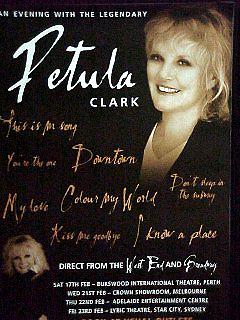
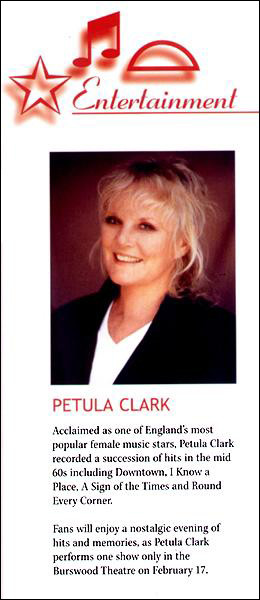
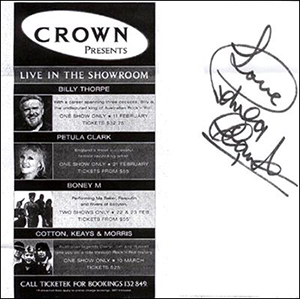
Songs Performed:
- Sign Of The Times
- Here We Are
- Colour My World
- I'm Not Afraid (A Show Stopper)!!
- Memory
- Look To The Rainbow
- How Are Things In Glocca Morra
- You And I
- Losing My Mind
- Mon Couer Qui Bat
- Kiss Me Goodbye
- Don't Sleep In The Subway INTERMISSION
- Jazz Medley
- I Concentrate On You
- I Never Do Anything Twice
- I Couldnt Live Without Your Love
- The Other Man's Grass Is Always Greener
- This Is My Song
- Tell Me Its Not True
- With One Look
- Theatre Poem
- My Love
- Downtown
Encores
- Here For You
- I Know A Place
Press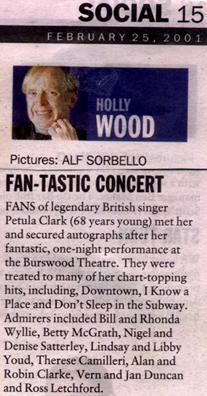

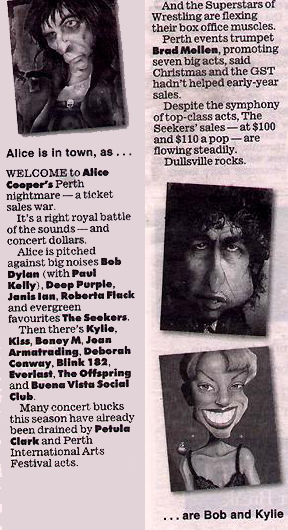
Perth

Sign of the Times

Here We Are
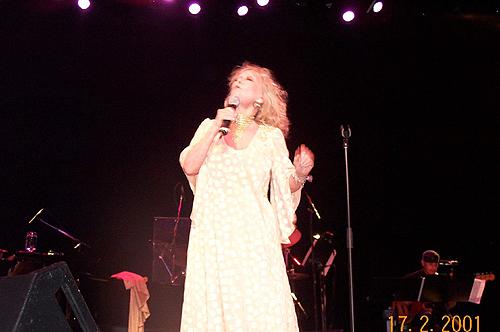
Colour My World
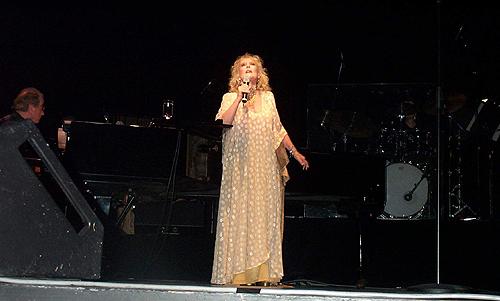
I'm Not Afraid
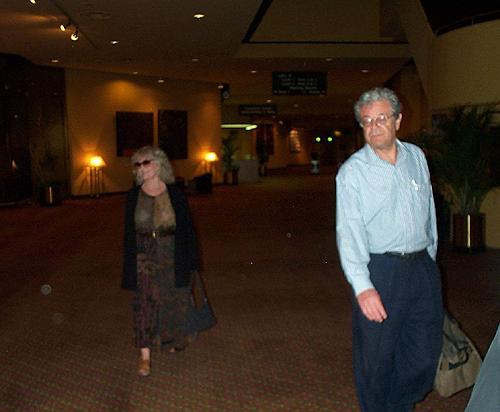
After the show - on the way to sign CD's in the foyer approximately 300 - 400 waiting.
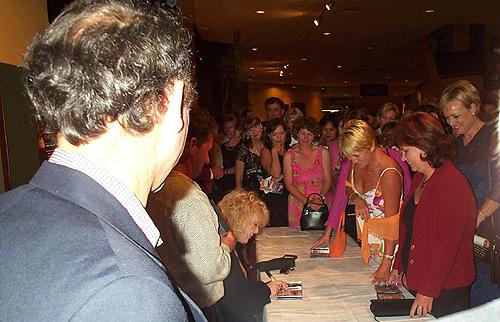
Signing copies of Legendary for fans.

All photos by Vicki Wilkinson
Melbourne
Luckman Fine Arts Center
Los Angeles, California USA
DREAM - THE SONGS OF JOHNNY MERCER - S.T.A.G.E. BENEFIT
PETULA CLARK, Rod McKuen, Margaret Whiting, Carol Cooke, Loretta Devine, Betty Garrett, Tyne Daly, Linda Purl, Sam Harris, Nancy Dussault, Franc D'Ambrosio, Davis Gaines, Jason Graae, Linda Michele, Sally Struthers, Bill Hutton, Jodi Stevens, Greg Poland and Kevin Chamberlin
Luckman Fine Arts Center
Los Angeles, California USA
DREAM - THE SONGS OF JOHNNY MERCER - S.T.A.G.E. BENEFIT PETULA CLARK, Rod McKuen, Margaret Whiting, Carol Cooke, Loretta Devine, Betty Garrett, Tyne Daly, Linda Purl, Sam Harris, Nancy Dussault, Franc D'Ambrosio, Davis Gaines, Jason Graae, Linda Michele, Sally Struthers, Bill Hutton, Jodi Stevens, Greg Poland and Kevin Chamberlin
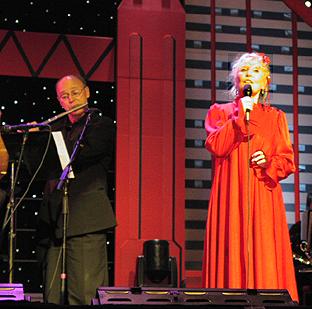
"Look, look, look to the rainbow. . ."
A Sign of the Times
Chrysler HallMay 20 - 21, 2001

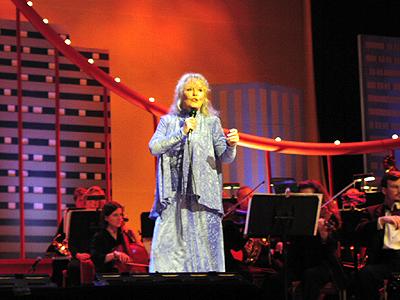
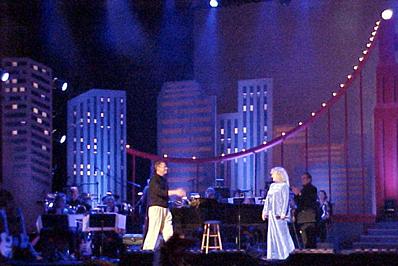

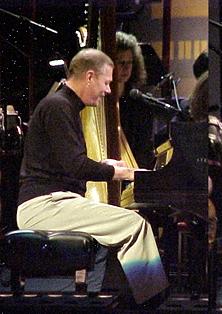
Richard Carpenter
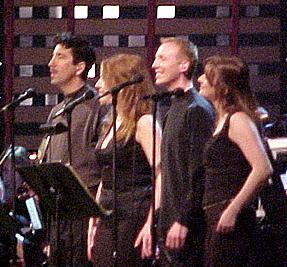
Benoit Martel, Julie Leblanc Vincent Potel, Julie St. Georges
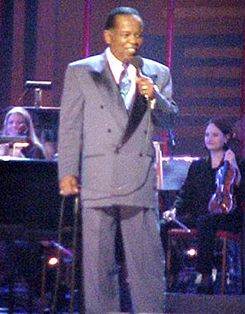
Lou Rawls
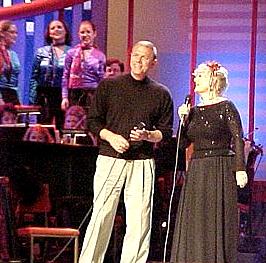

All photos by Laurie Parsons Zenobio, except as noted.
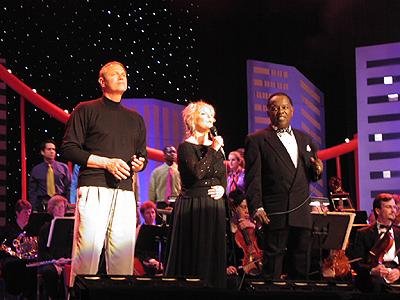
"I Couldn't Live Without Your Love"
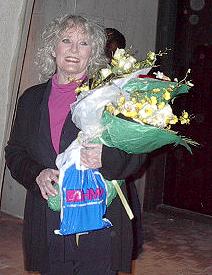
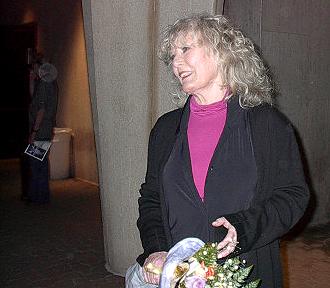
Photo by Wendy Coffin
Greeting fans outside the stage door.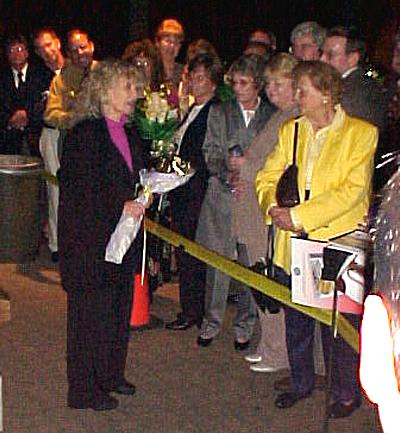
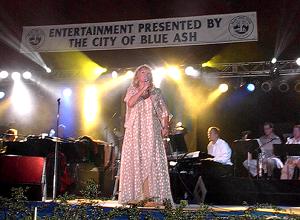
Photos by Wendy Coffin
Songs Performed:
- Sign of the Times
- Here We Are
- Colour My World
- Don't Sleep in the Subway
- This is My Song
- Look to the Rainbow
- You and I
- I Know a Place
- I Never Do Anything Twice
- I Know a Place
- Tell Me It's Not True (from Blood Brothers)
- With One Look (from Sunset Boulevard)
- My Love / Downtown
- Here for You
Encore:
- I Couldn't Live Without Your Love
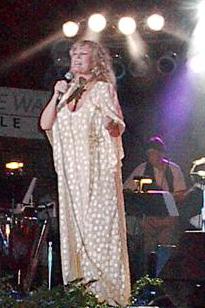
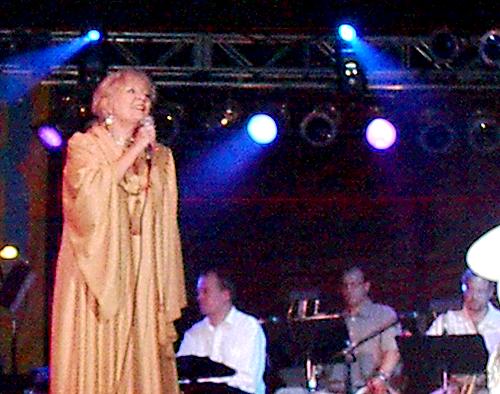
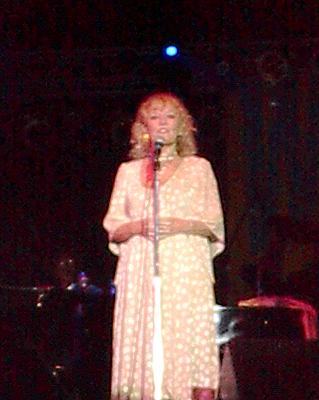

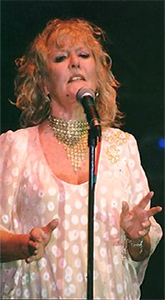
Photo by Joy Bolender
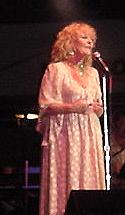
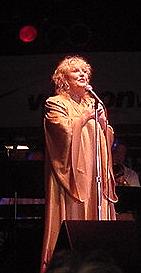

Photos by Deb Powers
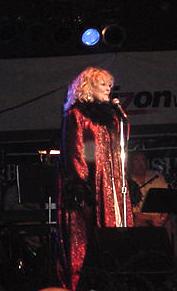
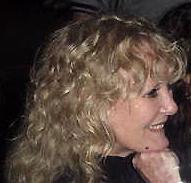
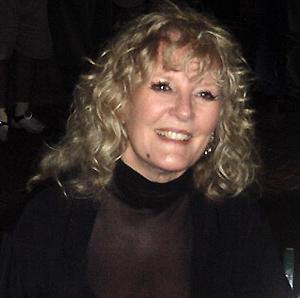
Showtime at the Stadium
20 October, 2001
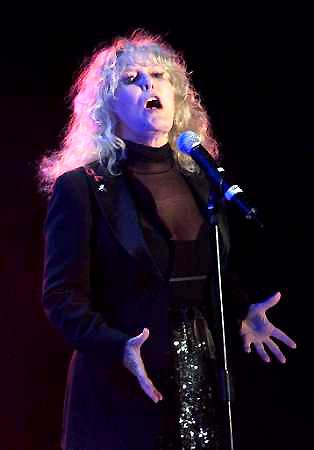
Petula performed "Tell Me It's Not True" from BLOOD BROTHERS, "With One Look" from SUNSET BOULEVARD and then joined Charlotte Church and the entire cast in the chorus of "You'll Never Walk Alone" from CAROUSEL. As she left the stage after "With One Look," the master of ceremonies exclaimed, "Petula Clark, showing us once more what a great star can do."
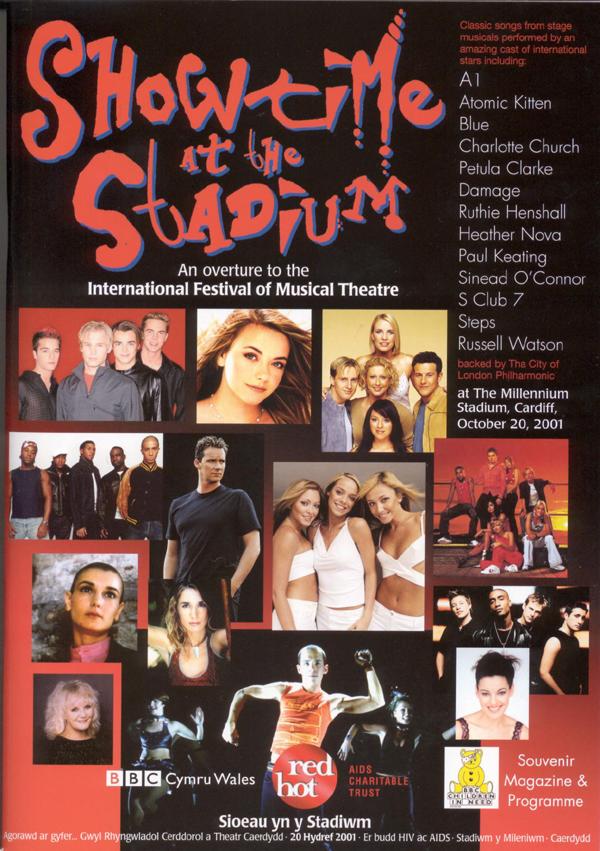
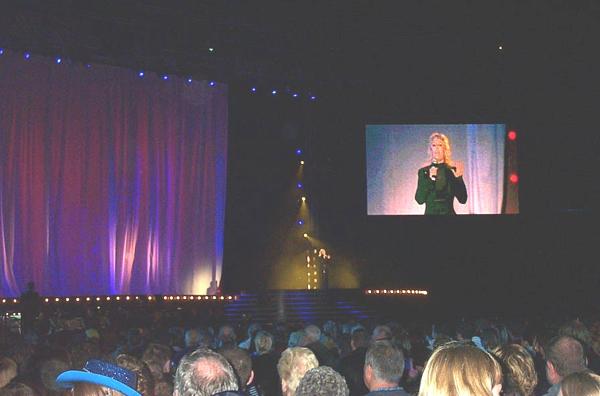 © photo by Robert Faust
© photo by Robert Faust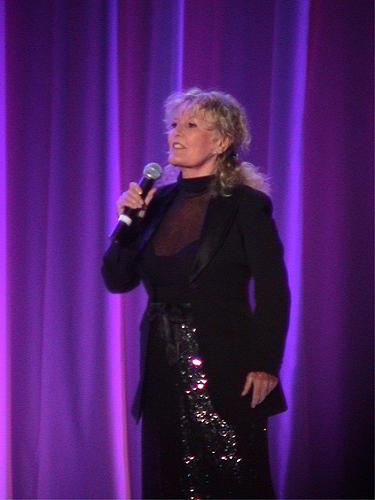
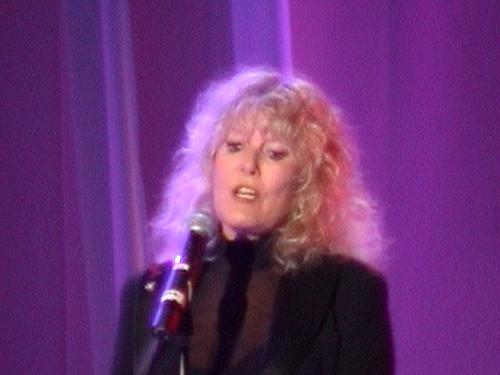
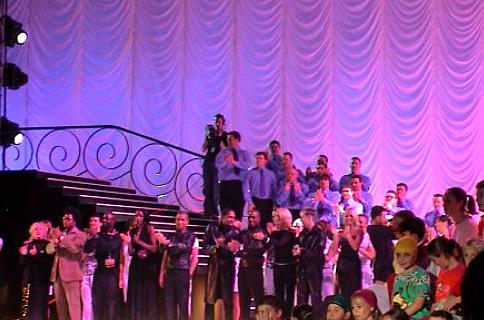
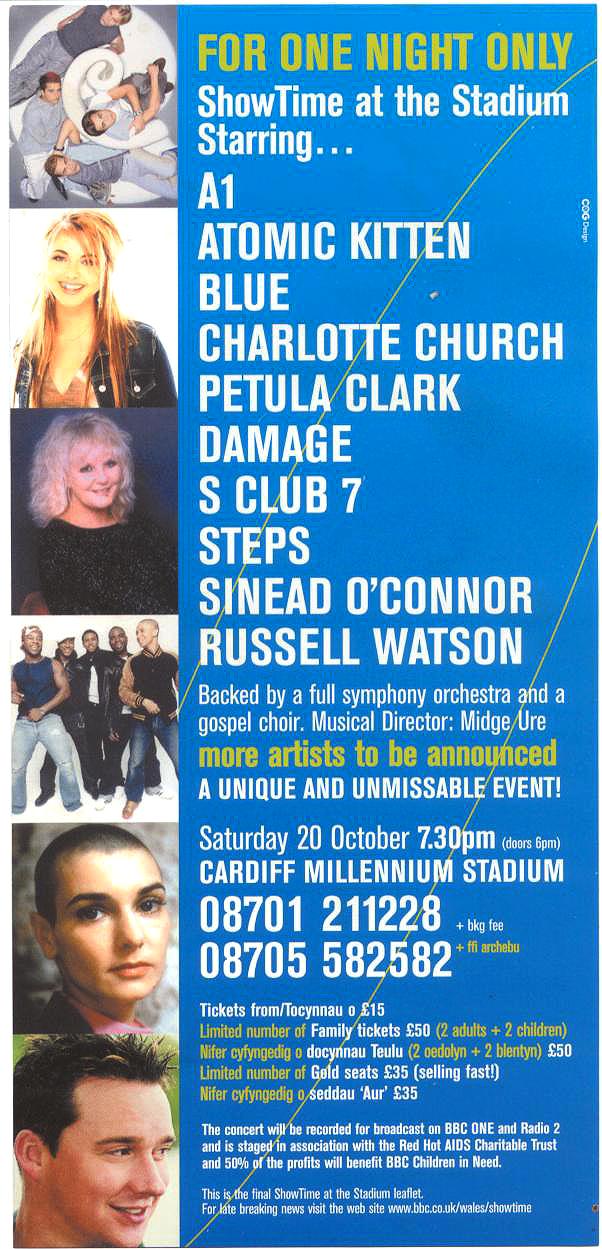
SHOWTIME AT THE STADIUM
Petula Clark takes part in a unique charity event at the Millennium Stadium, Cardiff, on October 20, 2001
"Something's coming, something good..." Stephen Sondheim
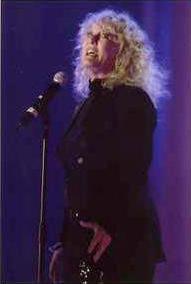

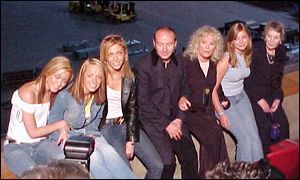 Atomic Kitten, Midge Ure, Petula, Charlotte Church, Jean Simmons
Atomic Kitten, Midge Ure, Petula, Charlotte Church, Jean Simmons
Some of the world's top musical acts will be appearing at the Millennium Stadium, Cardiff, on October 20 in a spectacular concert celebrating songs from hit musicals.
The concert will be recorded by BBC Wales to be shown on BBC One later in the year. The event is being staged in association with the Red Hot AIDS Charitable Trust.
ShowTime at The Stadium will feature contemporary artists performing classic songs from stage musicals - from West Side Story to Rent - under the guidance of Musical Director Midge Ure. The event will launch the International Festival of Musical Theatre, which will take place in Cardiff every two years from October 2002.
The show will be directed by international stage producer Francesca Zambello and artists will be backed by a 60-piece orchestra and a gospel choir. The participation of local schools and drama colleges will make the concert a truly community event.
Artists already confirmed to perform cover the entire spectrum of music from Petula Clark to Charlotte Church, with many more soon to be announced. So far, Petula is keeping secret the choice of songs she is working on.
Sets from famous musicals currently playing in London's West End and Broadway will also be featured in the spectacular.
Launching the concert Musical Director, Midge Ure said: "Although this is not Live Aid II, the thoughts, compassion and messages are very similar. Music is a great leveller that transcends religion, colour, sex and political systems. ShowTime at The Stadium is a fantastic project to be involved with and I was delighted when asked. I jumped at the chance!".
Jean Simmons, legendary actress and Patron of the Red Hot AIDS Charitable Trust, said: "It gives me great pleasure to be part of ShowTime at The Stadium where many great artists will be performing in this superb stadium in October to raise much needed funding for the global struggle against HIV and AIDS."
David Jackson, Head of Music at BBC Wales says: BBC Wales is delighted to be broadcasting this unique event for BBC One viewers. ShowTime will also be broadcast on BBC Radio2 and Radio1.
TICKETS FOR SHOWTIME AT THE STADIUM ARE AVAILABLE FROM THE MILLENNIUM STADIUM BOX OFFICE PRICED BETWEEN £15 and £35 ON 0870 1211228 or 0870 5582582
--Terry Young -- 20/8/01
The concert will be recorded by BBC Wales to be shown on BBC One later in the year. The event is being staged in association with the Red Hot AIDS Charitable Trust.
ShowTime at The Stadium will feature contemporary artists performing classic songs from stage musicals - from West Side Story to Rent - under the guidance of Musical Director Midge Ure. The event will launch the International Festival of Musical Theatre, which will take place in Cardiff every two years from October 2002.
The show will be directed by international stage producer Francesca Zambello and artists will be backed by a 60-piece orchestra and a gospel choir. The participation of local schools and drama colleges will make the concert a truly community event.
Artists already confirmed to perform cover the entire spectrum of music from Petula Clark to Charlotte Church, with many more soon to be announced. So far, Petula is keeping secret the choice of songs she is working on.
Sets from famous musicals currently playing in London's West End and Broadway will also be featured in the spectacular.
Launching the concert Musical Director, Midge Ure said: "Although this is not Live Aid II, the thoughts, compassion and messages are very similar. Music is a great leveller that transcends religion, colour, sex and political systems. ShowTime at The Stadium is a fantastic project to be involved with and I was delighted when asked. I jumped at the chance!".
Jean Simmons, legendary actress and Patron of the Red Hot AIDS Charitable Trust, said: "It gives me great pleasure to be part of ShowTime at The Stadium where many great artists will be performing in this superb stadium in October to raise much needed funding for the global struggle against HIV and AIDS."
David Jackson, Head of Music at BBC Wales says: BBC Wales is delighted to be broadcasting this unique event for BBC One viewers. ShowTime will also be broadcast on BBC Radio2 and Radio1.
TICKETS FOR SHOWTIME AT THE STADIUM ARE AVAILABLE FROM THE MILLENNIUM STADIUM BOX OFFICE PRICED BETWEEN £15 and £35 ON 0870 1211228 or 0870 5582582
--Terry Young -- 20/8/01

Petula performed:
- I Couldn't Live Without Your Love
- This is My Song (French/English)
- Coeur Blessé
- My Love / Downtown
- Kiss Me Goodbye
DIAMOND AWARDS FESTIVAL
GEORGE BAKER SELECTION
GEORGE BAKER SELECTION
-
Dear Ann
I'm On My Way
Sing A Song Of Love
Una Paloma Blanca
Morning Sky
Little Green Bag
-
The Letter
Cry Like A Baby
Choo Choo Train
-
With All My Heart
Baby Lover
Romeo
Chariot
Coeur Blessé
Downtown
C'est Ma Chanson
-
In The Summertime
Maggie
Mungo Blues
Alright Alright Alright
-
I'll Go Where Your Music Takes Me
Now Is The Time
Do The Funky Conga
-
Eenzaam Zonder Jou
Hoop Doet Leven
Hemelsblauw
Ik Ben Vrij (I Will Survive)
-
Always The Last
What If I
Holidays
Je T'Aime À Mourir
-
Clair
Get Down
Nothing Rhymed
O-Oh Baby
Matrimony
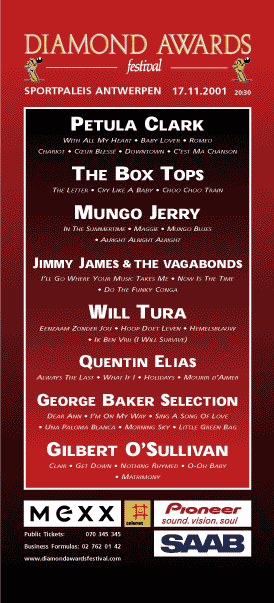
2002
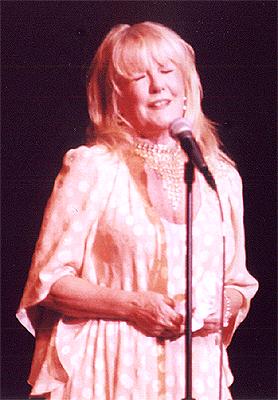
Richard & Karen Carpenter Performing Arts Center
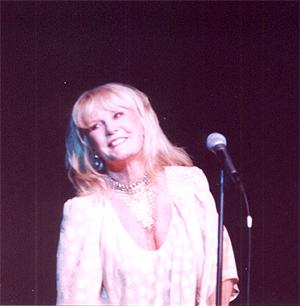
©Photos by Pat Fox
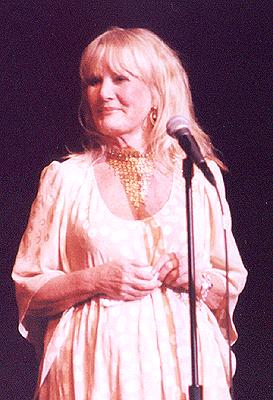
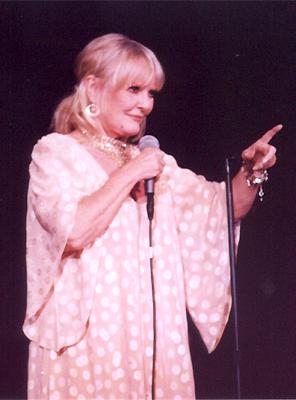

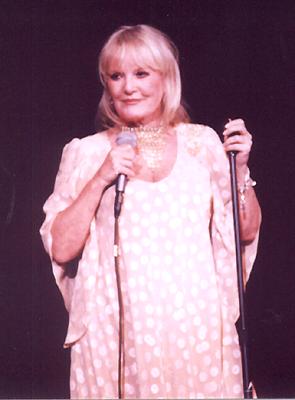
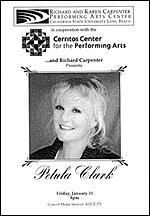

Songs Performed:
- Sign of the Times
- Here We Are
- Colour My World
- I'm Not Afraid
- Don't Sleep in the Subway
- This Is My Song
- Look to the Rainbow
- How Are Things in Gloccamorra
- You and I
- La Vie En Rose (with Petula at the piano)
- I Know a Place
- Kiss Me Goodbye
- Tell Me It"s Not True
- Jazz Medley:
If I Had You/Petula's jazz rap/Just You, Just Me - The Other Man's Grass Is Always Greener
- I Need to Be in Love (with Richard Carpenter)
- All Those Years Ago (with Richard Carpenter)
- Losing My Mind
- I Never Do Anything Twice
- With One Look
- It's a Funny Thing, the Theatre (the poem)
- My Love / Downtown
- Here for You (with Petula at the piano)

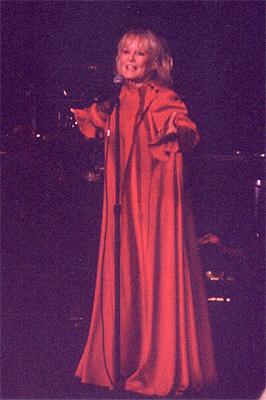
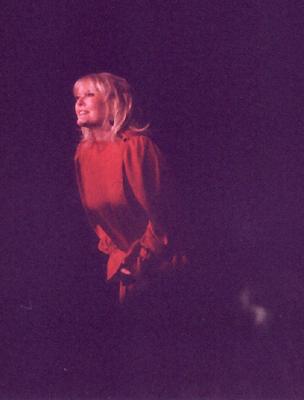 Photos by Pat Mann
Photos by Pat Mann 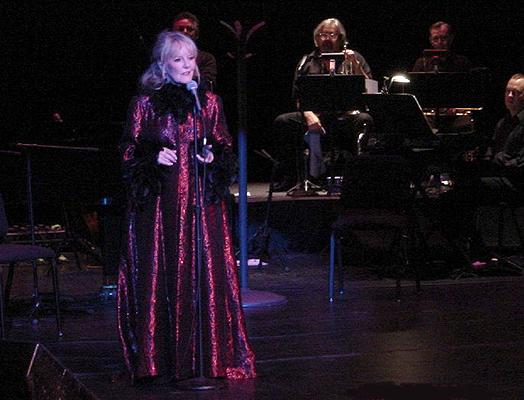
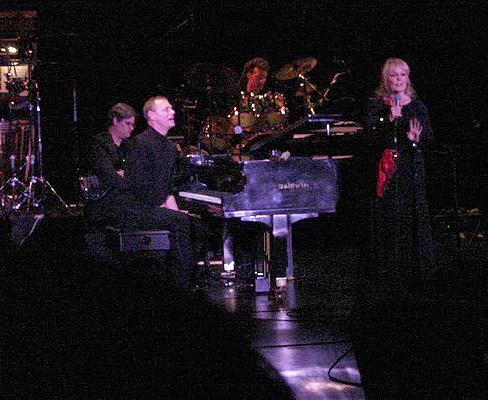 Photos by Rich Tanguy
Photos by Rich Tanguy 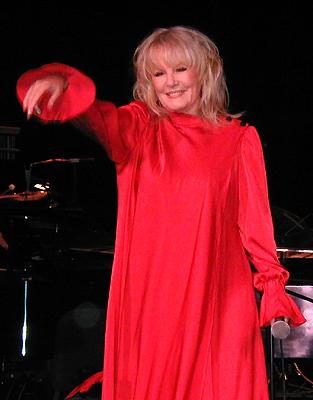
 ©Photos by David Van Densen
©Photos by David Van Densen 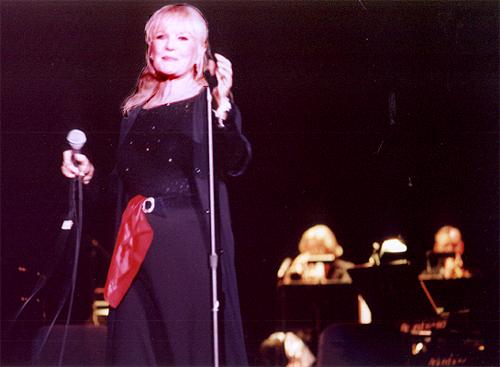
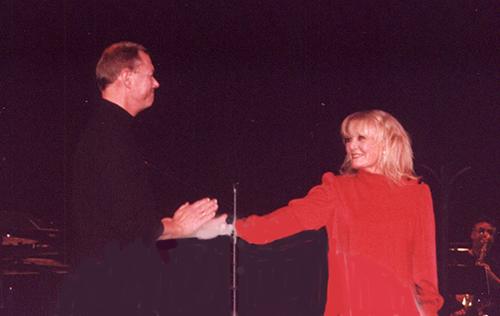
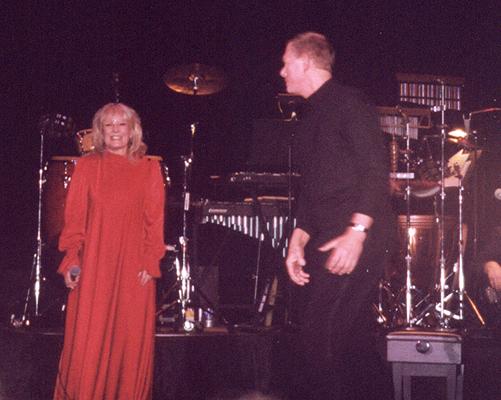

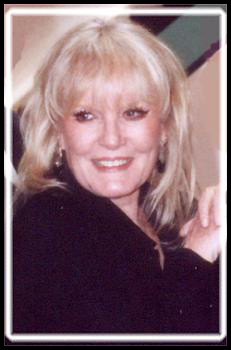 ©Photo by Bob Slavin
©Photo by Bob Slavin 
Petula and Richard with Executive Committee Member Ron Zurek of the Carpenter Center for the Performing Arts. L to R: Kevin Donnelly, Sylvia Donnelly, Richard, Petula, Ron Zurek, Julie Zurek
Photo: Ron Zurek
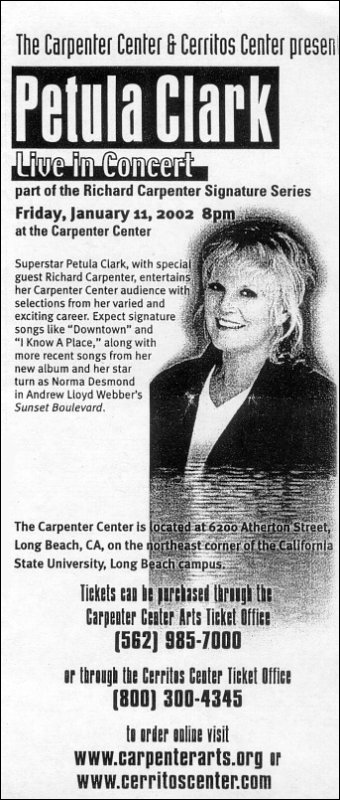
- 11 May, 2002
- 12 May, 2002
- 15 May, 2002
- 16 May, 2002
- 17 May, 2002
- 18 May, 2002
- 19 May, 2002
- 23 May, 2002
- 24 May, 2002
- 26 May, 2002
- 28 May, 2002
- 29 May, 2002
- 30 May, 2002
- 31 May, 2002
- 1 June, 2002
- 5 June, 2002
- 6 June, 2002
- 7 June, 2002
- 8 June, 2002
- 9 June, 2002
- 11 June, 2002
- 12 June, 2002
- 13 June, 2002
- 14 June, 2002
- Philharmonic Hall, Liverpool, England UK
- New Victoria Theatre, Woking, England UK
- Victoria Hall, Stoke-on-Trent, England UK
- His Majesty's Theatre, Aberdeen, Scotland UK
- Festival Theatre, Edinburgh, Scotland UK
- Royal Concert Hall, Glasgow, Scotland UK
- Opera House, Newcastle, England UK
- Pavilion Theatre, Bournemouth, England UK
- Derngate Theatre, Northampton, England UK
- Palladium, London, England UK
- Cliff's Pavillion, Southend, England UK
- The Orchard, Dartford, England
- De Montfort Hall, Leicester, England, UK
- Grand Opera House, York, England UK
- Fairfield Hall, Croydon, England UK
- Congress Theatre, Eastbourne, England UK
- Bridgewater Hall, Manchester, England UK
- Hexagon Theatre, Reading, England UK
- Royal Concert Hall, Nottingham, England UK
- Symphony Hall, Birmingham, England UK
- National Concert Hall, Dublin, Ireland, UK
- Waterfront Hall, Belfast Northern Ireland, UK
- Millennium Forum, Derry, Northern Ireland, UK
- St. George's Hall, Bradford, England, UK
- 11 May, 2002
- 12 May, 2002
- 15 May, 2002
- 16 May, 2002
- 17 May, 2002
- 18 May, 2002
- 19 May, 2002
- 23 May, 2002
- 24 May, 2002
- 26 May, 2002
- 28 May, 2002
- 29 May, 2002
- 30 May, 2002
- 31 May, 2002
- 1 June, 2002
- 5 June, 2002
- 6 June, 2002
- 7 June, 2002
- 8 June, 2002
- 9 June, 2002
- 11 June, 2002
- 12 June, 2002
- 13 June, 2002
- 14 June, 2002
- Philharmonic Hall, Liverpool, England UK
- New Victoria Theatre, Woking, England UK
- Victoria Hall, Stoke-on-Trent, England UK
- His Majesty's Theatre, Aberdeen, Scotland UK
- Festival Theatre, Edinburgh, Scotland UK
- Royal Concert Hall, Glasgow, Scotland UK
- Opera House, Newcastle, England UK
- Pavilion Theatre, Bournemouth, England UK
- Derngate Theatre, Northampton, England UK
- Palladium, London, England UK
- Cliff's Pavillion, Southend, England UK
- The Orchard, Dartford, England
- De Montfort Hall, Leicester, England, UK
- Grand Opera House, York, England UK
- Fairfield Hall, Croydon, England UK
- Congress Theatre, Eastbourne, England UK
- Bridgewater Hall, Manchester, England UK
- Hexagon Theatre, Reading, England UK
- Royal Concert Hall, Nottingham, England UK
- Symphony Hall, Birmingham, England UK
- National Concert Hall, Dublin, Ireland, UK
- Waterfront Hall, Belfast Northern Ireland, UK
- Millennium Forum, Derry, Northern Ireland, UK
- St. George's Hall, Bradford, England, UK
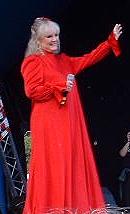
Pride Weekend
in
Brighton & Hove
Saturday, 10 August, 2002 "The heavens opened, the rain came down and a thunderstorm turned Preston Park into a mudbath. But nothing could wash out Britain's biggest free gay celebration."
This is Brighton & Hove
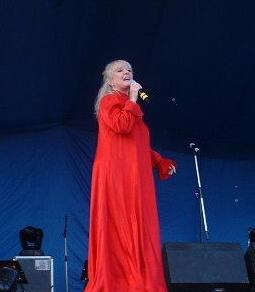 I Know a Place
I Know a Place

 Don't Sleep in the Subway
Don't Sleep in the Subway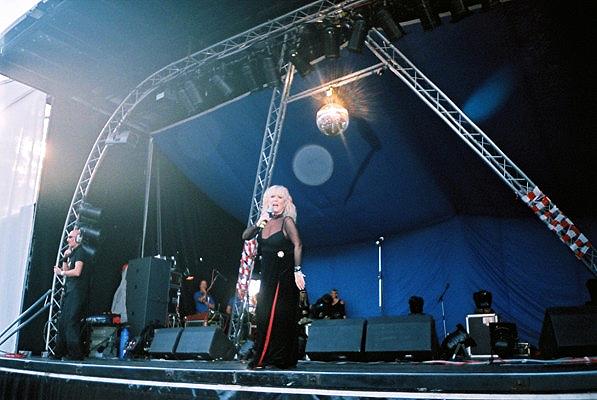 Memories of Love
Memories of LovePhotos by Mike Jones & Martin Wilson
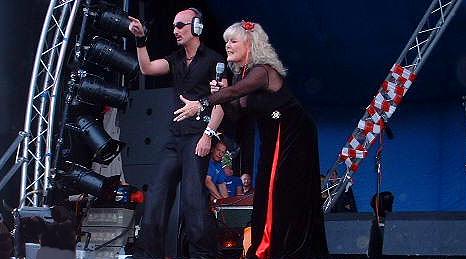 Downtown
Downtown
 Patula and fan Martin Wilson
Patula and fan Martin Wilson
 Downtown
Downtown Patula and fan Martin Wilson
Patula and fan Martin Wilson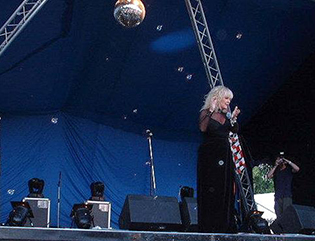 I Couldn't Live Without Your Love
I Couldn't Live Without Your Love2003
The Regent Wall Street Hotel
New York, New York USA
Wall Street Rising
First Annual Leadership Awards in New York City. Twice interrupted by applause for her performance of "Downtown", Petula also debuted "Starting All Over Again", her tribute song to September 11th, which was met with a very emotional response from the attendees
The Regent Wall Street Hotel
New York, New York USA
Wall Street Rising
First Annual Leadership Awards in New York City. Twice interrupted by applause for her performance of "Downtown", Petula also debuted "Starting All Over Again", her tribute song to September 11th, which was met with a very emotional response from the attendees
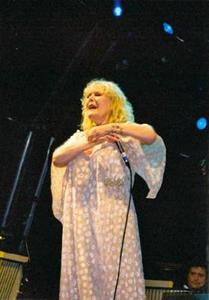 Photo by Phil Meehan
Photo by Phil Meehan
Wyvern FM's Classical Picnic & Prom Extravaganza
Sunday, June 1, 2003Worcestershire County Cricket Club
Worcester, England
Dazzling
The festivities continued at the classical event, last night, with Petula Clark giving a dazzling hour-long performance with the English National Orchestra.
The 2,000 strong crowd cheered, danced and waved their Union Jacks and St George flags, as the concert came to a colourful, noisy end with a spectacular firework display.
Conductor Jae Alexander led the orchestra through classic pieces including the March of the Toreadors, the 1812 Overture and The Hornpipe.
Soprano Sarah Ryan gave emotive performances of Rule Britannia, Jerusalem, and Land of Hope and Glory.
. . .The festivities climaxed with a late evening firework display. . .
The festivities continued at the classical event, last night, with Petula Clark giving a dazzling hour-long performance with the English National Orchestra.
The 2,000 strong crowd cheered, danced and waved their Union Jacks and St George flags, as the concert came to a colourful, noisy end with a spectacular firework display.
Conductor Jae Alexander led the orchestra through classic pieces including the March of the Toreadors, the 1812 Overture and The Hornpipe.
Soprano Sarah Ryan gave emotive performances of Rule Britannia, Jerusalem, and Land of Hope and Glory.
. . .The festivities climaxed with a late evening firework display. . .
Carnegie HallNew York, New York USA
There'll Be Another Spring: A Tribute to Miss Peggy Lee
Nancy Sinatra, Ann Hampton Calloway, Freddy Cole, Deborah Harry, Dee Dee Bridgewater, Rita Moreno, Chris Connor, Shirley Horn, Peter Cincotti, PETULA CLARK, Maria Muldaur, Eric Comstock, Cy Coleman, Corky Hale, Jackie Cain, Marian McPartland.
Carnegie HallNew York, New York USA
There'll Be Another Spring: A Tribute to Miss Peggy Lee
Nancy Sinatra, Ann Hampton Calloway, Freddy Cole, Deborah Harry, Dee Dee Bridgewater, Rita Moreno, Chris Connor, Shirley Horn, Peter Cincotti, PETULA CLARK, Maria Muldaur, Eric Comstock, Cy Coleman, Corky Hale, Jackie Cain, Marian McPartland.
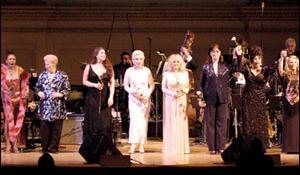
Left to right: Dee Dee Bridgewater, Chris Connor, Jane Monheit, Deborah Harry, Petula Clark, Ann Hampton Callaway, Maria Muldaur, and Nancy Sinatra.
Photo by Richard Termine
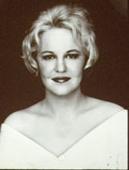
 June 25, 2003
June 25, 2003By Frank Scheck
In a stirring example of the sort of show it does best, the JVC Jazz Festival presented this affectionate tribute to one of the most important figures in popular music. "There'll Be Another Spring: A Tribute to Miss Peggy Lee" featured an all-star cast performing songs both associated with and written by the late singer, who performed at the festival in 1995.
Produced by Richard Barone (the former leader of the Bongos, and an interesting choice), the show featured a gallery of Lee's contemporaries as well as younger singers eager to pay their respects. Backed by a small orchestra led by Mike Renzi and anchored by the stalwart rhythm section of Bucky Pizzarelli (guitar), Jay Leonhart (bass) and Grady Tate (drums), the show featured songs from every period in her career, from "Why Don't You Do Right?" -- her first hit with Benny Goodman, here delivered with the proper swagger by Nancy Sinatra -- to the fascinatingly quirky "Is That All There Is?"
After an introduction by Lee's daughter, Nicki Lee Foster, and a video montage depicting the highlights of her career, the well-paced show featured a succession of strong performances: Ann Hampton Calloway delightedly vamped her way through "Manana"; Freddy Cole applied his smooth gravel to "I Don't Know Enough About You"; Rita Moreno sang "Don't Smoke in Bed" with seductive restraint while later dancing and rapping rather incongruously through "New York City Blues"; Dee Dee Bridgewater brought down the house with such Lee signature tunes as "Black Coffee" and the sultry "Fever"; Maria Muldaur, who recently released a Lee tribute album, delivered the bluesy "I'm a Woman" in earthy style; and Petula Clark showed off her still-distinctive pipes with Lee songs like "Things Are Swingin'."
Shirley Horn, performing in a wheelchair, demonstrated her subtle but mesmerizing vocal approach on "The Folks Who Live on the Hill," while Deborah Harry, who by now bears something of a resemblance to Lee, proved that more is less with her physically suggestive, too-effortful take on "Lover." Harry did later acquit herself with an entertaining duet with Sinatra on a medley of songs co-written by Lee for "The Lady and the Tramp." It was introduced by a promotional video featuring Walt Disney, more than a little ironic considering the singer's late- in-life lawsuit against his company.
Such younger performers as Peter Cincotti, infusing "I Love Being Here With You" with his high-spirited swinging, and Jane Monheit, applying her gorgeous vocals to "Sweet Happy Life," demonstrated the continuity of pop traditions. Less successful was singer Eric Comstock, who blandly worked his way through "I'm in Love Again" and "The Shining Sea," though admittedly he was filling in on short notice for an absent Bea Arthur on the latter.
The best moments came from Lee's contemporaries, such as Chris Connor - - who movingly sang "Where Can I Go Without You?" -- and Jackie Cain and Marian McPartland, who duetted on the little-known Lee/McPartland composition "In the Days of Our Love." And composer Cy Coleman, who co- wrote several songs with Lee, delivered several numbers in his less than agile but highly enthusiastic voice.
Wisely, nobody attempted Lee's signature number, "Is That All There Is?" Instead, after an introduction from Mike Stoller, the song's co- writer, a video of Lee herself performing the song was shown. Filing onstage to watch the clip with rapt adoration, the entire ensemble capped off the evening with a touching group rendition of "I'll Be Seeing You."
Produced by Richard Barone (the former leader of the Bongos, and an interesting choice), the show featured a gallery of Lee's contemporaries as well as younger singers eager to pay their respects. Backed by a small orchestra led by Mike Renzi and anchored by the stalwart rhythm section of Bucky Pizzarelli (guitar), Jay Leonhart (bass) and Grady Tate (drums), the show featured songs from every period in her career, from "Why Don't You Do Right?" -- her first hit with Benny Goodman, here delivered with the proper swagger by Nancy Sinatra -- to the fascinatingly quirky "Is That All There Is?"
After an introduction by Lee's daughter, Nicki Lee Foster, and a video montage depicting the highlights of her career, the well-paced show featured a succession of strong performances: Ann Hampton Calloway delightedly vamped her way through "Manana"; Freddy Cole applied his smooth gravel to "I Don't Know Enough About You"; Rita Moreno sang "Don't Smoke in Bed" with seductive restraint while later dancing and rapping rather incongruously through "New York City Blues"; Dee Dee Bridgewater brought down the house with such Lee signature tunes as "Black Coffee" and the sultry "Fever"; Maria Muldaur, who recently released a Lee tribute album, delivered the bluesy "I'm a Woman" in earthy style; and Petula Clark showed off her still-distinctive pipes with Lee songs like "Things Are Swingin'."
Shirley Horn, performing in a wheelchair, demonstrated her subtle but mesmerizing vocal approach on "The Folks Who Live on the Hill," while Deborah Harry, who by now bears something of a resemblance to Lee, proved that more is less with her physically suggestive, too-effortful take on "Lover." Harry did later acquit herself with an entertaining duet with Sinatra on a medley of songs co-written by Lee for "The Lady and the Tramp." It was introduced by a promotional video featuring Walt Disney, more than a little ironic considering the singer's late- in-life lawsuit against his company.
Such younger performers as Peter Cincotti, infusing "I Love Being Here With You" with his high-spirited swinging, and Jane Monheit, applying her gorgeous vocals to "Sweet Happy Life," demonstrated the continuity of pop traditions. Less successful was singer Eric Comstock, who blandly worked his way through "I'm in Love Again" and "The Shining Sea," though admittedly he was filling in on short notice for an absent Bea Arthur on the latter.
The best moments came from Lee's contemporaries, such as Chris Connor - - who movingly sang "Where Can I Go Without You?" -- and Jackie Cain and Marian McPartland, who duetted on the little-known Lee/McPartland composition "In the Days of Our Love." And composer Cy Coleman, who co- wrote several songs with Lee, delivered several numbers in his less than agile but highly enthusiastic voice.
Wisely, nobody attempted Lee's signature number, "Is That All There Is?" Instead, after an introduction from Mike Stoller, the song's co- writer, a video of Lee herself performing the song was shown. Filing onstage to watch the clip with rapt adoration, the entire ensemble capped off the evening with a touching group rendition of "I'll Be Seeing You."

 Photos by Laurie Parsons Zenobio
Photos by Laurie Parsons ZenobioSong List
- Who Am I
- Wedding Song
- Don't Sleep in the Subway
- I'm Not Afraid
- This is My Song
- I Know a Place
- Look to the Rainbow
- Sixties Medley
- Tell Me It's Not True
- Jazz Medley
(If I Had You/Just You, Just Me) - Starting All Over Again
- Sign of the Times
- Theatre Poem
- Losing My Mind
- With One Look
- Love Medley
-
Downtown
Encores:
- Here for You
- I Couldn't Live Without Your Love
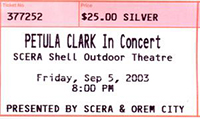
 A view of the crowd.
A view of the crowd. 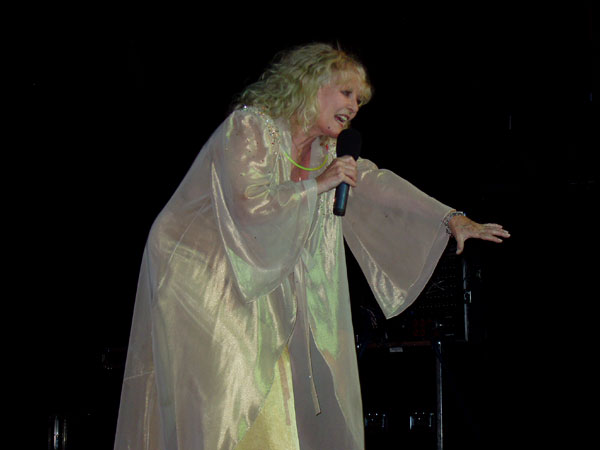
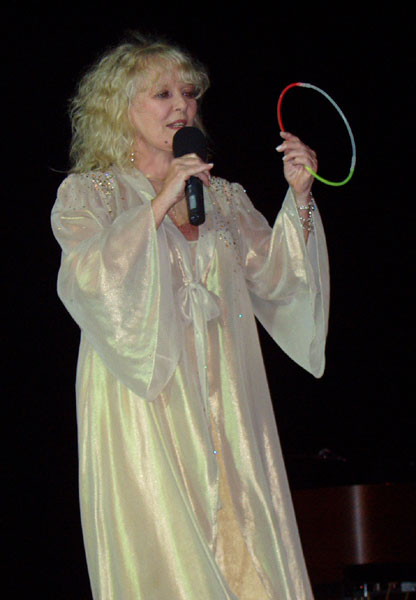 Admiring a gift from a young fan.
Admiring a gift from a young fan.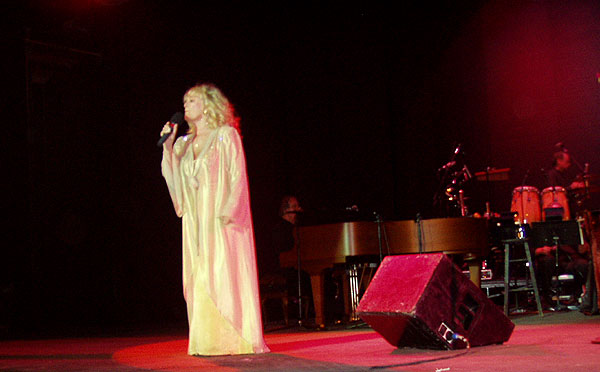
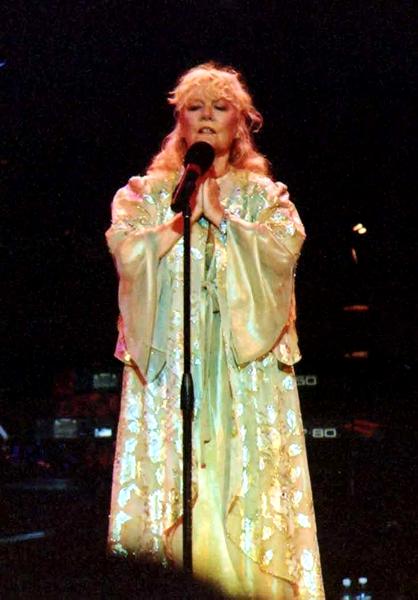
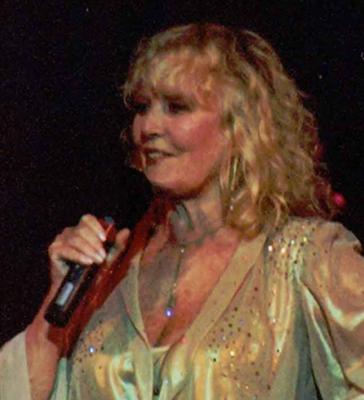 Photos by Michael Holmstrom
Photos by Michael Holmstrom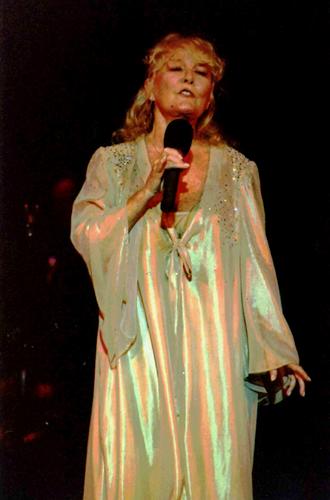
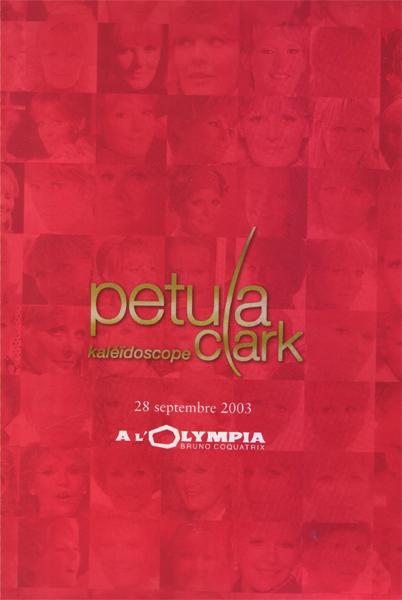
 VIVRE photo by Jean-Michel Barrault
VIVRE photo by Jean-Michel Barrault Photo by Pat Fox
Photo by Pat Fox 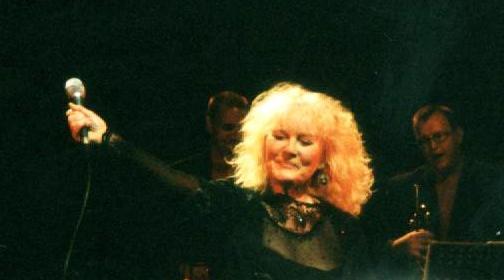 Photo by Daniel Bédard
Photo by Daniel Bédard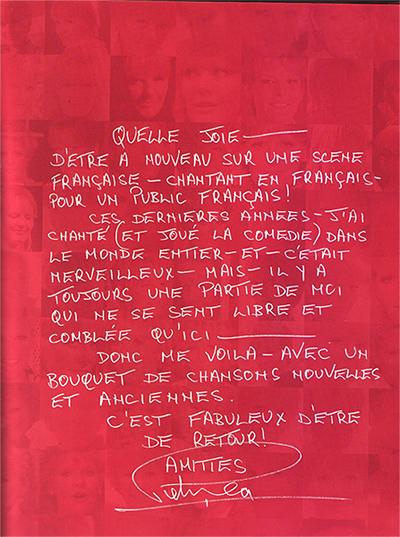
 Photo by Pat Fox
Photo by Pat Fox Program note translation:
What joy--
to be on a French stage--singing in French--
for a French audience! These last few years I have sung (and starred in plays) throughout the entire world-- and it has been marvelous--but--there has always been a part of me that did not feel free and complete, except here--
So here we are-- with a bouquet of new and old songs
It's fabulous to be back!
Love,
Petula
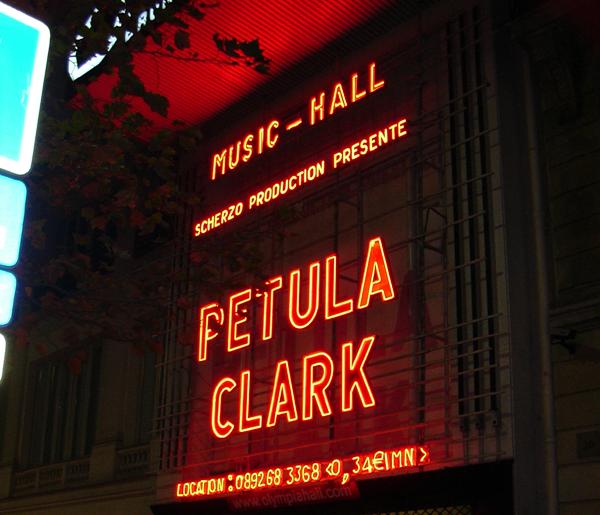 Photo by Jean-Michel Barrault
Photo by Jean-Michel Barrault
Set 1
- Overture (Recommencer à zèro/Romêo/C'est ma chanson/Que fais-tu là Petula/Chariot)
- Recommencer à zero
- French Medley (Je me sens bien apres de toi - Romeo - Bleu, blanc, rouge - Je me sens bien apres de toi
- I'm Not Afraid
- Nous etions tous des enfants (New piece on her childhood and the early years, based on the one from Montreal, but very different melody
- Un Enfant
- Look to the Rainbow
- You & I
- Que Fais-tu la, Petula?
- SOS Mozart (lovely new Pierre Delanoe song)
- Don't Sleep in the Subway
- Another French medley (Prends Mon Coeur/A London/Marin/Ya Ya Twist/Chariot)
- C'est ma chanson
Set 2
- If I Had You/Just You, Just Me
(rap section in French)
- Coeur Blessé
- Gainsbourg Medley - La Chanson de Gainsbourg/O o Sheriff/ La Gadoue
- La Nuit n'en finit plus
La Nuit n'en finit plus
(who says she never does anything twice?)
- Tell Me it's Not True
- With One Look
- Vivre
- I Know a Place
- Sign of the Times
- Downtown
Encores:
- Here for You (French & English)
- Dis-moi au revoir (Kiss Me Goodbye)
- I Couldn't Live without Your Love
Additional curtain calls followed (she came and went off stage several times, and then had 2 additional curtain calls)
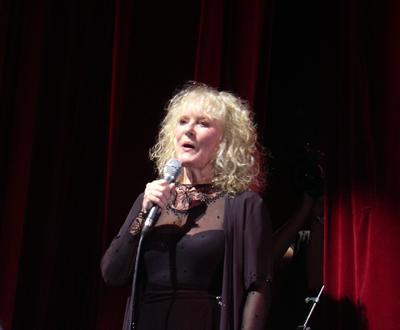 Photo by Jean-Michel Barrault
Photo by Jean-Michel Barrault 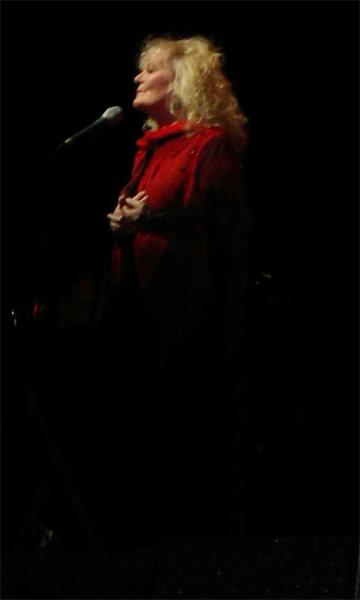 Photo by Marie-Jeanne Boyer
Photo by Marie-Jeanne Boyer 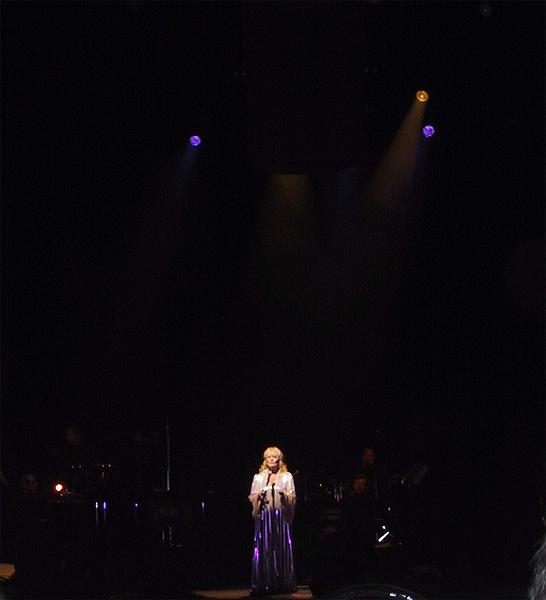 Photo by Jérôme Guerin
Photo by Jérôme Guerinjerome.guerin8@wanadoo.fr
 Photo by Marie-Jeanne Boyer
Photo by Marie-Jeanne Boyer 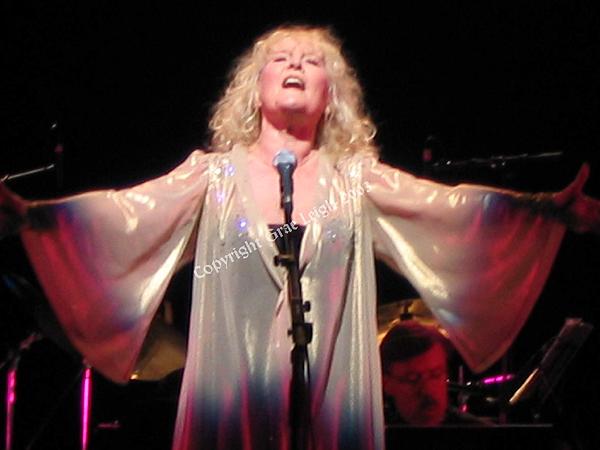
 ©Photos by Grae Leigh
©Photos by Grae Leigh 
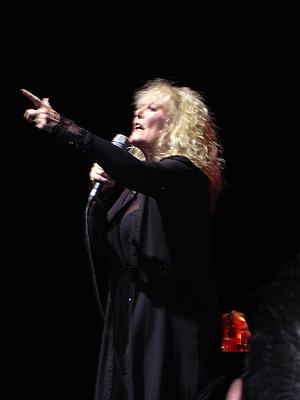
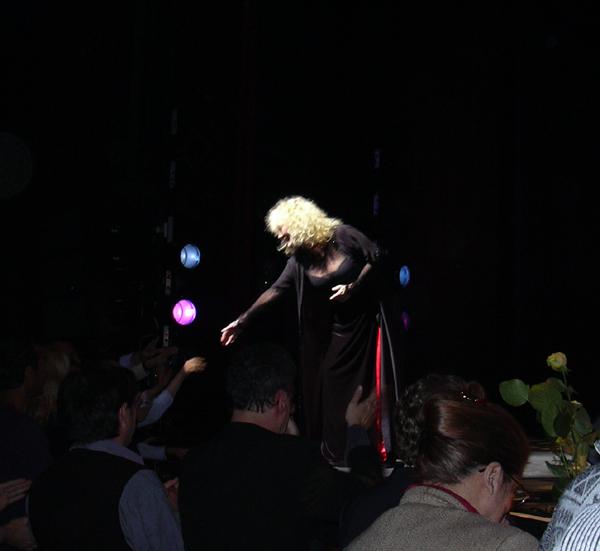 ©Photos by Jean-Michel Barrault
©Photos by Jean-Michel Barrault 
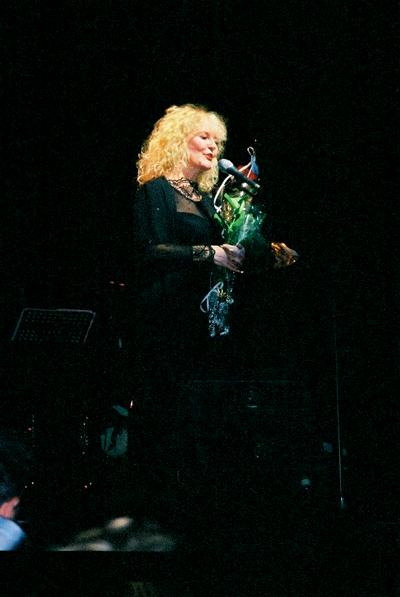 Photo by Phil Meehan
Photo by Phil Meehan 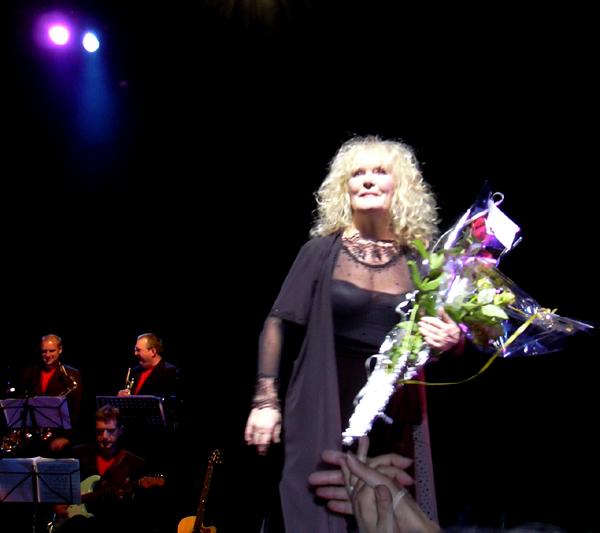 ©Photo by Jean-Michel Barrault
©Photo by Jean-Michel Barrault 
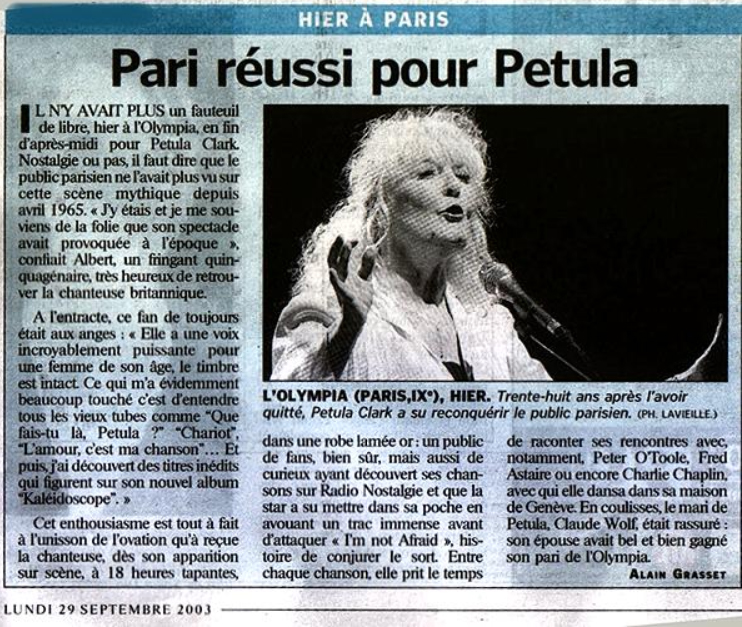
SUCCESS FOR PETULA'S GAMBLE
There wasn't a single empty seat for Petula Clark at the Olympia late yesterday afternoon. Nostalgia or not, it has to be said that Parisians had not seen her on this legendary stage since April 1965. "I was there and I remember the excitement that her performance created at the time" said Albert, a dashing man in his fifties who was very happy to see the English singer again.
In the interval, this lifelong fan was in seventh heaven. "She has a voice which is unbelievably powerful for a woman of her years, the tone is unimpaired. Obviously, what pleased me was to hear all the old hits like "Que fais-tu la, Petula?", "Chariot" and "C'est ma chanson"....And then I have found songs that hadn't been out before on her new album "Kaleidoscope".
This enthusiasm is totally consistent with the ovation which the singer received when she came on stage at 6p.m. on the dot in a shimmering gold dress: an audience of fans, of course, but also some with an interest arising from hearing her songs on Radio Nostalgie and whom the star was able to win over by confessing to huge nerves before going into "I'm not afraid", the story of how she overcame her natural shyness. Between each song, she told of her contacts with, in particular, Peter O'Toole, Fred Astaire and Charlie Chaplin, with whom she danced at his home in Geneva. In the wings, Petula's husband, Claude Wolff, was heartened: his wife had well and truly pulled off her gamble with the Olympia.
Caption: OLYMPIA, YESTERDAY. Thirty-eight years after leaving them, Petula Clark won Parisians back.
English translation by Peter Marren
There wasn't a single empty seat for Petula Clark at the Olympia late yesterday afternoon. Nostalgia or not, it has to be said that Parisians had not seen her on this legendary stage since April 1965. "I was there and I remember the excitement that her performance created at the time" said Albert, a dashing man in his fifties who was very happy to see the English singer again.
In the interval, this lifelong fan was in seventh heaven. "She has a voice which is unbelievably powerful for a woman of her years, the tone is unimpaired. Obviously, what pleased me was to hear all the old hits like "Que fais-tu la, Petula?", "Chariot" and "C'est ma chanson"....And then I have found songs that hadn't been out before on her new album "Kaleidoscope".
This enthusiasm is totally consistent with the ovation which the singer received when she came on stage at 6p.m. on the dot in a shimmering gold dress: an audience of fans, of course, but also some with an interest arising from hearing her songs on Radio Nostalgie and whom the star was able to win over by confessing to huge nerves before going into "I'm not afraid", the story of how she overcame her natural shyness. Between each song, she told of her contacts with, in particular, Peter O'Toole, Fred Astaire and Charlie Chaplin, with whom she danced at his home in Geneva. In the wings, Petula's husband, Claude Wolff, was heartened: his wife had well and truly pulled off her gamble with the Olympia.
Caption: OLYMPIA, YESTERDAY. Thirty-eight years after leaving them, Petula Clark won Parisians back.
English translation by Peter Marren
 © Doug McKenzie Photography
© Doug McKenzie Photography



PETULA CLARK'S showbiz career started in the mid 30's and by her eighth birthday the child singer and actress was already a British 'star'. Since those early days she has achieved outstanding success over many years, initially on radio, then in films, then with hit records, then more films plus television, musical theatre, concerts and songwriting.
In June 1954, after starring in a long list of British films, she had her first hit record with "The Little Shoemaker." In the early 60's, whilst enjoying a constant stream of UK successes such as "Sailor" and Romeo" la Petu-la conquered France then swept through other European countries seducing everyone with her irresistable appeal. Late in 1964 her career took a new and vital direction when "Downtown" topped the USA charts, selling more than 3 million singles worldwide, over a million in the States alone. This earned her a coveted Grammy, the first British female singer to win this Award.
Further hit records and popularity in the States found her performing concers in the cities, seasons in the gambling capitals, more films, dozens of television appearances including her own series and specials.
Meanwhile, the rest of the world, especially the UK also wanted Petula and this required astute management and some pretty exhausting travel schedules. Throughout this busy period Pet also managed to raise a family.
Of particular note within an amazing career are her fine stage performances as Maria in "The Sound of Music", Mrs. Johnstone in "Blood Brothers" and for me, the best 'Norma Desmond' of all in "Sunset Boulevard."
2003 and Petula (honoured with a CBE in 1998) continues to fill her life with recording, writing songs, guest appearances, travelling (lots of that) and regularly performing her own wonderful one-woman concerts.
Needless to say, I adore her and I'm forever in her debt for the encouragement and inspiration she gave me.
Tony Hatch
In June 1954, after starring in a long list of British films, she had her first hit record with "The Little Shoemaker." In the early 60's, whilst enjoying a constant stream of UK successes such as "Sailor" and Romeo" la Petu-la conquered France then swept through other European countries seducing everyone with her irresistable appeal. Late in 1964 her career took a new and vital direction when "Downtown" topped the USA charts, selling more than 3 million singles worldwide, over a million in the States alone. This earned her a coveted Grammy, the first British female singer to win this Award.
Further hit records and popularity in the States found her performing concers in the cities, seasons in the gambling capitals, more films, dozens of television appearances including her own series and specials.
Meanwhile, the rest of the world, especially the UK also wanted Petula and this required astute management and some pretty exhausting travel schedules. Throughout this busy period Pet also managed to raise a family.
Of particular note within an amazing career are her fine stage performances as Maria in "The Sound of Music", Mrs. Johnstone in "Blood Brothers" and for me, the best 'Norma Desmond' of all in "Sunset Boulevard."
2003 and Petula (honoured with a CBE in 1998) continues to fill her life with recording, writing songs, guest appearances, travelling (lots of that) and regularly performing her own wonderful one-woman concerts.
Needless to say, I adore her and I'm forever in her debt for the encouragement and inspiration she gave me.
Tony Hatch
2004
- 26 February, 2004
- 27-28 February
- 29 February, 2004
- 5 March, 2004
- 6 March, 2004
- 7 March, 2004
- 12 March, 2004
- 13 March, 2004
- 17 March, 2004
- 19 March, 2004
- 20 March, 2004
- Brisbane Concert Hall, Brisbane, AUSTRALIA
- Twin Towns Services Club, Gold Coast, AUSTRALIA
- Empire Theatre, Toowoomba, AUSTRALIA
- Town Hall, Christchurch, NEW ZEALAND
- Bruce Mason Centre, Auckland, NEW ZEALAND
- Founder's Theatre, Hamilton, AUSTRALIA
- Concert Hall, Melbourne, AUSTRALIA
- Lyric Theatre, Star City Casino, Sydney, AUSTRALIA
- Civic Theatre, Newcastle, AUSTRALIA
- Canberra Theatre, Canberra, AUSTRALIA
- Entertainment Centre, Wollongong, AUSTRALIA
- 26 February, 2004
- 27-28 February
- 29 February, 2004
- 5 March, 2004
- 6 March, 2004
- 7 March, 2004
- 12 March, 2004
- 13 March, 2004
- 17 March, 2004
- 19 March, 2004
- 20 March, 2004
- Brisbane Concert Hall, Brisbane, AUSTRALIA
- Twin Towns Services Club, Gold Coast, AUSTRALIA
- Empire Theatre, Toowoomba, AUSTRALIA
- Town Hall, Christchurch, NEW ZEALAND
- Bruce Mason Centre, Auckland, NEW ZEALAND
- Founder's Theatre, Hamilton, AUSTRALIA
- Concert Hall, Melbourne, AUSTRALIA
- Lyric Theatre, Star City Casino, Sydney, AUSTRALIA
- Civic Theatre, Newcastle, AUSTRALIA
- Canberra Theatre, Canberra, AUSTRALIA
- Entertainment Centre, Wollongong, AUSTRALIA
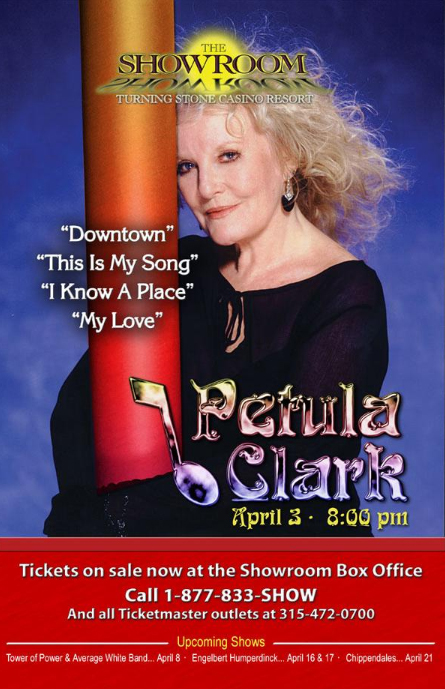
Song List
- Who Am I
- Wedding Song
- Don't Sleep in The Subway
- Im Not Afraid
- Smile/Eternally/This Is My Song
- I Know A Place
- Look To the Rainbow
- You And I
- Colour My World
- Tell Me Its Not True
- With One Look
- Sign Of The Times
- It's a Funny Thing the Theatre (Poem)
- I Never Do Anything Twice
- Sounds of Love Medley
You'd Better Come Home - Kiss Me Goodbye - My Love - Downtown
- Here For You
- I Couldn't Live Without Your Love
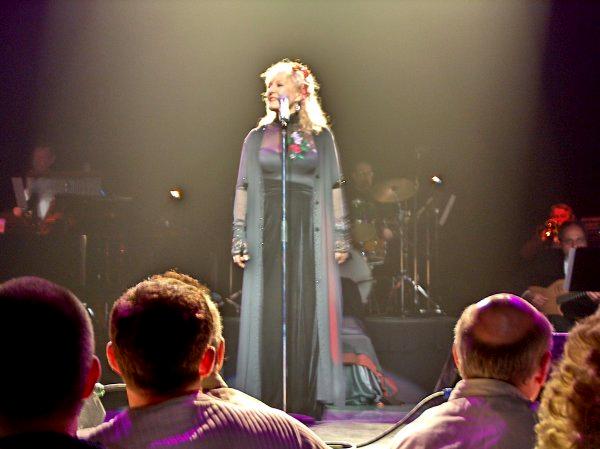
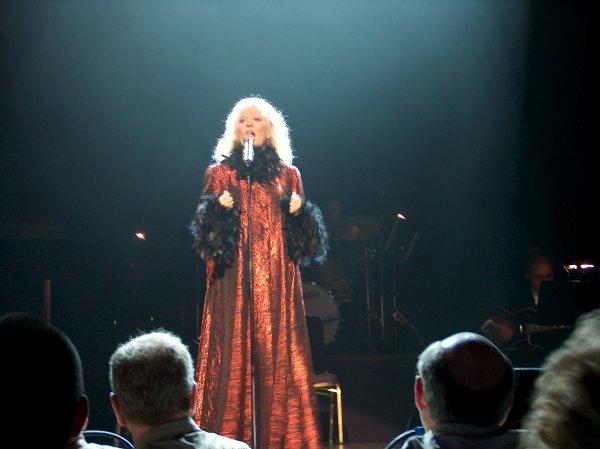
Photos by Jeff Jerrett


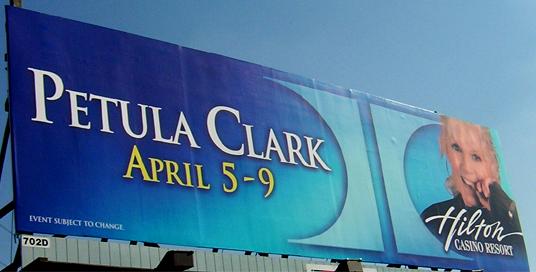
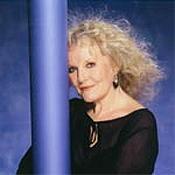
Song List
- Who Am I
- Wedding Song
- Don't Sleep in The Subway
- Im Not Afraid
- Smile/Eternally/This Is My Song
- I Know A Place
- Look To the Rainbow
- You And I
- Colour My World
- Tell Me Its Not True
- I Never Do Anything Twice
- With One Look
- Sign Of The Times
- My Love
- Downtown
- Here For You
- I Couldn't Live Without Your Love
 Photo by Elizabeth Steiner
Photo by Elizabeth Steiner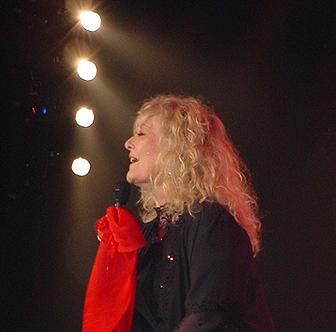 Photo by Bob Sutliff
Photo by Bob Sutliff Photo by Bob Sutliff
Photo by Bob Sutliff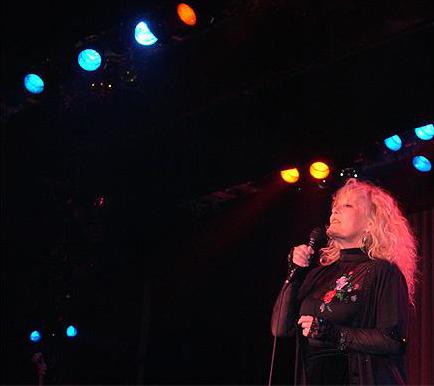 Photo by Elizabeth Steiner
Photo by Elizabeth Steiner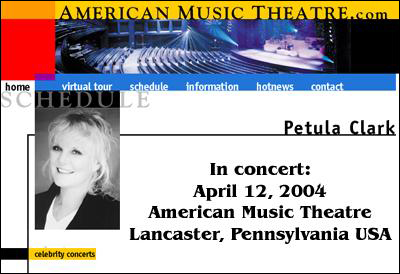
Song List
- Who Am I
- Wedding Song
- Don't Sleep in The Subway
- Im Not Afraid
- Smile/Eternally/This Is My Song
- I Know A Place
- Look To the Rainbow
- You And I
- Colour My World
- 60s Medley
- Tell Me Its Not True
- Jazz Medley
(If I Only Had You /Just me, Just You) - Starting All Over Again
- Sign Of The Times
- It's a Funny Thing, the Theatre
- Losing My Mind
- I Never Do Anything Twice
- With One Look
- Memories of Love
- Love medley
- Downtown
- Here for You
- I Couldn't Live Without Your Love

The '60s pop sensation, noted for hits such as "I Know a Place," "This
Is My Song," "A Sign of the Times" and "Don't Sleep on the Subway"
(her favorite), will bring the most personal concert of her career to the
American Music Theatre Monday, April 12.
Every piece she plans to sing there, with orchestral accompaniment, has a personal connection, she said.
"Some (like the indispensable "Downtown," which entered the Grammy Hall of Fame last year) are my hit songs. Some are from musicals (like "Sunset Boulevard") or movies I have been in" (including "Finian's Rainbow"), she said Tuesday by phone from Miami.
The lesser-known songs she has written or co-written over the course of her remarkable six-decade career.
Most personal of that lot is "I'm Not Afraid." The music was created by a young composer from Geneva, Switzerland, where Clark and her husband of 33 years, Frenchman Claude Wolff, live when not occupying their secondary flat in London.
"The moment I heard his wonderful music, I sat down and started writing the lyrics - just like that," Clark said, still sounding surprised by the instant connection and inspiration.
"The words are very personal, but it applies to a lot of us," said Clark, who has long refused to compromise herself by recording, performing or playing parts strictly for commercial value.
"It's all about not being afraid to show who you are, about throwing away the masquerade," she said, quoting a sampling:
"I'm not afraid to stand before you tonight, here in the light that's too bright. All through my life, I've stood here, just like tonight, but not quite ..."
Sondheim surprise
She may also surprise her audience by singing Stephen Sondheim's "I Never Do Anything Twice."
"I had to be bullied into recording that song," she admitted. "I adore Stephen's music but I said 'I can't sing this. It's a bit ... saucy, shall we say.'"
But record it she did, and that ditty with the double entendre is now a show stopper in concert.
"Now I absolutely relish it," she said. "It's great fun and a little surprising for the audience."
Fans may relish a rare, nonmusical moment, too: a reading of "It's a Funny Thing, the Theatre," a poem she wrote on the Eurostar train while commuting between concert sites.
"It was the middle of the night. I didn't have anything to read, so I just started writing. What came out was basically about my love of the theater, a journey of its own. It sounds rather dreary, but I promise it's not," she assured with laugh.
"I enjoy doing musical theater," said she, whose stage credits include three London hits; a revival of "The Sound of Music"; her own original musical, "Someone Like You"; and, most recently, "The Music of Andrew Lloyd Webber."
"But musicals are not the be-all and end-all for me. I enjoy straight theater pieces as well. I was just asked to do a new play (a drama) in London, which is very demanding, virtually a monologue. We shall see."
Global gal
Because she is a global entertainer, Americans, especially, have the illusion that Petula Clark is simmering away on some back burner in the twilight of her career.
At 71, the talent discovered while entertaining Allied forces as a child in England during World War II, is still a viable and vital headliner (as evidenced by her 2001 PBS special, "A Sign of the Times").
Her compilation compact disc, "The Ultimate Connection," hit the Top 20 in 2002. But her greatest satisfaction lies in the continuing success of her concerts.
As is typical, she spent the past two months touring Australia and New Zealand and comes to Lancaster fresh from a one-week (April 5-9) engagement at the Hilton in Atlantic City.
She also continues to crank out albums in several languages, predominantly French, but most recently German ("Kaleidoscope," 2003).
"They play my records in all sorts of extraordinary places," said Clark who is fluent in French and English. "I even get mail regularly from Mongolia!"
Concerts pay the greatest personal dividends, though.
"I love working with a team of people in theater, but in concert I can really be myself and just let go," Clark said. "It's a very pleasant feeling. I enjoy very much touching people that way, and I am touched by it too. It is definitely two-way traffic."
AMT concert tickets are $46. Call (800) 648-4102 or visit www.AMTshows.com.
Every piece she plans to sing there, with orchestral accompaniment, has a personal connection, she said.
"Some (like the indispensable "Downtown," which entered the Grammy Hall of Fame last year) are my hit songs. Some are from musicals (like "Sunset Boulevard") or movies I have been in" (including "Finian's Rainbow"), she said Tuesday by phone from Miami.
The lesser-known songs she has written or co-written over the course of her remarkable six-decade career.
Most personal of that lot is "I'm Not Afraid." The music was created by a young composer from Geneva, Switzerland, where Clark and her husband of 33 years, Frenchman Claude Wolff, live when not occupying their secondary flat in London.
"The moment I heard his wonderful music, I sat down and started writing the lyrics - just like that," Clark said, still sounding surprised by the instant connection and inspiration.
"The words are very personal, but it applies to a lot of us," said Clark, who has long refused to compromise herself by recording, performing or playing parts strictly for commercial value.
"It's all about not being afraid to show who you are, about throwing away the masquerade," she said, quoting a sampling:
"I'm not afraid to stand before you tonight, here in the light that's too bright. All through my life, I've stood here, just like tonight, but not quite ..."
Sondheim surprise
She may also surprise her audience by singing Stephen Sondheim's "I Never Do Anything Twice."
"I had to be bullied into recording that song," she admitted. "I adore Stephen's music but I said 'I can't sing this. It's a bit ... saucy, shall we say.'"
But record it she did, and that ditty with the double entendre is now a show stopper in concert.
"Now I absolutely relish it," she said. "It's great fun and a little surprising for the audience."
Fans may relish a rare, nonmusical moment, too: a reading of "It's a Funny Thing, the Theatre," a poem she wrote on the Eurostar train while commuting between concert sites.
"It was the middle of the night. I didn't have anything to read, so I just started writing. What came out was basically about my love of the theater, a journey of its own. It sounds rather dreary, but I promise it's not," she assured with laugh.
"I enjoy doing musical theater," said she, whose stage credits include three London hits; a revival of "The Sound of Music"; her own original musical, "Someone Like You"; and, most recently, "The Music of Andrew Lloyd Webber."
"But musicals are not the be-all and end-all for me. I enjoy straight theater pieces as well. I was just asked to do a new play (a drama) in London, which is very demanding, virtually a monologue. We shall see."
Global gal
Because she is a global entertainer, Americans, especially, have the illusion that Petula Clark is simmering away on some back burner in the twilight of her career.
At 71, the talent discovered while entertaining Allied forces as a child in England during World War II, is still a viable and vital headliner (as evidenced by her 2001 PBS special, "A Sign of the Times").
Her compilation compact disc, "The Ultimate Connection," hit the Top 20 in 2002. But her greatest satisfaction lies in the continuing success of her concerts.
As is typical, she spent the past two months touring Australia and New Zealand and comes to Lancaster fresh from a one-week (April 5-9) engagement at the Hilton in Atlantic City.
She also continues to crank out albums in several languages, predominantly French, but most recently German ("Kaleidoscope," 2003).
"They play my records in all sorts of extraordinary places," said Clark who is fluent in French and English. "I even get mail regularly from Mongolia!"
Concerts pay the greatest personal dividends, though.
"I love working with a team of people in theater, but in concert I can really be myself and just let go," Clark said. "It's a very pleasant feeling. I enjoy very much touching people that way, and I am touched by it too. It is definitely two-way traffic."
AMT concert tickets are $46. Call (800) 648-4102 or visit www.AMTshows.com.


Live in concert

23-24 April, 2004
Cork Opera House, Cork, Ireland
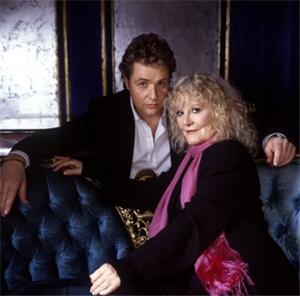
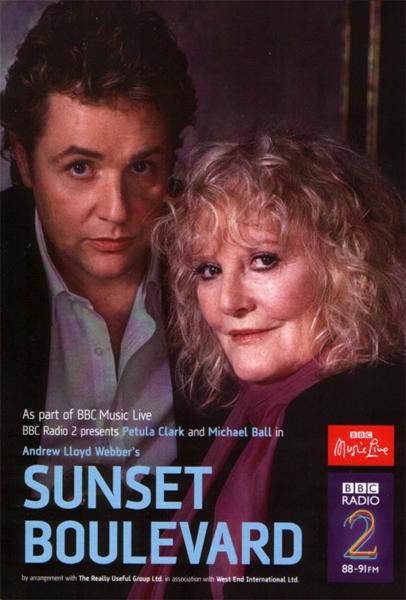
Programme
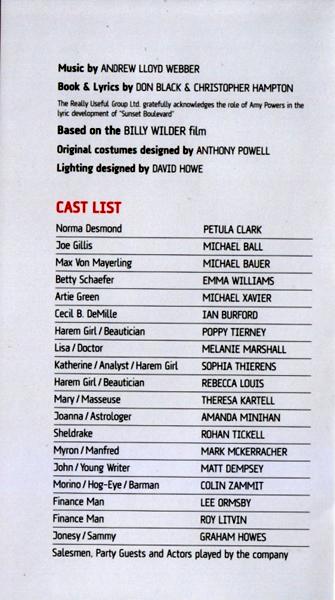
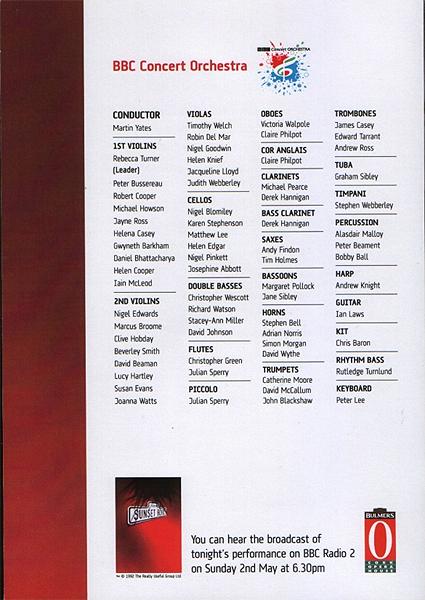


Photos by Christine Bloomfield
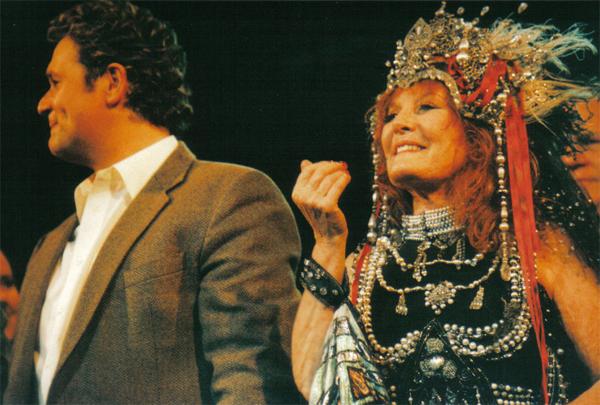

Photo by Phil Meehan
Stage performance pictures taken 23 April, 2004. Although only recorded for radio, there was a full orchestra, it was acted throughout and Petula even had a staircase.
The recording was broadcast on 2 May, 2004, 18:30, BBC Radio 2.
 Photo by Daniel Bédard
Photo by Daniel Bédard ACT 1
- "WHO AM I"
- "WEDDING SONG"
- "DON"T SLEEP IN THE SUBWAY"
- "I'M NOT AFRAID"
- Charlie Chaplin medley: "ETERNALLY"/"SMILE"/"THIS IS MY SONG
- "I KNOW A PLACE"
- "LOOK TO THE RAINBOW"
- "OLD DEVIL MOON" (impromptu duet with Don Francks, a surprise guest in the audience)
- "YOU & I"
- "COLOR MY WORLD"
- "MARIN"/"SAILOR"
- 60s medley: "ROUND EVERY CORNER"/"CALL ME"/"DON'T GIVE UP"/"THE OTHER MAN'S GRASS (Is Always Greener)"
-
"TELL ME IT'S NOT TRUE"
ACT 2
- "IF I ONLY HAD YOU/ JUST ME, JUST YOU"
- "COUER BLESSE"
- "STARTING ALL OVER AGAIN"
- "A SIGN OF THE TIMES"
- Theatre poem v "LOSING MY MIND"
- "I NEVER DO ANYTHING TWICE"
- "WITH ONE LOOK"
- "MEMORIES OF LOVE"
- Love medley: "YOU'D BETTER COME HOME/KISS ME GOODBYE/MY LOVE "DOWNTOWN"
- "HERE FOR YOU"
- "I COULDN'T LIVE WITHOUT YOUR LOVE"
Hollywood Bowl
Holllywood, California USA
A Tribute to Miss Peggy Lee
Bea Arthur, Petula Clark, Freddie Cole, Rita Coolidge, Lorraine Feather, Nnenna Freelon, Jack Jones, Jolie Jones, Maureen McGovern, Jan Monheit, Rita Moreno, Nancy Sinatra, Sheryl Lee Ralph, Mike Renzi, musical director, Jay Leonhart, John Pisano, Grady Tate.
Hollywood Bowl
Holllywood, California USA
A Tribute to Miss Peggy Lee
Bea Arthur, Petula Clark, Freddie Cole, Rita Coolidge, Lorraine Feather, Nnenna Freelon, Jack Jones, Jolie Jones, Maureen McGovern, Jan Monheit, Rita Moreno, Nancy Sinatra, Sheryl Lee Ralph, Mike Renzi, musical director, Jay Leonhart, John Pisano, Grady Tate.
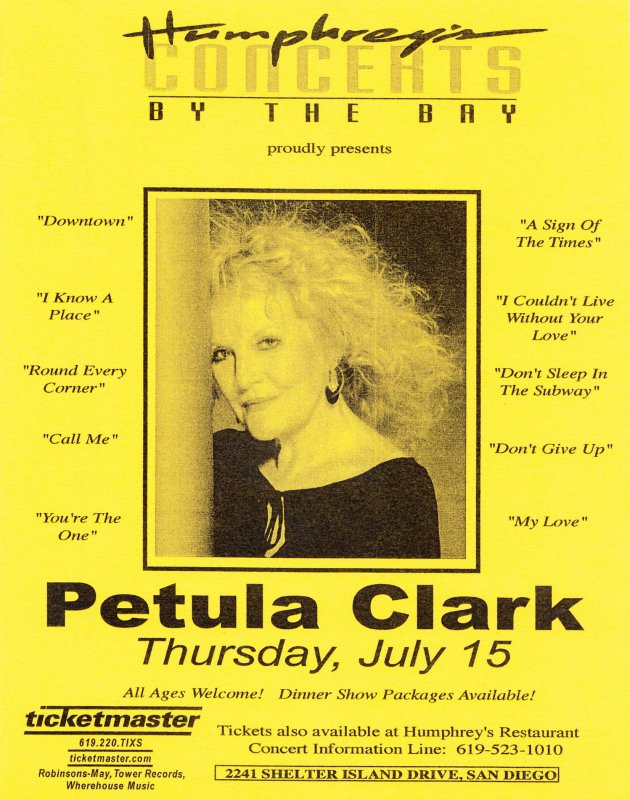
Poster

Press Pass
SONG LIST
- WHO AM I?
- DON T SLEEP IN THE SUBWAY
- I'M NOT AFRAID
- ETERNALLY / SMILE / THIS IS MY SONG
- I KNOW A PLACE
- LOOK TO THE RAINBOW
- YOU & I
- COLOR MY WORLD
- MARIN / SAILOR
- 60s medley: ROUND EVERY CORNER / CALL ME / DON'T GIVE UP / THE OTHER MAN'S GRASS (Is Always Greener)
- TELL ME IT'S NOT TRUE
- IF I ONLY HAD YOU/ JUST ME, JUST YOU STARTING ALL OVER AGAIN
- A SIGN OF THE TIMES
- Theatre poem
- LOSING MY MIND
- I NEVER DO ANYTHING TWICE
- WITH ONE LOOK
- MEMORIES OF LOVE
- Love medley: YOU'D BETTER COME HOME/KISS ME GOODBYE/MY LOVE DOWNTOWN
- HERE FOR YOU
- I COULDN'T LIVE WITHOUT YOUR LOVE
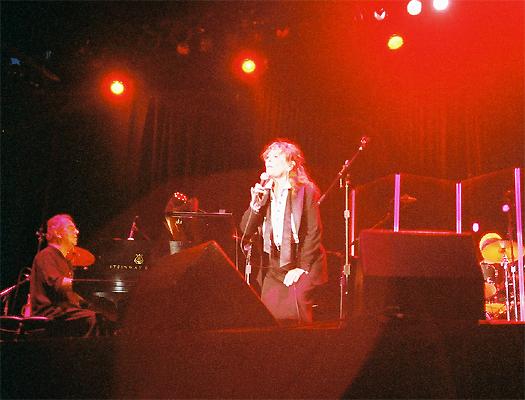
 Photos by Laurie Parsons Zenobio
Photos by Laurie Parsons Zenobio 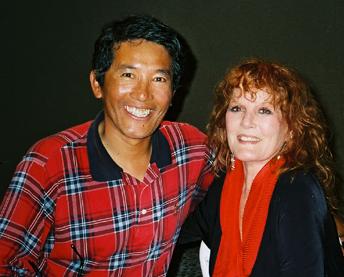
With fan who said he had travelled all the way from Korea for the concert.






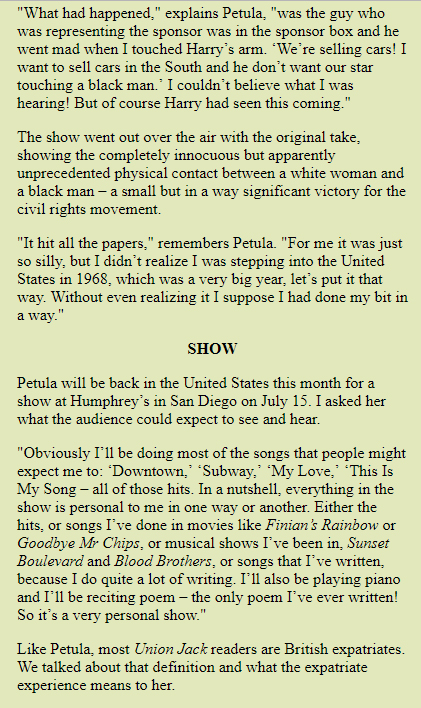

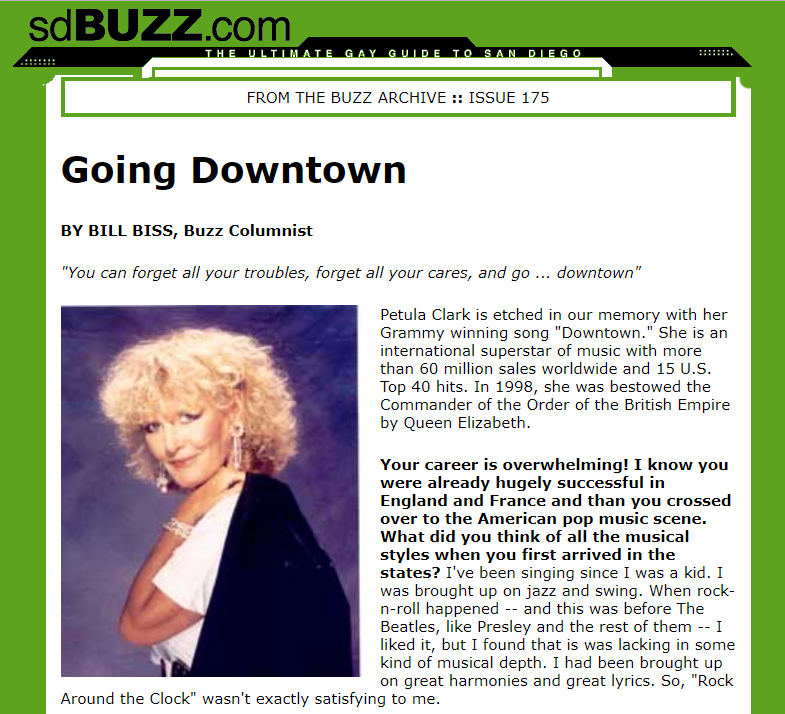
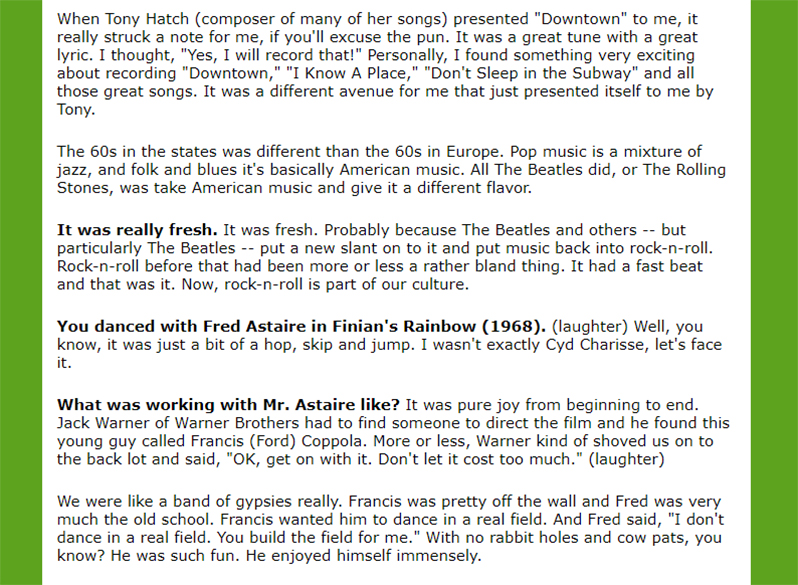
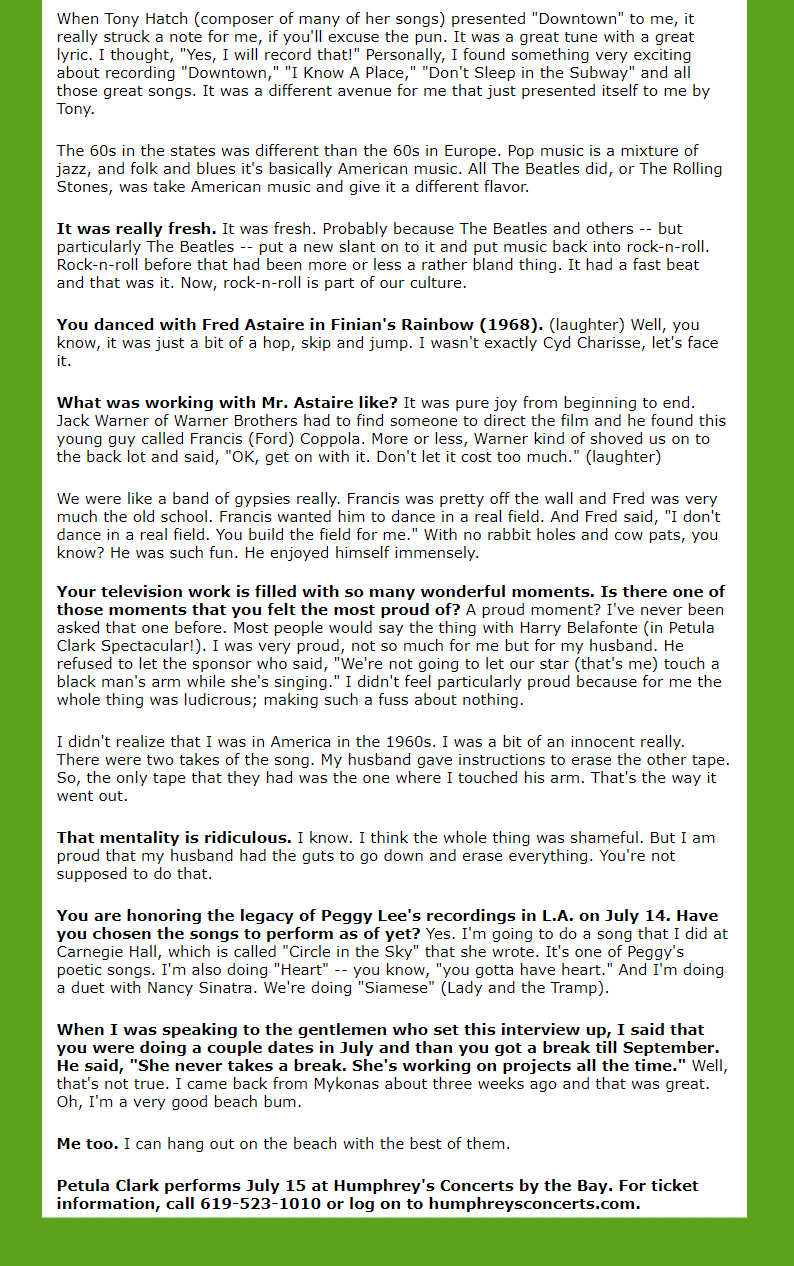
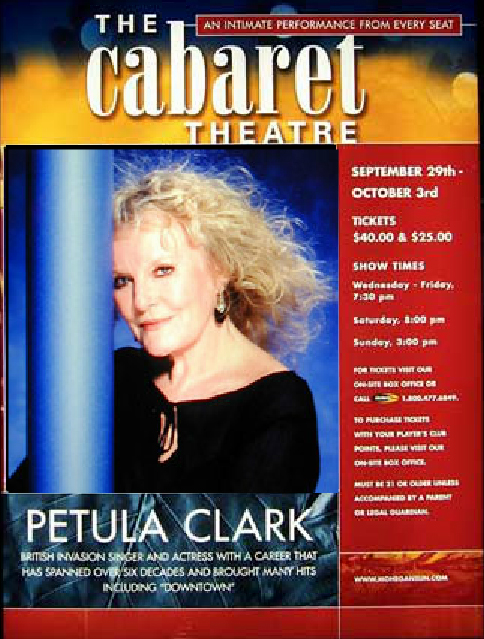

 Credential pass
Credential pass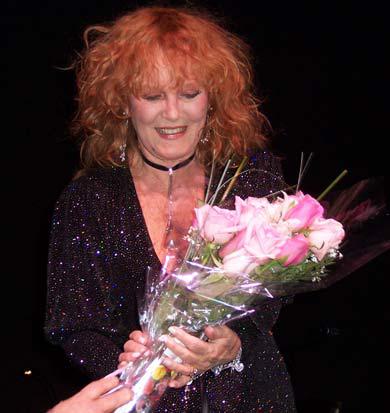 Photo by Frank Tokarchik
Photo by Frank Tokarchik Song List
- Who Am I?
- Wedding Song
- Don't Sleep in the Subway
- I'm Not Afraid
- This is My Song
- I Know a Place
- Look to the Rainbow
- You and I
- Colour My World
- Tell Me It's Not True
- With One Look
- Memories of Love
- Theatre Poem
- Losing My Mind
- I Never Do Anything Twice
- Sign of the Times
- Love Medley
- Starting All Over Again
- Downtown
- Here for You
- I Couldn't Live Without Your Love
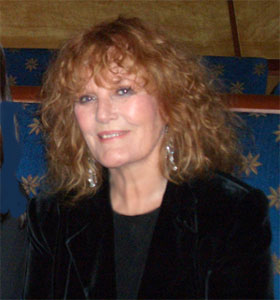 Photo by Laurie Parsons Zenobio
Photo by Laurie Parsons Zenobio
St. Paul's Church
(The Actor's Church)
Covent Garden, London, England UK
A Christmas Celebration
THEATRECARES/CRUSAID - Annual Christmas Benefit Concert
Also on the concert bill were other stars from the West End's musicals and plays, such as Jason Donovan, Frances Ruffelle, Sam Bonner. Petula was accompanied by Kenny Clayton and performed "Have Yourself a Merry Little Christmas" and the "Theatre Poem.".
St. Paul's Church
(The Actor's Church)
Covent Garden, London, England UK
A Christmas Celebration
THEATRECARES/CRUSAID - Annual Christmas Benefit Concert
Also on the concert bill were other stars from the West End's musicals and plays, such as Jason Donovan, Frances Ruffelle, Sam Bonner. Petula was accompanied by Kenny Clayton and performed "Have Yourself a Merry Little Christmas" and the "Theatre Poem.".
2005
- 7 March, 2005
- 9 March, 2005
- 10 March, 2005
- 11 March, 2005
- 15 March, 2005
- 17 March, 2005
- Cliffs Pavillion, Southend on Sea, England UK
- Forum Theatre, Malvern, England UK
- The Lowry, Salford Quays, England UK
- St. Georges Concert Hall, Bradford, England UK
- The Congress Theater, Eastbourne, England UK
- North Wales Theatre, Llandudno, Wales UK
- 7 March, 2005
- 9 March, 2005
- 10 March, 2005
- 11 March, 2005
- 15 March, 2005
- 17 March, 2005
- Cliffs Pavillion, Southend on Sea, England UK
- Forum Theatre, Malvern, England UK
- The Lowry, Salford Quays, England UK
- St. Georges Concert Hall, Bradford, England UK
- The Congress Theater, Eastbourne, England UK
- North Wales Theatre, Llandudno, Wales UK

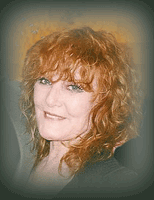
Song List
- Who Am I
- Let It Be Me
- Don't Sleep in the Subway
- I'm Not Afraid
- This is My Song
- I Know a Place
- How Are Things in Glocca Morra
- Memphis*
- Colour My World
- Sign of the Times
- Tell Me It's Not True
- With One Look
- Driven by Emotion*
- Kiss Me Goodbye / My Love
- Theatre poem
- Downtown
ENCORE:
- I Couldn't Live without Your Love
*Lyrics and music by Petula Clark
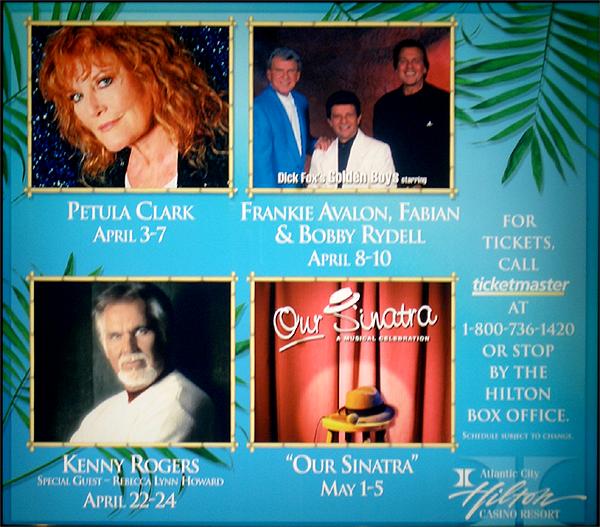
Poster
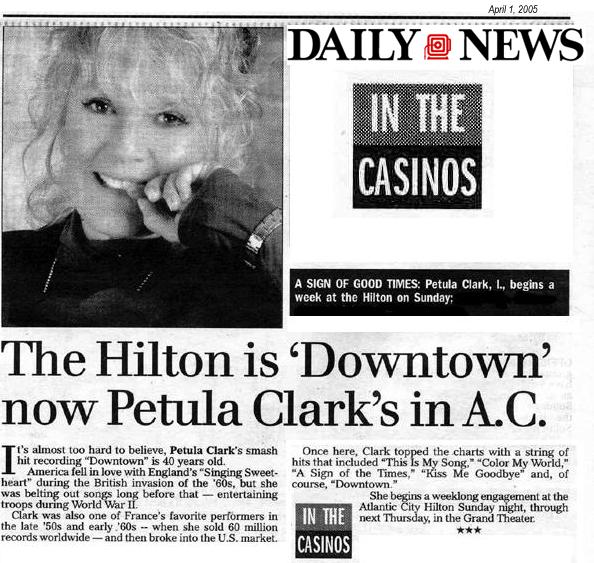

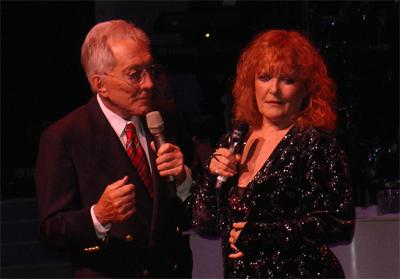 Photos courtesy of Wayne Dirden
Photos courtesy of Wayne Dirden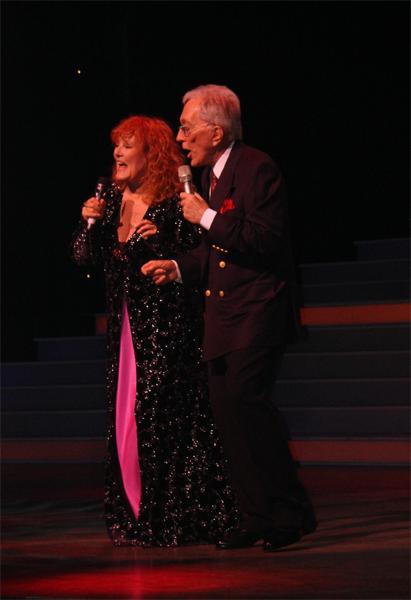

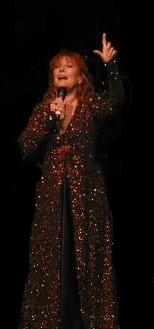 Photos by Pat Fox
Photos by Pat Fox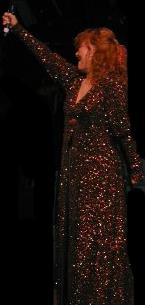
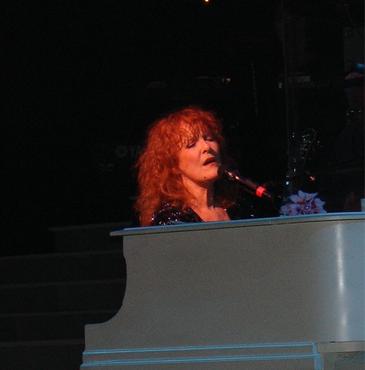

Petula's Song List
- Who Am I
- Let It Be Me
- Don't Sleep in the Subway
- I'm Not Afraid
- Sign of the Times
- This is My Song
- I Couldn't Live without Your Love
- Look to the Rainbow
- I Know a Place
- Memphis
- Kiss Me Goodbye
- My Love
- Tell Me It's Not True
- Downtown
- Call Me
- God Only Knows
- Never Can Say Goodbye
- Music to Watch Girls By
- Put Your Head on My Shoulder
- Happy Medley-Fan Tribute: Happy Heart/Can't Get Used to Losing You/Love Story/Speak Softly Love/Canadian Sunset/Hawaiian Wedding Song/Charades/Days of Wine and Roses/I Can't Help Falling in Love with You/How Sweet It Is
- One Voice
- Moon River
- How to make Tea skit
- Hallelujah
-
They Can't Take That Away From Me
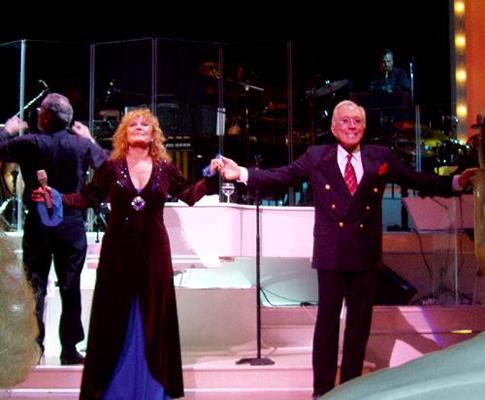

Song List
Set 1
Set 1
- Who Am I
- The Twelfth of Never
- Don't Sleep in the Subway
- I'm Not Afraid
- Chaplin medley: Eternally (piano only)/Smile/
- This Is My Song
- I Know a Place
- Look to the Rainbow
- Colour My World
- Memphis
- 60's medley
- Tell Me It's Not True
Set 2
- Jazz medley (If I Only Had You /Just me, Just You)
- Starting All Over Again
- Sign of the Times
- Theatre poem
- Losing My Mind
- You and I
- I Never Do Anything Twice
- With One Look
- Driven by Emotion
- Love Song medley
- Downtown
Encores: - Here for You
- I Couldn't Live Without Your Love




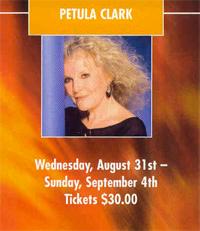
Cabaret magazine advertisement
Song List
- Who Am I?
- Twelfth of Never
- Don't Sleep in the Subway
- I'm Not Afraid
- This is My Song
- Look to the Rainbow
- I Know a Place
- Colour My World
- Tell Me It's Not True
- With One Look
- Driven by Emotion
- Theatre Poem
- To Memphis
- Sign of the Times
- Kiss Me Goodbye/My Love
- Downtown
Encores: - I Couldn't Live Without Your Love
- Here for You

Outside the theatre
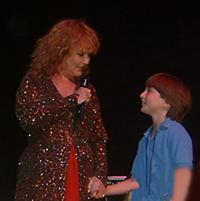
Downtown with grandson Sebastien
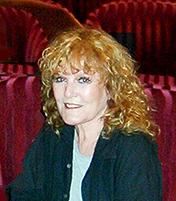
After the show

Spin Street CD Signing
September 3, 2005
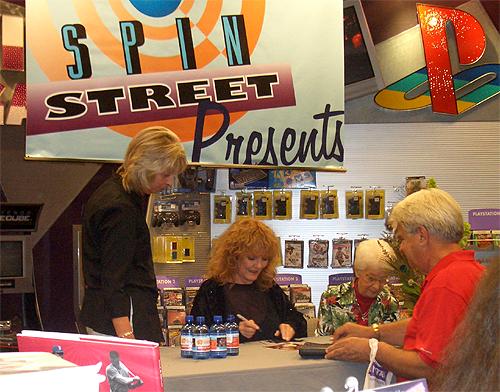
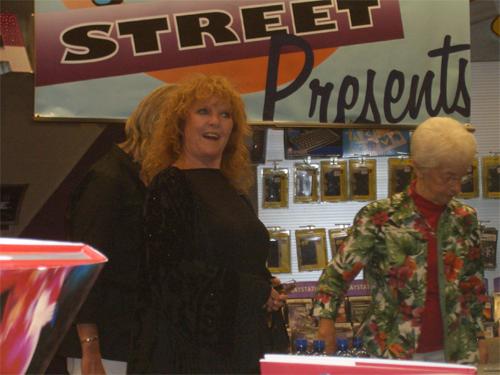

 Photo by Bill W
Photo by Bill W 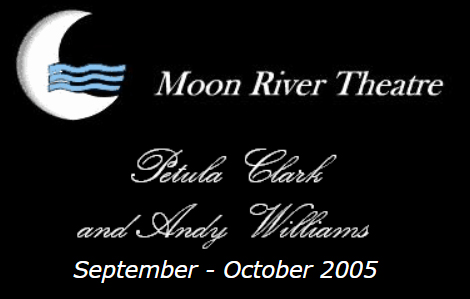
 Photo by Denny Flynn
Photo by Denny FlynnPetula's Song List
- Who Am I
- Twelfth of Never
- Don't Sleep in the Subway
- I'm Not Afraid
- Sign of the Times
- This is My Song
- I Couldn't Live Without Your Love
- Look to the Rainbow
- I Know a Place
- To Memphis
- Kiss Me Goodbye
- My Love
- Tell Me It's Not True
- Downtown
Andy's Song List
- How Sweet it Is
- Never Can Say Goodbye
- Lonely Street
- Music to Watch Girls By
- Happy Medley-Fan Tribute:
Happy Heart/Can't Get Used to Losing You/Love Story/Speak Softly Love/Canadian Sunset/Hawaiian Wedding Song/Charades/Days of Wine and Roses/Can't Help Falling in Love with You - Just to See Her Again
- One Voice
- Moon River
Petula & Andy Together
- Tea skit
- Hallelujah
- They Can't Take That Away From Me
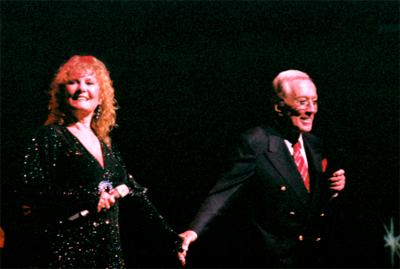 Photo by Bill W
Photo by Bill W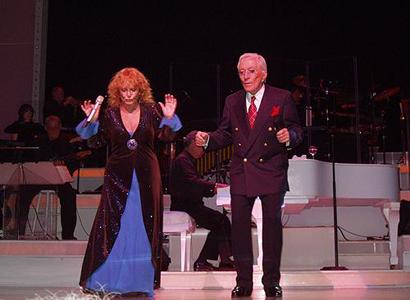 Photos by Laurie Parsons Zenobio
Photos by Laurie Parsons Zenobio
 Photo by Denny Flynn
Photo by Denny Flynn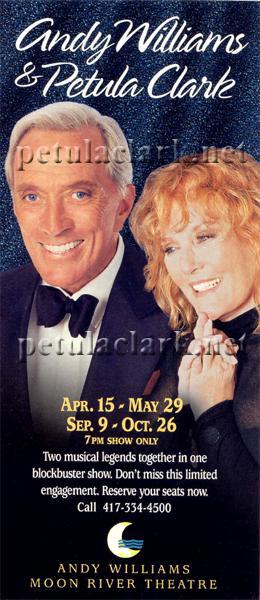

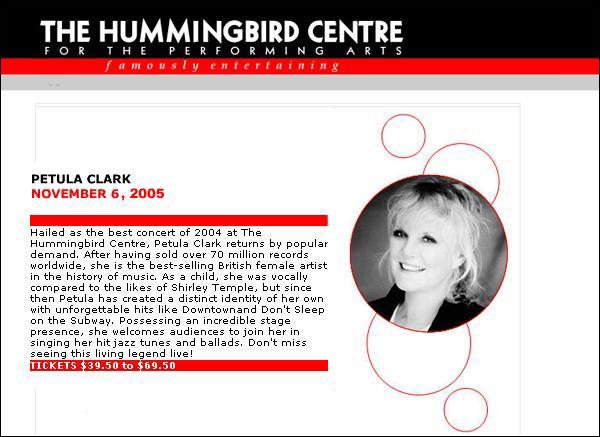
Song List
Part 1
Part 1
- Who Am I
- The Twelfth of Never
- Don't Sleep in the Subway
- I'm Not Afraid
- To Memphis
- French medley: Je Me Sens Bien and Romeo
- Old Devil Moon (with Don Francks)
- Look to the Rainbow
- This is My Song
- I Know a Place
- Tell Me It's Not True
Part 2
- Jazz medley (If I Only Had You /Just me, Just You)
- Theatre poem
- Coeur Blesse
- La Nuit N'en Finit Plus
- Sixties medley: Sign of the Times/Round Every Corner/Call Me/The Other Man's Grass Is Always Greener
- Driven by Emotion
- Colour My World
- With One Look
- Love Song medley: Kiss Me Goodbye/My Love
- Downtown
Encores: - Here for You
- I Couldn't Live Without Your Love
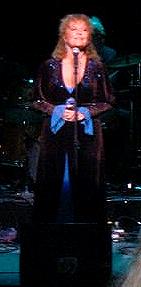
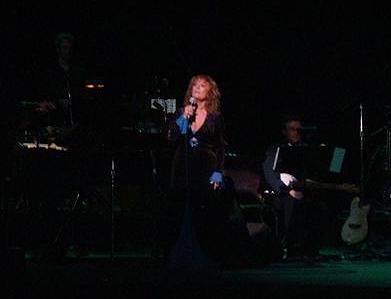
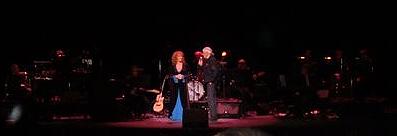 All photos by Dave Shetler
All photos by Dave Shetler
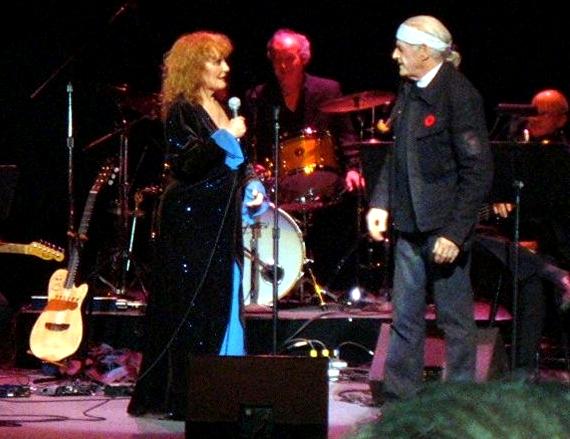
Old Devil Moon performed with Don Francks (Finian's Rainbow co-star)
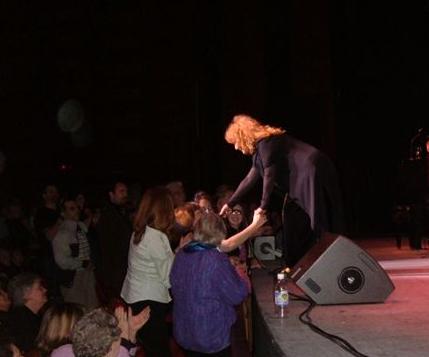

"So, who are you going to interview?" asked Driver Charlie.
"Petula Clark," I tell him.
"That's great," he enthused. "I love `It's My Party.'"
"Actually, that was Lesley Gore."
Bad guess. That was probably the only '60s pop hit Clark didn't sing.
Her hits include "Downtown," "I Know a Place," "My Love," "Round Every Corner," "I Couldn't Live Without Your Love" and "Don't Sleep in the Subway," and she'll be singing some of them at her one-nighter at the Hummingbird Centre tomorrow. She'll also be doing some from the movies and shows she's been on, and several new songs she's composed.
Clark has recorded over 1,000 songs. She was the first British soloist to win a Grammy Award (for the Tony Hatch written "Downtown" in 1964). She was the first British female pop singer to have a No. 1 hit single in the U.S. for "Downtown," the first of 15 consecutive Top 40 hits.
Her Internet Movie Database listing is six pages long. She is oblivious to it. She doesn't Internet.
According to IMDb, she guested on Seinfeld, Carol Burnett, Here's Lucy, Andy Williams and was a regular on the Dean Martin Show.
"No, I didn't do Seinfeld," she corrects over coffee at the Sheraton Centre. She looks fabulous, the blonde cropped 'do replaced with long auburn curly locks. She turns 73 on November 15.
"The Seinfeld episode was based on `Downtown,'" she explains. "They were having a silly conversation about me in the coffee shop. I didn't know it was going to be on. I watched it like everybody else."
She didn't do Dean Martin either.
"People used to think there was something going on between us but not at all. I'd work with him and disappear."
Her song also factored in 32 Short Films About Glenn Gould.
"I never met Glenn Gould," she says. "I never heard of him until I came to Canada just after he died. I was told he was fascinated with me. I bought the Bach (Goldberg) Variations and was blown away by his talent. When I found out about the stuff he'd written about me, I had a strange feeling. I felt really close to him. I wished we'd met and hung out together. I'd sing and he'd play the piano. I heard he was unusual, but so am I."
She had an engagement performing with Andy Williams at his Moon River Theatre in Branson, Missouri last spring. "I'd never even heard of Branson," she confesses. "He flew me out — he has a state-of-the-art theatre. I said okay, and was there for six weeks.
"I did a lot of Carol Burnett; I did all the shows but I never saw any of them. They'd be taped and I'd be gone. So I never really got to know these people. Not like now — Andy is now my new best friend.
"The first time I did Vegas was with Woody Allen — he did stand-up. We hung out quite a bit. He was not a Vegas type, but neither was I. We did two weeks at Caesar's Palace — Andy (Williams) opened it. The first week, there was a convention of doctors and they adored Woody, of course. The next week, a convention of farmers moved in and it was, `What is this?' They even had a prize bull at the entrance."
Clark was born in Ewell, Surrey, England. When asked where she lives now, she shakes her head. "Between London and Geneva," she says. "I'm a gypsy."
She and her French husband have three children. One daughter is an artist who lives in Paris; one daughter lives in New York with her two children; and her son lives in Geneva, where he has just opened a golf shop. None have taken up their mom's profession, which she started at age 6 and spans 51 years.
"My mom was musical and my father wanted to be an actor," she recalls. "He took me to see a classical play with this great English actress, Flora Robson. En route home on top of the bus, I said I wanted to act. But I had this voice ..."
By age 11, she was singing in music halls; she sang on BBC radio for the troops during World War II.
"Julie Andrews and I travelled together on troop trains," Clark says. "We were never rivals, we never thought about it. Our parents were rivals."
She was a child star in a series of British films from the end of World War II through the early 1950s and a huge success in France in the '50s and early '60s as a pop singer, returning to London to become part of the Swinging '60s scene, which included The Beatles.
"We were never on the same program," she demurs. "We were all travelling like maniacs. I was living in Paris with two small children when I made `Downtown.' We did all the recordings in London, where I met Tony Hatch.
"We were leading pretty crazy lives, though mine was less crazy (than The Beatles) because I was married with two children and not getting into the naughty things."
Clark co-starred with Fred Astaire in Finian's Rainbow in 1968 and with Peter O'Toole in Goodbye Mr. Chips in 1969. She passed on leading roles in Valley of the Dolls, Airport and Poseidon Adventure. Or they passed on her.
"I was asked to do a movie with Elvis and it was turned down for me."
But she got to meet Elvis and he hit on her. "Karen Carpenter and I went to see him because we were both appearing in Vegas. We went backstage and he was certainly a flirt. He was gorgeous."
Clark has a new CD coming out, Live at the Olympia.
"It was recorded at Olympia Palace and it was the first time I'd been back to Paris in 25 to 30 years," she recalls. "I was very nervous — the Parisian audience is not the easiest. The feeling was, `She's deserted us. She works in America.' I was standing in the wings and I heard a strange noise. They were chanting my name, `Petula, Petula.' It was one of the highlights of my career because it was unexpected."
Among her other career highlights was making her Broadway debut in Blood Brothers in 1993. But she had to be persuaded to do it.
"Bill Kenwright, the producer, dug his heels in," Clark explains. "He's from Liverpool and it's a real Liverpool thing. He decided he wasn't going to let New York critics close his show and he flew me to New York to see it. Did I want to step into someone else's role?"
But the casting of Shaun and David Cassidy as the brothers convinced her.
"We turned it into a hit and it played over a year."
Trevor Nunn had to coerce her into playing Norma Desmond in Sunset Boulevard. "I did it for over a year in London; I played it longer than anyone. And we toured over a year. I thought I was totally wrong for the role because I disliked everything she was. The longer I played it, the more I grew to love her.
"My career is very organic. There never has been a plan or someone behind the scenes. If something comes along, I'll do it."
Clark isn't ruling out the possibility of doing another play. But she will probably have to be talked into it.
"Petula Clark," I tell him.
"That's great," he enthused. "I love `It's My Party.'"
"Actually, that was Lesley Gore."
Bad guess. That was probably the only '60s pop hit Clark didn't sing.
Her hits include "Downtown," "I Know a Place," "My Love," "Round Every Corner," "I Couldn't Live Without Your Love" and "Don't Sleep in the Subway," and she'll be singing some of them at her one-nighter at the Hummingbird Centre tomorrow. She'll also be doing some from the movies and shows she's been on, and several new songs she's composed.
Clark has recorded over 1,000 songs. She was the first British soloist to win a Grammy Award (for the Tony Hatch written "Downtown" in 1964). She was the first British female pop singer to have a No. 1 hit single in the U.S. for "Downtown," the first of 15 consecutive Top 40 hits.
Her Internet Movie Database listing is six pages long. She is oblivious to it. She doesn't Internet.
According to IMDb, she guested on Seinfeld, Carol Burnett, Here's Lucy, Andy Williams and was a regular on the Dean Martin Show.
"No, I didn't do Seinfeld," she corrects over coffee at the Sheraton Centre. She looks fabulous, the blonde cropped 'do replaced with long auburn curly locks. She turns 73 on November 15.
"The Seinfeld episode was based on `Downtown,'" she explains. "They were having a silly conversation about me in the coffee shop. I didn't know it was going to be on. I watched it like everybody else."
She didn't do Dean Martin either.
"People used to think there was something going on between us but not at all. I'd work with him and disappear."
Her song also factored in 32 Short Films About Glenn Gould.
"I never met Glenn Gould," she says. "I never heard of him until I came to Canada just after he died. I was told he was fascinated with me. I bought the Bach (Goldberg) Variations and was blown away by his talent. When I found out about the stuff he'd written about me, I had a strange feeling. I felt really close to him. I wished we'd met and hung out together. I'd sing and he'd play the piano. I heard he was unusual, but so am I."
She had an engagement performing with Andy Williams at his Moon River Theatre in Branson, Missouri last spring. "I'd never even heard of Branson," she confesses. "He flew me out — he has a state-of-the-art theatre. I said okay, and was there for six weeks.
"I did a lot of Carol Burnett; I did all the shows but I never saw any of them. They'd be taped and I'd be gone. So I never really got to know these people. Not like now — Andy is now my new best friend.
"The first time I did Vegas was with Woody Allen — he did stand-up. We hung out quite a bit. He was not a Vegas type, but neither was I. We did two weeks at Caesar's Palace — Andy (Williams) opened it. The first week, there was a convention of doctors and they adored Woody, of course. The next week, a convention of farmers moved in and it was, `What is this?' They even had a prize bull at the entrance."
Clark was born in Ewell, Surrey, England. When asked where she lives now, she shakes her head. "Between London and Geneva," she says. "I'm a gypsy."
She and her French husband have three children. One daughter is an artist who lives in Paris; one daughter lives in New York with her two children; and her son lives in Geneva, where he has just opened a golf shop. None have taken up their mom's profession, which she started at age 6 and spans 51 years.
"My mom was musical and my father wanted to be an actor," she recalls. "He took me to see a classical play with this great English actress, Flora Robson. En route home on top of the bus, I said I wanted to act. But I had this voice ..."
By age 11, she was singing in music halls; she sang on BBC radio for the troops during World War II.
"Julie Andrews and I travelled together on troop trains," Clark says. "We were never rivals, we never thought about it. Our parents were rivals."
She was a child star in a series of British films from the end of World War II through the early 1950s and a huge success in France in the '50s and early '60s as a pop singer, returning to London to become part of the Swinging '60s scene, which included The Beatles.
"We were never on the same program," she demurs. "We were all travelling like maniacs. I was living in Paris with two small children when I made `Downtown.' We did all the recordings in London, where I met Tony Hatch.
"We were leading pretty crazy lives, though mine was less crazy (than The Beatles) because I was married with two children and not getting into the naughty things."
Clark co-starred with Fred Astaire in Finian's Rainbow in 1968 and with Peter O'Toole in Goodbye Mr. Chips in 1969. She passed on leading roles in Valley of the Dolls, Airport and Poseidon Adventure. Or they passed on her.
"I was asked to do a movie with Elvis and it was turned down for me."
But she got to meet Elvis and he hit on her. "Karen Carpenter and I went to see him because we were both appearing in Vegas. We went backstage and he was certainly a flirt. He was gorgeous."
Clark has a new CD coming out, Live at the Olympia.
"It was recorded at Olympia Palace and it was the first time I'd been back to Paris in 25 to 30 years," she recalls. "I was very nervous — the Parisian audience is not the easiest. The feeling was, `She's deserted us. She works in America.' I was standing in the wings and I heard a strange noise. They were chanting my name, `Petula, Petula.' It was one of the highlights of my career because it was unexpected."
Among her other career highlights was making her Broadway debut in Blood Brothers in 1993. But she had to be persuaded to do it.
"Bill Kenwright, the producer, dug his heels in," Clark explains. "He's from Liverpool and it's a real Liverpool thing. He decided he wasn't going to let New York critics close his show and he flew me to New York to see it. Did I want to step into someone else's role?"
But the casting of Shaun and David Cassidy as the brothers convinced her.
"We turned it into a hit and it played over a year."
Trevor Nunn had to coerce her into playing Norma Desmond in Sunset Boulevard. "I did it for over a year in London; I played it longer than anyone. And we toured over a year. I thought I was totally wrong for the role because I disliked everything she was. The longer I played it, the more I grew to love her.
"My career is very organic. There never has been a plan or someone behind the scenes. If something comes along, I'll do it."
Clark isn't ruling out the possibility of doing another play. But she will probably have to be talked into it.

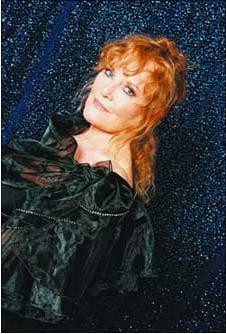 In her own voice
In her own voiceAfter 40 years Petula Clark still waiting for something special to happen
By Mindi St. Amand
After releasing hits in the '60s, starring in films and singing on Broadway, British legend Petula Clark is still a modest and laidback lady. Now 72, Clark has new songs to offer her fans, and she's been working with Andy Williams preparing for her show in Toronto this Sun. Nov. 6.
"I've been in a place named Brampton for seven weeks, working with Andy Williams. I love working with him he's so great. He's been doing his shows and I do mine, and then we do duets together," Clark said from New York, after asking what the weather in Toronto is like.
Clark has been singing since her adolescent years, and admits she has never had voice lessons. She's the product of true talent and was known as the Shirley Temple of Britain.
"I never had voice lessons because I find if you're taught a certain way, you lose the quality that makes it your voice," she explained. "One or two record producers have fooled around with my voice a little bit trying to make me sound different, but that's never worked."
The music business has changed since the 60s; Clark said she notices there's a flood of pop music, but there's also a genre out there for everyone.
"When I was in the '60s making hit records, there were people within the company who really seemed to genuinely like music. I'm not recording at the moment, so I honestly don't know [how much the music industry has changed]."
At the Hummingbird Centre, Clark will be singing crowd favourites, plus new songs she has written, such as 'Memphis' (a beautiful piano piece) and 'Driven By Emotion' (a song about having true feelings).
Clark is considered to be the most successful British female recording artist to date, as she holds the record for having the longest span on the international pop charts when The Little Shoemaker made the UK Top Twenty from 1954 through to 2005.
Clark has accomplished much in her life, including being honoured by Queen Elizabeth II and made a Commander of the Order of the British Empire. Although Clark has won awards and been selected for the Music Hall of Fame, she still feels like she's waiting for a "special thing" to happen. Besides being particularly proud of her children, she says it's her own concerts that bring her emotions of self-pride.
"Sometimes it will be one night for instance, one show out of hundreds and I'll come off the stage and say, 'Now. . . that was good!' But. . . it's rare."
She also tries to insist she's just like anyone else in her daily life, however, she does not knit or crochet, like any other typical grandmother. She loves watching films, theatre, reading books and listening to music.
"The person who makes me sit up every time I hear him sing is Michael McDonald [of the Doobie Brothers]," she said. "It's like Christmas when I hear that voice, I come out and I think, 'Oh, this is unreal!'"
Another artist who Clark enjoys listening to is R&B artist Alicia Keys; Clark describes her as a beautiful and great person all-around.
Recently, Clark has been spending a lot of time travelling. She said one of her greatest hobbies is writing, as she always brings a journal with her on the plane. "I like to play around on the piano and I'm writing quite a lot of lyrics these days. I have a lot of time on airplanes, so I kind of scribble away and write things."
Look for Clark to be reciting poetry, performing her pop classics and Broadway favourites at The Hummingbird Centre on Sunday, November 6 at 8 pm; for tickets visit www.ticketmaster.ca or by phone (416) 872-2262
2006


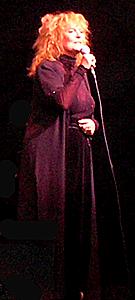
Song List
Set 1
Set 1
- Who Am I
- The Twelfth of Never
- Don't Sleep in the Subway
- I'm Not Afraid
- This Is My Song
- I Know a Place
- Look to the Rainbow
- Colour My World
- Memphis
- 60's medley
- Tell Me It's Not True
Set 2
(If I Only Had You /Just me, Just You)
Encores:
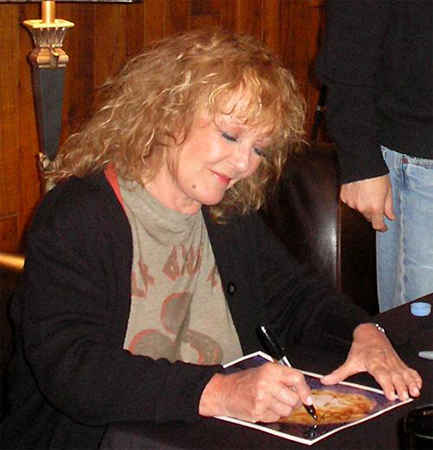
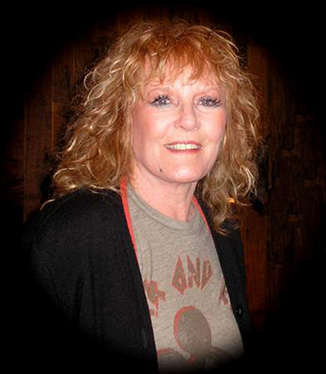



-
Song List
- Who Am I
- The Twelfth of Never
- Don't Sleep in the Subway
- I'm Not Afraid
- This Is My Song
- I Know a Place
- Look to the Rainbow
- Colour My World
- To Memphis
- 60's medley
- Tell Me It's Not True
- With One Look
- Love Song medley
- Downtown
Encores: - Here for You
- I Couldn't Live Without Your Love
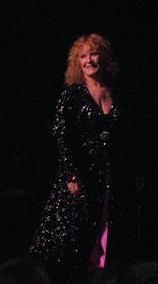

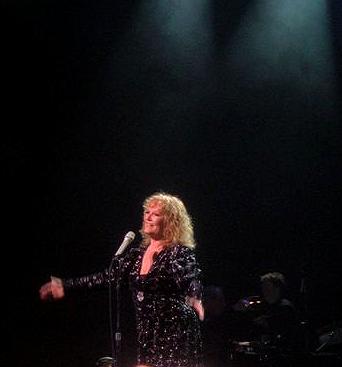 All photos by Dave Shetler
All photos by Dave Shetler 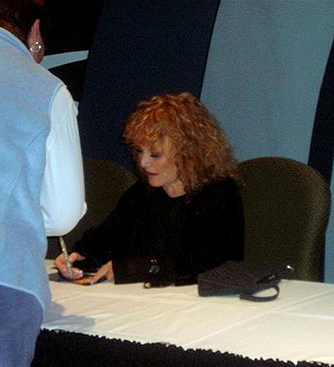
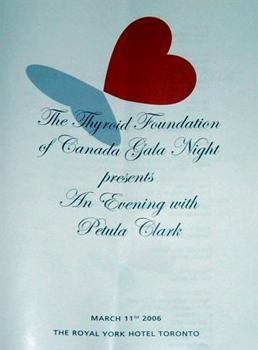
Song List
- Who Am I
- The Twelfth of Never
- Don't Sleep in the Subway
- I'm Not Afraid
- This Is My Song
- I Know a Place
- Look to the Rainbow
- To Memphis
- 60's medley
- Tell Me It's Not True
- With One Look
- A Sign of the Times
- Love Song medley
- Downtown
Encores: - Here for You
- I Couldn't Live Without Your Love
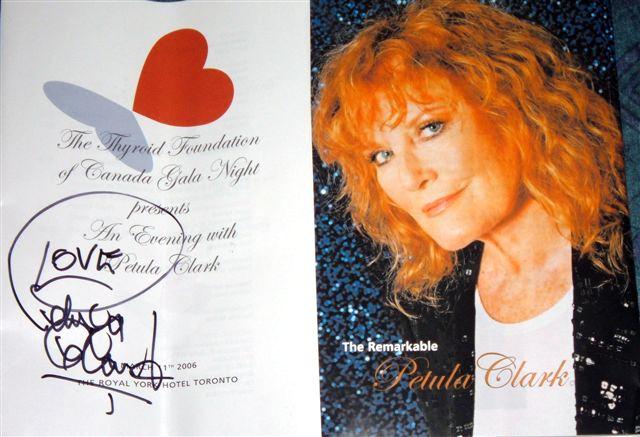

 All photos courtesy of Dave Shetler
All photos courtesy of Dave Shetler
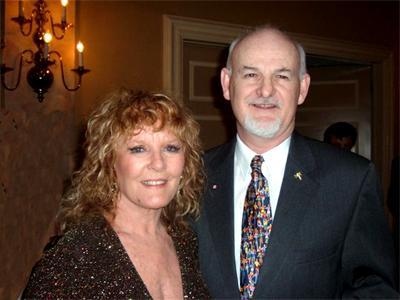


FORT MEYERS, FLORIDA USA
MARCH 16, 2006
Song List
-
SET ONE
- Who Am I
- The Twelfth of Never
- Don't Sleep in the Subway
- I'm Not Afraid
- This Is My Song
- I Know a Place
- Look to the Rainbow
- Colour My World
- To Memphis
- 60's medley
- Tell Me It's Not True
SET TWO
- Jazz medley ((If I Only Had You /Just me, Just You)
- Starting All Over Again
- Sign of the Times
- Theatre poem
- Losing My Mind
- I Never Do Anything Twice
- With One Look
- Driven by Emotion
- Love Song medley
- Downtown
Encores: - Here for You
- I Couldn't Live Without Your Love
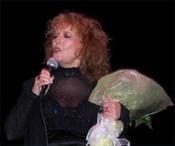
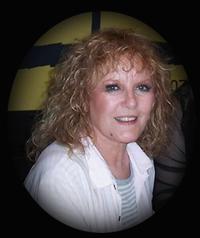

Song List

-
SET ONE
- Who Am I
- Je me sens bien medley
Je Me Sens Bien, Romeo and Bleu, Blanc, Rouge - Don't Sleep in the Subway
- I'm Not Afraid
- Un enfant
- Look to the Rainbow
- Que Fais-tu là Petula?
- Colour My World
- S.O.S. Mozart
- Prends mon coeur medley
- Chariot

SET TWO
- Jazz medley ((If I Only Had You /Just me, Just You)
- Coeur Blessé
- La Chanson de Gainsbourg/O Sheriff O/La gadoue
- To Memphis
- 60's medley
(Round Every Corner/Call Me/Don't Give Up/Other Man's Grass) - This is My Song
- Tell Me It's Not True
- With One Look
- Sign of the Times
- La nuit n'en finit plus
- I Couldn't Live...
- Vivre
- Downtown
- Dis-moi au revoir
- My Love
- Here For You
ENCORE - Personne ne Veut Mourir


©Photos by Clément Grenier
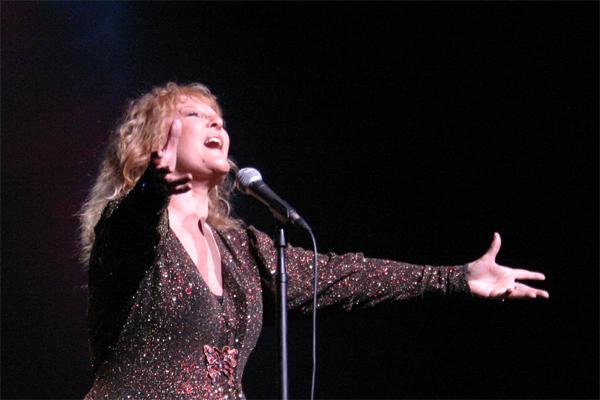

©Photos by Alain Grenier
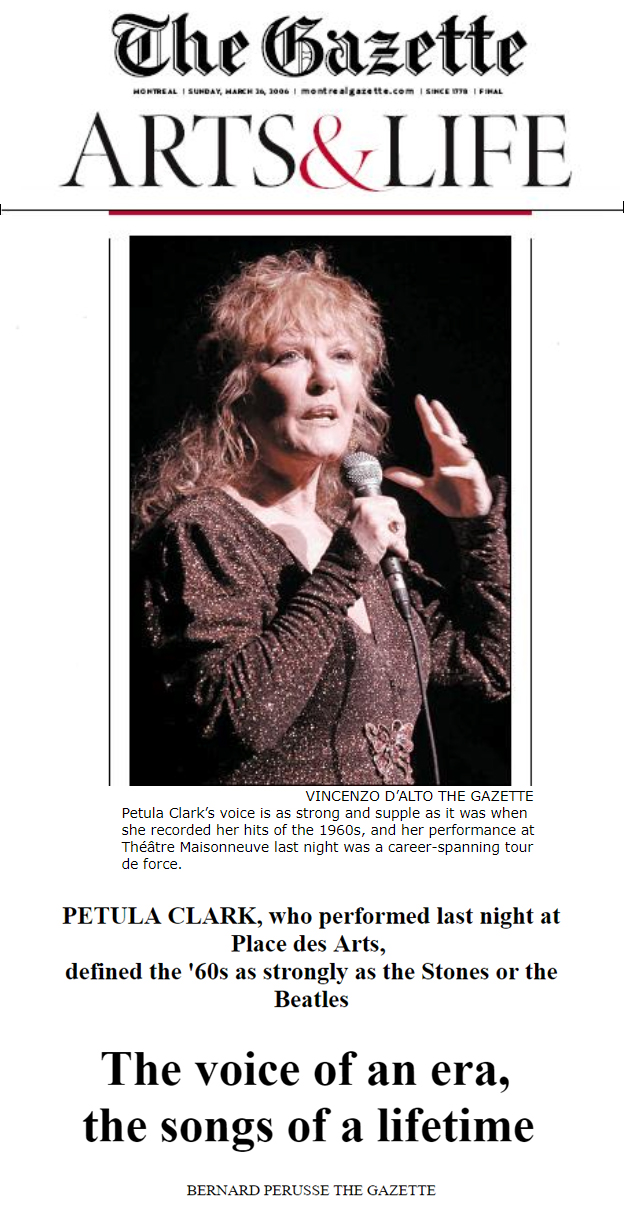
Historical revisionism would have you believe the British Invasion years of 1964 and 1965 were entirely defined by the Beatles, the Rolling Stones and maybe the Dave Clark Five. It's the same myth that has soldiers in Vietnam listening exclusively to Jimi Hendrix and Cream and not Nancy Sinatra or Tommy James and the Shondells.
And, granted, Petula Clark, 73, played to the 1,500-capacity Théâtre Maisonneuve of Place des Arts last night, while the Stones filled the Bell Centre in January. But that doesn't mean the three-chord salvo that opens Downtown doesn't define its era as perfectly as Satisfaction.
Clark's setlist last night acknowledged the '60s-era hits that made her a household name in North America. An electrifying Colour My World, a cabaret-styled I Know a Place and the perky Sign of the Times were all accounted for, but the singer also seemed intent on reminding her audience about her stage and screen career, some new self-penned songs and a body of work in French that goes back to the days when rock 'n' roll was merely a glimmer in Bill Haley's eye.
Not surprisingly, the selection was heavy on French songs, with the opener, Who Am I, quickly making way for a medley of Je Me Sens Bien, Romeo and Bleu, Blanc, Rouge. Don't Sleep In the Subway followed, with Clark playfully acting out the lyrics via facial gestures. As she hit the closing note of the 1967 smash with effortless power, it was more than clear her voice hasn't lost a thing since she recorded the original.
Au contraire. In an interview with The Gazette last June, the chanteuse said she still sings all of her hits in the original keys. "My voice is stronger, more supple than it was in those days. Maybe it's because it's been tested a lot since then, and doing musicals can really strengthen - or break - your voice."
Tell Me It's Not True, from Blood Brothers, and With One Look, from Sunset Boulevard, proved her point. In the latter, Clark played the lead role as faded film star Norma Desmond, touring with the Andrew Lloyd Webber show for two years.
If those pipes were the real story last night, Clark also delivered a lesson in old-school star presence as she slipped into storytelling mode between songs, alternating between French and English. The audience ate up every anecdote about icons like Charles Chaplin, Sophia Loren, Fred Astaire, Jacques Brel and Serge Gainsbourg.
During a Gainsbourg medley, while singing O Sheriff, a twinkle in Clark's eye evoked the pixie-ish pop singer of the paisley period. At other times, there was a delightful Mae West comedic sexiness to her delivery. During Just You, Just Me, she even adopted a Bronxtinged, Betty-Boop delivery as she sang "What ah my ahhhmmmsss for?" If the nine musicians on stage, under the musical direction of Kenny Clayton, sounded a bit sterile, Clark's engaging warmth more than made up for it.
In a medley that included Round Every Corner and The Other Man's Grass Is Always Greener, Clark sang "I'm so thankful for the '60s." The audience shared that sentiment, but they had more than that to chew on during last night's career-spanning tour de force.
bperusse@thegazette.canwest.com

"Que fais-tu là, Petula?" demandait la chanson en
1965, histoire d'un fantôme anglais, Mortimer Peabody, reprochant
d'abord à Petula Clark d'avoir embrassé la France, puis succombant
lui-même aux charmes des belles revenantes des Folies-Bergère. La
chanson est devenue le symbole de la carrière que mêne en anglais et en
français la chanteuse depuis le début des années 60 (et son mariage
avec le producteur français Claude Wolff).
Son spectacle de samedi soir au Théâtre Maisonneuve de la PdA reflétait parfaitement cette double vie, comme à chaque passage au Québec, là où elle retrouve côte-à-côte le public franco de ses années yéyé (ceux qui font "aaaah !" quand elle amorce Coeur blessé) et le public anglo sa période Swinging London (ceux qui se demandent quelle drôle de chanson est La Gadoue de Serge Gainsbourg et attendent les succés mondiaux écrits pour elle par Tony Hatch, de My Love à Don't Sleep in the Subway).
Évidemment, ces deux publics finissent par n'en faire qu'un, celui de la Petula Clark épatante, pétillante et pétulante de ces deux grosses heures d'extraordinaire showmanship (showwomanship?). À 73 ans, dont 64 sur les planches -- Petula, "The Forces Girl", chantait pour les troupes dans Londres bombardée! --, la petite fille devenue grande dame applique mieux que quiconque aujourd'hui les règles du music-hall à la britannique. Art qu'on pourrait résumer en deux mots : professionnalisme et naturel. Entendez : le savoir-faire sans qu'il y paraisse. Petula sait toucher (en évoquant tendrement "sa" chanson de Brel, Un enfant, cadeau du grand Jacques à la naissance de sa fille Catherine), raconter une anecdote ("I got to dance with Fred Astaire. . . I was terrified!"), faire rire ("There is no silicone in this act !", clame-t-elle, en remontant son bustier), se dépètrer sans mal des hics d'une soirée (un monsieur chantant trop fort dans le micro devient running gag) et, surtout, elle sait donner le meilleur d'un répertoire presque trop riche.
Quand on a 43 titres au programme, il faut savoir les agencer. Moi qui abhorre les pots-pourris, je les trouvais samedi justifiés et savamment liés (surtout celui des années yéyé, de Prends mon coeur à l'irrésistible Chariot). De fait, tout avait sa digne place. L'hommage à Gainsbourg, le bouquet d'extraits de comédies musicales (l'émouvante Tell Me It's Not True de Blood Brothers, l'impressionnante With One Look de Sunset Boulevard), les chansons inédites (dont l'excellente S.O.S. Mozart de Delanoé-Bécaud), la pop à gogo des sixties (Sign of the Times, Colour My World), les titres de gloire (C'est ma chanson, Downtown), le déroulement était enchantement, et les interprétations constamment relevées (avec des trésors de petits trucs pour éviter les notes désormais inaccessibles). Je vous le donne en mille : nous sommes tous sortis comblés. En scandant le refrain de Personne ne veut mourir... jusque dans les toilettes. Hantés par Mortimer Peabody, il va sans dire.
 © Photo courtesy of Daniel Bédard
© Photo courtesy of Daniel Bédard
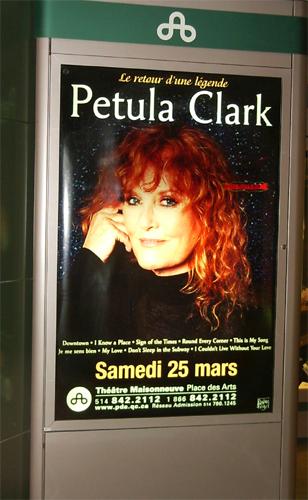
Son spectacle de samedi soir au Théâtre Maisonneuve de la PdA reflétait parfaitement cette double vie, comme à chaque passage au Québec, là où elle retrouve côte-à-côte le public franco de ses années yéyé (ceux qui font "aaaah !" quand elle amorce Coeur blessé) et le public anglo sa période Swinging London (ceux qui se demandent quelle drôle de chanson est La Gadoue de Serge Gainsbourg et attendent les succés mondiaux écrits pour elle par Tony Hatch, de My Love à Don't Sleep in the Subway).
Évidemment, ces deux publics finissent par n'en faire qu'un, celui de la Petula Clark épatante, pétillante et pétulante de ces deux grosses heures d'extraordinaire showmanship (showwomanship?). À 73 ans, dont 64 sur les planches -- Petula, "The Forces Girl", chantait pour les troupes dans Londres bombardée! --, la petite fille devenue grande dame applique mieux que quiconque aujourd'hui les règles du music-hall à la britannique. Art qu'on pourrait résumer en deux mots : professionnalisme et naturel. Entendez : le savoir-faire sans qu'il y paraisse. Petula sait toucher (en évoquant tendrement "sa" chanson de Brel, Un enfant, cadeau du grand Jacques à la naissance de sa fille Catherine), raconter une anecdote ("I got to dance with Fred Astaire. . . I was terrified!"), faire rire ("There is no silicone in this act !", clame-t-elle, en remontant son bustier), se dépètrer sans mal des hics d'une soirée (un monsieur chantant trop fort dans le micro devient running gag) et, surtout, elle sait donner le meilleur d'un répertoire presque trop riche.
Quand on a 43 titres au programme, il faut savoir les agencer. Moi qui abhorre les pots-pourris, je les trouvais samedi justifiés et savamment liés (surtout celui des années yéyé, de Prends mon coeur à l'irrésistible Chariot). De fait, tout avait sa digne place. L'hommage à Gainsbourg, le bouquet d'extraits de comédies musicales (l'émouvante Tell Me It's Not True de Blood Brothers, l'impressionnante With One Look de Sunset Boulevard), les chansons inédites (dont l'excellente S.O.S. Mozart de Delanoé-Bécaud), la pop à gogo des sixties (Sign of the Times, Colour My World), les titres de gloire (C'est ma chanson, Downtown), le déroulement était enchantement, et les interprétations constamment relevées (avec des trésors de petits trucs pour éviter les notes désormais inaccessibles). Je vous le donne en mille : nous sommes tous sortis comblés. En scandant le refrain de Personne ne veut mourir... jusque dans les toilettes. Hantés par Mortimer Peabody, il va sans dire.
 © Photo courtesy of Daniel Bédard
© Photo courtesy of Daniel Bédard
Poster
May 31, 2006
McPhillips Street Station Casino
Winnipeg, Manitoba CANADA
May 31, 2006
McPhillips Street Station Casino
Winnipeg, Manitoba CANADA
June 2, 2006
Casino Regina
Regina, Saskatchewan CANADA
June 2, 2006
Casino Regina
Regina, Saskatchewan CANADA
June 10, 2006
Silver Legacy Casino
Reno, Nevada USA
June 10, 2006
Silver Legacy Casino
Reno, Nevada USA
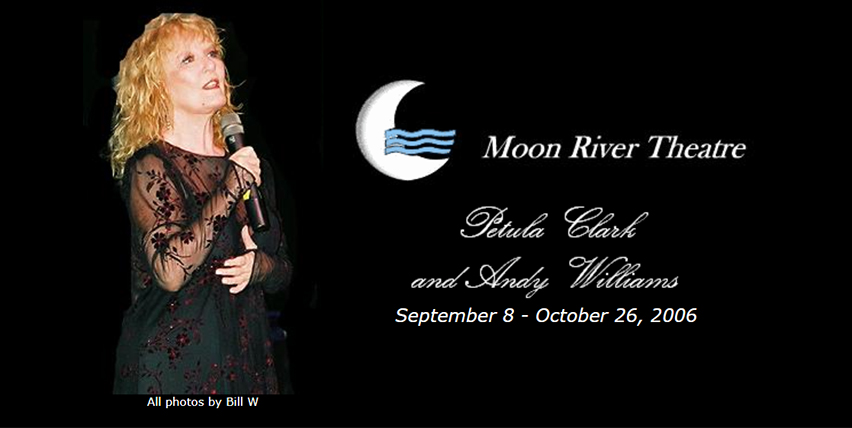
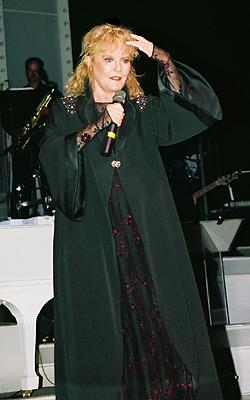
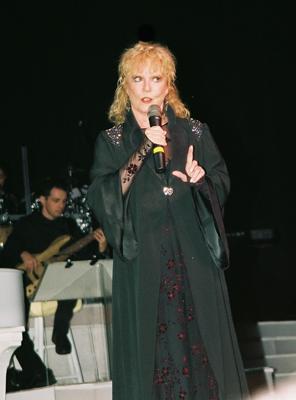


Petula's Song List
- You and I (verse only - sung off stage)
- Sign of the Times
- Twelvth of Never
- Don't Sleep in the Subway
- I Know a Place
- This is My Song
- To Memphis
- Look to the Rainbow
- Driven By Emotion
- I Couldn't Live Without Your Love
- Kiss Me Goodbye/My Love
- Downtown
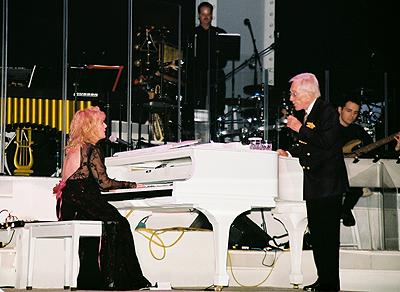
Andy and Petula Together
Tea/Coffee Skit
They Can't Take That Away From Me
Together
Hallelujah
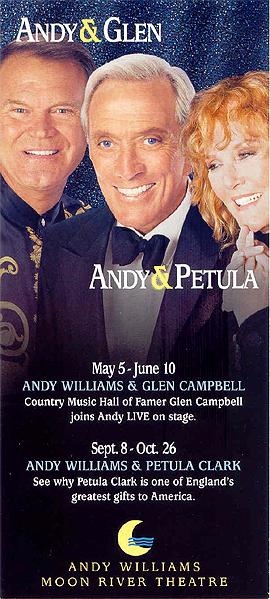
Brochure
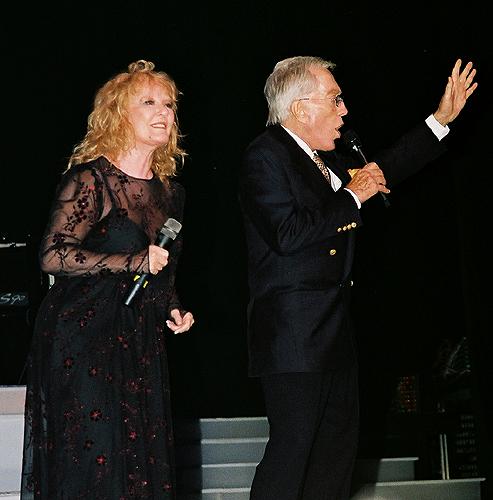

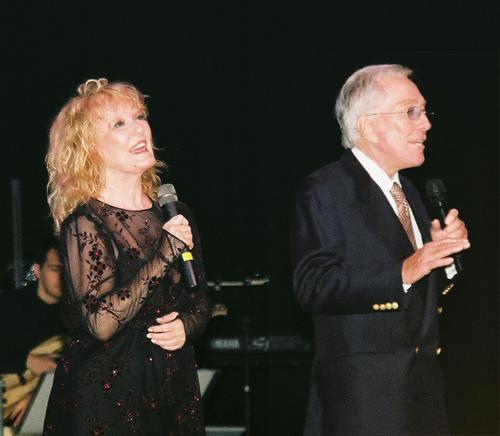
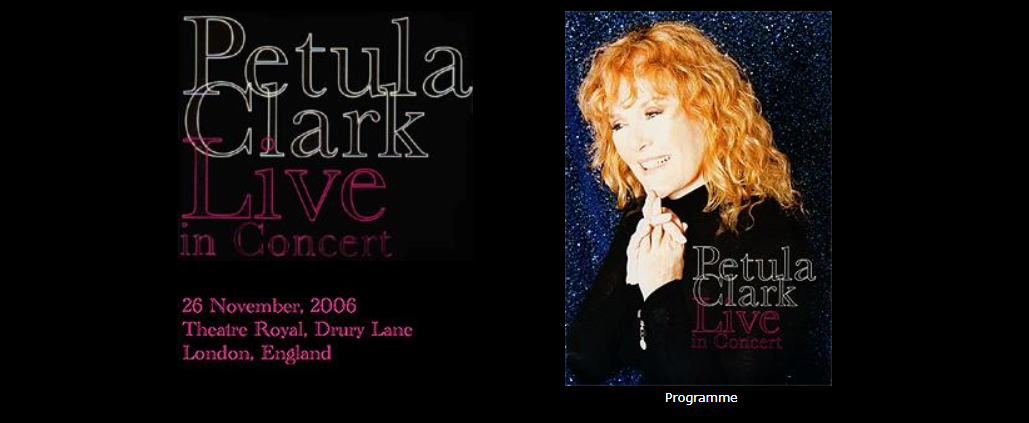

Petula Clark with the BBC Concert Orchestra
Plus special guests Michael Ball and Tony Hatch
This concert was broadcast by BBC Radio 2
on 15 December, 2006 at 7:30pm
as
"Friday Night with Petula Clark"
FIRST ACT:
- Overture Of Petula's Hits
- Sign Of the Times
- I'm Not Afraid
- Don't Sleep In The Subway
- Look To The Rainbow
(from Finian's Rainbow) - Driven By Emotion
- Losing My Mind
(from Follies} - MICHAEL BALL - Since You've Been Gone
- MICHAEL BALL - Home
- MICHAEL BALL - One Voice
- Together
(Petula and Michael Ball duet) - The Perfect Year (from Sunset Boulevard)
(Petula and Michael Ball duet) - I Couldn't Live Without Your Love
(Petula and Michael Ball duet)
SECOND ACT
- Who Am I?
- TONY HATCH - Medley of hits including Forget Him, Sugar And Spice and TV Themes from Crossroads and Neighbors
- Call Me/The Other Man's Grass Is Always Greener/I Know A Place (Petula and Tony Hatch)
- MICHAEL BALL - Joanna
- Come Along With Me
- Theatre Poem
- Tell Me It's Not True (from Blood Brothers)
- With One Look (from Sunset Boulevard)
- To Memphis
- Kiss Me Goodbye/My Love Medley
- Starting All Over Again
- Downtown
ENCORES - Here For You
- You're the One (Petula with Michael Ball and Tony Hatch)
- You & I (from Goodbye Mr. Chips)
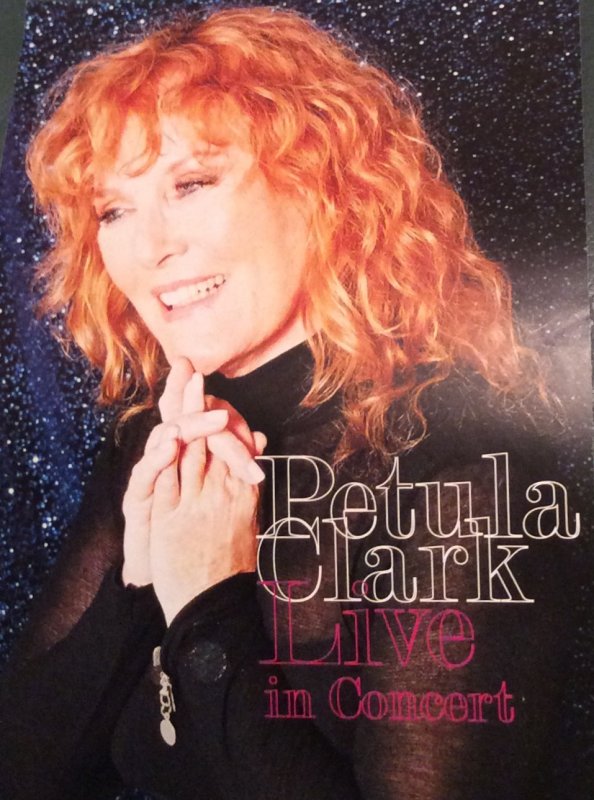
Flyer

Reykjavik, ICELAND
Frostrósir 2006
'FROSTROSES 2006'
Special Guest Star: Petula Clark.
Show also featured Christmas songs performed by other European divas.
Petula performed Silent Night and also sang O Holy Night as part of the ensemble chorus of Ragga Gislá, Sissel Kyrkjebø, Eivør Páldottir, Eleftheria Arvanitaki, Patricia Bardon and Johann Friõgeir
Reykjavik, ICELAND
Frostrósir 2006
'FROSTROSES 2006'
Special Guest Star: Petula Clark.
Show also featured Christmas songs performed by other European divas.
Petula performed Silent Night and also sang O Holy Night as part of the ensemble chorus of Ragga Gislá, Sissel Kyrkjebø, Eivør Páldottir, Eleftheria Arvanitaki, Patricia Bardon and Johann Friõgeir

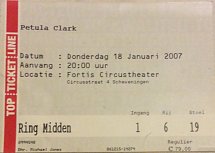
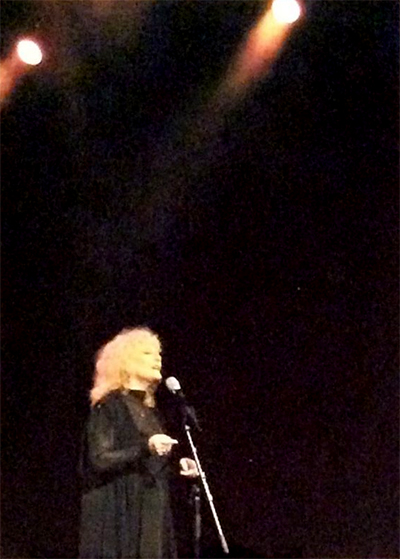
More than 200 artists performed at the Frostroses concert in Reykjavik on Tuesday, December 5, 2006, including European divas Sissel Kirkjebø, Patrica Bardon and Eleftheria Arvanitaki.
The 2006 Frostroses concert, held in Iceland for the fifth time, was by far the biggest Christmas concert ever to be held in Iceland according to RÚV.
Icelandic diva Ragnhildur Gisladöttir and Eivör P´lsdóttir from the Faroe Islands performed along with Sissel Kirkjebö from Norway, Particia Bardon from Ireland and Greek diva Eleftheria Arvanitaki.
Petula Clark, who is by many regarded as the original European diva, sang Silent Night as special guest performer and also O Holy Night in the ensemble chorus.
The concert was broadcast on RUV, Icelandic TV on December 31, 2006 and was available on DVD & CD.
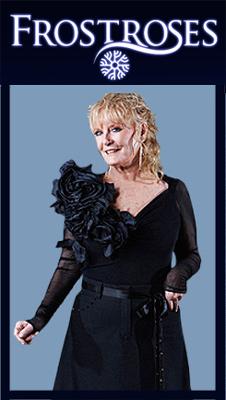
2007
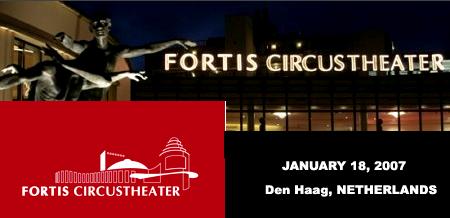
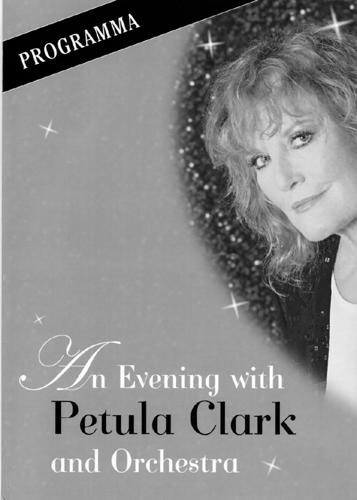
Song List
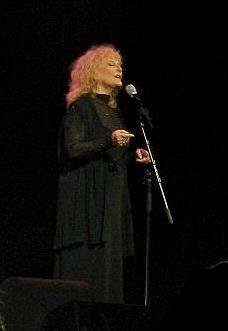
- FIRST PART
- Who Am I
- Twelfth of Never
- Don't Sleep In The Subway
- I'm Not Afraid
- Look To The Rainbow (from Finian's Rainbow)
- This is My Song
- I Know a Place
- To Memphis
- Sixties medley:
Round Every Corner/Call Me/Other Man's Grass - Tell Me It's Not True (from Blood Brothers)
SECOND PART
- You and I (begun off stage)/ Sign of the Times
- Driven by Emotion
- Un enfant
- Colour My World
- Theatre Poem
- Losing My Mind (from Follies)
- With One Look (from Sunset Boulevard)
- You're the One
- Kiss Me Goodbye/My Love
- Downtown
- Here For You
- I Couldn't Live Without Your Love
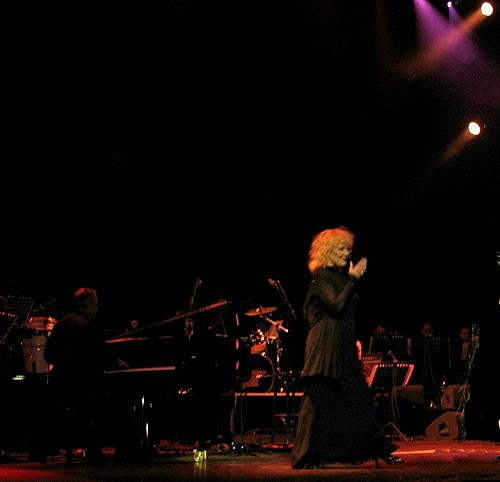 ©Photos by Mike Jones
©Photos by Mike Jones
Poster
Song List
PART ONE
- Who Am I
- Twelfth of Never
- Don't Sleep in the Subway
- I'm Not Afraid
- This is My Song
- I Know a Place
- Sign of the Times
- Come Along with Me
- Sixties Medley
- Tell Me It's Not True
- You're the One
PART TWO
- Jazz Medley
- I Want to Hold Your Hand
- Losing My MInd
- I Never Do Anything Twice
- Love Songs Medley
- Downtown
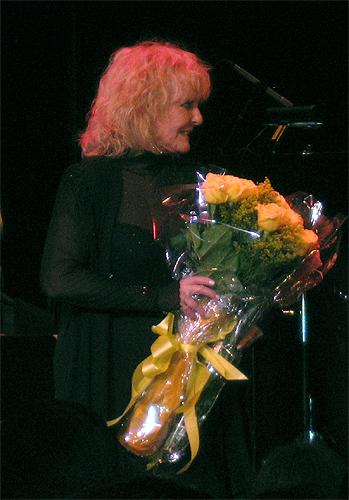 ©All photos by Kate Wulf
©All photos by Kate Wulf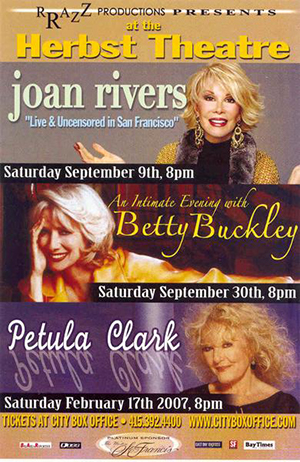
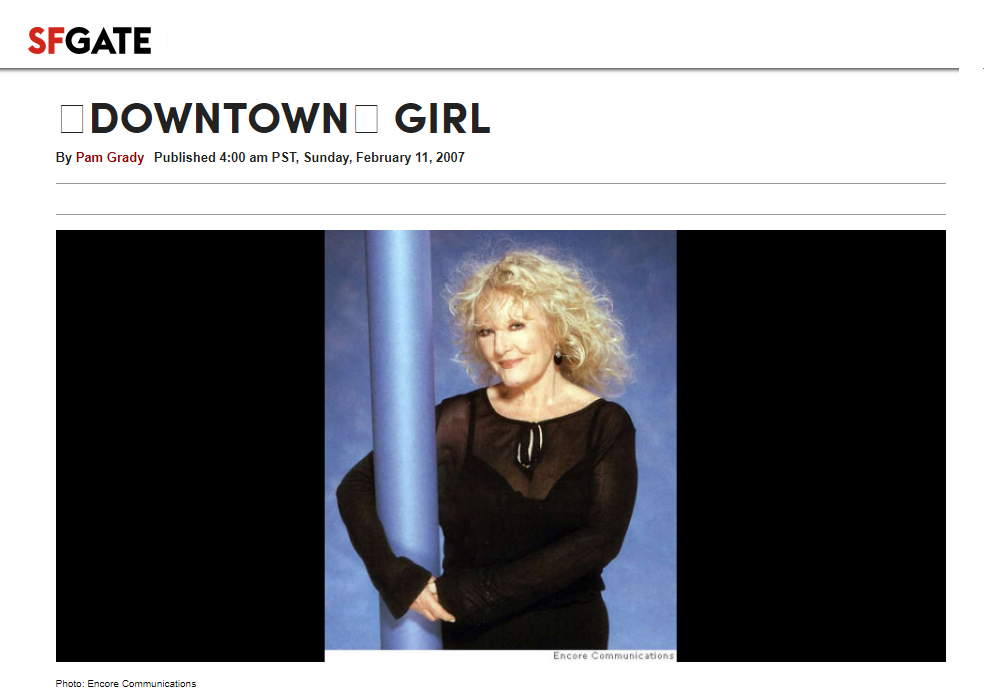 When Petula Clark takes the stage Saturday at Herbst Theatre, her fans can expect a survey of her more than six decades in show business, perhaps a tune or two from stage shows that she has starred in, such as "Sunset Boulevard"; maybe a song from "Finian's Rainbow," the musical she did with Fred Astaire; and a selection of her own compositions. And no show is complete without the big hits, including "Downtown" and "Don't Sleep in the Subway."
Hard to believe it, but Clark, that icon of the swinging '60s, is 74 now and a grandmother. On the phone from Miami, she has a cold -- "It's a Welsh cold," she says, laughing. "I think it will be over by the time I get to San Francisco." But even struck low by illness, she displays a youthful timbre in her voice and an exploding energy that belie her age. As someone who has been performing very nearly as long as she has been alive, she is the consummate trouper.
Clark was already a pro at age 6, and she grew up entertaining the troops all around England during World War II. She recently unearthed an inscribed badge from the American Red Cross celebrating her contributions to the war effort.
When Petula Clark takes the stage Saturday at Herbst Theatre, her fans can expect a survey of her more than six decades in show business, perhaps a tune or two from stage shows that she has starred in, such as "Sunset Boulevard"; maybe a song from "Finian's Rainbow," the musical she did with Fred Astaire; and a selection of her own compositions. And no show is complete without the big hits, including "Downtown" and "Don't Sleep in the Subway."
Hard to believe it, but Clark, that icon of the swinging '60s, is 74 now and a grandmother. On the phone from Miami, she has a cold -- "It's a Welsh cold," she says, laughing. "I think it will be over by the time I get to San Francisco." But even struck low by illness, she displays a youthful timbre in her voice and an exploding energy that belie her age. As someone who has been performing very nearly as long as she has been alive, she is the consummate trouper.
Clark was already a pro at age 6, and she grew up entertaining the troops all around England during World War II. She recently unearthed an inscribed badge from the American Red Cross celebrating her contributions to the war effort."I was sort of a mascot of the GIs based in London, but also I was singing for the Free French, the Poles, the Canadians and, of course, the Brits," Clark says. "That's what I used to do, and actually there was another little girl doing the same kind of thing. That was Julie Andrews. We used to travel in troop trains, and we used to sleep in the luggage racks."
That opportunity led to others, and by the time she was 11, Clark was making movies as a contract player with the Rank Organization. If most of the films were forgettable, the experience afforded at least one brush with authentic genius when Michael Powell and Emeric Pressburger -- the auteurs behind "Black Narcissus" and "The Red Shoes" -- cast her in a supporting role in their 1945 romantic drama "I Know Where I'm Going."
"It was a very dark studio movie," she says. "I was actually terrified of Michael Powell; a lot of people were. He was a rather sadistic man. He used to really squeeze performances out of his actors by frightening them."
Perhaps more insidious to Clark's future prospects than Powell's cruelty was the Rank Organization's campaign to keep her in little girl roles as she started to mature, mandating childish hairstyles and clothing, and even going so far as to bind her breasts.
"I think I had to unlearn some of the things I picked up as a child performer," she says. "For a while, I was acting younger than I was, and it was very difficult for me. I really didn't want to do it. But I picked up a few cute little tricks that I had to get rid of."
Her recording career began in earnest during the 1950s, and she charted her first British hit, "The Little Shoemaker," in 1954, topping out at No. 7. She hit No. 1 for the first time with "Sailor" in 1961. That year she married French record executive Claude Wolff and moved to France, where, she believes, she finally came into her own as a performer. "I have to say that I did a great deal of growing up in France," she says. "I think that's when I started learning a little bit more, really what performing is about, just by being in the presence of people like Charles Aznavour and Edith Piaf and Jacques Brel and people like that. It was about finding what you have inside you. It's not that I was actually studying this. It's just, when you're surrounded by this other way of doing things, it sort of rubs off on you."
Clark was on tour in Quebec when "Downtown" reached No. 1 in the United States in 1965. The song had charted in England the year before, and she was already an international star. But she still insists that when Tony Hatch's ditty rhapsodizing about how "the lights are much brighter there, you can forget all your troubles, forget all your cares" hit stateside, she was unprepared.
"It was great and, at the same time, it really complicated my life," she says. "I already had a full diary professionally, and I had two small children. Suddenly, America was calling, and it was wonderful, but it wasn't easy."
Throughout the 1960s, Clark continued to make the charts on both sides of the Atlantic. Her schedule filled with television and nightclub dates. She even revived her film career, starring opposite Peter O'Toole in "Goodbye, Mr. Chips" and working with Astaire on "Finian's Rainbow" for a young director from San Francisco named Francis Ford Coppola. She recalls Coppola insisting that the cast perform the show live in a shed on the Warner Bros. back lot for the crew's friends and family. "Fred was really totally bemused by the whole thing," Clark says, laughing. "He'd never had to do anything like that before. Of course, this was Francis' idea of 'getting down to the bones of the show' kind of thing."
Her stage career took off in 1981 when she played Maria von Trapp in a West End revival of "The Sound of Music" and her performance was lauded by no less an authority than the real von Trapp, who said Clark's performance was "the closest I've ever seen to what it was really like." In the mid-1990s, Clark spent a year on Broadway opposite David and Shaun Cassidy in the musical "Blood Brothers." More recently, she played silent film diva Norma Desmond in Andrew Lloyd Webber's "Sunset Boulevard," in London's West End and on a tour that took her to San Francisco in 1999.
For all of her achievements in the post-"Downtown" era, Clark says she understands the importance of that one song and just how much it has come to define her career. "It was extraordinary," she says. "You can't prepare for that. I don't think you can just say, 'Oh, I think I'm going to be a star in America.' It just doesn't work like that. They either love you or they don't, and they just happened to fall in love with this song, and I guess with me along with it.

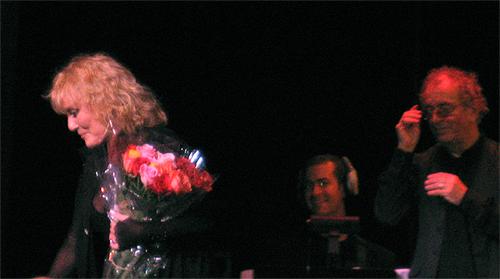
March 22, 2007
Prairie Meadows Casino
Altoona, Iowa USA
March 22, 2007
Prairie Meadows Casino
Altoona, Iowa USA
March 24, 2007
Keswick Theatre
Glenside, Pennsylvania USA
March 24, 2007
Keswick Theatre
Glenside, Pennsylvania USA
March 25, 2007
Bergen Performing Arts Center
Engelwood, New Jersey USA
March 25, 2007
Bergen Performing Arts Center Engelwood, New Jersey USA
March 31, 2007
Spotlight 29 Casino
Coachella, California USA
March 31, 2007
Spotlight 29 Casino
Coachella, California USA
- 15 April, 2007
- 16 April, 2007
- 17 April, 2007
- 19 April, 2007
- 20 April, 2007
- 21 April, 2007
- 22 April, 2007
- 23 April, 2007
- 25 April, 2007
- 26 April, 2007
- 27 April, 2007
- 29 April, 2007
- 30 April, 2007
- Concert Hall, Perth, Scotland
- Music Hall, Aberdeen, Scotland
- Royal Concert Hall, Glascow, Scotland
- City Hall, Newcastle-Upon-Tyne, England
- Wycombe Swan Theatre, High Wycombe, England
- Brenwood Centre, Brentwood, England
- Royal & Derngate, Northampton, England
- Opera House, Buxton, England
- Marina Theatre, Lowestoft, England
- Fairfield Halls, Croydon, England
- St. George's Hall, Bradford, England
- Embassy Theatre, Skegness, England
- Corn Exchange, Kings Lynn, England
- 15 April, 2007
- 16 April, 2007
- 17 April, 2007
- 19 April, 2007
- 20 April, 2007
- 21 April, 2007
- 22 April, 2007
- 23 April, 2007
- 25 April, 2007
- 26 April, 2007
- 27 April, 2007
- 29 April, 2007
- 30 April, 2007
- Concert Hall, Perth, Scotland
- Music Hall, Aberdeen, Scotland
- Royal Concert Hall, Glascow, Scotland
- City Hall, Newcastle-Upon-Tyne, England
- Wycombe Swan Theatre, High Wycombe, England
- Brenwood Centre, Brentwood, England
- Royal & Derngate, Northampton, England
- Opera House, Buxton, England
- Marina Theatre, Lowestoft, England
- Fairfield Halls, Croydon, England
- St. George's Hall, Bradford, England
- Embassy Theatre, Skegness, England
- Corn Exchange, Kings Lynn, England
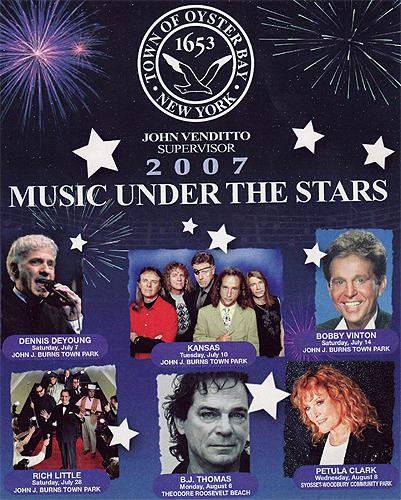
Poster
Song List
- Who Am I
- Twelfth of Never
- Don't Sleep in the Subway
- I'm Not Afraid
- This is My Song
- I Know a Place
- Look to the Rainbow
- Color My World
- I Want to Hold Your Hand
- Sign of the Times
- Theatre Poem
- Losing My MInd
- With One Look
- Tell Me It's Not True
- Love Songs Medley
- Memphis
- Downtown
- Here for You
- I Couldn't Live Without Your Love
August 11, 2007
Zoellner Arts Center
Lehigh University
Bethlehem, Pennsylvania USA
Musikfest 2007
August 11, 2007
Zoellner Arts Center
Lehigh University
Bethlehem, Pennsylvania USA
Musikfest 2007
September 7, 2007
Frank Sisson's Silver Dollar Casino
Calgary, Alberta CANADA
September 7, 2007
Frank Sisson's Silver Dollar Casino
Calgary, Alberta CANADA
September 9-10, 2007
Festival Place
Edmonton, Alberta CANADA
September 9-10, 2007
Festival Place
Edmonton, Alberta CANADA
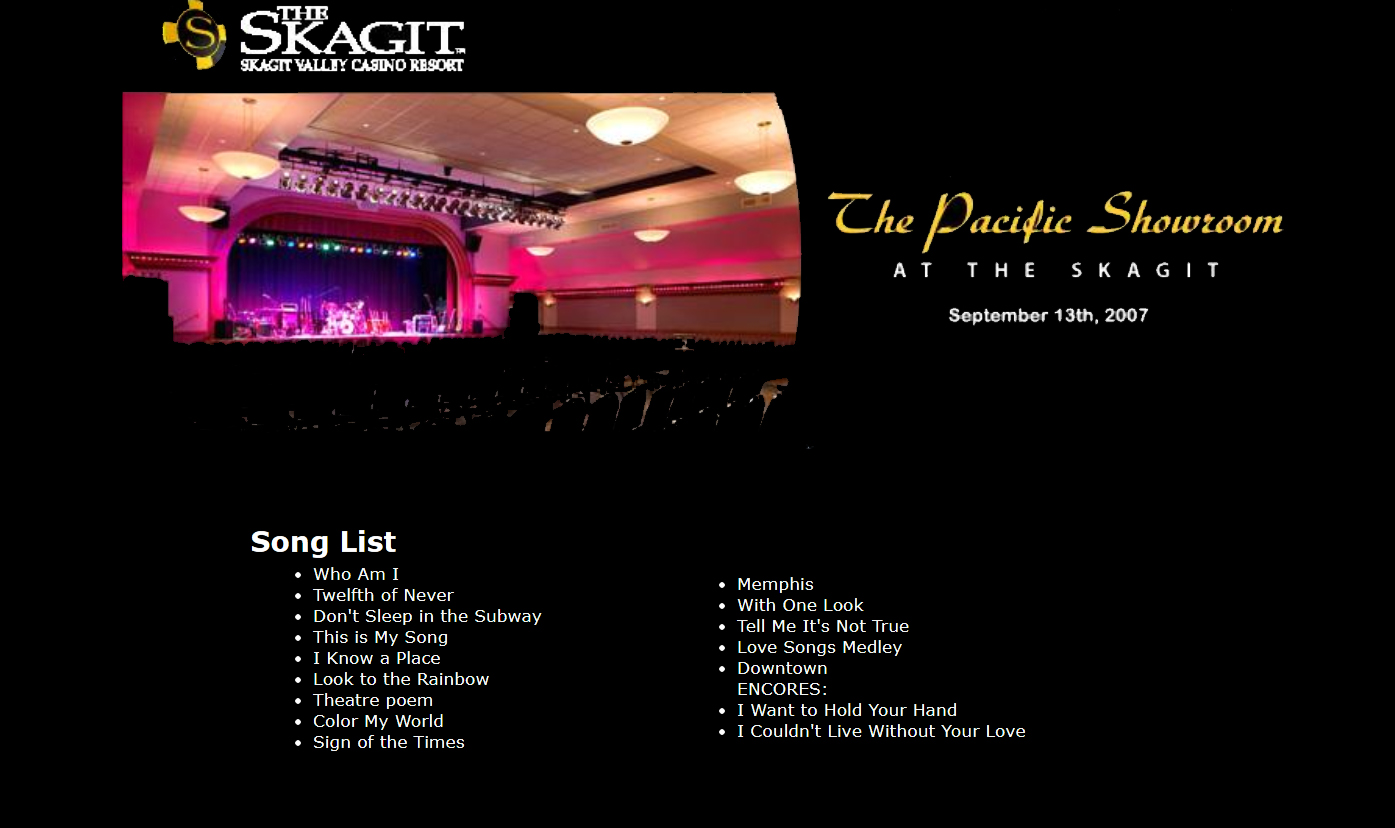
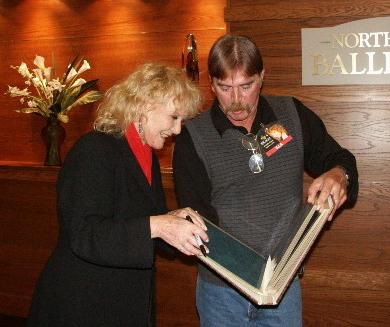
Petula greets long-time fan Robert Tiley, who shares pictures he has
taken of her in concert over the years.

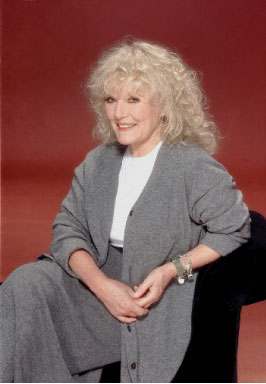 A Conversation with Petula Clark
A Conversation with Petula ClarkGordon Weeks
September 11, 2007
The "Downtown" singer performs two shows in Bow
The last time English singer/actress Petula Clark was in the Northwest, she was portraying Norma Desmond in the touring Broadway musical "Sunset Boulevard." Norma is an aging and deluded former actress, shut up in her mansion, reading fan mail from decades earlier and replaying the silent films that had made her great 30 years earlier.
No such fate for Clark, who performs at 6:30 and 9 p.m. Sunday, Sept. 16 at the Skagit Casino and Resort in Bow. She's remained active in show business since being child star in her native England during the 1940s, with a 60-year resume that includes hits songs ("Downtown," "I Know a Place"), movies ("Finian's Rainbow," "Goodbye, Mr. Chips"), and theater ("Blood Brothers," "The Sound of Music"). And she's not holed up in mansion, but dividing her off-stage time at residences in London, Paris and Geneva, Switzerland. "I don't live anywhere .... I don't have what I call a home," she said in a telephone interview from her residence in the Chelsea district of London. Tickets for Clark's shows are $40, and can be purchased by calling Ticketmaster at (206) 628-0888 or free of service charge at the resort box office. Before she turned nine years old, the "British Shirley Temple" had performed more than 200 shows for troops all over England. She traveled on troop trains with fellow child star Julie Andrews, and rarely attended school. "We thought it was kind of exciting," she recalled. "We lived in air raid shelters ... We thought that was something normal, and a little bit exciting."
Clark as a child hosted her own radio show on the BBC, and recorded her first record, "Music, Music, Music" in 1949. Her first hits were children's songs like "Where Did My Snowman Go" in 1952 and "The Little Shoemaker" in 1954. In the late 1950s, she began
The last time English singer/actress Petula Clark was in the Northwest, she was portraying Norma Desmond in the touring Broadway musical "Sunset Boulevard." Norma is an aging and deluded former actress, shut up in her mansion, reading fan mail from decades earlier and replaying the silent films that had made her great 30 years earlier.
No such fate for Clark, who performs at 6:30 and 9 p.m. Sunday, Sept. 16 at the Skagit Casino and Resort in Bow. She's remained active in show business since being child star in her native England during the 1940s, with a 60-year resume that includes hits songs ("Downtown," "I Know a Place"), movies ("Finian's Rainbow," "Goodbye, Mr. Chips"), and theater ("Blood Brothers," "The Sound of Music"). And she's not holed up in mansion, but dividing her off-stage time at residences in London, Paris and Geneva, Switzerland. "I don't live anywhere .... I don't have what I call a home," she said in a telephone interview from her residence in the Chelsea district of London. Tickets for Clark's shows are $40, and can be purchased by calling Ticketmaster at (206) 628-0888 or free of service charge at the resort box office. Before she turned nine years old, the "British Shirley Temple" had performed more than 200 shows for troops all over England. She traveled on troop trains with fellow child star Julie Andrews, and rarely attended school. "We thought it was kind of exciting," she recalled. "We lived in air raid shelters ... We thought that was something normal, and a little bit exciting."
Clark as a child hosted her own radio show on the BBC, and recorded her first record, "Music, Music, Music" in 1949. Her first hits were children's songs like "Where Did My Snowman Go" in 1952 and "The Little Shoemaker" in 1954. In the late 1950s, she began
making recordings in French and has been embraced by the French as a chanteuse ever since.
Her signature song "Downtown" hit number one on the American charts in 1964, and earned Clark her first Grammy Award. She said she was delighted when the song's lyrics were dissected on the sitcom "Seinfeld," as a mystified George tries to figure out his boss' instructions with the clue, "It's all downtown." "I thought it was hysterical!," she said with a laugh. "It was great to be on a show I loved so much."
"I Know a Place" landed her a second Grammy in 1965, and the hits kept on coming: "This is My Song," "My Love," "I Couldn't Live Without Your Love," "Don't Sleep in the Subway," "Color My World," "The Other Man's Grass (Is Always Greener)."
During the 1960s, she starred in two Hollywood musicals, opposite Fred Astaire in Francis Ford Coppola's "Finian's Rainbow," and Peter O'Toole in "Goodbye, Mr. Chips." She made her debut on the West End of London in 1981 in "The Sound of Music," her Broadway debut in the musical "Blood Brothers" with brothers David and Shaun Cassidy in 1995. She portrayed Norma Desmond for two years in London before touring the United States in the role from late 1998 to early 2000.
"Sometimes a role can under your skin," she said. "She's a wicked lady. She's very unlike me. I had to live and breathe it ... I disliked her very much when I first played her ... I didn't like this person at all. By the time I got to Seattle, I liked her, had empathy for her."
Clark is now recording an album of duets with departed singers, including Peggy Lee, Bobby Darin, Dean Martin and Dusty Springfield, who she calls "probably the best of us British singers." Also released this year is her album "Solitude & Sunshine: The Songs of Rod McKuen."
"I Know a Place" landed her a second Grammy in 1965, and the hits kept on coming: "This is My Song," "My Love," "I Couldn't Live Without Your Love," "Don't Sleep in the Subway," "Color My World," "The Other Man's Grass (Is Always Greener)."
During the 1960s, she starred in two Hollywood musicals, opposite Fred Astaire in Francis Ford Coppola's "Finian's Rainbow," and Peter O'Toole in "Goodbye, Mr. Chips." She made her debut on the West End of London in 1981 in "The Sound of Music," her Broadway debut in the musical "Blood Brothers" with brothers David and Shaun Cassidy in 1995. She portrayed Norma Desmond for two years in London before touring the United States in the role from late 1998 to early 2000.
"Sometimes a role can under your skin," she said. "She's a wicked lady. She's very unlike me. I had to live and breathe it ... I disliked her very much when I first played her ... I didn't like this person at all. By the time I got to Seattle, I liked her, had empathy for her."
Clark is now recording an album of duets with departed singers, including Peggy Lee, Bobby Darin, Dean Martin and Dusty Springfield, who she calls "probably the best of us British singers." Also released this year is her album "Solitude & Sunshine: The Songs of Rod McKuen."
- 22 September, 2007
- 23 September, 2007
- 11 October, 2007
- 12 October, 2007
- 13 October, 2007
- 20 October, 2007
- 21 October, 2007
- Sinah Warren Hotel, Hayling Island, Hampshire, England UK
- Cricket St. Thomas Hotel, Chard, Somerset, EnglandUK
- Ipswich Regent, Ipswich, England UK
- Marlowe Theatre, Canterbury, England UK
- Chichester Theatre, Chichester, England UK
- Forum Theatre, Malvern, England UK
- Grand Theatre, Leeds, England UK
- 22 September, 2007
- 23 September, 2007
- 11 October, 2007
- 12 October, 2007
- 13 October, 2007
- 20 October, 2007
- 21 October, 2007
- Sinah Warren Hotel, Hayling Island, Hampshire, England UK
- Cricket St. Thomas Hotel, Chard, Somerset, EnglandUK
- Ipswich Regent, Ipswich, England UK
- Marlowe Theatre, Canterbury, England UK
- Chichester Theatre, Chichester, England UK
- Forum Theatre, Malvern, England UK
- Grand Theatre, Leeds, England UK

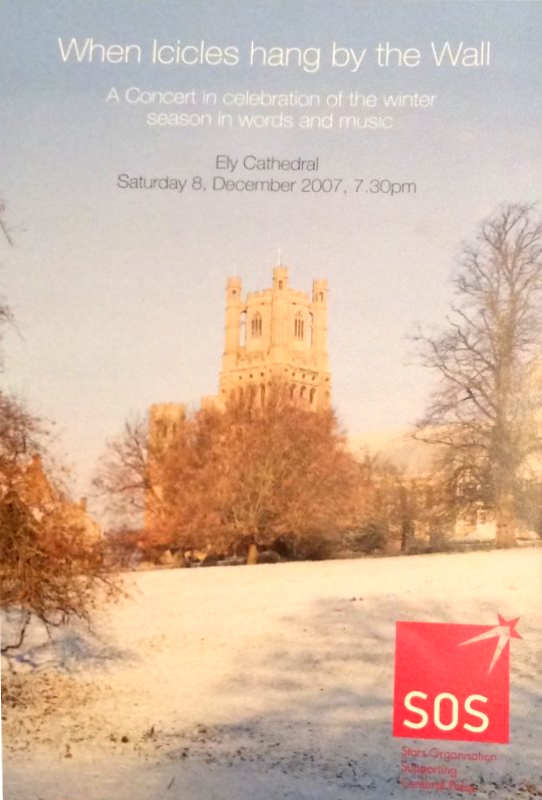
Programme
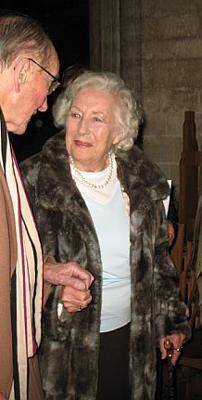
Dame Vera Lynn
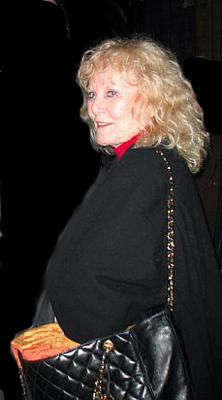
Petula also sang It Might as Well Be Spring.
Review of "When Icicles Hang by the Wall"
Ely Cathedral confirmed its reputation as a centre of high profile excellence with the production of "When Icicles hang by the Wall", the brainchild of Roger Redfarn.
A phenomenal line up of participating top stars included Petula Clark, Nicholas Grace, David Griffin, Sylvia Syms, Christopher Timothy and June Whitfield. The evening culminated with the special guest appearance of none-other than Dame Vera Lynn OBE LLD.
The programme of words and music celebrating winter was framed with the expected first-class music of Ely Cathedral Choir directed by Paul Trepte. Jonathan Lilley accompanied on piano or organ with his usual formidable flair and sensitivity. The choir sang a delightful array of compositions including the nostalgic "September Song" (Kurt Weill), a glitzy "We Need a Little Christmas" (Jerry Herman) and favourites such as "Zither Carol" (arr. Sargent), Rutter's "Donkey Carol" and Holst's "Tomorrow shall be my Dancing Day". The choir's unrivalled powerfully focussed and sustained sound positively inspired the packed audience. One of the most moving moments was their mesmerising performance of "In the Bleak Midwinter" (Darke). The choir, resplendent in red and placed in the Cathedral's famous octagon with the dazzling Christmas tree to the side, gave the listeners an unforgettable experience that will forever remind them of the spirit of winter.
The famous stars on stage added greatly to this phenomenal experience. Petula Clark appealed strongly to the emotions with her uniquely arranged interpretations of familiar songs such as "Autumn Leaves" (Johnny Mercer) and "I'll be Home for Christmas" (Kent and Gannon). In her reading of Wordsworth's poem "The Daffodils" she captured the light, beauty and reflection in the words magnificently. Nickolas Grace gave particularly charismatic readings especially in "The Boy Actor" by Noel Coward. With his acting skill we could readily believe it was the voice of noel Coward describing his youthful delight in the theatre. David Griffin, with his special vocal timbre and purposeful diction, enlivened the imagination with his inspired readings of "The Burning Leaves" (L. Binyon), "Stopping by Woods on a Snowy Evening" (Robert Frost) and "The Highwayman" (Alfred Noyes). Sylvia Sims filled the Cathedral with laughter with her reading of Shirley Valentine talking to her wall in Willy Russell's "Nativity". Every ounce of humour was milked from the parent's recall of the disastrous debut of her son as an actor when he was given the part of Joseph in the school nativity play. The calm voice of reason, fatherly-concern and wisdom by Christopher Timothy gave a special sense of friendly intimacy to his readings such as "A Soldier's Winter" (Larry Cluck). In "Christmas at Sea" a sense of urgency and drama caught us up in the dangers of a wild sinter sea and his reading of "The Fight of the Year" (Roger McGough) buzzed with sheer excitement and drive. June Whitfield filled the Cathedral with her unmistakeable wit and captivating style. She drew every ounce of expression and humour from "No" (Thomas Hood), "The New Regime" (Wendy Copel) and "The Twelve Days of Christmas" (John Julian Norwich).
This highly successful prestigious event raised funds for SOS - The Stars Organization for Cerebral Palsy and for the Ely Cathedral Music Appeal. An impressive speech by the President of SOS, Dame Vera Lynn, in a strong unblemished voice (in spite of her 90 years) described the huge benefits this organisation provides. One example given was the organisation's support for parents of children with cerebral palsy aged from a few months to 5 years old - a period not supported by the education authorities. Such parents are taught how to apply the Hungarian-initiated style of conductive teaching that teaches the children to lift their head, to turn their eyes, to hold a spoon - to use their bodies more effectively so that they can help themselves.
This was indeed a special event supporting special and deserving causes.
Rosemary Westwell
A phenomenal line up of participating top stars included Petula Clark, Nicholas Grace, David Griffin, Sylvia Syms, Christopher Timothy and June Whitfield. The evening culminated with the special guest appearance of none-other than Dame Vera Lynn OBE LLD.
The programme of words and music celebrating winter was framed with the expected first-class music of Ely Cathedral Choir directed by Paul Trepte. Jonathan Lilley accompanied on piano or organ with his usual formidable flair and sensitivity. The choir sang a delightful array of compositions including the nostalgic "September Song" (Kurt Weill), a glitzy "We Need a Little Christmas" (Jerry Herman) and favourites such as "Zither Carol" (arr. Sargent), Rutter's "Donkey Carol" and Holst's "Tomorrow shall be my Dancing Day". The choir's unrivalled powerfully focussed and sustained sound positively inspired the packed audience. One of the most moving moments was their mesmerising performance of "In the Bleak Midwinter" (Darke). The choir, resplendent in red and placed in the Cathedral's famous octagon with the dazzling Christmas tree to the side, gave the listeners an unforgettable experience that will forever remind them of the spirit of winter.
The famous stars on stage added greatly to this phenomenal experience. Petula Clark appealed strongly to the emotions with her uniquely arranged interpretations of familiar songs such as "Autumn Leaves" (Johnny Mercer) and "I'll be Home for Christmas" (Kent and Gannon). In her reading of Wordsworth's poem "The Daffodils" she captured the light, beauty and reflection in the words magnificently. Nickolas Grace gave particularly charismatic readings especially in "The Boy Actor" by Noel Coward. With his acting skill we could readily believe it was the voice of noel Coward describing his youthful delight in the theatre. David Griffin, with his special vocal timbre and purposeful diction, enlivened the imagination with his inspired readings of "The Burning Leaves" (L. Binyon), "Stopping by Woods on a Snowy Evening" (Robert Frost) and "The Highwayman" (Alfred Noyes). Sylvia Sims filled the Cathedral with laughter with her reading of Shirley Valentine talking to her wall in Willy Russell's "Nativity". Every ounce of humour was milked from the parent's recall of the disastrous debut of her son as an actor when he was given the part of Joseph in the school nativity play. The calm voice of reason, fatherly-concern and wisdom by Christopher Timothy gave a special sense of friendly intimacy to his readings such as "A Soldier's Winter" (Larry Cluck). In "Christmas at Sea" a sense of urgency and drama caught us up in the dangers of a wild sinter sea and his reading of "The Fight of the Year" (Roger McGough) buzzed with sheer excitement and drive. June Whitfield filled the Cathedral with her unmistakeable wit and captivating style. She drew every ounce of expression and humour from "No" (Thomas Hood), "The New Regime" (Wendy Copel) and "The Twelve Days of Christmas" (John Julian Norwich).
This highly successful prestigious event raised funds for SOS - The Stars Organization for Cerebral Palsy and for the Ely Cathedral Music Appeal. An impressive speech by the President of SOS, Dame Vera Lynn, in a strong unblemished voice (in spite of her 90 years) described the huge benefits this organisation provides. One example given was the organisation's support for parents of children with cerebral palsy aged from a few months to 5 years old - a period not supported by the education authorities. Such parents are taught how to apply the Hungarian-initiated style of conductive teaching that teaches the children to lift their head, to turn their eyes, to hold a spoon - to use their bodies more effectively so that they can help themselves.
This was indeed a special event supporting special and deserving causes.
Rosemary Westwell
2008

SONG LIST
- Who Am I?
- Don't Sleep In The Subway
- This Is My Song
- Sign Of The Times
- I Want To Hold Your Hand
- I Know A Place
- Kiss Me Goodbye
- My Love
- Downtown
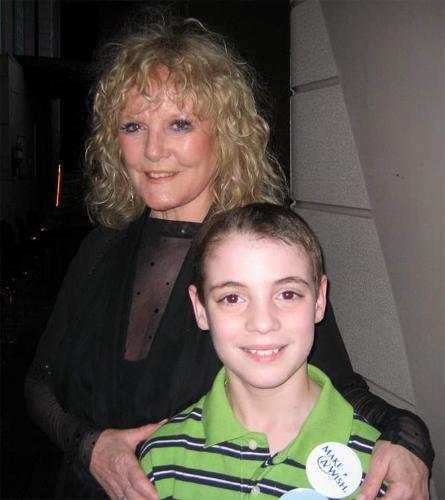
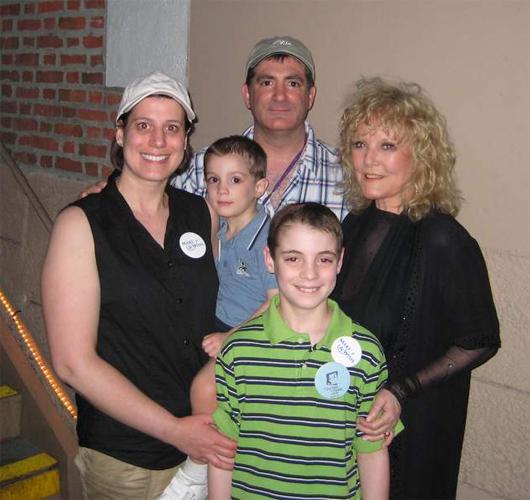
Dear Petula,
I am sorry I had not written sooner to thank you. I got sick when we got home from Walt Disney World for my Make-A-Wish trip . I am okay now. You made it a great memory for me. My family are still smiling that the whole thing of meeting you even happened. My grandparents were so jealous. My friends Brian and Joe (106.5 radio) were blown away. The pictures help to prove the whole thing happened. Allot of people that we know were so excited and still talk about it every time they see me. When we do the radio-a-thon in September with Brian and Joe, they will ask me all about my trip and meeting you. I cannot wait to brag about you.
My theme song as I go to the hospital every week is DOWN TOWN. We sing it in the car. I hope I get to see you again. I loved talking about Dean, Frank and everyone.
Love
Jacob
I am sorry I had not written sooner to thank you. I got sick when we got home from Walt Disney World for my Make-A-Wish trip . I am okay now. You made it a great memory for me. My family are still smiling that the whole thing of meeting you even happened. My grandparents were so jealous. My friends Brian and Joe (106.5 radio) were blown away. The pictures help to prove the whole thing happened. Allot of people that we know were so excited and still talk about it every time they see me. When we do the radio-a-thon in September with Brian and Joe, they will ask me all about my trip and meeting you. I cannot wait to brag about you.
My theme song as I go to the hospital every week is DOWN TOWN. We sing it in the car. I hope I get to see you again. I loved talking about Dean, Frank and everyone.
Love
Jacob
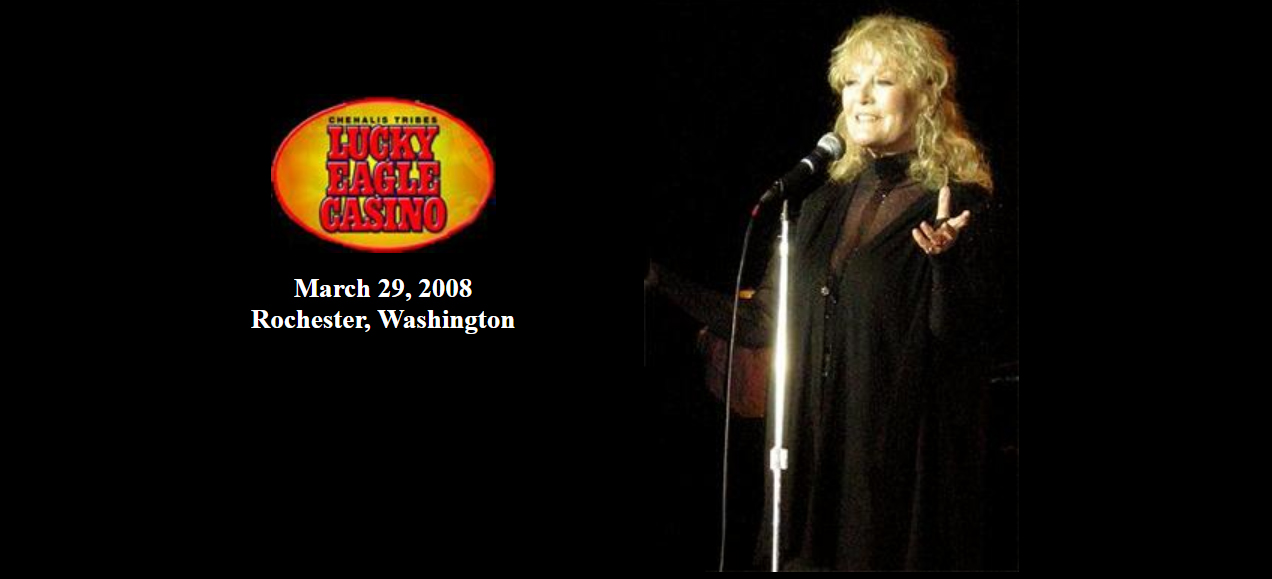
Song List
- Who Am I?
- Twelfth of Never
- Don't Sleep in the Subway
- I Want to Hold Your Hand
- This is My Song
- With One Look
- Tell Me it's Not True
- I Know a Place
- Look to the Rainbow
- Theatre Poem
- To Memphis
- Color My World
- Losing my mind
- Sign of the Times
- My Love
- Downtown
- I Couldn't Live Without Your Love
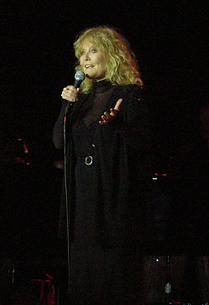 ©Photo by Bob Slavin
©Photo by Bob Slavin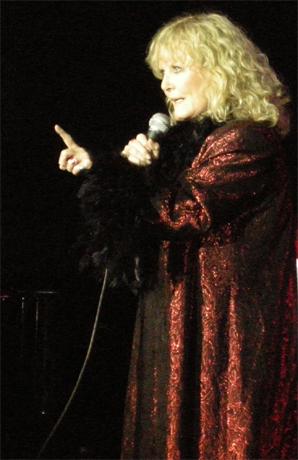
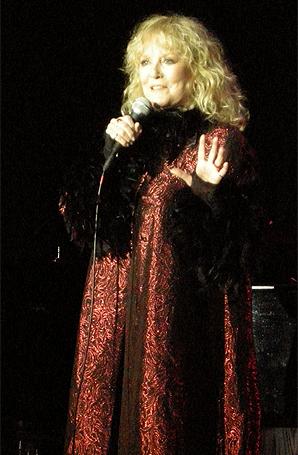
©Photos by David Hicks



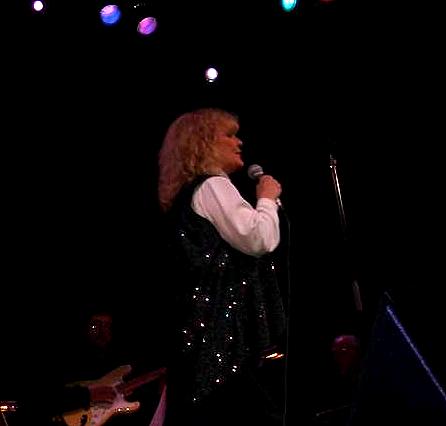 ©Photos by Pat Mann
©Photos by Pat Mann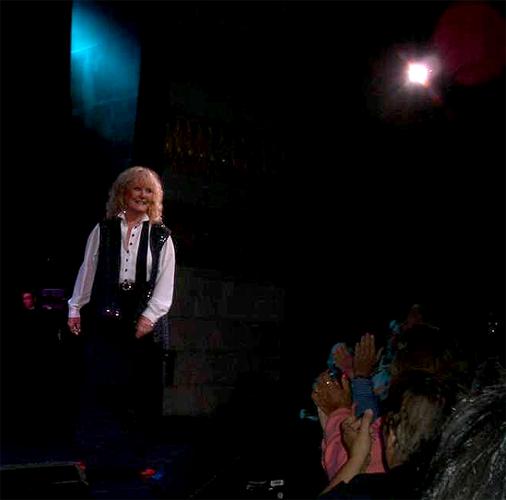

Petula Clark "Exclusive" In-store Appearance & CD/DVD Signing
Sunday, May 11th
Sunday, May 11th
Spin Street is once again honored to present international star of recording, film, television and stage Petula Clark in a very rare and exclusive personal appearance and CD/DVD signing immediately following her performance in The Cabaret Theatre on Sunday night, May 11th at 8:30 pm.
Petula has been wowing audiences worldwide for more than six decades with hits that include her signature and Grammy Hall of Fame inductee song "Downtown" and she is thrilled to be meeting her fans and signing copies of her latest CD entitled "Duets" featuring duet performances with Dusty Springfield, Rod McKuen, Michael McDonald, Bobby Darin, Dean Martin, Andy Williams and many more, as well as her new DVD "Petula" in the intimate setting of Spin Street, located in The Shops at Mohegan Sun.
Don't miss this golden opportunity to meet and speak with this legend in a relaxed setting and have her personally autograph your CD & DVD purchase. Due to the limited time she will be available, Ms. Clark will only be signing her product. No other memorabilia, please.
Petula has been wowing audiences worldwide for more than six decades with hits that include her signature and Grammy Hall of Fame inductee song "Downtown" and she is thrilled to be meeting her fans and signing copies of her latest CD entitled "Duets" featuring duet performances with Dusty Springfield, Rod McKuen, Michael McDonald, Bobby Darin, Dean Martin, Andy Williams and many more, as well as her new DVD "Petula" in the intimate setting of Spin Street, located in The Shops at Mohegan Sun.
Don't miss this golden opportunity to meet and speak with this legend in a relaxed setting and have her personally autograph your CD & DVD purchase. Due to the limited time she will be available, Ms. Clark will only be signing her product. No other memorabilia, please.
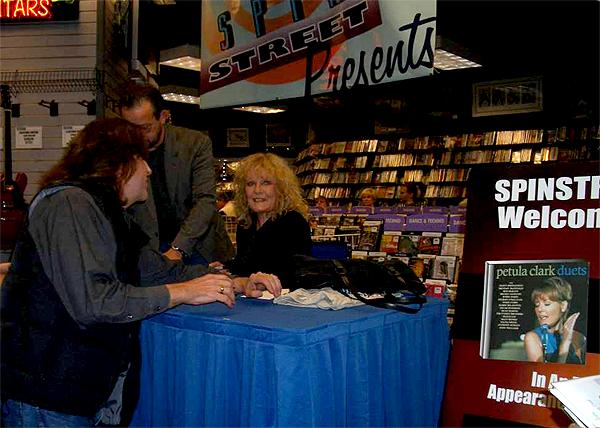


Venue
Song List
- Who Am I?
- Twelfth of Never
- Don't Sleep in the Subway
- I Want to Hold Your Hand
- This is My Song
- With One Look
- Tell Me it's Not True
- I Know a Place
- Look to the Rainbow
- Theatre Poem
- To Memphis
- Color My World
- Losing my Mind
- Sign of the Times
- My Love
- Downtown
- I Couldn't Live Without Your Love
- You're My Destiny (May 15 only)
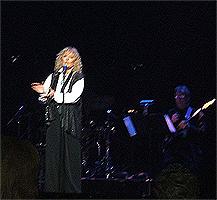
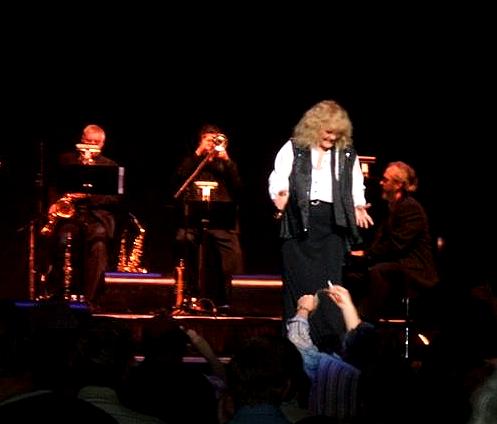 ©All photos by Dave Shetler
©All photos by Dave Shetler 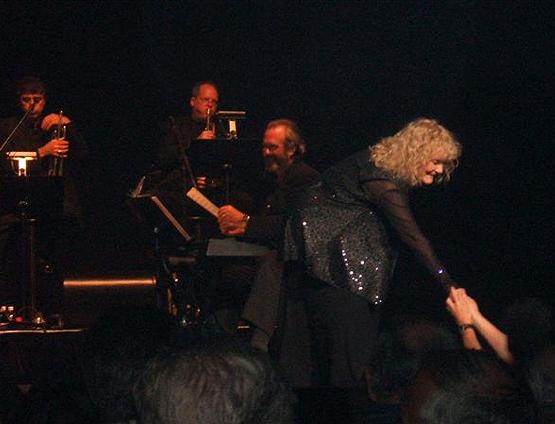
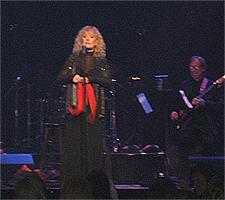

 ©Photo courtesy of Andy Williams
©Photo courtesy of Andy Williams
17th Annual Ella Award honoring Andy Williams
Andy Williams joined Ella Fitzgerald, Frank Sinatra, Tony Bennett and Celine Dion (to name a few) as the recipient of the Ella Award from the Society of Singers. This organization, founded by Ginny (Mrs. Henry Mancini), offers services to meet emergency financial needs of professional singers worldwide.
May 19, 2008
Beverly Hilton Hotel
The evening opened with Jerry F. Sharell, President, along with Jerry Joseph Sharell and Pat Boone warbling "Canadian Sunset", and closed with the entire cast performing "Our Love Is Here to Stay". And what a cast it was! Glen Campbell, PETULA CLARK, Johnny Mathis and Barry Manilow were among the talent singing their hearts out for the cause.
Even the honoree, Andy Williams himself performed "The Days of Wine and Roses," and "Moon River" - both of which were written by Henry Mancini, and won Academy Awards as best songs in 1961 and 1962!
Others enjoying the singing spectacular included Carol Burnett, Judge Judy Sheindlin, and actress Kathleen Quinlan. As Sir Paul McCartney stated, "Congratulations Andy, your voice is truly a national treasure."
Petula performed "Happy Heart" and joined the ensemble for "Our Love is Here to Stay."
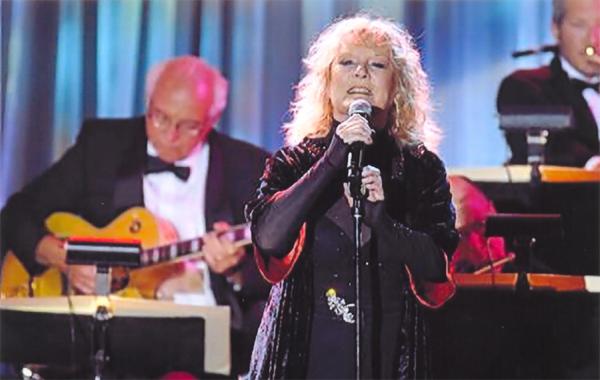 ©Photo courtesy of Andy Williams
©Photo courtesy of Andy Williams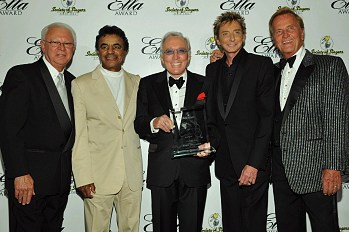
Jerry F. Sharell, Johnny Mathis, Andy Williams, Barry Manilow, Glen Campbell
The Voice - A Society of Singers Publication
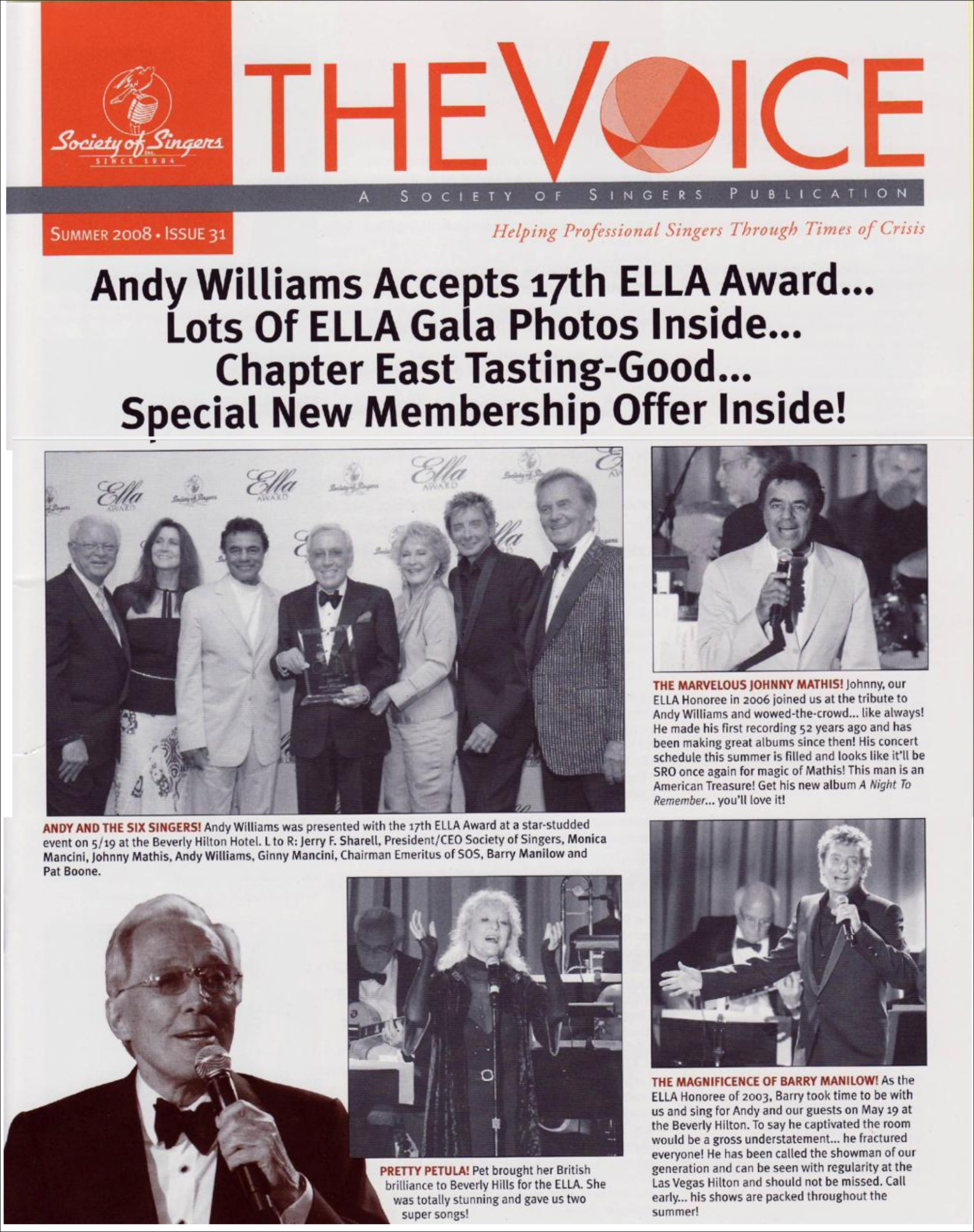
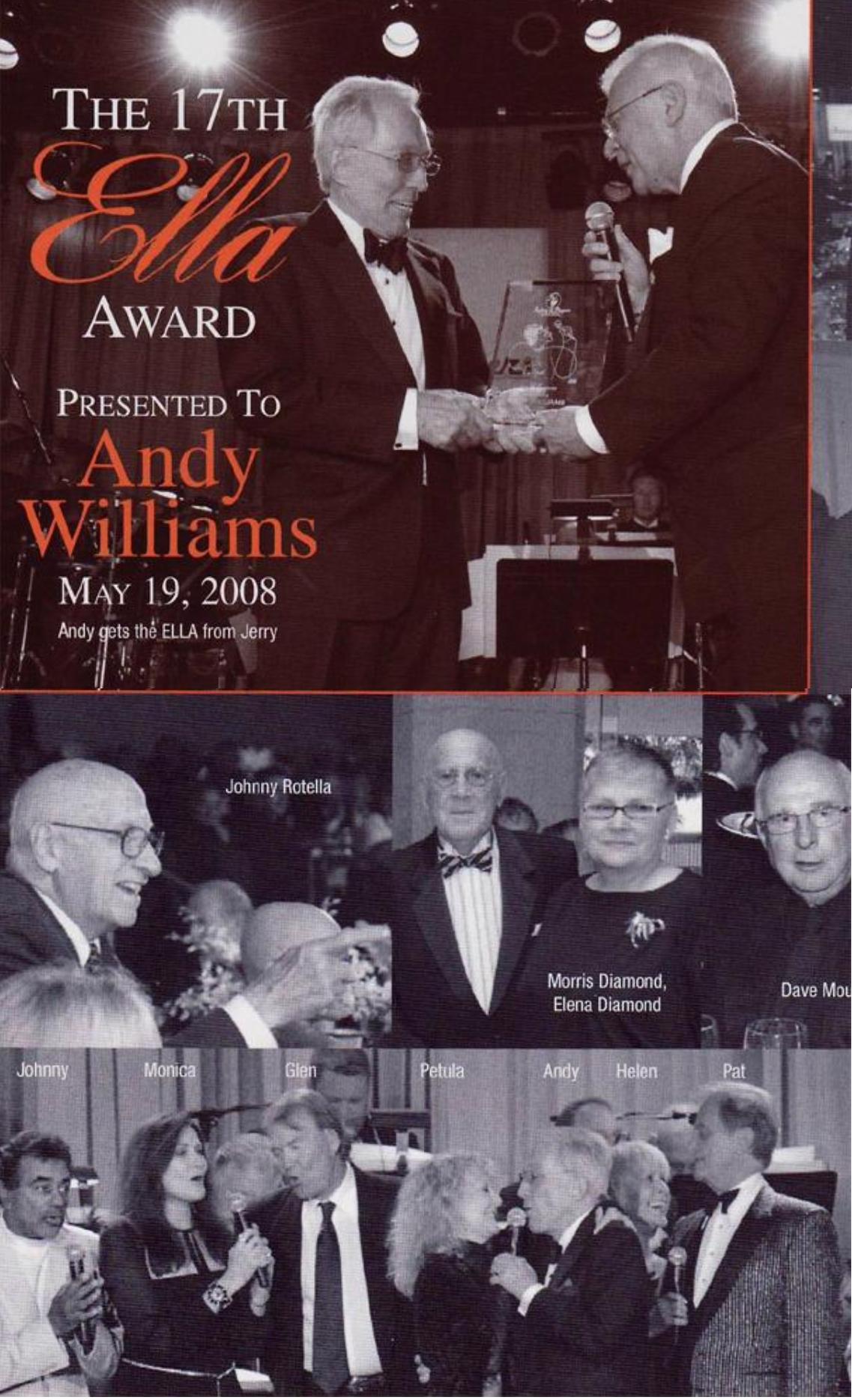

Beverly Hills Courier
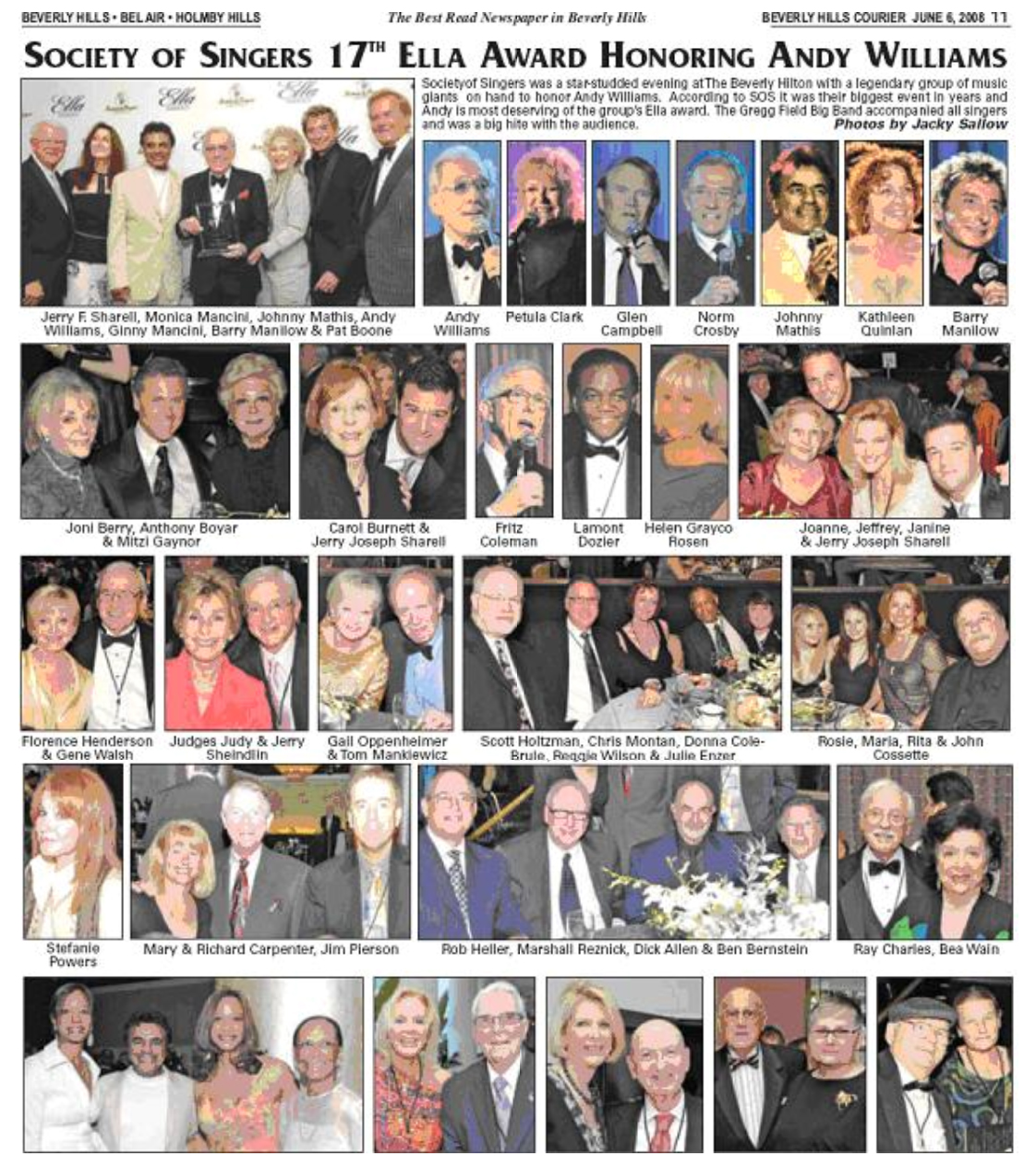
- 1 June, 2008
- 4 June, 2008
- 5 June, 2008
- 6 June, 2008
- 7 June, 2008
- 9 June, 2008
- 10 June, 2008
- 11 June, 2008
- 13 June, 2008
- 14 June, 2008
- 17 June, 2008
- Cadogan Hall, London, England UK
- Kings Theatre, Southsea, England UK
- Fairfield Concert Hall, Croydon, England UK
- Congress Theatre, Eastbourne, England UK
- Hall for Cornwall, Truro, England, UK
- De Montfort Hall, Leicester, England, UK
- Royal Spa Centre, Leamington Spa, England, UK
- Cheltenham Town Hall, Cheltenham, England, UK
- Assembly Hall, Worthing, England, UK
- Great Hall Arts Centre, Aberystwyth, Wales, UK
- Embassy Theatre, Skegness, England, UK
- 1 June, 2008
- 4 June, 2008
- 5 June, 2008
- 6 June, 2008
- 7 June, 2008
- 9 June, 2008
- 10 June, 2008
- 11 June, 2008
- 13 June, 2008
- 14 June, 2008
- 17 June, 2008
- Cadogan Hall, London, England UK
- Kings Theatre, Southsea, England UK
- Fairfield Concert Hall, Croydon, England UK
- Congress Theatre, Eastbourne, England UK
- Hall for Cornwall, Truro, England, UK
- De Montfort Hall, Leicester, England, UK
- Royal Spa Centre, Leamington Spa, England, UK
- Cheltenham Town Hall, Cheltenham, England, UK
- Assembly Hall, Worthing, England, UK
- Great Hall Arts Centre, Aberystwyth, Wales, UK
- Embassy Theatre, Skegness, England, UK
Stravinski Auditorium
Montreux, SWITZERLAND
Montreux Jazz Festival
Quincy Jones's 75th Anniversary Celebration
Patti Austin, PETULA CLARK, Billy Cobham, Herbie Hancock, Mick Hucknall, Al Jarreau, Chaka Khan, Angélique Kidjo, Nils Landgren, James Moody, James Morrison, Nana Mouskouri, Naturally 7, Paolo Nutini, Freda Payne, Lee Ritenour, Patrice Rushen, Joe Sample, Curtis Stigers, Larry Williams, Greg Phillinganes, Paul Jackson Jr , Nathan East, David Delhomme, John Robinson, Paulinho da Costa, Pepe Lienhard
Stravinski Auditorium
Montreux, SWITZERLAND
Montreux Jazz Festival
Quincy Jones's 75th Anniversary Celebration
Patti Austin, PETULA CLARK, Billy Cobham, Herbie Hancock, Mick Hucknall, Al Jarreau, Chaka Khan, Angélique Kidjo, Nils Landgren, James Moody, James Morrison, Nana Mouskouri, Naturally 7, Paolo Nutini, Freda Payne, Lee Ritenour, Patrice Rushen, Joe Sample, Curtis Stigers, Larry Williams, Greg Phillinganes, Paul Jackson Jr , Nathan East, David Delhomme, John Robinson, Paulinho da Costa, Pepe Lienhard

The star event of the 42nd edition of the Montreux Jazz Festival was the evening in honour of Quincy Jones on July 14th in the Stravinski Auditorium. A wide range of solo artists, accompanied by The In House Band and the Swiss Army Band, paid tribute to this legendary musician/arranger/composer. Due to the energy and hype surrounding the event, the main rehearsal was made open to the public on July 14th from 2pm to 5pm. The entirety of the rehearsal's earnings benefitted the Quincy Jones Listen Up Foundation which fights against poverty and violence by giving access to education and by encouraging youths to stay in school.
Quincy Jones's 75th Anniversary Celebration in the presence of Quincy Jones
Quincy Jones's 75th Anniversary Celebration in the presence of Quincy Jones
One Mint Julep
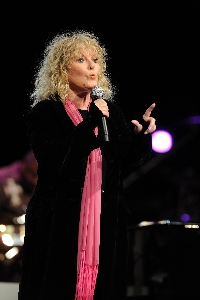 © Lionel Flusin
© Lionel Flusin ©Montreux Jazz Festival Foundation
Franco Ambrosetti
Patti Austin
PETULA CLARK
Billy Cobham
Herbie Hancock
Mick Hucknall
Al Jarreau
Chaka Khan
Angélique Kidjo
Nils Landgren
James Moody
James Morrison
Nana Mouskouri
Naturally 7
Paolo Nutini
Patti Austin
PETULA CLARK
Billy Cobham
Herbie Hancock
Mick Hucknall
Al Jarreau
Chaka Khan
Angélique Kidjo
Nils Landgren
James Moody
James Morrison
Nana Mouskouri
Naturally 7
Paolo Nutini
Freda Payne
Lee Ritenour
Patrice Rushen
Joe Sample
Curtis Stigers
Larry Williams
Greg Phillinganes
Paul Jackson Jr
Nathan East
David Delhomme
John Robinson
Paulinho da Costa
Pepe Lienhard
The Swiss Army Big Band
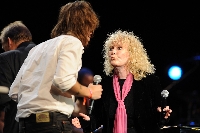 © Lionel Flusin
© Lionel Flusin
©Montreux Jazz Festival Foundation
Lee Ritenour
Patrice Rushen
Joe Sample
Curtis Stigers
Larry Williams
Greg Phillinganes
Paul Jackson Jr
Nathan East
David Delhomme
John Robinson
Paulinho da Costa
Pepe Lienhard
The Swiss Army Big Band
Goin' to Chicago with Paolo Nutini
 © Lionel Flusin
© Lionel Flusin ©Montreux Jazz Festival Foundation
Quincy Jones
 © Daniel Balmat
© Daniel Balmat © Montreux Jazz Festival Foundation
Chaka Khan, Freda Payne, Petula, Angélique Kidjo, Nana Mouskouri

A hug from Quincy
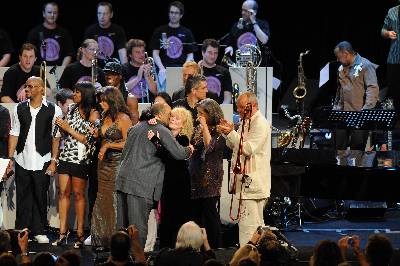 © Lionel Flusin
© Lionel Flusin ©Montreux Jazz Festival Foundation
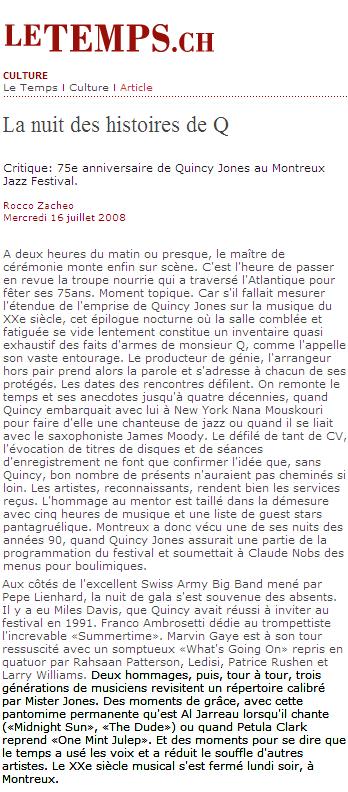
English Translation of emboldened review text:
Two tributes then, in turns, three generations of musicians revisited a repertoire composed by Mr. Jones. Moments of charm with the hand actions of Al Jarreau when he sings ("Midnight Sun" " The Dude") or when Petula Clark reworked "One Mint Julep". And moments to say to oneself that time has worn out some voices and taken its toll on others. The musical twentieth century closed on Monday evening at Montreux.
Translation courtesy of Peter Marren
Two tributes then, in turns, three generations of musicians revisited a repertoire composed by Mr. Jones. Moments of charm with the hand actions of Al Jarreau when he sings ("Midnight Sun" " The Dude") or when Petula Clark reworked "One Mint Julep". And moments to say to oneself that time has worn out some voices and taken its toll on others. The musical twentieth century closed on Monday evening at Montreux.
Translation courtesy of Peter Marren


The Club Cannery Casino Hotel North Las Vegas, Nevada September 6, 2008
Song List
- Who am I
- Twelfth of Never
- Don't Sleep in the Subway
- This is My Song
- People Get Ready
- Look to the Rainbow
- Sign of the Times
- Sixties medley
- La Vie en Rose
- With One Look
- Tell Me It's Not True
- Downtown
- I Couldn't Live Without Your Love
 © Photos
© Photos
 by Phil Meehan
by Phil Meehan
Manila Hotel Tent
Manila, PH8LIPPINES
Benefit for Bayanihang Pilipino Inc. and RCM 101 Right of the Child to Survive.
Opening Acts: The Three Tenors (DOE Secretary Angelo Reyes, MMDA Chairman Bayani Fernando and Former Senator and now Manila Hotel President Joey Lina) & classical-pop quartet, Angelos.
Manila Hotel Tent
Manila, PH8LIPPINES
Benefit for Bayanihang Pilipino Inc. and RCM 101 Right of the Child to Survive.
Opening Acts: The Three Tenors (DOE Secretary Angelo Reyes, MMDA Chairman Bayani Fernando and Former Senator and now Manila Hotel President Joey Lina) & classical-pop quartet, Angelos.
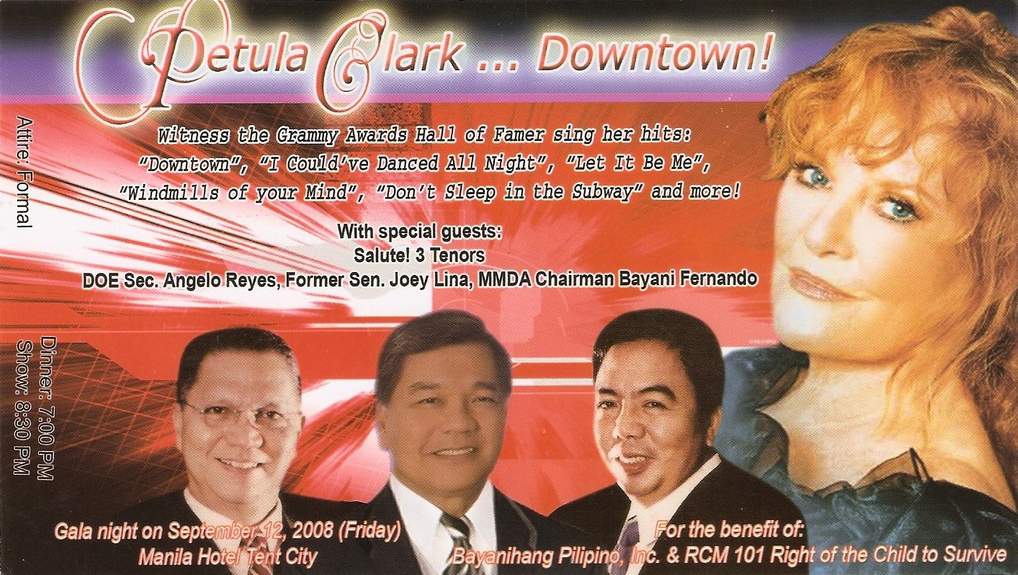
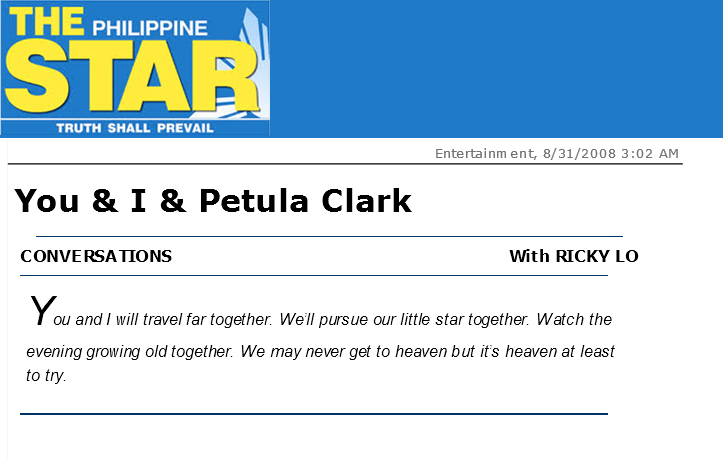
You and I will travel far together. We'll pursue our little star together. Watch the evening growing old together. We may never get to heaven but it's heaven at least to try.
Yes, you and I will travel far together with Petula Clark on the wings of yesteryear's songs and rest assured that sit will feel like heaven as we try to get to heaven once again when we watch Petula at her concerts slated middle of September, on the 12th at the Manila Hotel and on the 13th at the Araneta Coliseum. Petula Clark: You & I brings to the concert scene an international artist and performer acclaimed as the most successful British female solo recording artist who emerged as America's No. 1 female vocalist during the musical British Invasion of the US in the 1960s.
Together with The Beatles, Petula conquered the American and the international music arena, topping the US charts with her anthemic and unforgettable hit, Downtown. Other songs in her list of million-dollar-selling hits include Love This Is My Song, I Know A Place, Let It Be Me, I Couldn't Live Without Your Love, Don't Sleep In The Subway, You & I, A Sign Of The Times, Kiss Me Goodbye, and many more.
Petula's multifaceted career as a singer, actress and composer stretches back to the time she was a child performer at the age of 11 in her native England, singing for members of the Allied forces in Europe during World War II (becoming the "Singing Sweetheart" of American troops overseas).
With the phenomenal chart performance of Downtown, Petula became a household name in the US after appearing on dozens of top-rating television programs, such as The Ed Sullivan Show, The Dean Martin Show, The Andy Williams Show, The Carol Burnett Show, American Bandstand, The Tonight Show, The Flip Wilson Show, The Hollywood Palace, Here's Lucy, Bob Hope and Perry Como specials, Night Of 100 Stars, The Golden Globe, Academy Awards, and many more.
Her successful career has also been featured on The David Frost Show, Portrait Of A Legend, This Is Your Life, Bravo Profiles/The South Bank Show, and the recent PBS documentary, Petula Clark: This Is My Song, which first aired in December, 2001.
In recognition of her musical achievements, the American recording industry honored her with Grammy Awards for Best Rock & Roll Record for Downtown in 1964 and for Best Contemporary Female Vocal Performance for I Know A Place in 1965.
With the award, she became the first British female solo artist to win a Grammy Award and the first British pop singer to have a No. 1 hit single in the US. In 2003, her recording of Downtown was inducted into the Grammy Hall of Fame.
In England, she has starred in numerous BBC series and specials that won for her the prestigious British Academy of Film & Television and TV Times' Favorite Singer awards. With starring roles in dozens of British films behind her, Petula's movie career further blossomed in the US, where she was paired opposite Fred Astaire in Francis Ford Coppola's Finian's Rainbow and Peter O'Toole in MGM's musical remake of Goodbye, Mr. Chips, with the latter earning her a Golden Globe nomination. As a concert and theater artist, she performed in shows throughout the US and Canada and as headliner in theater acts in Las Vegas for more than 30 years.
She made her stage debut in 1981 at the London West End by opening the phenomenally successful revival of The Sound Of Music with what was then considered the largest advance ticket sale in British theater history.
Then And Now, a compilation of the greatest hits and several new Petula Clark compositions recorded at the Arthanor Productions Studio in Geneva, entered the UK album charts in June, 2008.
For her meritorious achievements in France, she was awarded the Grand Prix National Du Disque Francais for being the country's most successful recording artist, in addition to the Bravos Du Music Hall, Golden Rose and the Grand Medal of the Council of Paris.
In her native England, she was designated Commander of the British Empire (CBE) by Queen Elizabeth in 1998.
In another exclusive, Conversations did a 30-minute interview by telephone with Petula who was in Geneva at the time.
Your fans are excited that you're finally coming to the Philippines for a concert.
"You know, I've never been to the Philippines and I'm just as excited. It's a first for me and I'm glad to hear that Filipinos are just as excited, too." What have you heard about the Philippines?
"Oh, I have Filipino acquaintances here in Switzerland, in the UK and in France. I heard that the Philippines is a beautiful country and that the Filipinos really love music."
You are the first successful female artist to have come from England and you are said to define the term "international superstar." How do you feel about it?
"Oh, I don't know...I don't know how I'm supposed to feel about it.
You know, I started singing when I was a child, at the age of about eight. It's not like I became a star when I was 18."
Was it hard to start a career at that age and last this long?
"I suppose to. I enjoyed singing when I was a child and I enjoy it now...just as much now, actually. You know, I did have some problems during my adolescence but I guess that every adolescent has problems. My problems were perhaps more difficult because I was growing up in public. But apart from that, no problem. I love singing and it's a great joy to be able to do something that you like so much."
You started at eight years old. Don't you think that you missed part of your childhood?
"Let's put it this way. I had a different childhood. I didn't have a normal childhood; I don't know what a normal childhood is. Childhood is a magic time and it happens very fast. Other children might have been going through the different stages of childhood and I must have been going through the same experience but only on a different level." Of course, your voice at age eight was different from your voice now. How do you adjust your vocal cords to the type of music you're doing as you grew up?
"I really don't know. But it seems that my voice hasn't really changed since I was a child. It sounds the same to me and, I hope, to other people. I don't think my voice has changed much at all. I still sing the same songs, like Downtown and Don't Sleep in the Subway, in the same key as when I recorded them." Who influenced you to be a singer? Is anybody else in the family into singing?
"Not really. My mother was Welsh. I don't know much about the Welsh people but I guess they are very, very musical. They love to sing, like the Italians. Tom Jones is Welsh, and so is Shirley Bassey. Among the actors, Anthony Hopkins is Welsh. You know, music is in our veins but I didn't really come from a musical family at all."
Yes, you and I will travel far together with Petula Clark on the wings of yesteryear's songs and rest assured that sit will feel like heaven as we try to get to heaven once again when we watch Petula at her concerts slated middle of September, on the 12th at the Manila Hotel and on the 13th at the Araneta Coliseum. Petula Clark: You & I brings to the concert scene an international artist and performer acclaimed as the most successful British female solo recording artist who emerged as America's No. 1 female vocalist during the musical British Invasion of the US in the 1960s.
Together with The Beatles, Petula conquered the American and the international music arena, topping the US charts with her anthemic and unforgettable hit, Downtown. Other songs in her list of million-dollar-selling hits include Love This Is My Song, I Know A Place, Let It Be Me, I Couldn't Live Without Your Love, Don't Sleep In The Subway, You & I, A Sign Of The Times, Kiss Me Goodbye, and many more.
Petula's multifaceted career as a singer, actress and composer stretches back to the time she was a child performer at the age of 11 in her native England, singing for members of the Allied forces in Europe during World War II (becoming the "Singing Sweetheart" of American troops overseas).
With the phenomenal chart performance of Downtown, Petula became a household name in the US after appearing on dozens of top-rating television programs, such as The Ed Sullivan Show, The Dean Martin Show, The Andy Williams Show, The Carol Burnett Show, American Bandstand, The Tonight Show, The Flip Wilson Show, The Hollywood Palace, Here's Lucy, Bob Hope and Perry Como specials, Night Of 100 Stars, The Golden Globe, Academy Awards, and many more.
Her successful career has also been featured on The David Frost Show, Portrait Of A Legend, This Is Your Life, Bravo Profiles/The South Bank Show, and the recent PBS documentary, Petula Clark: This Is My Song, which first aired in December, 2001.
In recognition of her musical achievements, the American recording industry honored her with Grammy Awards for Best Rock & Roll Record for Downtown in 1964 and for Best Contemporary Female Vocal Performance for I Know A Place in 1965.
With the award, she became the first British female solo artist to win a Grammy Award and the first British pop singer to have a No. 1 hit single in the US. In 2003, her recording of Downtown was inducted into the Grammy Hall of Fame.
In England, she has starred in numerous BBC series and specials that won for her the prestigious British Academy of Film & Television and TV Times' Favorite Singer awards. With starring roles in dozens of British films behind her, Petula's movie career further blossomed in the US, where she was paired opposite Fred Astaire in Francis Ford Coppola's Finian's Rainbow and Peter O'Toole in MGM's musical remake of Goodbye, Mr. Chips, with the latter earning her a Golden Globe nomination. As a concert and theater artist, she performed in shows throughout the US and Canada and as headliner in theater acts in Las Vegas for more than 30 years.
She made her stage debut in 1981 at the London West End by opening the phenomenally successful revival of The Sound Of Music with what was then considered the largest advance ticket sale in British theater history.
Then And Now, a compilation of the greatest hits and several new Petula Clark compositions recorded at the Arthanor Productions Studio in Geneva, entered the UK album charts in June, 2008.
For her meritorious achievements in France, she was awarded the Grand Prix National Du Disque Francais for being the country's most successful recording artist, in addition to the Bravos Du Music Hall, Golden Rose and the Grand Medal of the Council of Paris.
In her native England, she was designated Commander of the British Empire (CBE) by Queen Elizabeth in 1998.
In another exclusive, Conversations did a 30-minute interview by telephone with Petula who was in Geneva at the time.
Your fans are excited that you're finally coming to the Philippines for a concert.
"You know, I've never been to the Philippines and I'm just as excited. It's a first for me and I'm glad to hear that Filipinos are just as excited, too." What have you heard about the Philippines?
"Oh, I have Filipino acquaintances here in Switzerland, in the UK and in France. I heard that the Philippines is a beautiful country and that the Filipinos really love music."
You are the first successful female artist to have come from England and you are said to define the term "international superstar." How do you feel about it?
"Oh, I don't know...I don't know how I'm supposed to feel about it.
You know, I started singing when I was a child, at the age of about eight. It's not like I became a star when I was 18."
Was it hard to start a career at that age and last this long?
"I suppose to. I enjoyed singing when I was a child and I enjoy it now...just as much now, actually. You know, I did have some problems during my adolescence but I guess that every adolescent has problems. My problems were perhaps more difficult because I was growing up in public. But apart from that, no problem. I love singing and it's a great joy to be able to do something that you like so much."
You started at eight years old. Don't you think that you missed part of your childhood?
"Let's put it this way. I had a different childhood. I didn't have a normal childhood; I don't know what a normal childhood is. Childhood is a magic time and it happens very fast. Other children might have been going through the different stages of childhood and I must have been going through the same experience but only on a different level." Of course, your voice at age eight was different from your voice now. How do you adjust your vocal cords to the type of music you're doing as you grew up?
"I really don't know. But it seems that my voice hasn't really changed since I was a child. It sounds the same to me and, I hope, to other people. I don't think my voice has changed much at all. I still sing the same songs, like Downtown and Don't Sleep in the Subway, in the same key as when I recorded them." Who influenced you to be a singer? Is anybody else in the family into singing?
"Not really. My mother was Welsh. I don't know much about the Welsh people but I guess they are very, very musical. They love to sing, like the Italians. Tom Jones is Welsh, and so is Shirley Bassey. Among the actors, Anthony Hopkins is Welsh. You know, music is in our veins but I didn't really come from a musical family at all."


Would you remember the very first song that you ever learned how to sing?
"Yes, I do. It was a song called Mighty Like a Rose and, in fact, I first sang it when I was six years old. At age eight, I was already famous and I continued singing that song."
In the '60s, you became a superstar along with, among others, The Beatles.
"You know, I worked so hard on my career. I married a Frenchman and we moved to France, and I became France's No. 1 singer. That was before 1964 when Downtown was recorded. The '60s were a special time for me. The Beatles made it much easier for British singers to be played on the radio. Downtown became a hit in America and I did a lot of hits after that."
Were your songs inspired by real life? You know, when you're alone and life is making you lonely you can always go, downtown.
"You know, I have my downtimes as well like everybody else and in times like that, I take my mind away from it, and get out and see the rest of the world."
Do you still go downtown?
(Laughs) "Oh yes, I do."
When you look back at the '60s and '70s, what are your fondest memories?
"I have many, many fond memories. You know, they were wonderful years. They were also complicated years because, you know, I was married and I had two children then. We have now three children.
I was traveling all over the place and I was trying to be a good mother and a good performer. Luckily, I was working with amazing people."
Do you listen to the new breed of singers? How different the singers today from those of your time?
"I think you know the answer to that. Hmmmm...You know, there are good and there are bad. There were good singers and bad singers then, and there are good singers and bad singers now. The world has changed a lot and so has the music industry and the people. People don't seem to buy records as much as people back then did. That's one thing I don't like about it."
You sang for the Allied Forces during World War II, earning you the title "Singing Sweetheart" for American soldiers abroad. Wasn't it very risky singing near the frontline?
"Ahhh, I was never allowed to go on the frontline. There was another little girl who was also singing at that time. Her name is Julie Andrews."
Oh, Julie Andrews! I interviewed her a few years ago in Hollywood for the movie Princess Diaries. She's a very nice lady like you.
"Julie is a very, very, very nice lady. We used to perform for the troops but in different camps." Were you rivals?
"Hmmm...We were not exactly rivals. We both just like to sing." (Adding with a laugh) "But I think our parents were rivals."
You also appeared in movies, one of them Finian's Rainbow, with Peter O'Toole as co-star, for which you got an Oscar nomination. And you did Broadway (Sound of Music, etc.), too. Do you consider yourself more of a singer than as an actress?
"I enjoy acting as much as I enjoy singing. As a little girl, I also wanted to be an actress; I didn't think of myself as being a singer. Singing and acting are very closely related. When I'm doing a show, it's wonderful because I have to act and feel what I am singing. To me, that's perfection. When I do a concert, as I am doing in Manila, every show is like a play in my mind. So I use acting when I sing and vice-versa."
Petula, when you come to Manila, please sing your old songs. We'd love to hear them all over again. (Such as Love This is My Song, I Know a Place, I Couldn't Live Without Your Love, A Sign of the Times, Kiss Me Goodbye and many others.)
"Oh yes, I will."
I understand that you live in Geneva. How's your life in Geneva?
"My family has been away in Turkey and I was left home with the dogs. To be honest with you, I don't really live here; I go to many different places. Geneva is a nice place to come back to when you're away for long. It's a very relaxing place."
What do you do to relax? Do you listen to music?
"I write music. I play the piano. By the way, can you tell me...does everybody speak very good English in the Philippines?"
Oh yes. English is our second language.
"Oh, that's good because during a concert I also love to talk. It's not just about singing, it's about talking to the audience. I'm really looking forward to performing in the Philippines."
What have you been busy with these days, aside from doing concerts?
"That's about it. I did a UK tour at the beginning of summer. I've been writing, writing, writing. I also spend time in the French Alps where we have a house. After Manila, I'll be in Vancouver, then New York and then Rome."
Where are your children?
"Well, we are a very unusual family. We're not always together. I have a daughter who lives in New York. She has two beautiful children. I have another daughter who lives in Paris; she's not married. Last night, I had dinner with my son who got married three weeks ago; he lives in Geneva. We are living in different places, all right, but we try to see each other as often as we can. We are probably a much closer family than most people I know."
Did you sing your children to sleep when they were kids?
"Yes, I did. I wish I could do the same thing to my grandchildren. They think I'm a pretty cool grandmother because I usually ride around in limousines and they see me singing in fine hotels. I'm not the usual grandmother."
Petula, what song do you want to be remembered for?
"Ahhh...that's difficult. Let me think...Tony Bennett is best remembered for I Left My Heart in San Francisco. Yes, I want to be remembered for Downtown."
"Yes, I do. It was a song called Mighty Like a Rose and, in fact, I first sang it when I was six years old. At age eight, I was already famous and I continued singing that song."
In the '60s, you became a superstar along with, among others, The Beatles.
"You know, I worked so hard on my career. I married a Frenchman and we moved to France, and I became France's No. 1 singer. That was before 1964 when Downtown was recorded. The '60s were a special time for me. The Beatles made it much easier for British singers to be played on the radio. Downtown became a hit in America and I did a lot of hits after that."
Were your songs inspired by real life? You know, when you're alone and life is making you lonely you can always go, downtown.
"You know, I have my downtimes as well like everybody else and in times like that, I take my mind away from it, and get out and see the rest of the world."
Do you still go downtown?
(Laughs) "Oh yes, I do."
When you look back at the '60s and '70s, what are your fondest memories?
"I have many, many fond memories. You know, they were wonderful years. They were also complicated years because, you know, I was married and I had two children then. We have now three children.
I was traveling all over the place and I was trying to be a good mother and a good performer. Luckily, I was working with amazing people."
Do you listen to the new breed of singers? How different the singers today from those of your time?
"I think you know the answer to that. Hmmmm...You know, there are good and there are bad. There were good singers and bad singers then, and there are good singers and bad singers now. The world has changed a lot and so has the music industry and the people. People don't seem to buy records as much as people back then did. That's one thing I don't like about it."
You sang for the Allied Forces during World War II, earning you the title "Singing Sweetheart" for American soldiers abroad. Wasn't it very risky singing near the frontline?
"Ahhh, I was never allowed to go on the frontline. There was another little girl who was also singing at that time. Her name is Julie Andrews."
Oh, Julie Andrews! I interviewed her a few years ago in Hollywood for the movie Princess Diaries. She's a very nice lady like you.
"Julie is a very, very, very nice lady. We used to perform for the troops but in different camps." Were you rivals?
"Hmmm...We were not exactly rivals. We both just like to sing." (Adding with a laugh) "But I think our parents were rivals."
You also appeared in movies, one of them Finian's Rainbow, with Peter O'Toole as co-star, for which you got an Oscar nomination. And you did Broadway (Sound of Music, etc.), too. Do you consider yourself more of a singer than as an actress?
"I enjoy acting as much as I enjoy singing. As a little girl, I also wanted to be an actress; I didn't think of myself as being a singer. Singing and acting are very closely related. When I'm doing a show, it's wonderful because I have to act and feel what I am singing. To me, that's perfection. When I do a concert, as I am doing in Manila, every show is like a play in my mind. So I use acting when I sing and vice-versa."
Petula, when you come to Manila, please sing your old songs. We'd love to hear them all over again. (Such as Love This is My Song, I Know a Place, I Couldn't Live Without Your Love, A Sign of the Times, Kiss Me Goodbye and many others.)
"Oh yes, I will."
I understand that you live in Geneva. How's your life in Geneva?
"My family has been away in Turkey and I was left home with the dogs. To be honest with you, I don't really live here; I go to many different places. Geneva is a nice place to come back to when you're away for long. It's a very relaxing place."
What do you do to relax? Do you listen to music?
"I write music. I play the piano. By the way, can you tell me...does everybody speak very good English in the Philippines?"
Oh yes. English is our second language.
"Oh, that's good because during a concert I also love to talk. It's not just about singing, it's about talking to the audience. I'm really looking forward to performing in the Philippines."
What have you been busy with these days, aside from doing concerts?
"That's about it. I did a UK tour at the beginning of summer. I've been writing, writing, writing. I also spend time in the French Alps where we have a house. After Manila, I'll be in Vancouver, then New York and then Rome."
Where are your children?
"Well, we are a very unusual family. We're not always together. I have a daughter who lives in New York. She has two beautiful children. I have another daughter who lives in Paris; she's not married. Last night, I had dinner with my son who got married three weeks ago; he lives in Geneva. We are living in different places, all right, but we try to see each other as often as we can. We are probably a much closer family than most people I know."
Did you sing your children to sleep when they were kids?
"Yes, I did. I wish I could do the same thing to my grandchildren. They think I'm a pretty cool grandmother because I usually ride around in limousines and they see me singing in fine hotels. I'm not the usual grandmother."
Petula, what song do you want to be remembered for?
"Ahhh...that's difficult. Let me think...Tony Bennett is best remembered for I Left My Heart in San Francisco. Yes, I want to be remembered for Downtown."
September 13, 2008
Araneta Coliseum
Manila, PHILIPPINES
September 13, 2008
Araneta Coliseum
Manila, PHILIPPINES
2009
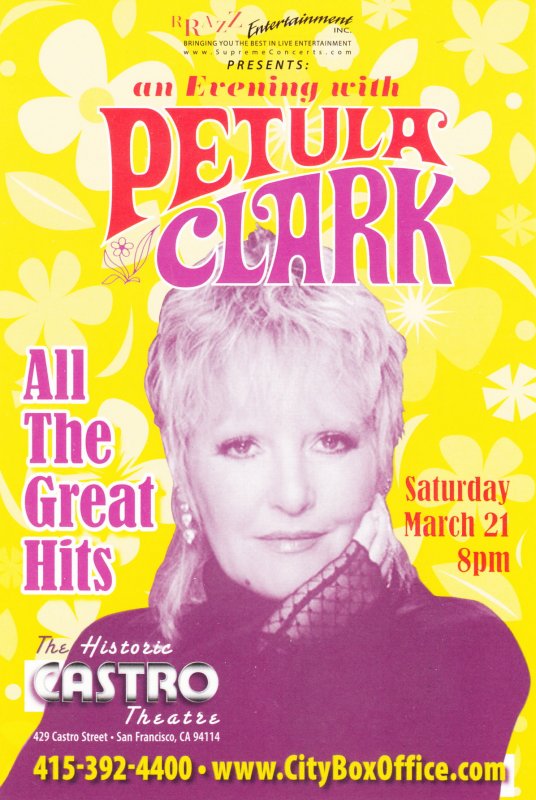
Poster


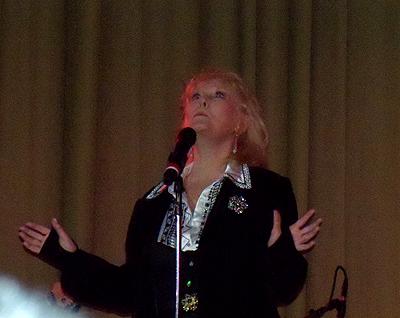 © Laurie Parsons Zenobio
© Laurie Parsons Zenobio
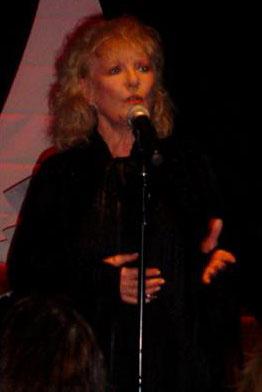 © Dave Rossi
© Dave Rossi
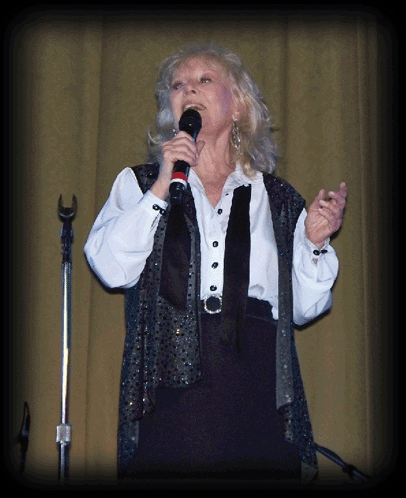 © Mary Stephenson
© Mary Stephenson
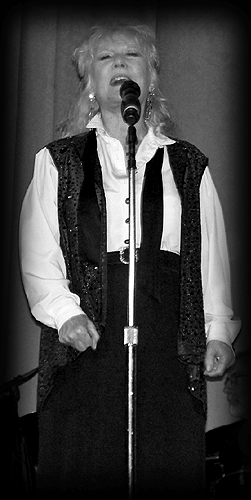 © Mary Stephenson
© Mary Stephenson
 © Mary Stephenson>
© Mary Stephenson>
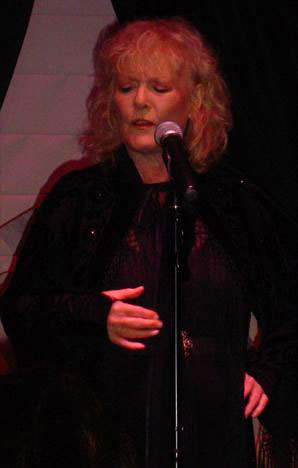 © Dave Rossi
© Dave Rossi

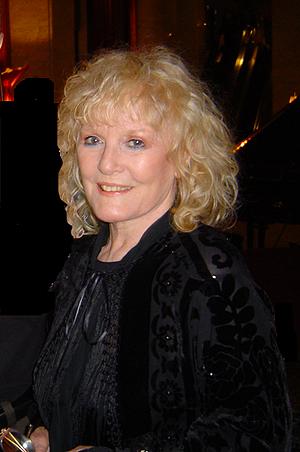 © Dave Rossi
© Dave Rossi
Song List
- Who Am I?
- Twelfth of Never
- Don't Sleep in the Subway
- This is My Song
- I Know a Place
- Look to the Rainbow/Glocca Morra
- Come Along with Me
- Sixties Medley
- Driven by Emotion
- La Vie En Rose
- My Love Will Never Die
- You're the One
- Colour My World
- I Want to Hold Your Hand
- Heaven's Door
- Theatre Poem
- Losing My Mind
- With One Look
- Tell Me It's Not True
- To Memphis
- Kiss Me Goodbye/My Love/Downtown
ENCORES:
Here for You
I Couldn't Live Without Your Love
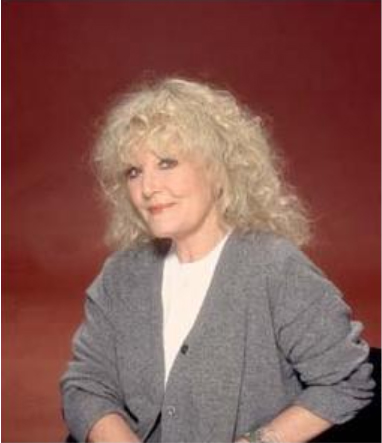
 It is the sheer volume of this career that
boggles the mind. Can these achievements
belong to a single human being? Petula Clark,
who appears in concert at the Castro Theatre
on March 21, has performed close to 70
years. recorded for 50, made over 30
movies, sold nearly 70 million records, had
15 Top 40 hits in the US alone, written over
l00 songs (some under the pseudonym Al
Grant), recorded over 1,000 songs, hosted
TV varetv series, made countless
appearances on radio, television, and on
stage, headlined in Vegas. Branson and just
about everywhere else, was voted "Most
Popular TV Star" in England, starred on the
West End (The Sound of Muusic), Broadway
(Blood Brother:), and tours (Sunset
Boulevard), composed an original musical
(Soneone Like You). and won dozens of
international awards, including a 2003
Grammv Hail of Fame induction. She's also
been married to Frenchman Claude Wolff since 1961, and is the mother of three.
There are so many corners to Petula Clark that a few are likely to be unknown to the casual
admirer. For example, she appeared in a number of films as a child actress in England.
most notably the 1945 Michael Powell classic I Know Where I'm Going. "That was one of
the better ones," she said in a recent phone interview. "I was a contract artist, which means
you don't have much say in what you do. There were good ones and bad ones.
Adolescence was difficult, because I was doing my growing up in front of millions of
people, and they didn't want me to grow up. So I was bound and put in braids. It was
agony."
It is the sheer volume of this career that
boggles the mind. Can these achievements
belong to a single human being? Petula Clark,
who appears in concert at the Castro Theatre
on March 21, has performed close to 70
years. recorded for 50, made over 30
movies, sold nearly 70 million records, had
15 Top 40 hits in the US alone, written over
l00 songs (some under the pseudonym Al
Grant), recorded over 1,000 songs, hosted
TV varetv series, made countless
appearances on radio, television, and on
stage, headlined in Vegas. Branson and just
about everywhere else, was voted "Most
Popular TV Star" in England, starred on the
West End (The Sound of Muusic), Broadway
(Blood Brother:), and tours (Sunset
Boulevard), composed an original musical
(Soneone Like You). and won dozens of
international awards, including a 2003
Grammv Hail of Fame induction. She's also
been married to Frenchman Claude Wolff since 1961, and is the mother of three.
There are so many corners to Petula Clark that a few are likely to be unknown to the casual
admirer. For example, she appeared in a number of films as a child actress in England.
most notably the 1945 Michael Powell classic I Know Where I'm Going. "That was one of
the better ones," she said in a recent phone interview. "I was a contract artist, which means
you don't have much say in what you do. There were good ones and bad ones.
Adolescence was difficult, because I was doing my growing up in front of millions of
people, and they didn't want me to grow up. So I was bound and put in braids. It was
agony."
Singing came to dominate over acting in her performing life. "The film career came out of
singing for the troops in World War II in the UK," she said "Another girl doing the same
thing was Julie Andrews. We were sleeping in luggage racks, and school was a sometimes
thing. Julie had a more classical voice, so we never sang duets, but we did perform on the
same programs. She was a rather pure little girl with this amazing voice, and I was singing
things like "When that man is dead and gone." The recollection brought a giggle. "We didn't
feel as if we were rivals. I think our parents were rivals, but we didn't care. We just
wanted to sing." Her 1949 television series Pet's
Parlor has its own unique memory for her: "I was
later told that I was sending message in code to the
armed forces through a secret service agency. A lot of
people were being used this way."
Recording, touring, and continued success in England
followed in the 1950s. but the 60s took her to
unimagined heights of music immortality. Her 1964
breakthrough with "Downtown" was so colossal that it
has obscured her larger accomplishments. Her pop-brassy vocal clarity suits upbeat anthems of love,
wistful ballads. jazz, musical comedy, and even
country western. After "Downtown." she recorded
other catchy Tony Hatch songs in quick succession: "I
Know a Place." "You'd Better Come Home," "Round Every Corner," "My Love," "A Sign of
the Times." "Who Am I?." Color Mv World." "I Couldn't Live Without Your Love." "Don't
Sleep in the Subway." and "The Other Man's Grass is Always Greener."
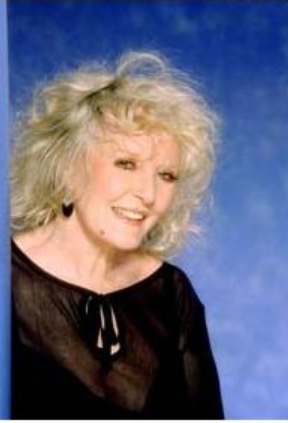
When asked of
that collaboration. she says forcefuilv that "Hatch wrote songs that moved me lyrically and
musically, and we had an amazing string of hits. It was so simple, so easy. We'd go into
the studio and record live with an orchestra or semi-rock band. do a few takes, and that
was it. No fiddling around with technology."
Clark has often been in the right place at the right time. She was in the Queen Elizabeth
Hotel in 1969 to join the chorus of John Lennon's "Give Peace a Chance" Her marriage to
Volff resulted in French fluency, with recordings and appearances in French, Italian.
German, and Spanish They adore her on the Continent; France has practically claimed her
their own de faczo chanteuse. "I don't think I have a particularly amazing voice," she says
modestly. "A voice is only as good as the songs you give it to sing. The voice is just the
means of expression. I've made mistakes in what I've done, and I've been pushed into
doing material that I didn't want to do."
Her film career includes two noteworthy titles, the iate-60s roadshow musicals Finian's
Rainbow and Goodbye Mr. Chips. The former is a rather odd duck, with director Francis
Ford Coppola at the beginning of his career, and Fred Astaire near the end of his. "Fred
was used to the old grammar of Hollywood; every chair being in place," she recalled.
"Francis wasn't so interested in that. He was looking for some kind of reality, with shooting
outdoors under semi-controlled conditions. He wanted Fred to dance through a real field.
and Fred told him, "I don't dance through a real field. You build a field in the studio." But
that clash didn't last long; they adored each other. And I think we ail knew early on that
Francis was someone special. It was the most wonderful experience to make."
Memories of Goodbye, Mr. Chips (its first Region-one DVD release was in January) are less
fond. A musical remake of the beloved 1930s novel and movie began with promise, but
devolved in adaptation, despite the charm and chemistry of stars Peter O'Tooie and Clark.
"The original script by Terence Rattigan was beautiful," she said. "Then they changed it.
and they aimost lost their nerve about doing a musical. It drifted away from its original
intent. We were uncertain if we should do it at all. I loved [director] Herbert Ross. but it
wasn't an easy movie to make."
More recently, Clark has been appearing in live musical theater. "The nice thing about doing
musicals is that you get to act and sing," she said. "Tm pretty much on my own in a
concert. You're not yourself in musical theater. You have that wonderful thing of playing
opposite people. I love the discipline of it. If you don't do the show exactly as you
rehearsed it. you could be run over by the scenery." She was referring quite literally to the
famous Sunset Bouievard set that descended from the heaven with every performance. "It
comes out of the ceiling, and you think it can't be happening. it's like a spaceship landing."
As of this interview, she hadn't decided on the lineup for her Castro Theatre appearance.
but it's safe to say there'll be a mix of old and new. She'll 1ike sing from Open Your
Heart, a well-received new collection of 21 love songs. Love. Given this life lived before so
many fans. she knows of what she sings.

Petula Clark, 76, set swinging London into motion with
hits such as "Downtown" and "Don't Sleep in the
Subway." With more than five decades of musical
experience on her resume and 70 million albums sold
worldwide, she's still going strong, having divided recent
years between solo performances and Broadway and
West End productions such as "Blood Brothers," "The
Sound of Music" and "Someone Like You." Most
recently she appeared as Norma Desmond in Andrew
Lloyd Webber's adaptation of "Sunset Boulevard.' Clark
performs a career-spanning concert Saturday at the
Castro Theatre.
Q: Are you surprised ou can still hear your
songs in department stores and on television
shows?
A: Are you talking about the '6os stuff? I don't sit
around reminiscing very much, but if I do stop to think
about it, it is amazing how strong this material is. Of
course, "Downtown" is a bit like Tony Bennett and "I
Left Mv Heart in San Francisco" - you think of all the
songs the man has recorded, and that's the one everyone wants to hear.
Q: What would happen if you stopped singing "Downtown"?
A: You tell me. I don't know. What I like to do to keep it fresh and fun for me is I pepper
my show with new things. with things that are unusual.
Q: What's in your iPod that would surprise most people?
A: On my iPod? I don't possess an iPod. I've got music going on in my head all the time: I
don't need something stuck in my ear. I like silence, too. A lot of people these days are
afraid of silence, but I live in Geneva and ve have a chalet up in the French Alps and I
spent three days up there before leaving for this tour. I hardly spoke to anyone. Real
silence. It does your soul good.
Q: Doesn't your mind wander into bad places?
A: There is that. I know exactly what you mean. but that's when you have to have a little
bit of control.
Q: John Lennon used to say that you were his favorite singer.
A: Yes, he did. I met him in Montreal when he was doing the bed-in. I just happened to
pop in because I wanted to talk to him about something. and there they were in bed. He
was adorable. There were all these people in there, and of course they were filming and
recording. So I'm actually on that record, "Give Peace a Chance." We met a few times after
that, and he always told me how much he enjoyed my singing.
Q: Are you looking forward to coming back to San Francisco?
A: I'm not very good with numbers, but I think I was there last three years ago, and we
just had a fantastic time. The problem is I can't remember what I was wearing, and I don't
want to wear the same thing this time.
Q: Haven't you bought any new clothes in the past three years?
A: Yes, but I've got quite a big wardrobe, so I can't carry everything around with me. I
travel with bags that my girlfriends would take for a weekend.
To hear Petula Clark's music, go to www.petulaclark.net.
E-mail Aidin Vaziri at ataziri@sfchronic1e.com.

Poster


 © Laurie Parsons Zenobio
© Laurie Parsons Zenobio © Dave Rossi
© Dave Rossi © Mary Stephenson
© Mary Stephenson  © Mary Stephenson
© Mary Stephenson © Mary Stephenson>
© Mary Stephenson> © Dave Rossi
© Dave Rossi
 © Dave Rossi
© Dave Rossi
Song List
ENCORES:
Here for You
I Couldn't Live Without Your Love
- Who Am I?
- Twelfth of Never
- Don't Sleep in the Subway
- This is My Song
- I Know a Place
- Look to the Rainbow/Glocca Morra
- Come Along with Me
- Sixties Medley
- Driven by Emotion
- La Vie En Rose
- My Love Will Never Die
- You're the One
- Colour My World
- I Want to Hold Your Hand
- Heaven's Door
- Theatre Poem
- Losing My Mind
- With One Look
- Tell Me It's Not True
- To Memphis
- Kiss Me Goodbye/My Love/Downtown
ENCORES:
Here for You
I Couldn't Live Without Your Love


It is the sheer volume of this career that
boggles the mind. Can these achievements
belong to a single human being? Petula Clark,
who appears in concert at the Castro Theatre
on March 21, has performed close to 70
years. recorded for 50, made over 30
movies, sold nearly 70 million records, had
15 Top 40 hits in the US alone, written over
l00 songs (some under the pseudonym Al
Grant), recorded over 1,000 songs, hosted
TV varetv series, made countless
appearances on radio, television, and on
stage, headlined in Vegas. Branson and just
about everywhere else, was voted "Most
Popular TV Star" in England, starred on the
West End (The Sound of Muusic), Broadway
(Blood Brother:), and tours (Sunset
Boulevard), composed an original musical
(Soneone Like You). and won dozens of
international awards, including a 2003
Grammv Hail of Fame induction. She's also
been married to Frenchman Claude Wolff since 1961, and is the mother of three.
There are so many corners to Petula Clark that a few are likely to be unknown to the casual
admirer. For example, she appeared in a number of films as a child actress in England.
most notably the 1945 Michael Powell classic I Know Where I'm Going. "That was one of
the better ones," she said in a recent phone interview. "I was a contract artist, which means
you don't have much say in what you do. There were good ones and bad ones.
Adolescence was difficult, because I was doing my growing up in front of millions of
people, and they didn't want me to grow up. So I was bound and put in braids. It was
agony."
Singing came to dominate over acting in her performing life. "The film career came out of singing for the troops in World War II in the UK," she said "Another girl doing the same thing was Julie Andrews. We were sleeping in luggage racks, and school was a sometimes thing. Julie had a more classical voice, so we never sang duets, but we did perform on the same programs. She was a rather pure little girl with this amazing voice, and I was singing things like "When that man is dead and gone." The recollection brought a giggle. "We didn't feel as if we were rivals. I think our parents were rivals, but we didn't care. We just wanted to sing." Her 1949 television series Pet's Parlor has its own unique memory for her: "I was later told that I was sending message in code to the armed forces through a secret service agency. A lot of people were being used this way."
Recording, touring, and continued success in England followed in the 1950s. but the 60s took her to unimagined heights of music immortality. Her 1964 breakthrough with "Downtown" was so colossal that it has obscured her larger accomplishments. Her pop-brassy vocal clarity suits upbeat anthems of love, wistful ballads. jazz, musical comedy, and even country western. After "Downtown." she recorded other catchy Tony Hatch songs in quick succession: "I Know a Place." "You'd Better Come Home," "Round Every Corner," "My Love," "A Sign of the Times." "Who Am I?." Color Mv World." "I Couldn't Live Without Your Love." "Don't Sleep in the Subway." and "The Other Man's Grass is Always Greener."
Singing came to dominate over acting in her performing life. "The film career came out of singing for the troops in World War II in the UK," she said "Another girl doing the same thing was Julie Andrews. We were sleeping in luggage racks, and school was a sometimes thing. Julie had a more classical voice, so we never sang duets, but we did perform on the same programs. She was a rather pure little girl with this amazing voice, and I was singing things like "When that man is dead and gone." The recollection brought a giggle. "We didn't feel as if we were rivals. I think our parents were rivals, but we didn't care. We just wanted to sing." Her 1949 television series Pet's Parlor has its own unique memory for her: "I was later told that I was sending message in code to the armed forces through a secret service agency. A lot of people were being used this way."
Recording, touring, and continued success in England followed in the 1950s. but the 60s took her to unimagined heights of music immortality. Her 1964 breakthrough with "Downtown" was so colossal that it has obscured her larger accomplishments. Her pop-brassy vocal clarity suits upbeat anthems of love, wistful ballads. jazz, musical comedy, and even country western. After "Downtown." she recorded other catchy Tony Hatch songs in quick succession: "I Know a Place." "You'd Better Come Home," "Round Every Corner," "My Love," "A Sign of the Times." "Who Am I?." Color Mv World." "I Couldn't Live Without Your Love." "Don't Sleep in the Subway." and "The Other Man's Grass is Always Greener."

When asked of
that collaboration. she says forcefuilv that "Hatch wrote songs that moved me lyrically and
musically, and we had an amazing string of hits. It was so simple, so easy. We'd go into
the studio and record live with an orchestra or semi-rock band. do a few takes, and that
was it. No fiddling around with technology."
Clark has often been in the right place at the right time. She was in the Queen Elizabeth Hotel in 1969 to join the chorus of John Lennon's "Give Peace a Chance" Her marriage to Volff resulted in French fluency, with recordings and appearances in French, Italian. German, and Spanish They adore her on the Continent; France has practically claimed her their own de faczo chanteuse. "I don't think I have a particularly amazing voice," she says modestly. "A voice is only as good as the songs you give it to sing. The voice is just the means of expression. I've made mistakes in what I've done, and I've been pushed into doing material that I didn't want to do."
Her film career includes two noteworthy titles, the iate-60s roadshow musicals Finian's Rainbow and Goodbye Mr. Chips. The former is a rather odd duck, with director Francis Ford Coppola at the beginning of his career, and Fred Astaire near the end of his. "Fred was used to the old grammar of Hollywood; every chair being in place," she recalled. "Francis wasn't so interested in that. He was looking for some kind of reality, with shooting outdoors under semi-controlled conditions. He wanted Fred to dance through a real field. and Fred told him, "I don't dance through a real field. You build a field in the studio." But that clash didn't last long; they adored each other. And I think we ail knew early on that Francis was someone special. It was the most wonderful experience to make." Memories of Goodbye, Mr. Chips (its first Region-one DVD release was in January) are less fond. A musical remake of the beloved 1930s novel and movie began with promise, but devolved in adaptation, despite the charm and chemistry of stars Peter O'Tooie and Clark. "The original script by Terence Rattigan was beautiful," she said. "Then they changed it. and they aimost lost their nerve about doing a musical. It drifted away from its original intent. We were uncertain if we should do it at all. I loved [director] Herbert Ross. but it wasn't an easy movie to make."
More recently, Clark has been appearing in live musical theater. "The nice thing about doing musicals is that you get to act and sing," she said. "Tm pretty much on my own in a concert. You're not yourself in musical theater. You have that wonderful thing of playing opposite people. I love the discipline of it. If you don't do the show exactly as you rehearsed it. you could be run over by the scenery." She was referring quite literally to the famous Sunset Bouievard set that descended from the heaven with every performance. "It comes out of the ceiling, and you think it can't be happening. it's like a spaceship landing." As of this interview, she hadn't decided on the lineup for her Castro Theatre appearance. but it's safe to say there'll be a mix of old and new. She'll 1ike sing from Open Your Heart, a well-received new collection of 21 love songs. Love. Given this life lived before so many fans. she knows of what she sings.
Clark has often been in the right place at the right time. She was in the Queen Elizabeth Hotel in 1969 to join the chorus of John Lennon's "Give Peace a Chance" Her marriage to Volff resulted in French fluency, with recordings and appearances in French, Italian. German, and Spanish They adore her on the Continent; France has practically claimed her their own de faczo chanteuse. "I don't think I have a particularly amazing voice," she says modestly. "A voice is only as good as the songs you give it to sing. The voice is just the means of expression. I've made mistakes in what I've done, and I've been pushed into doing material that I didn't want to do."
Her film career includes two noteworthy titles, the iate-60s roadshow musicals Finian's Rainbow and Goodbye Mr. Chips. The former is a rather odd duck, with director Francis Ford Coppola at the beginning of his career, and Fred Astaire near the end of his. "Fred was used to the old grammar of Hollywood; every chair being in place," she recalled. "Francis wasn't so interested in that. He was looking for some kind of reality, with shooting outdoors under semi-controlled conditions. He wanted Fred to dance through a real field. and Fred told him, "I don't dance through a real field. You build a field in the studio." But that clash didn't last long; they adored each other. And I think we ail knew early on that Francis was someone special. It was the most wonderful experience to make." Memories of Goodbye, Mr. Chips (its first Region-one DVD release was in January) are less fond. A musical remake of the beloved 1930s novel and movie began with promise, but devolved in adaptation, despite the charm and chemistry of stars Peter O'Tooie and Clark. "The original script by Terence Rattigan was beautiful," she said. "Then they changed it. and they aimost lost their nerve about doing a musical. It drifted away from its original intent. We were uncertain if we should do it at all. I loved [director] Herbert Ross. but it wasn't an easy movie to make."
More recently, Clark has been appearing in live musical theater. "The nice thing about doing musicals is that you get to act and sing," she said. "Tm pretty much on my own in a concert. You're not yourself in musical theater. You have that wonderful thing of playing opposite people. I love the discipline of it. If you don't do the show exactly as you rehearsed it. you could be run over by the scenery." She was referring quite literally to the famous Sunset Bouievard set that descended from the heaven with every performance. "It comes out of the ceiling, and you think it can't be happening. it's like a spaceship landing." As of this interview, she hadn't decided on the lineup for her Castro Theatre appearance. but it's safe to say there'll be a mix of old and new. She'll 1ike sing from Open Your Heart, a well-received new collection of 21 love songs. Love. Given this life lived before so many fans. she knows of what she sings.

Petula Clark, 76, set swinging London into motion with hits such as "Downtown" and "Don't Sleep in the Subway." With more than five decades of musical experience on her resume and 70 million albums sold worldwide, she's still going strong, having divided recent years between solo performances and Broadway and West End productions such as "Blood Brothers," "The Sound of Music" and "Someone Like You." Most recently she appeared as Norma Desmond in Andrew Lloyd Webber's adaptation of "Sunset Boulevard.' Clark performs a career-spanning concert Saturday at the Castro Theatre.
Q: Are you surprised ou can still hear your songs in department stores and on television shows?
A: Are you talking about the '6os stuff? I don't sit around reminiscing very much, but if I do stop to think about it, it is amazing how strong this material is. Of course, "Downtown" is a bit like Tony Bennett and "I Left Mv Heart in San Francisco" - you think of all the songs the man has recorded, and that's the one everyone wants to hear.
Q: What would happen if you stopped singing "Downtown"?
A: You tell me. I don't know. What I like to do to keep it fresh and fun for me is I pepper my show with new things. with things that are unusual.
Q: What's in your iPod that would surprise most people?
A: On my iPod? I don't possess an iPod. I've got music going on in my head all the time: I don't need something stuck in my ear. I like silence, too. A lot of people these days are afraid of silence, but I live in Geneva and ve have a chalet up in the French Alps and I spent three days up there before leaving for this tour. I hardly spoke to anyone. Real silence. It does your soul good.
Q: Doesn't your mind wander into bad places?
A: There is that. I know exactly what you mean. but that's when you have to have a little bit of control.
Q: John Lennon used to say that you were his favorite singer.
A: Yes, he did. I met him in Montreal when he was doing the bed-in. I just happened to pop in because I wanted to talk to him about something. and there they were in bed. He was adorable. There were all these people in there, and of course they were filming and recording. So I'm actually on that record, "Give Peace a Chance." We met a few times after that, and he always told me how much he enjoyed my singing.
Q: Are you looking forward to coming back to San Francisco?
A: I'm not very good with numbers, but I think I was there last three years ago, and we just had a fantastic time. The problem is I can't remember what I was wearing, and I don't want to wear the same thing this time.
Q: Haven't you bought any new clothes in the past three years?
A: Yes, but I've got quite a big wardrobe, so I can't carry everything around with me. I travel with bags that my girlfriends would take for a weekend.
To hear Petula Clark's music, go to www.petulaclark.net.
E-mail Aidin Vaziri at ataziri@sfchronic1e.com.
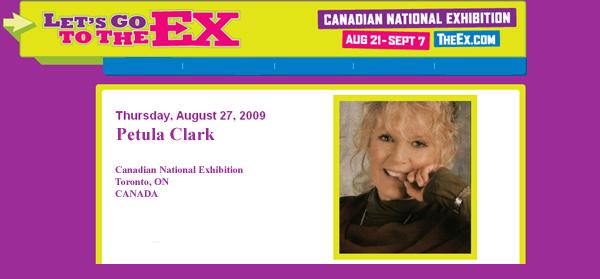 © All photos courtesy of Dave Shetler
© All photos courtesy of Dave Shetler
SONG LIST:
- Who Am I
- Heaven's Door,
- Starting All Over Again
- Don't Sleep In The Subway
- This Is My Song
- Look To The Rainbow
- How Are Things In Glocca Morra
- I Want To Hold Your Hand
- Sixties medley - Round Every Corner/Call Me/A Sign Of The Times/The Other Man's Grass Is Always Greener
- Medley - Kiss Me Goodbye/My Love
- La Vie En Rose
- Tell Me It's Not True
- With One Look
- Come Along With Me
- Downtown
Encores
I Couldn't Live Without Your Love
Here For You

CNE Bandshell

Princess Gates

Programme
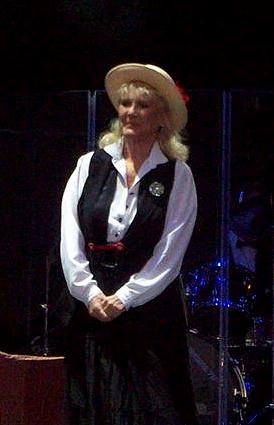
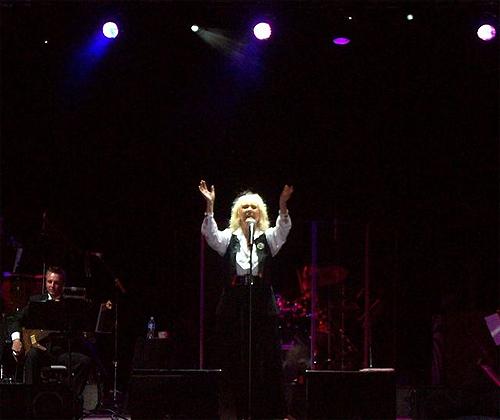

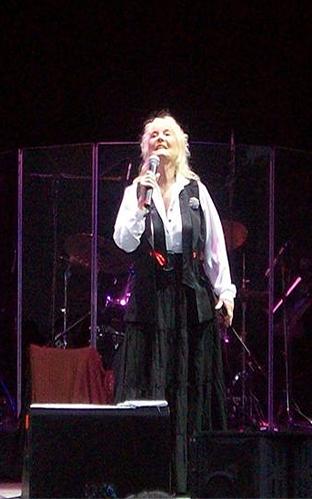
Rehearsal


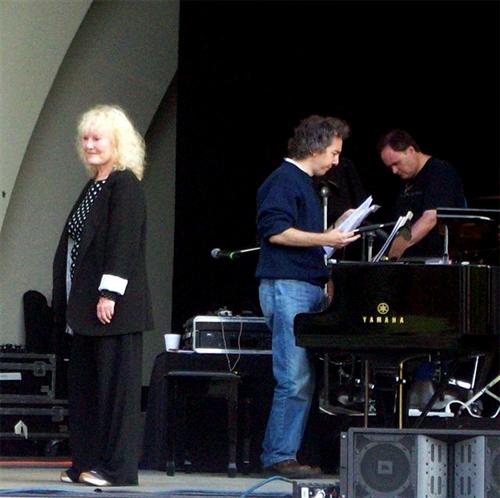
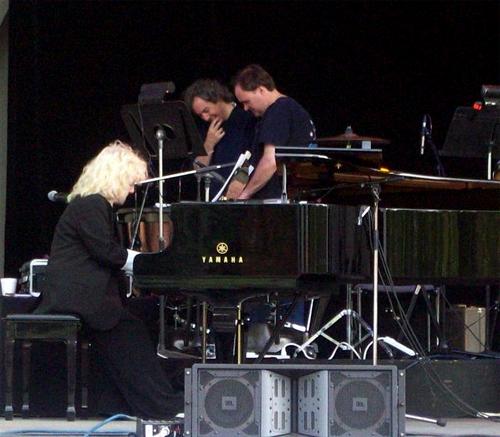
 © Photo courtesy of:
Glenn Pinkerton | Photographer, News Bureau
© Photo courtesy of:
Glenn Pinkerton | Photographer, News Bureau LAS VEGAS CONVENTION AND VISITORS AUTHORITY


 © Photo courtesy of:
Glenn Pinkerton
© Photo courtesy of:
Glenn PinkertonSong List
- WHO AM I
- HEAVEN'S DOOR
- DON'T SLEEP IN THE SUBWAY
- STARTING ALL OVER AGAIN
- THIS IS MY SONG
- COLOR MY WORLD
- LOOK TO THE RAINBOW
- HOW ARE THINGS IN GLOCCA MORRA?
- I KNOW A PLACE
- I WANNA HOLD YOUR HAND (at piano)
- HITS MEDLEY (ROUND EVERY CORNER-A SIGN OF THE TIMES-CALL ME-DON'T GIVE UP-THE OTHER MAN'S GRASS IS ALWAYS GREENER)
- LA VIE EN ROSE (preceded by a few bars of CHARIOT acapella)- Petula at piano
- CHARIOT (at the request of a fan who'd sent flowers)
- COME ALONG WITH ME
- WITH ONE LOOK
- TELL ME IT'S NOT TRUE
- KISS ME GOODBYE
- MY LOVE
- DOWNTOWN
Encores:
I COULDN'T LIVE WITHOUT YOUR LOVE
HERE FOR YOU

Petula Clark: An Afternoon's Revealation
by Ellen Sterling
Aug. 31, 2009
The Cannery Casino group here in Las Vegas knows its audience. Hence, entertainment at its three casinos - The Cannery, the Eastside Cannery and the Rampart - caters to that audience. They are mostly locals and, according to Entertainment Director Kathy Spehar, "they are mostly Baby Boomers" who, apparently enjoy the likes of Felix Cavaliere's Rascals (note: they are no longer billed as the "Young" Rascals), Tommy James & The Shondells, Little Anthony and the Imperials and this afternoon at 4 pm, Petula Clark at the Rampart Casino.
There's absolutely nothing wrong with such entertainment and, whatever one's age, when the soundtrack of your life is played - no matter how you keep up with what's current or who you may have on your iPod - it's usually lots of fun.
So it was with Ms. Clark. She seemed bemused by the 4 pm showtime ("I didn't know they did teatime shows here in Las Vegas"), but looked good and sounded good. At least, I think she sounded good.
This is the one casino in the group that (I believe) doesn't have a real performance space. The shows are in a lovely ballroom with a decent-sized stage. The problem is the acoustics. There appeared to be two huge speakers and a mic setup. That's all. Too often Clark's voice sounded muffled and/or unclear. Some around us were complaining that they couldn't understand what she was singing and, since her enunciation was fine, the fault had to lie in the equipment.
That said, Clark was all charm and grace. She knew what her audience wanted to hear and, with accomplished accompaniment by her musical director Grant Sturiale and his musicians, she gave them Downtown, Don't Sleep In The Subway, I Know A Place, My Love and so on. Her discography dates back to her childhood and, as she proved singing La Vie En Rose in French and snippets of Love This Is My Song in French and Italian, along with English.
Along the way she spoke a bit of meeting some well-known folks - Charlie Chaplin (who wrote Love This Is My Song for his film A Countess From Hong Kong) and Sophia Loren, who starred in the film. She sang Look To The Rainbow and How Are Things In Glocca Morra from Finian's Rainbow and spoke of what it felt like to dance with Fred Astaire (you can just imagine).
The show made clear that, still today, Petula Clark is a gifted singer. What was a revealation to me was her work on Broadway which, somehow, I must have missed. She sang Norma Desmond's With One Look from Sunset Boulevard and even treated the audience to Desmond's classic line, "I am big. It's the pictures that got small." From Blood Brothers she sang the ineffably moving Tell Me It's Not True.
Maybe I'm shallow, but I didn't know she could do this so well. For me, at least, the pop cheerfulness of Downtown had eclipsed the rest.
by Ellen Sterling
Aug. 31, 2009
The Cannery Casino group here in Las Vegas knows its audience. Hence, entertainment at its three casinos - The Cannery, the Eastside Cannery and the Rampart - caters to that audience. They are mostly locals and, according to Entertainment Director Kathy Spehar, "they are mostly Baby Boomers" who, apparently enjoy the likes of Felix Cavaliere's Rascals (note: they are no longer billed as the "Young" Rascals), Tommy James & The Shondells, Little Anthony and the Imperials and this afternoon at 4 pm, Petula Clark at the Rampart Casino.
There's absolutely nothing wrong with such entertainment and, whatever one's age, when the soundtrack of your life is played - no matter how you keep up with what's current or who you may have on your iPod - it's usually lots of fun.
So it was with Ms. Clark. She seemed bemused by the 4 pm showtime ("I didn't know they did teatime shows here in Las Vegas"), but looked good and sounded good. At least, I think she sounded good.
This is the one casino in the group that (I believe) doesn't have a real performance space. The shows are in a lovely ballroom with a decent-sized stage. The problem is the acoustics. There appeared to be two huge speakers and a mic setup. That's all. Too often Clark's voice sounded muffled and/or unclear. Some around us were complaining that they couldn't understand what she was singing and, since her enunciation was fine, the fault had to lie in the equipment.
That said, Clark was all charm and grace. She knew what her audience wanted to hear and, with accomplished accompaniment by her musical director Grant Sturiale and his musicians, she gave them Downtown, Don't Sleep In The Subway, I Know A Place, My Love and so on. Her discography dates back to her childhood and, as she proved singing La Vie En Rose in French and snippets of Love This Is My Song in French and Italian, along with English.
Along the way she spoke a bit of meeting some well-known folks - Charlie Chaplin (who wrote Love This Is My Song for his film A Countess From Hong Kong) and Sophia Loren, who starred in the film. She sang Look To The Rainbow and How Are Things In Glocca Morra from Finian's Rainbow and spoke of what it felt like to dance with Fred Astaire (you can just imagine).
The show made clear that, still today, Petula Clark is a gifted singer. What was a revealation to me was her work on Broadway which, somehow, I must have missed. She sang Norma Desmond's With One Look from Sunset Boulevard and even treated the audience to Desmond's classic line, "I am big. It's the pictures that got small." From Blood Brothers she sang the ineffably moving Tell Me It's Not True.
Maybe I'm shallow, but I didn't know she could do this so well. For me, at least, the pop cheerfulness of Downtown had eclipsed the rest.
September 2, 2009
Club Regent Casino
Winnipeg, Manitoba CANADA
September 2, 2009
Club Regent Casino
Winnipeg, Manitoba CANADA

 © Mary Stephenson
© Mary StephensonSONG LIST:
- Who Am I
- Heaven's Door,
- Starting All Over Again
- Don't Sleep In The Subway
- This Is My Song
- Look To The Rainbow
- How Are Things In Glocca Morra
- I Want To Hold Your Hand
- Sixties medley - Round Every Corner/Call Me/A Sign Of The Times/The Other Man's Grass Is Always Greener
- Medley - Kiss Me Goodbye/My Love
- La Vie En Rose
- Tell Me It's Not True
- With One Look
- Come Along With Me
- Downtown
Encores
I Couldn't Live Without Your Love
Here For You
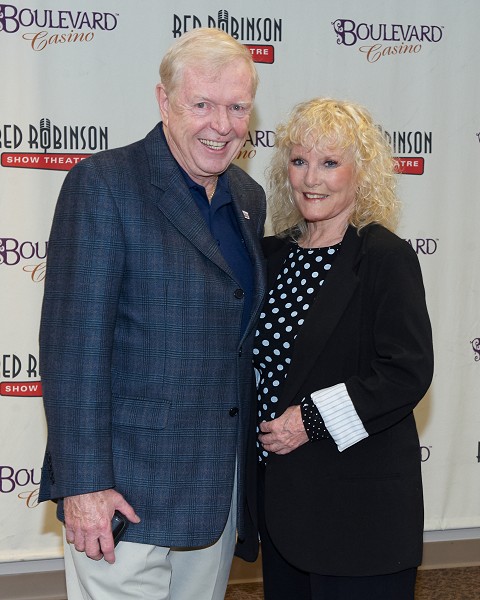
Petula and Red Robinson
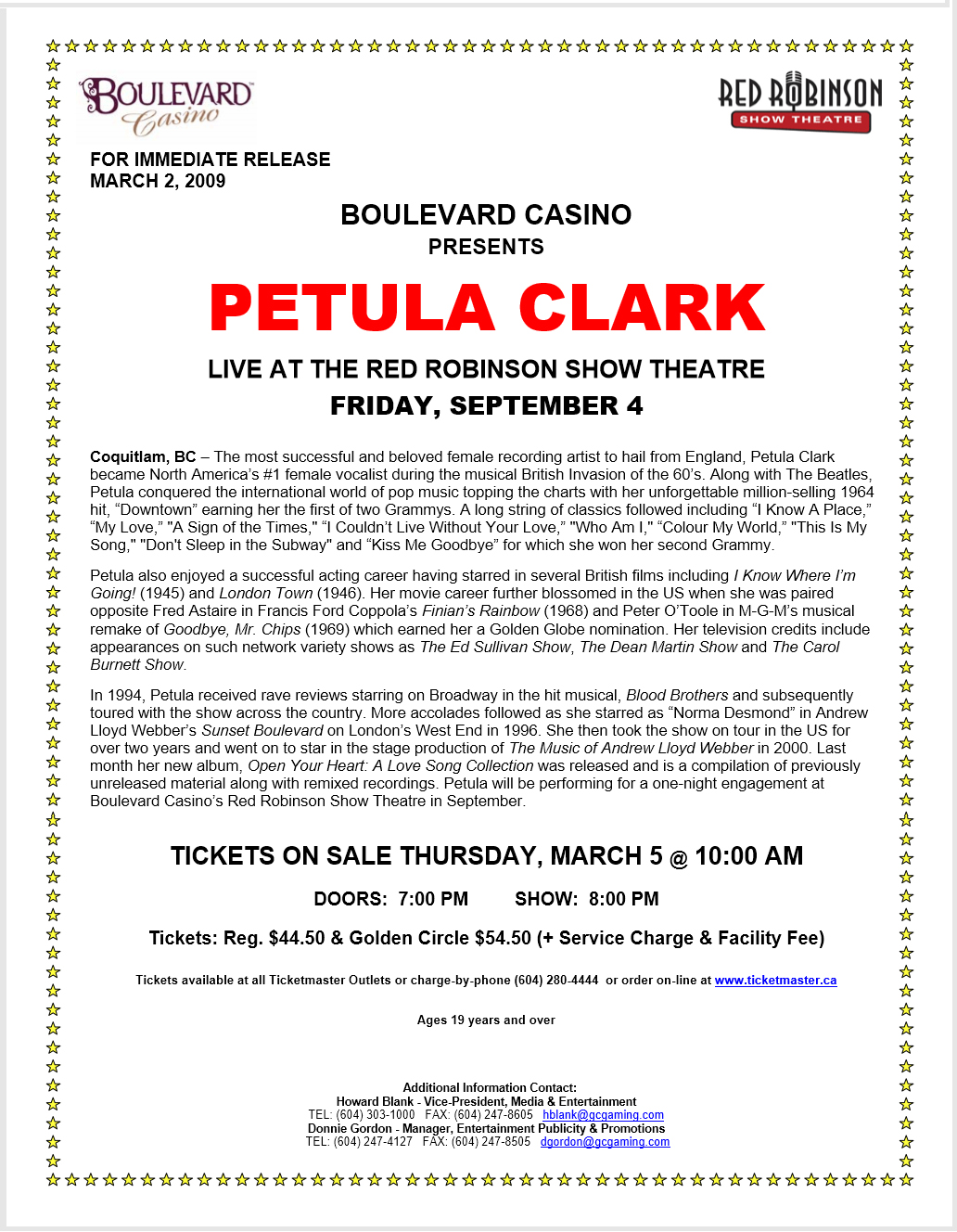
Peninsula Shores Performing Arts Centre
Wiarton, Ontario, CANADA
Petula - in conversation.
Benefit for Miracle Place, Wiarton's low-income housing complex. Petula officially opened the 2009 revival premiere of the classic UK film, I Know Where I'm Going and afterwards spoke about the film, her career, took questions from the audience, and signed autographs.
Peninsula Shores Performing Arts Centre
Wiarton, Ontario, CANADA
Petula - in conversation.
Benefit for Miracle Place, Wiarton's low-income housing complex. Petula officially opened the 2009 revival premiere of the classic UK film, I Know Where I'm Going and afterwards spoke about the film, her career, took questions from the audience, and signed autographs.

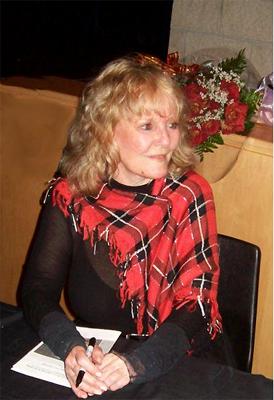
In show business terms, the Miracle Place -- Wiarton fundraising event featuring the appearance of Petula Clark was boffo -- a huge success.
The turnout was the largest ever to pack the 380-seat Peninsula Shores District School Performing Arts Centre, co-organizer Pamela Crawford said. With a $20 general admission fee, and CD and DVD sales, the event grossed about $7,000 for the charity.
Petula's donated appearance in a one woman show format in which she talked about her seven decade long career was a new venture for her. It worked triumphantly. From the opening moment to close she completely won over her out of town and local audiences, commanding the stage confidently with her engaging personality while relating stories of show business personages, and answering questions directed at her by the audience with candor and humor.
"We'd wondered how the audience would react to seeing Petula Clark in a non-singing stage appearance, but everyone agreed the impact of her personality more than compensated and gave our audience an entertaining evening," Pamela said.
Later, Petula speculated whether the Wiarton experience hadn't opened up yet an additional career direction for her to pursue.
The evening also was a commemorative one recalling the North American premiere of the British movie I Know Where I'm Going on April 29, 1946 in our Tobermory. Petula had a cameo role essentially in the now classic movie at the age of 13, and because of that was asked to officially open its rescreening here to bring home to the Canadian entertainment industry that the Tobermory premiere should never be forgotten. "I guess I'm the only survivor of the movie."
The turnout was the largest ever to pack the 380-seat Peninsula Shores District School Performing Arts Centre, co-organizer Pamela Crawford said. With a $20 general admission fee, and CD and DVD sales, the event grossed about $7,000 for the charity.
Petula's donated appearance in a one woman show format in which she talked about her seven decade long career was a new venture for her. It worked triumphantly. From the opening moment to close she completely won over her out of town and local audiences, commanding the stage confidently with her engaging personality while relating stories of show business personages, and answering questions directed at her by the audience with candor and humor.
"We'd wondered how the audience would react to seeing Petula Clark in a non-singing stage appearance, but everyone agreed the impact of her personality more than compensated and gave our audience an entertaining evening," Pamela said.
Later, Petula speculated whether the Wiarton experience hadn't opened up yet an additional career direction for her to pursue.
The evening also was a commemorative one recalling the North American premiere of the British movie I Know Where I'm Going on April 29, 1946 in our Tobermory. Petula had a cameo role essentially in the now classic movie at the age of 13, and because of that was asked to officially open its rescreening here to bring home to the Canadian entertainment industry that the Tobermory premiere should never be forgotten. "I guess I'm the only survivor of the movie."
She confessesd that she never did get to Tobermory, Scotland, and regretted that she hadn't time to visit our Tobermory either. Her scenes in the movie were all shot in an English studio near London. The director, Michael Powell had a bullying directorial style, she recalled. This led to an embarrassing incident with her jodhpurs that you had to have attended to know about.
Lineups were long at the end of her talk when she patiently autographed new CDs and old vinyl records brought by some fans, posed for numerous photographs, and listened to the enthusiastic comments regarding her performance offered by those attending, and their appreciation for her coming to Wiarton.
The evening had begun with official greetings of welcome and appreciation from Mayor Gwen Gilbert, Paul Kastner, Chair, Miracle Place - Wiarton and Pamela Crawford for the school's Theatre Arts committee. Flowers and Sherwood Fox's book The Bruce Beckons were presented to her by them. Larry Miller, MP and Bill Murdoch, MPP, both for the riding of Bruce-Grey-Owen Sound, sent their greetings and appreciation by email after they both had to withdraw.
An email letter from Tobermory, Scotland councilor Mary Jean Devon of the Mull Community Council inviting Petula to join in singing with the Mull Gaelic Choir, and extending a welcome to peninsula folk to 'return home' for a visit to Mull was read by Paul to Petula and the audience. A scroll of the full letter was presented to Petula and to Mayor Gilbert.
Bob Durant, CFOS Radio's popular morning host was an outstanding master of ceremonies throughout in his donated role of keeping the event on track and, in particular, recognizing those fans who wanted to ask questions. Legionnaire Art Hayley, 94, came up on stage briefly to present a folder of his Legion work as an appreciation for nine-year-old Petula's entertaining Allied Forces, including Canadians, during the Second World War. In a 'phone call after her return to New York, Petula said she has enjoyed reading Art's "beautiful poems."
Only several hours before the evening event, indefatigable Petula visited Gateway Haven to a welcoming and delighted gathering of residents and staff. With volunteer Sandra Wilson, Oliphant playing background piano selections of her popular songs, adminstrator Charlie Young prevailed upon her to sing. Unprepared, and somewhat embarrassed, in an emotional moment for many, Petula complied, with mike in hand singing as she moved about the tables of residents, stopping every now and then to shake hands or kiss someone on the cheek.
Petula had been brought from New York to Wiarton in part through the courtesy of Caframo Ltd., Owen Sound Volkswagen, and volunteer driver Jeff Ebel, Oliphant. On the return trip, Pamela Crawford drove her for a brief stopover look at the beach at Sauble and a gathering of about 30 Sauble Sandpipers who apparently had not been able to buy tickets to Petula's Wiarton appearance. It was organized by Marilyn Bowman, Sandpiper president, and Bob and Bette Mortley who provided muffins and coffee for all.
Before leaving Wiarton, Petula made a personal donation to Miracle Place Wiarton. Several days after her return to New York for a recording session, she 'phoned Paul thanking the people of Wiarton and expressing enjoyment of her visit.
An unforgettable, one time visit by a extraordinarily gracious superstar with a lovely heart. Lucky Wiarton.
--Paul Kastner
Lineups were long at the end of her talk when she patiently autographed new CDs and old vinyl records brought by some fans, posed for numerous photographs, and listened to the enthusiastic comments regarding her performance offered by those attending, and their appreciation for her coming to Wiarton.
The evening had begun with official greetings of welcome and appreciation from Mayor Gwen Gilbert, Paul Kastner, Chair, Miracle Place - Wiarton and Pamela Crawford for the school's Theatre Arts committee. Flowers and Sherwood Fox's book The Bruce Beckons were presented to her by them. Larry Miller, MP and Bill Murdoch, MPP, both for the riding of Bruce-Grey-Owen Sound, sent their greetings and appreciation by email after they both had to withdraw.
An email letter from Tobermory, Scotland councilor Mary Jean Devon of the Mull Community Council inviting Petula to join in singing with the Mull Gaelic Choir, and extending a welcome to peninsula folk to 'return home' for a visit to Mull was read by Paul to Petula and the audience. A scroll of the full letter was presented to Petula and to Mayor Gilbert.
Bob Durant, CFOS Radio's popular morning host was an outstanding master of ceremonies throughout in his donated role of keeping the event on track and, in particular, recognizing those fans who wanted to ask questions. Legionnaire Art Hayley, 94, came up on stage briefly to present a folder of his Legion work as an appreciation for nine-year-old Petula's entertaining Allied Forces, including Canadians, during the Second World War. In a 'phone call after her return to New York, Petula said she has enjoyed reading Art's "beautiful poems."
Only several hours before the evening event, indefatigable Petula visited Gateway Haven to a welcoming and delighted gathering of residents and staff. With volunteer Sandra Wilson, Oliphant playing background piano selections of her popular songs, adminstrator Charlie Young prevailed upon her to sing. Unprepared, and somewhat embarrassed, in an emotional moment for many, Petula complied, with mike in hand singing as she moved about the tables of residents, stopping every now and then to shake hands or kiss someone on the cheek.
Petula had been brought from New York to Wiarton in part through the courtesy of Caframo Ltd., Owen Sound Volkswagen, and volunteer driver Jeff Ebel, Oliphant. On the return trip, Pamela Crawford drove her for a brief stopover look at the beach at Sauble and a gathering of about 30 Sauble Sandpipers who apparently had not been able to buy tickets to Petula's Wiarton appearance. It was organized by Marilyn Bowman, Sandpiper president, and Bob and Bette Mortley who provided muffins and coffee for all.
Before leaving Wiarton, Petula made a personal donation to Miracle Place Wiarton. Several days after her return to New York for a recording session, she 'phoned Paul thanking the people of Wiarton and expressing enjoyment of her visit.
An unforgettable, one time visit by a extraordinarily gracious superstar with a lovely heart. Lucky Wiarton.
--Paul Kastner



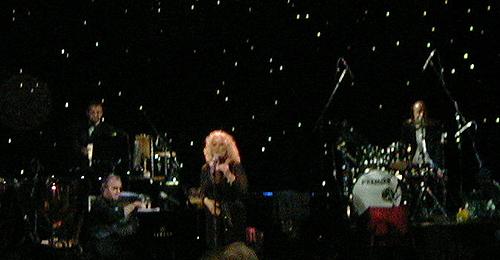
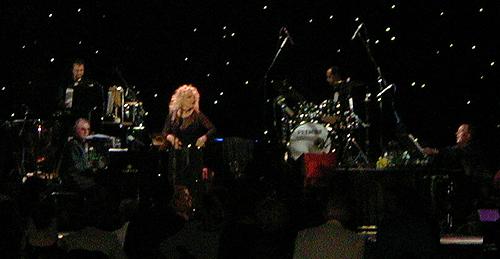

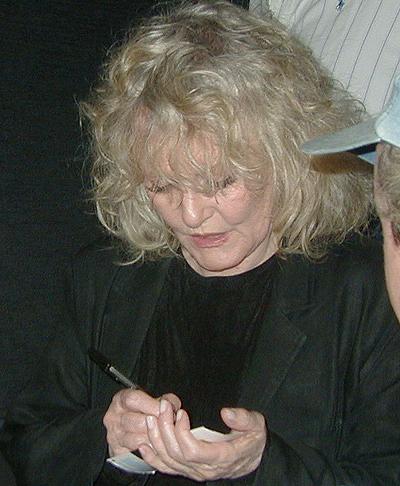
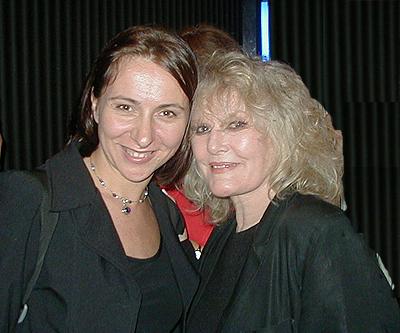
 Petula and Rod McKuen
Petula and Rod McKuen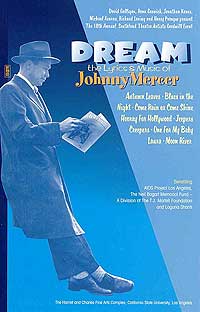
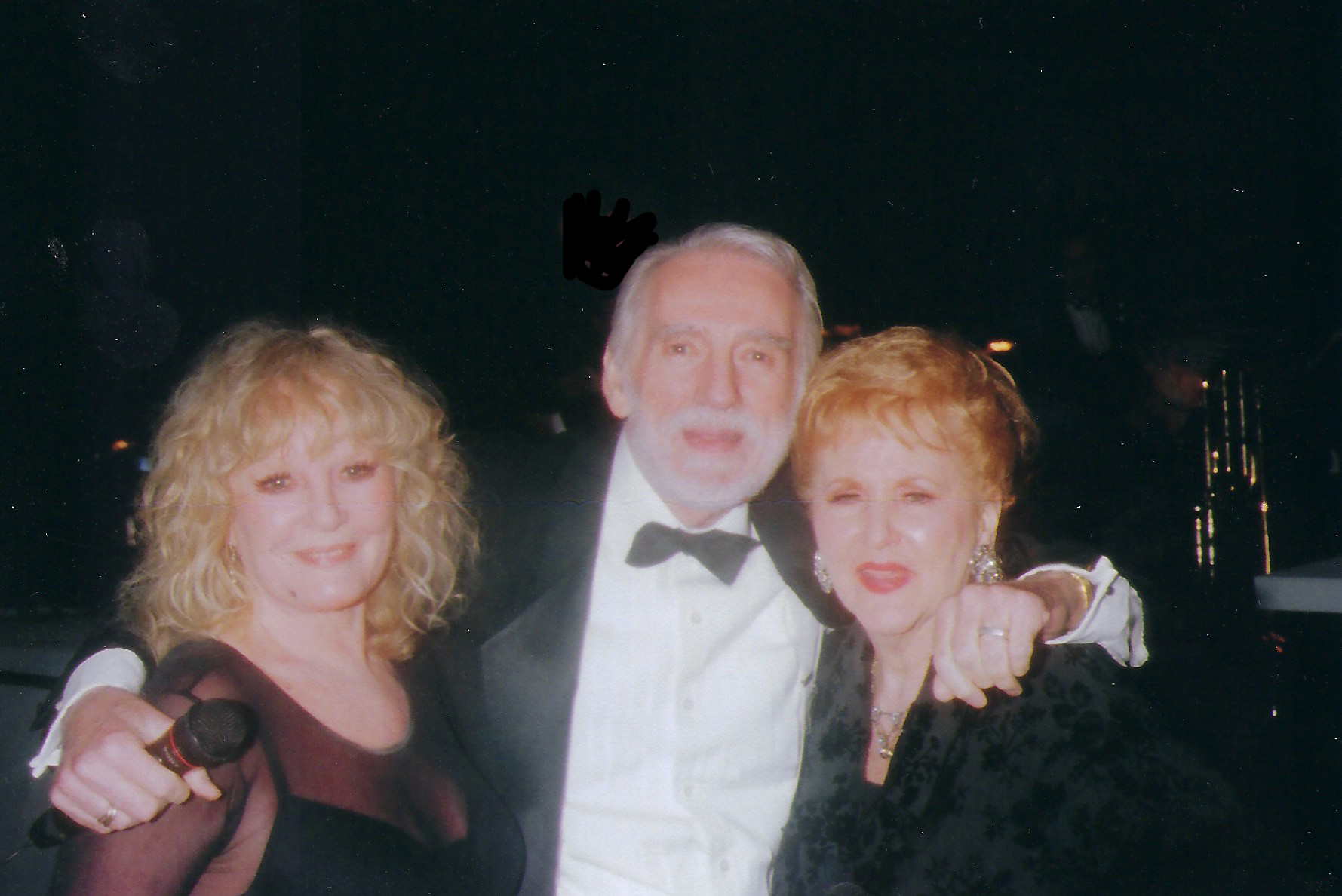 Petula, Rod & Margaret Whiting
Petula, Rod & Margaret Whiting 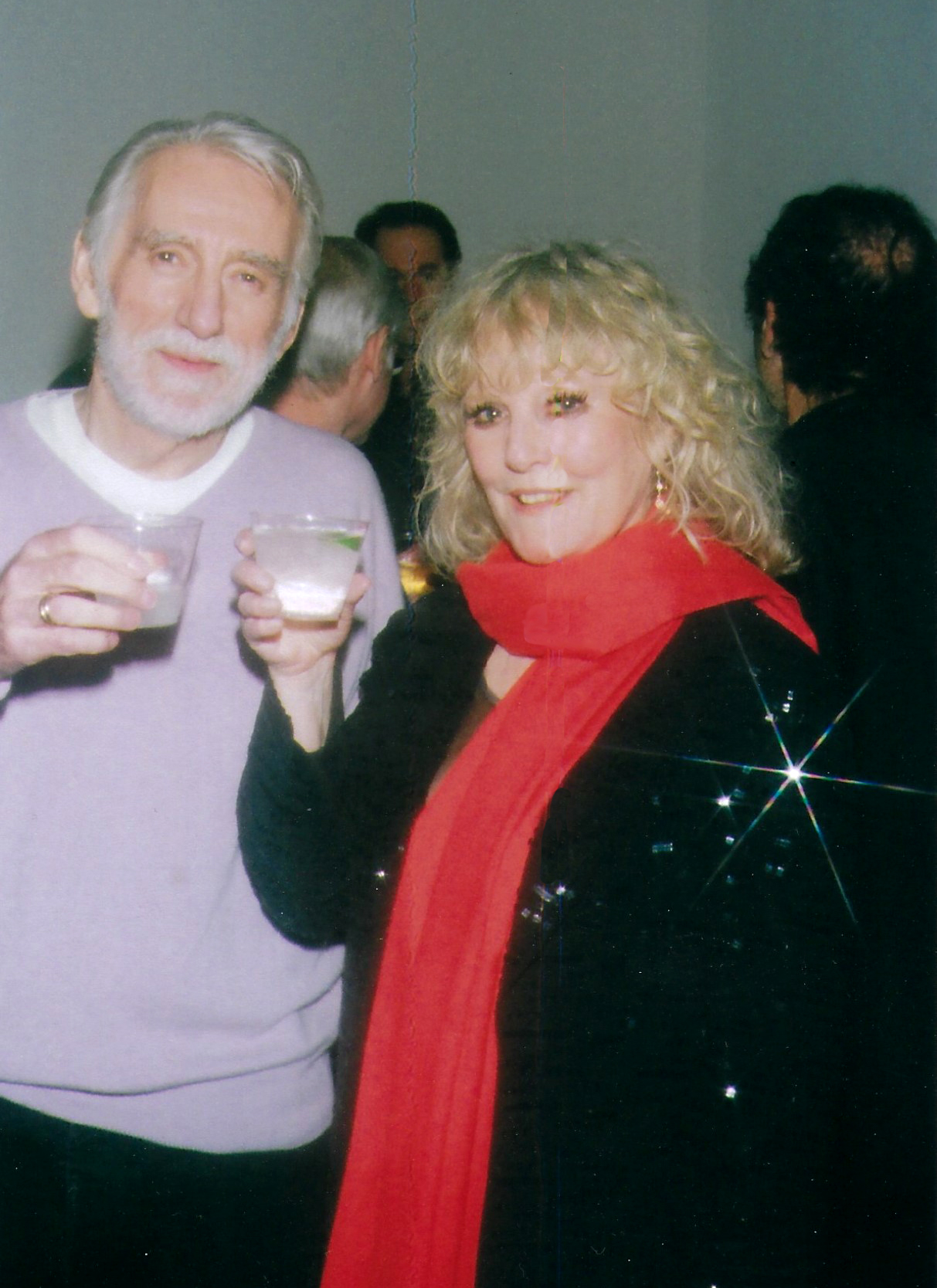
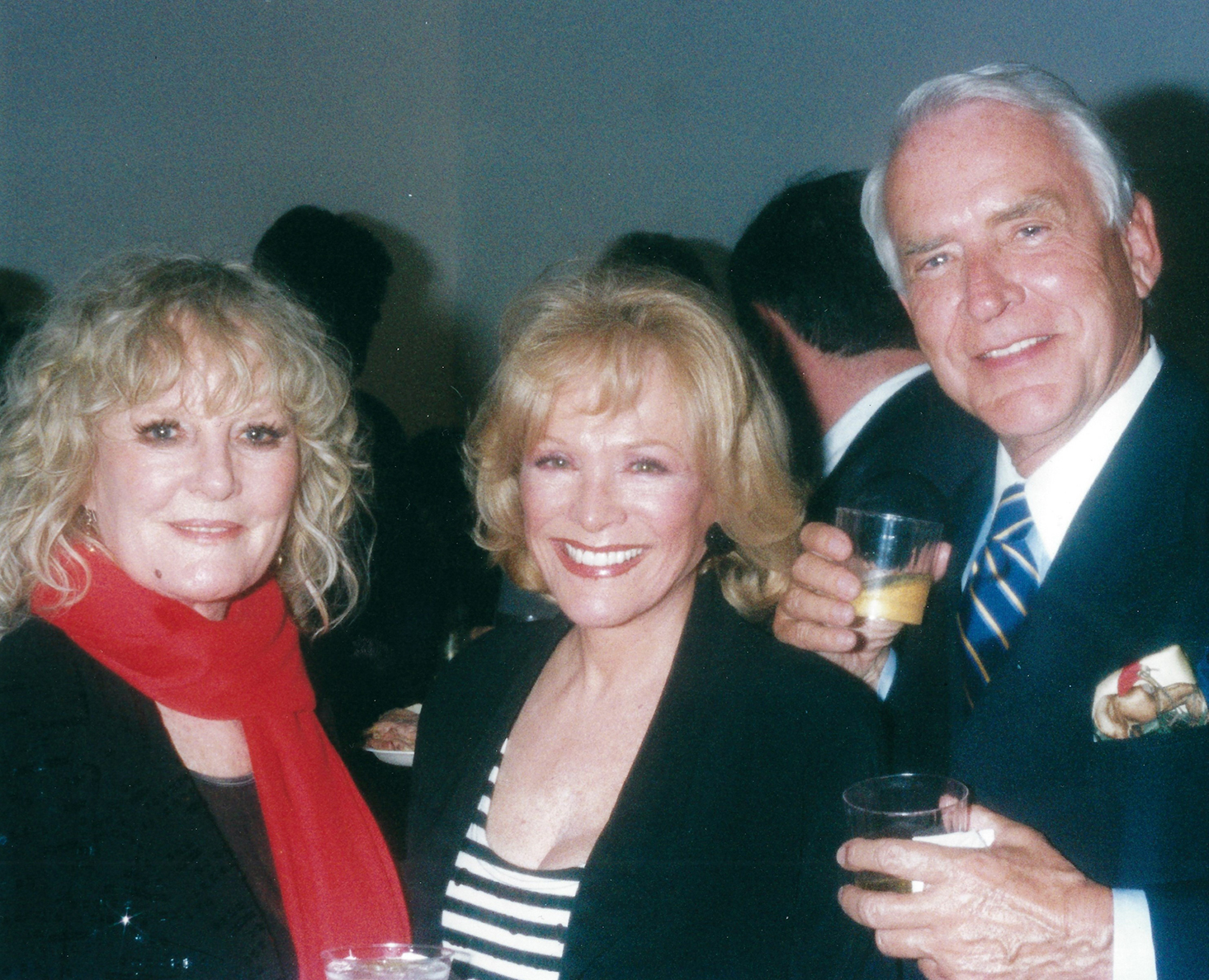
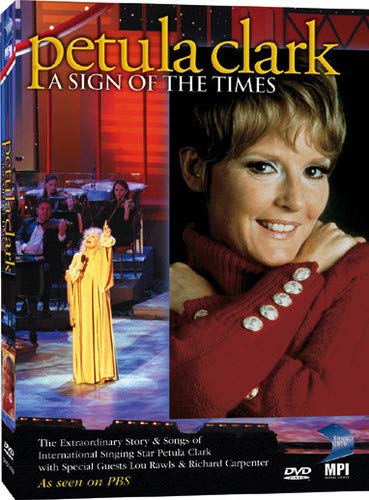


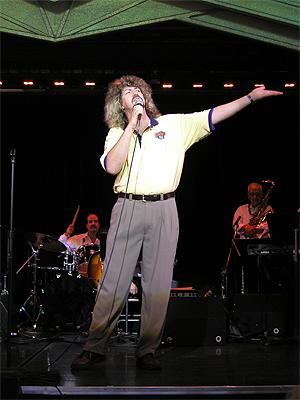 Emcee:
D.J. Bob Rudy
Emcee:
D.J. Bob Rudy
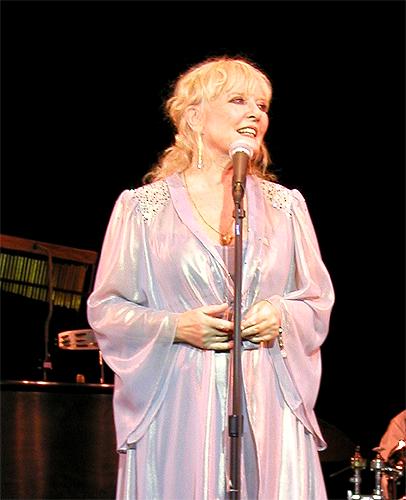
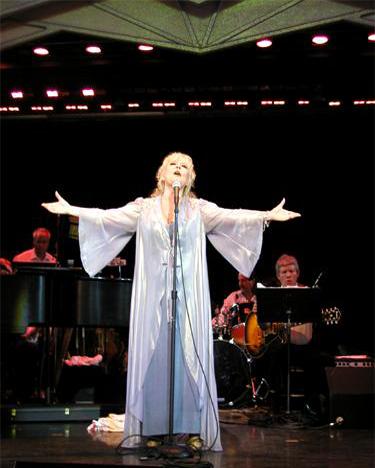
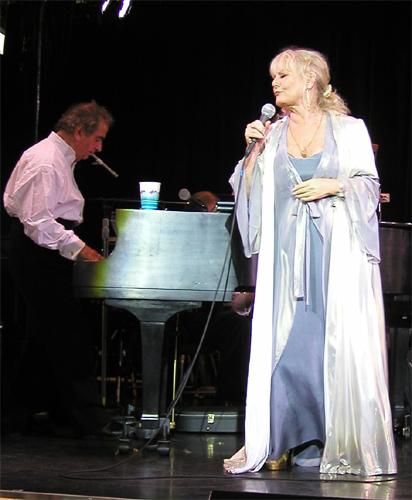

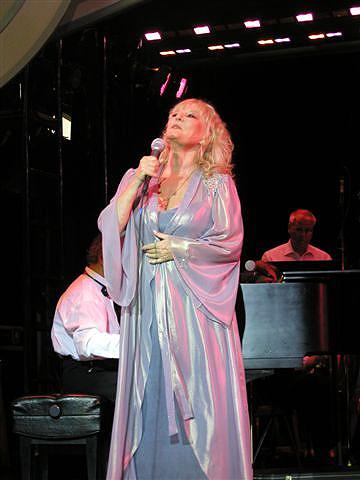
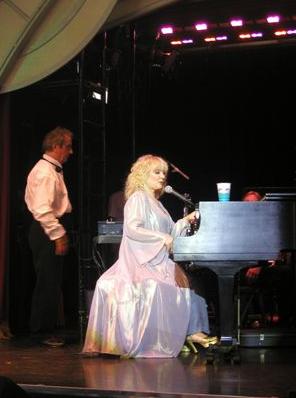
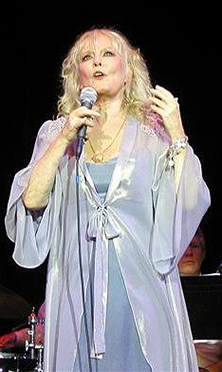
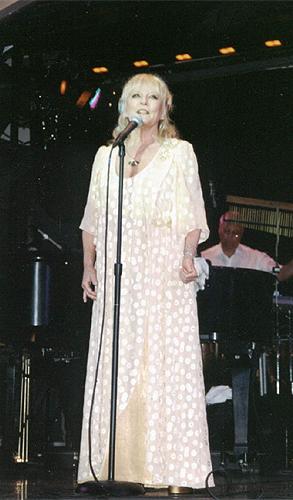
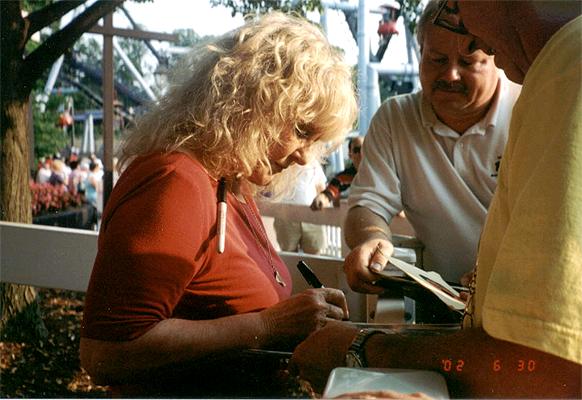 Above photos by Paula Scalice
Above photos by Paula Scalice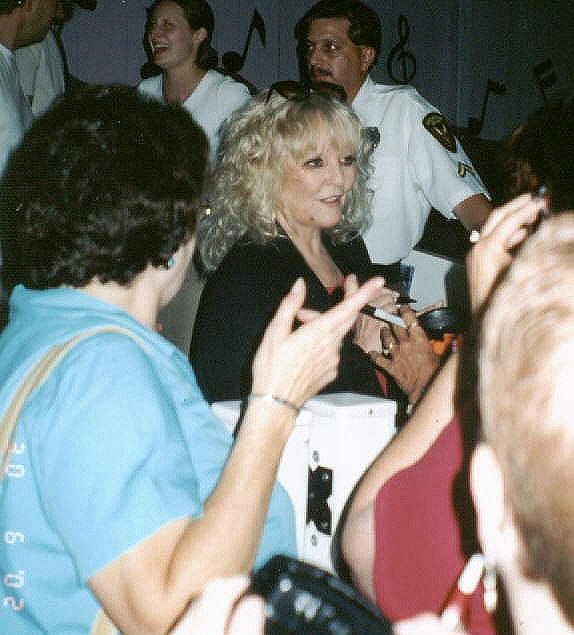 Beseiged by fans before and after the show.
Beseiged by fans before and after the show.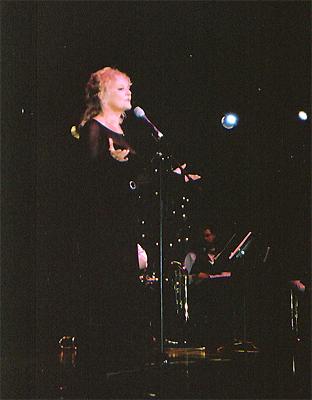 Photos by Pat Fox
Photos by Pat Fox 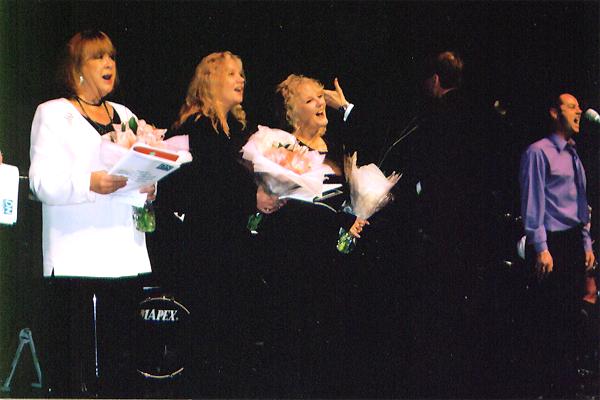 Petula and ensemble on stage,
Petula and ensemble on stage, Petula and fan Tim Richards.
Petula and fan Tim Richards. 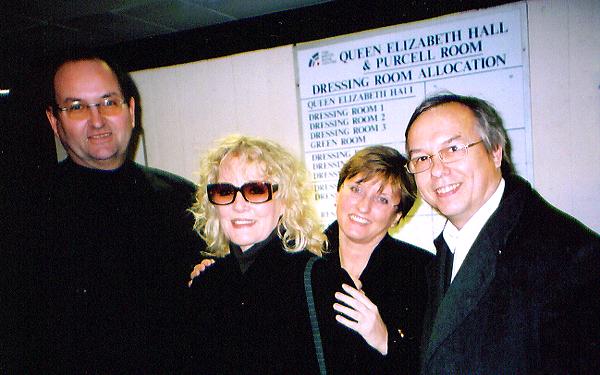 Richard Clark, Petula, Pat Fox, and Mike Jones
Richard Clark, Petula, Pat Fox, and Mike Jones
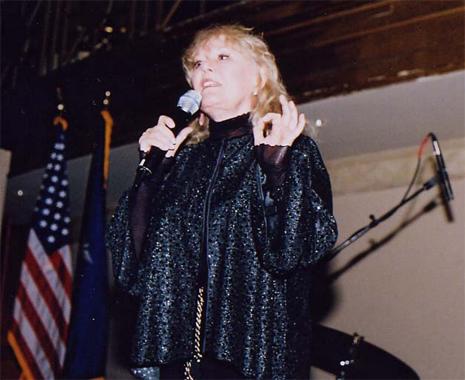
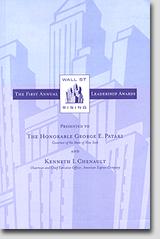
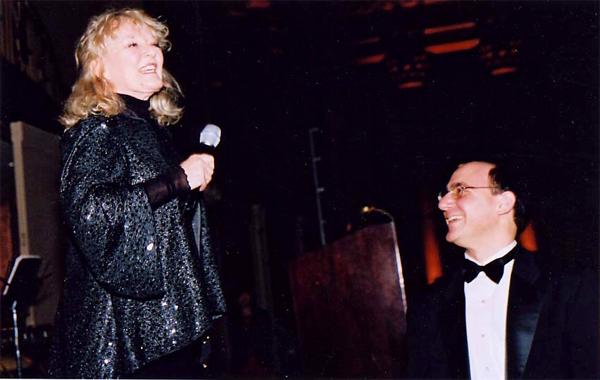
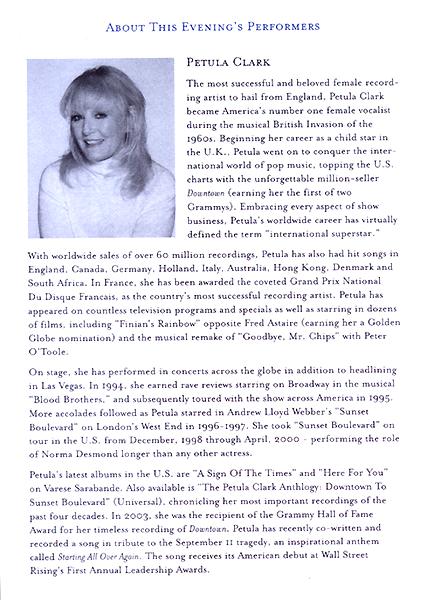
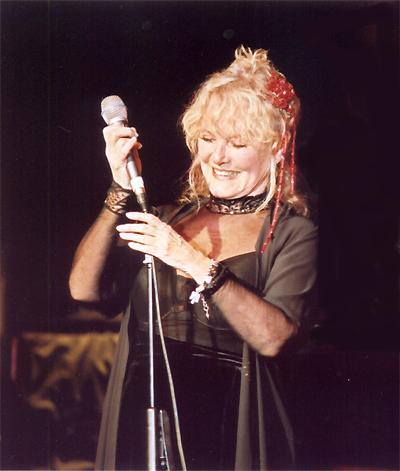

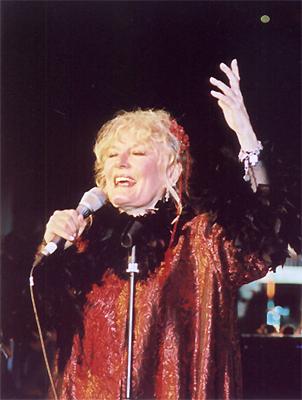 Above photos by Pat Fox
Above photos by Pat Fox 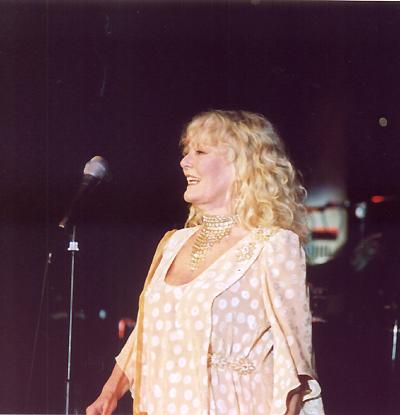
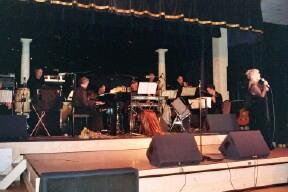
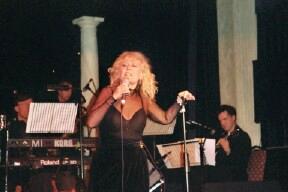 Above photos by Ian Walker
Above photos by Ian Walker 

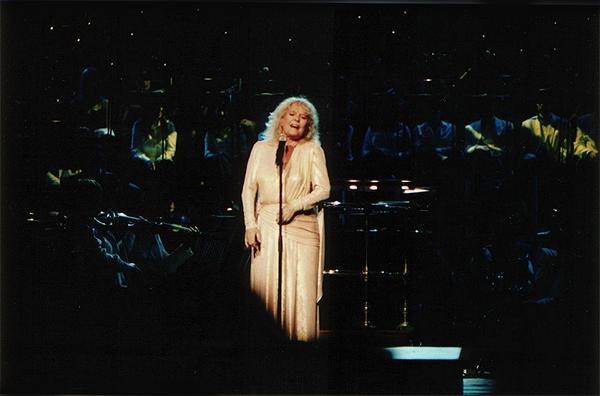
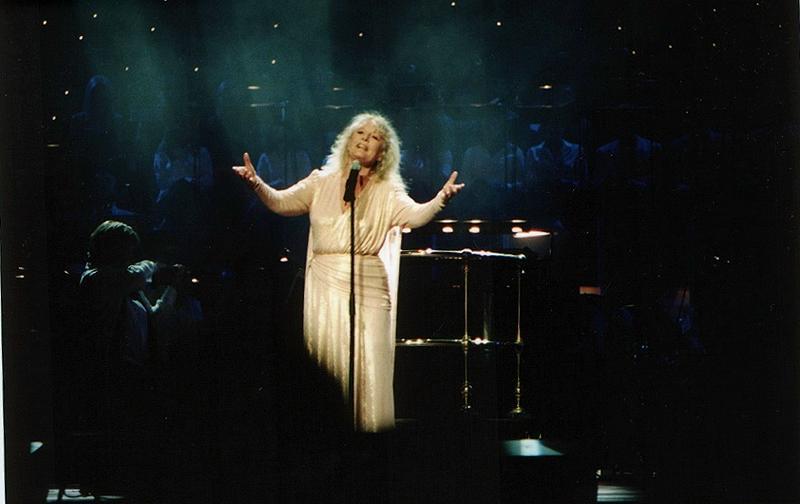

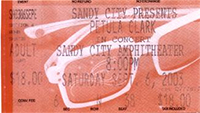

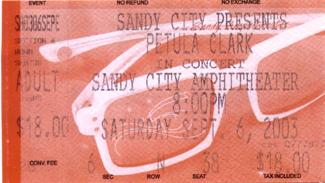
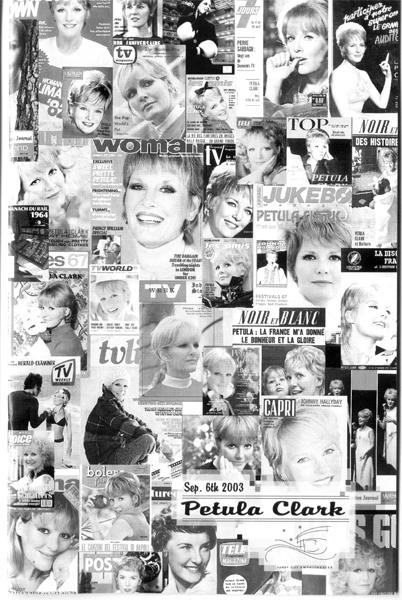
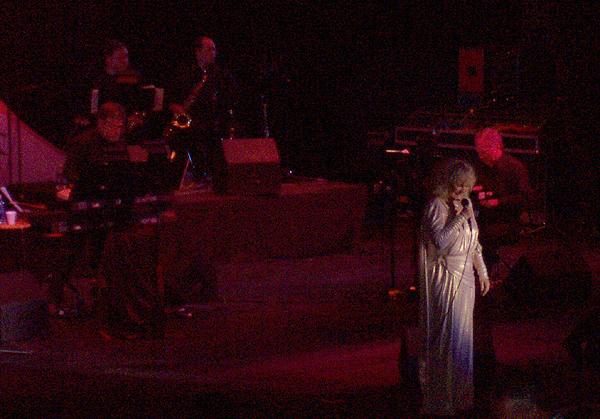 Photos by Laurie Parsons Zenobio
Photos by Laurie Parsons Zenobio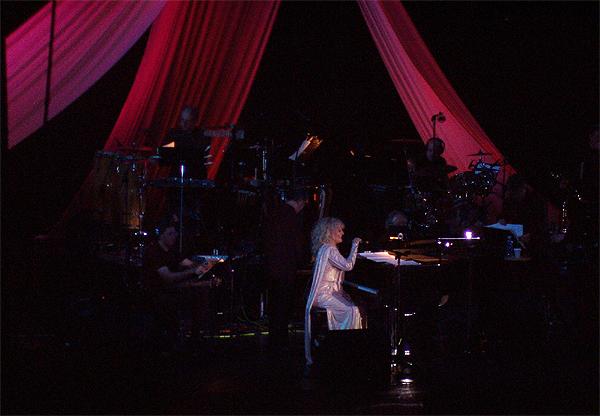
 Photo courtesy of Lesley Moore
Photo courtesy of Lesley Moore 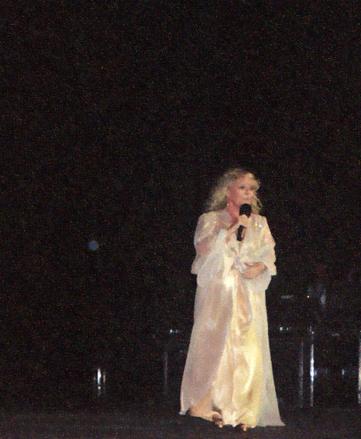 Photos by Brian Tidwell
Photos by Brian Tidwell 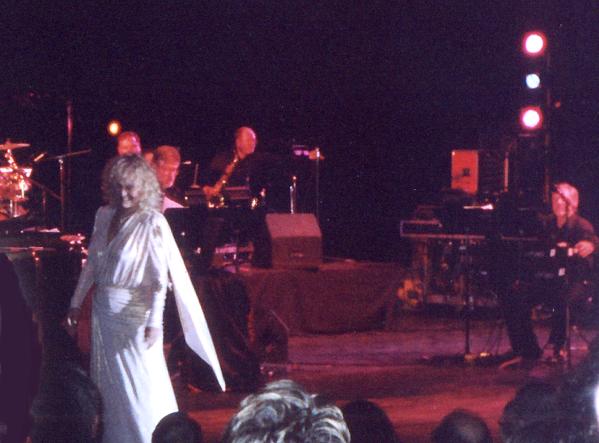
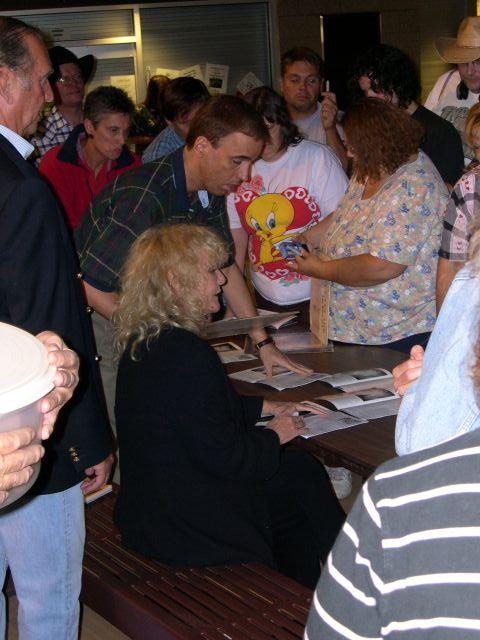

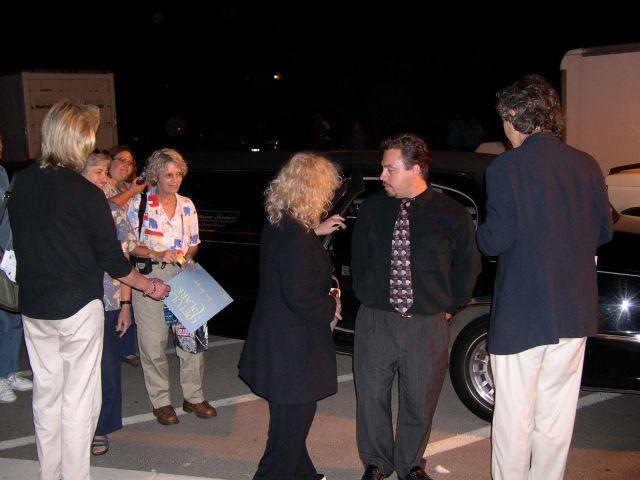 Photos by Laurie Parsons Zenobio
Photos by Laurie Parsons Zenobio
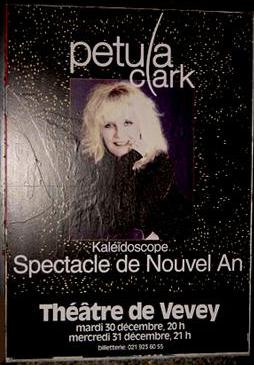 All photos by Rich Tanguy
All photos by Rich Tanguy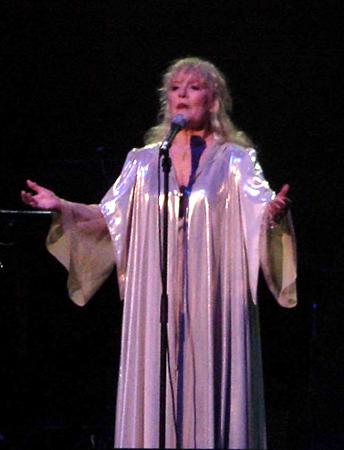
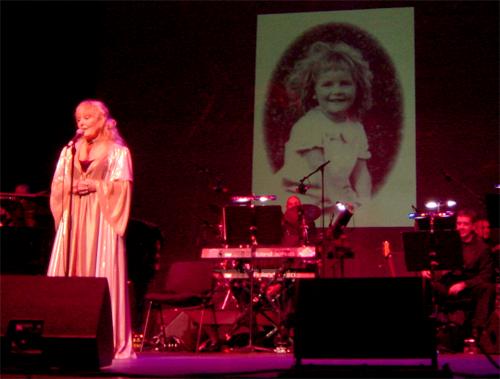
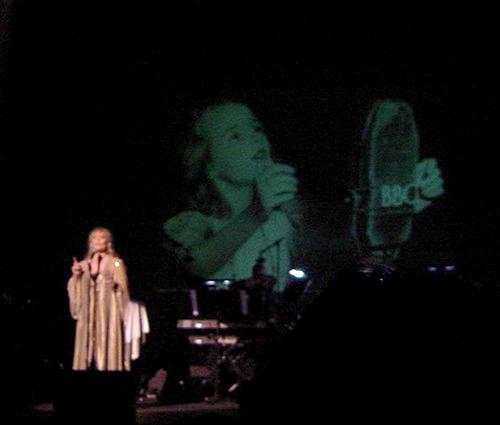
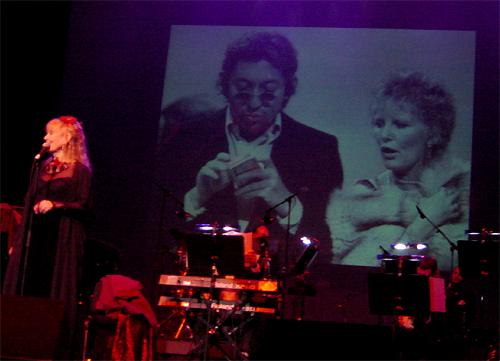
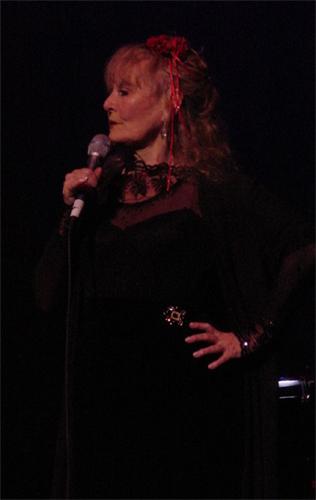
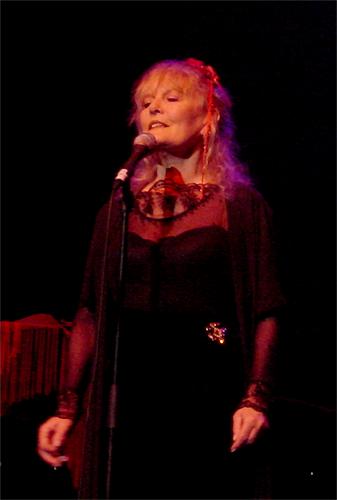

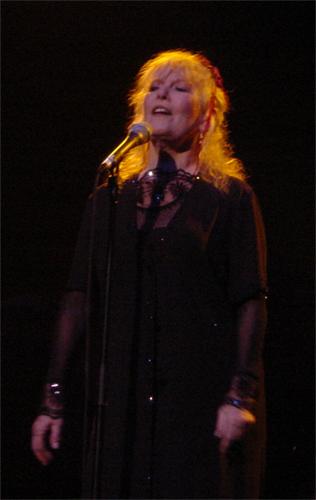



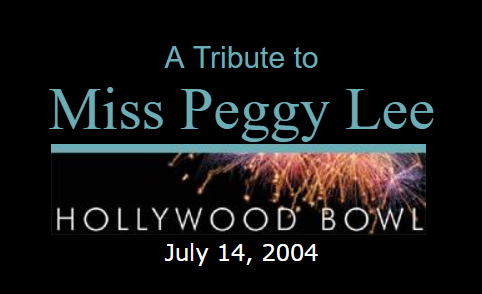
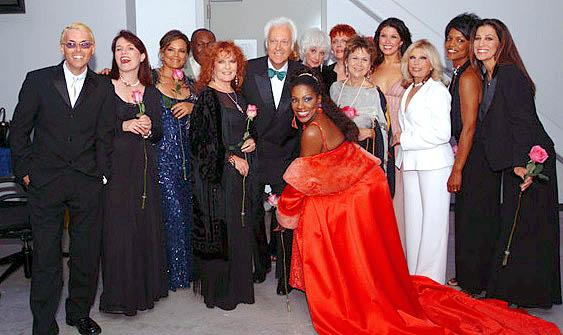
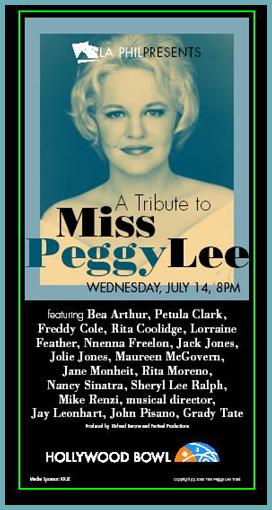

 Photo courtesy of Jackie Watt
Photo courtesy of Jackie Watt 
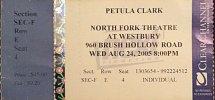

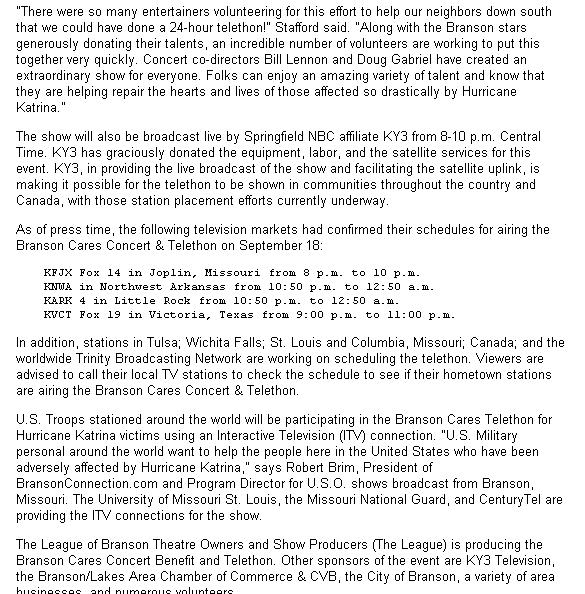


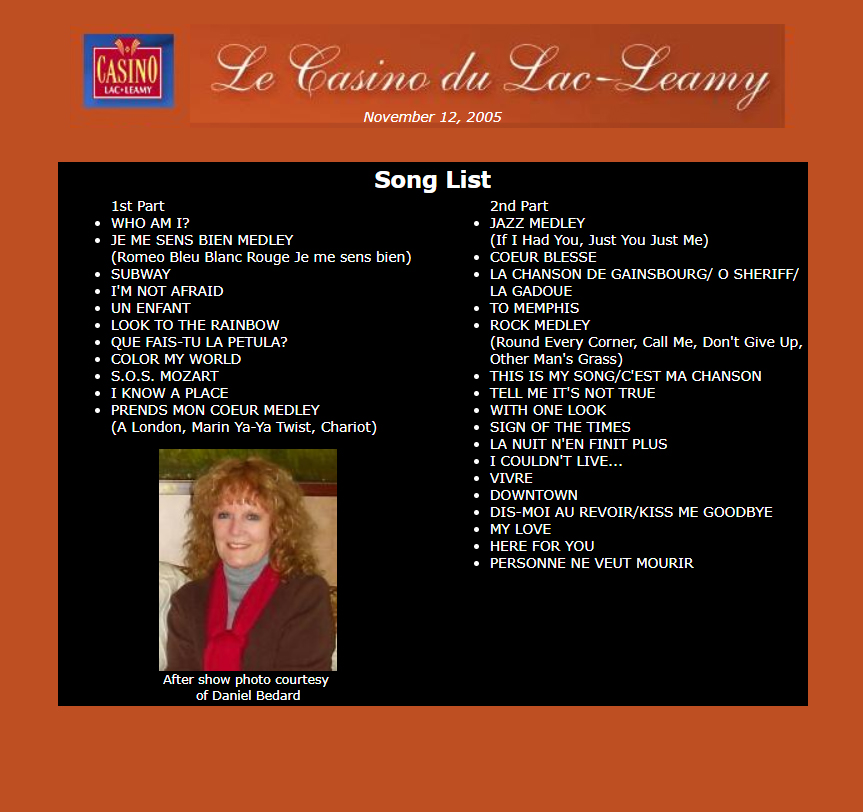

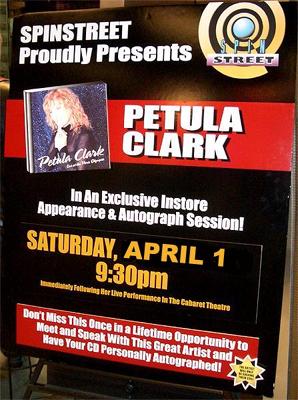
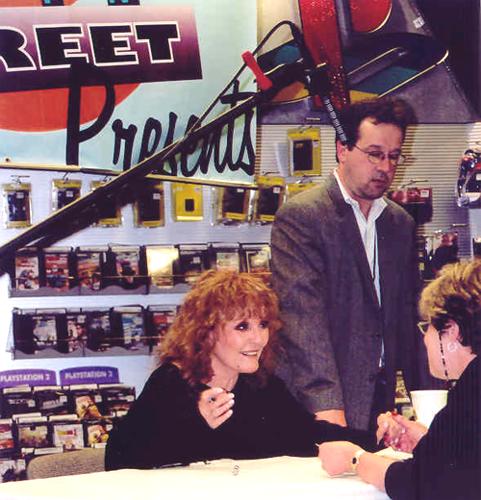
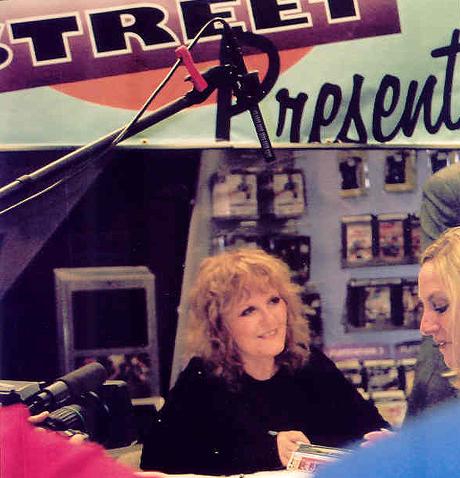
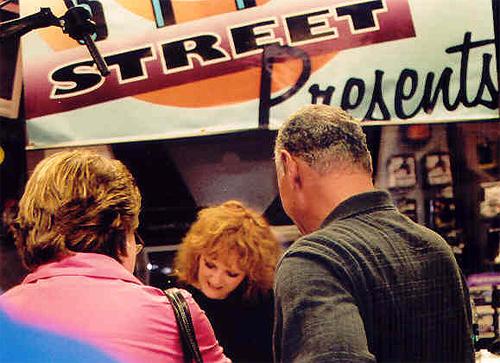 ©Photos by Candice Guerette
©Photos by Candice Guerette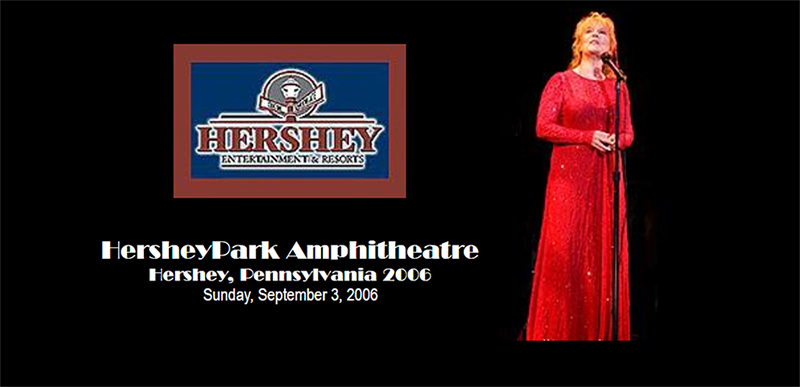
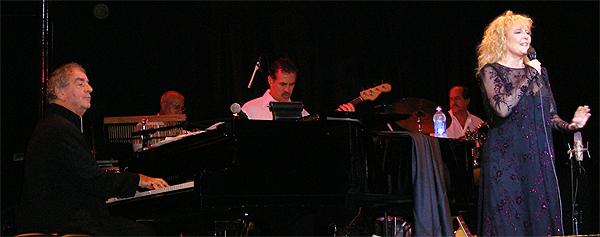 All photos © Pat Mann
All photos © Pat Mann
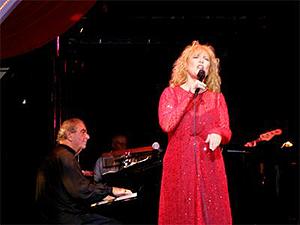
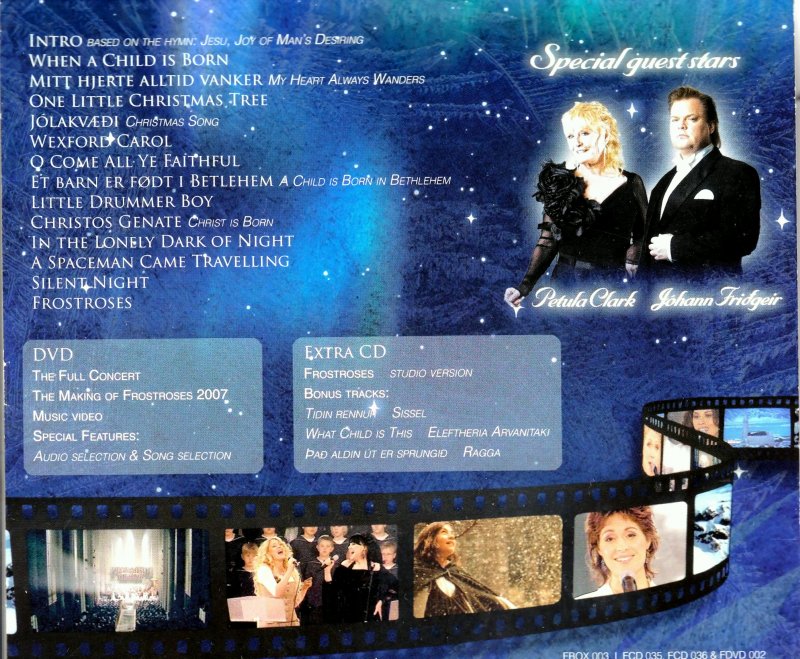

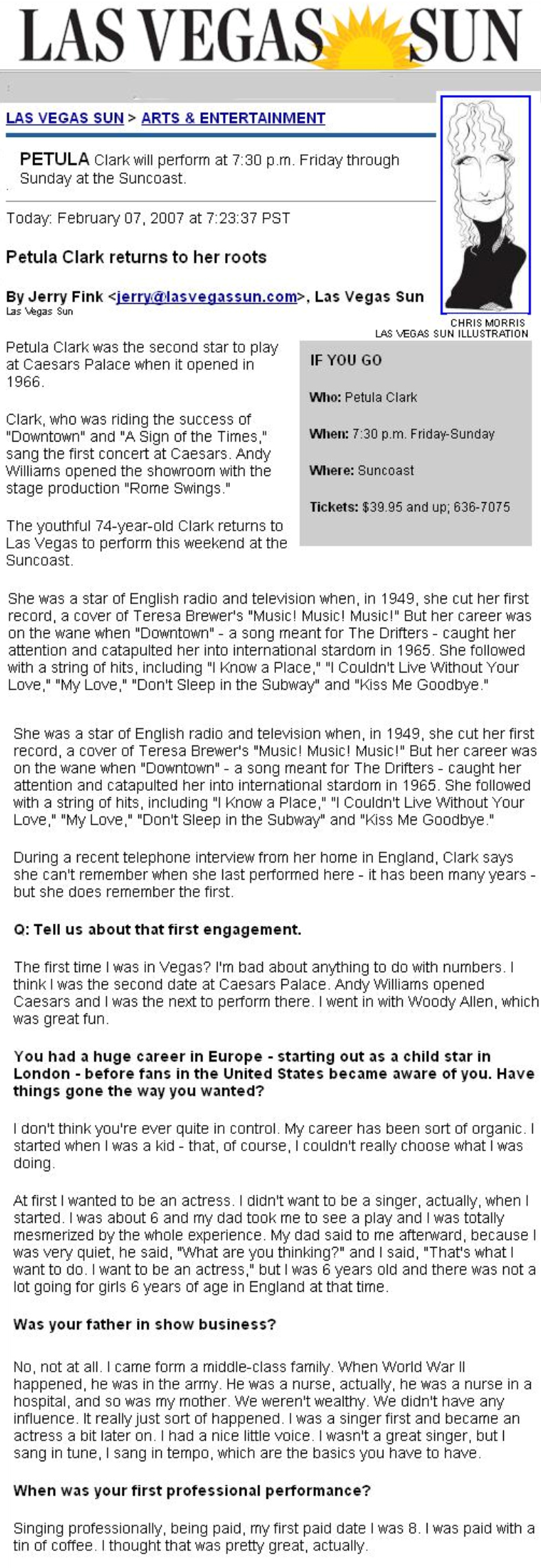




 ©Photos by B Desmond
©Photos by B Desmond 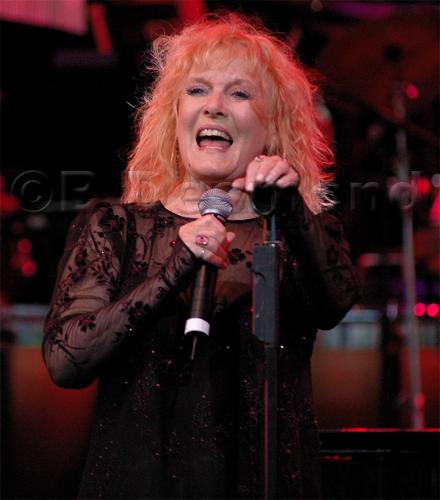
 ©Photos by B Desmond
©Photos by B Desmond 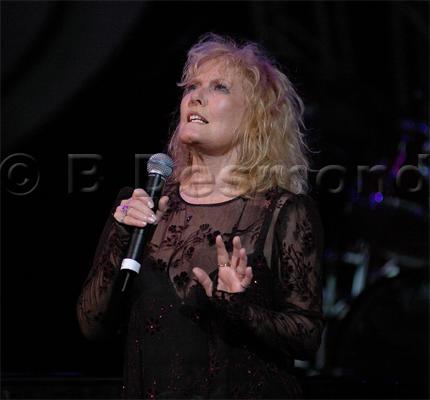
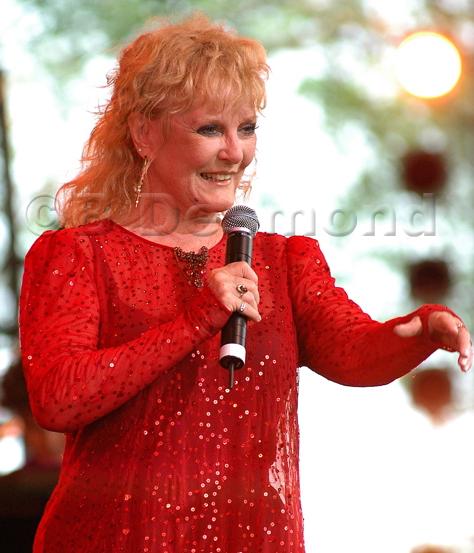
 Photos by Mike Jones
Photos by Mike Jones 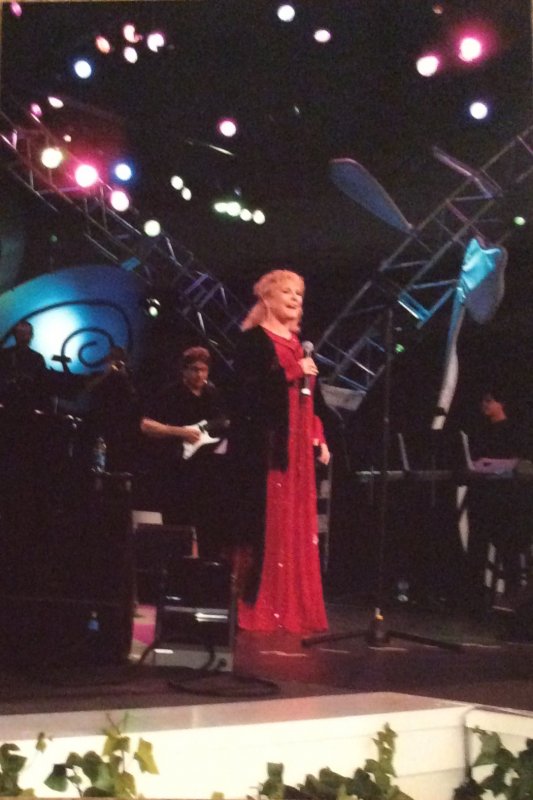


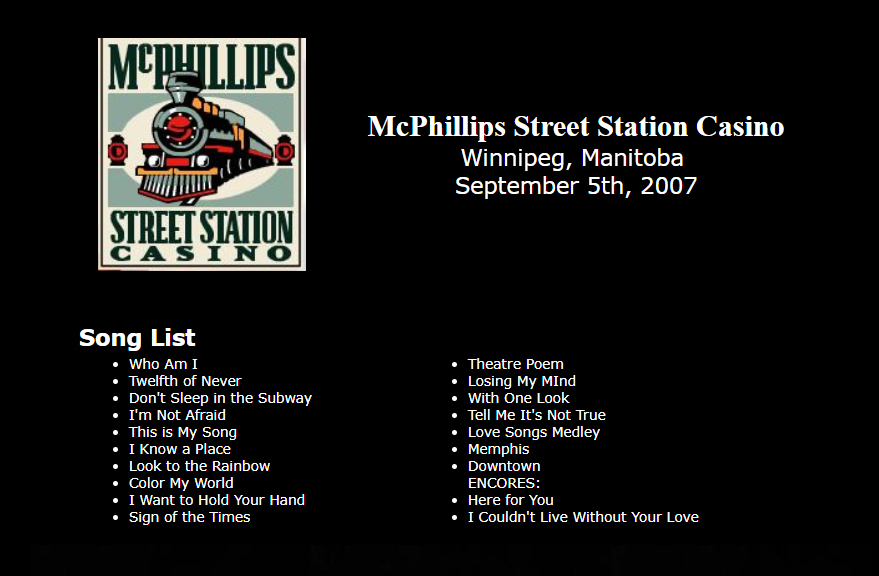
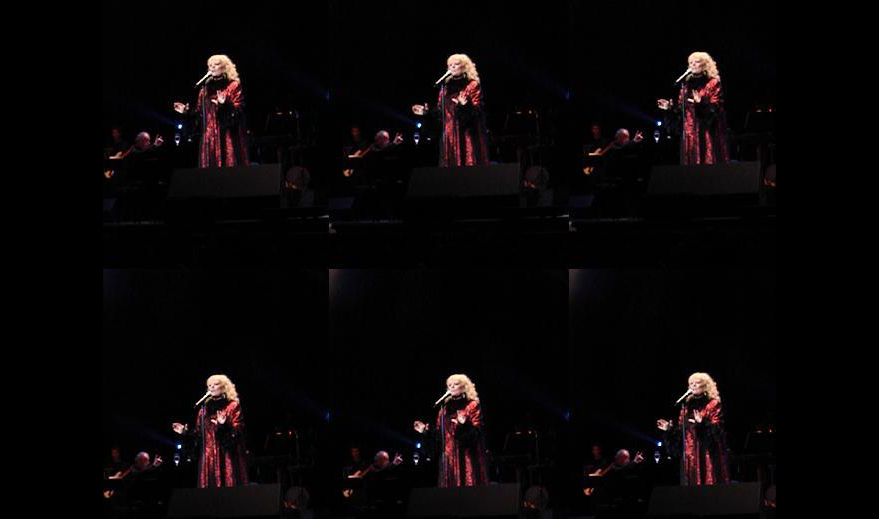 © Photo by Rick Groom
© Photo by Rick Groom